Democrats draw sharper battle lines in tug of war over party leadership
Even as Democrats try to move past last year’s defeats, their internal fault lines show signs of deepening in the campaign for the party’s leadership.
The latest evidence came Wednesday when former Vice President Joe Biden endorsed Thomas E. Perez, who served as President Obama’s Labor secretary, to chair the Democratic National Committee.
“We have a lot of good people vying for this important job,” Biden said in a statement. “But I do think for this moment and in this time, Tom Perez is our best bet to help bring the party back.”
The endorsement was seen as more evidence that key members of the recently departed Obama administration were backing Perez.
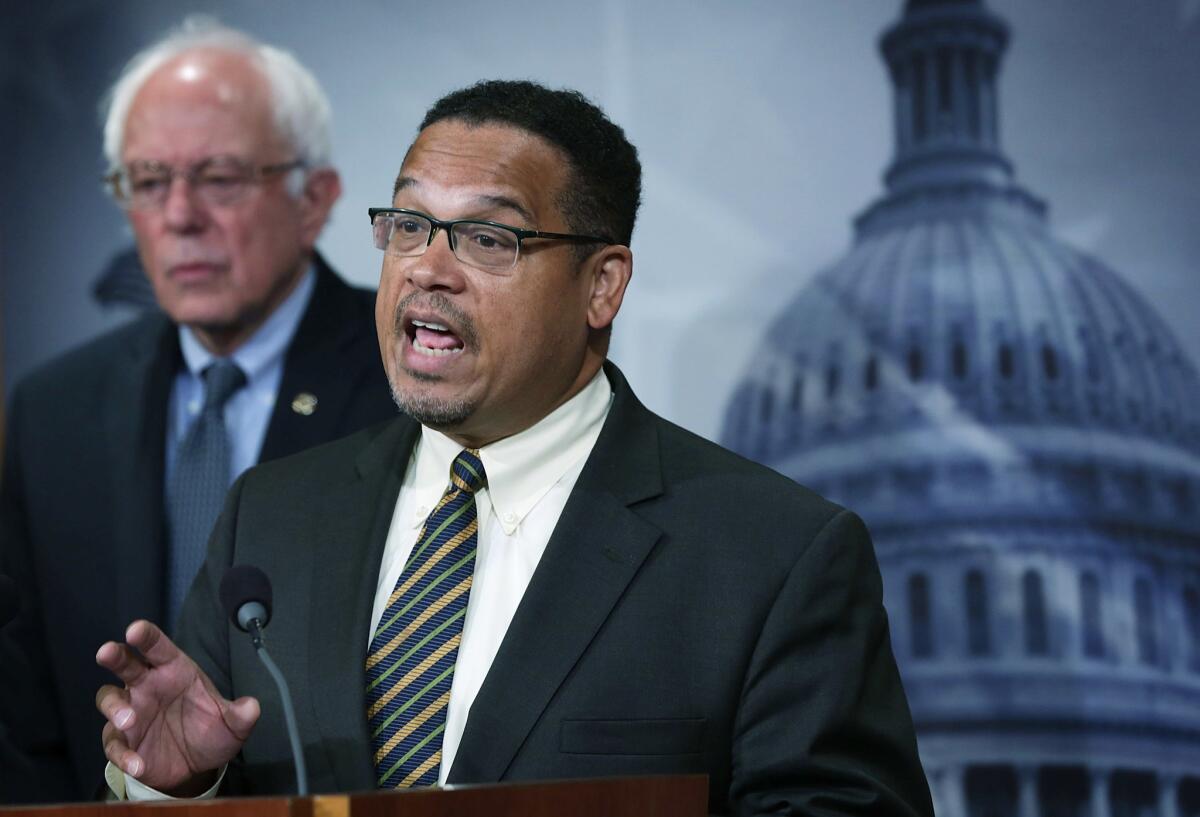
It was followed by a statement from Sen. Bernie Sanders of Vermont reiterating his support for Rep. Keith Ellison (D-Minn.), another leading candidate in the race.
Although Sanders lost to Hillary Clinton in the presidential primary, he has continued to try to pull Democrats to the left, and he has emphasized the need to “create a grass-roots party.”
Obama left office with strong poll numbers, but under his watch, Democrats lost power not only in Washington but in states around the country, something Sanders and his allies have stressed in the fight over the party chairmanship.
“The question is simple: Do we stay with a failed status-quo approach or do we go forward with a fundamental restructuring of the Democratic Party?” Sanders said.
Border Patrol chief is abruptly out after being brought in as a reformer
The chief of the Border Patrol will leave his post at the end of the month, likely the result of a change in direction by the Trump administration and a reflection of the new power of the agency’s union.
Mark Morgan, the agency’s head, was hired from the FBI in June to reform the force after a series of corruption allegations and problems with excessive force. He will leave the Border Patrol abruptly after seven months on the job, according to a person familiar with the decision who spoke on the condition of anonymity.
Morgan’s departure was first reported by the Associated Press.
Morgan spent 20 years at the FBI and was first brought to Customs and Border Protection, the Border Patrol’s parent agency, in 2014 to overhaul its internal affairs division. After a subsequent stint running the FBI’s training academy, he started the top job at the Border Patrol in June.
The Border Patrol’s union had opposed Morgan’s appointment, preferring a candidate who had risen through the ranks of the agency.
The union endorsed President Trump in the election, breaking with its practice of remaining neutral in elections.
News of Morgan’s departure comes a day after Trump announced he would build a border wall and hire 5,000 more Border Patrol agents, bringing the total force to 26,000. Trump said the Border Patrol union would have a lot of clout in department decisions.
Lights go out on confirmation hearing for expected CIA chief
The lights went out as the confirmation hearing began for Donald Trump’s pick to run the CIA, raising questions of whether it was a routine technical malfunction or someone was trying to disrupt the proceedings.
The Senate Intelligence Committee is vetting Rep. Mike Pompeo (R-Kan.) to run the fabled spy service.
The president-elect has openly mocked the CIA and other parts of the intelligence community for months, most recently for its assessment that groups backed by Russian spy services hacked Democratic Party computers in an effort to help Trump win the White House.
The hearing was stopped about 10 minutes after it started to allow building staff to figure out how to turn the lights on again.
Trump was silent on new U.S. sanctions against Russia, but he praises Putin’s response
After President Obama on Thursday announced retaliatory measures against the Russian government for what the U.S. has concluded were efforts to interfere in the election, President-elect Donald Trump’s response was terse and dismissive, saying it was time to “move on to bigger and better things.”
But after Russian President Vladimir Putin said Friday that he would not respond in kind to the U.S. actions — preferring to wait until the new administration takes office — Trump weighed in with high praise.
Trump’s tweet did not appear to be off the cuff. As if to underscore his sentiment, Trump affixed the tweet to the top of his Twitter feed. And he posted an Instagram photo shortly after, quoting himself.
Trump’s effusive words were particularly striking given the bipartisan view of Putin as more adversary than ally.
House Speaker Paul D. Ryan (R-Wis.) and Senate Majority Leader Mitch McConnell (R-Ky.) said they supported the Obama administration’s move to expel Russian diplomats and block access to two properties owned by its government.
Senate Armed Services Committee Chairman John McCain (R-Ariz.) is expected to call a hearing on Russia’s cyber activities when the new Congress convenes next week.
A Trump transition spokesman was asked earlier Friday whether Trump had spoken or planned to speak with Putin before his inauguration.
“The priority right now is for the president[-elect] to get an update next week from the intelligence community,” Sean Spicer said.
Trump’s praise did get tacit approval from some quarters. The Russian embassy in Washington retweeted it.
Putin says Russia won’t oust U.S. diplomats in response to hacking-flap sanctions
President Vladimir Putin on Friday condemned a new round of U.S. sanctions against Russia but said Moscow will not retaliate by expelling American diplomats.
President Obama on Thursday imposed sanctions on Russian officials and intelligence services in retaliation for what U.S. officials say is Russia’s interference in the presidential election by hacking American political sites and email accounts. Thirty-five Russian diplomats were ordered to leave the U.S. in 72 hours, and two Russian diplomatic facilities were closed.
Most popular White House petitions included requests to label a hate group and deport Justin Bieber
Over the past five years, Americans have produced and signed nearly 5,000 petitions through the White House’s “We the People” site. How could we ever forget the effort to get the Obama administration on board with building a Death Star? Some, like that one and a petition to deport Justin Bieber, resulted only in conversation. But others made an impact.
The Pew Research Center analyzed the petitions in a recent report. They ranged from serious, like an effort to ban gay conversion therapy at a state level that led the president in 2015 to support states’ bans, to playful. A request for Obama to appear on a previously unvisited talk show, for example, prompted him to appear on “Real Time with Bill Maher” in January 2016.
In 2015, 106-year-old Virginia McLaurin requested a meeting with the first black president, something she never thought she’d live to see. Her petition garnered only 19 signatures. But it nonetheless resulted in one of first couple’s most memorable meetings, this dance party:
The petitioning system, launched in 2011, was part of Obama’s open-government initiative. The most common topics for petitioning included healthcare, veterans issues and requests to honor individuals, such as Yogi Berra, and create or officially recognize holidays, like Talk Like a Pirate Day.
While not every petition made a change or elicited a response from the White House, many captured a momentary pulse of the nation.
Here are the five most popular:
- “Legally recognize the Westboro Baptist Church as a hate group,” posted Dec. 14, 2012; 367,180 signatures.
- “Establish justice and prevent a great catastrophe,” posted April 4, 2016; 331,914 signatures.
- “File charges against the 47 U.S. senators in violation of the Logan Act in attempting to undermine a nuclear agreement,” posted March 9, 2015; gained 322,117 signatures.
- “Ask President Obama to appear on HBO’s ‘Real Time with Bill Maher,’ ” posted Jan. 15, 2016; 314,226 signatures.
- “Deport Justin Bieber and revoke his green card,” posted Jan. 23, 2014; 273,698 signatures.
Obama slaps Russia with sanctions for meddling in the U.S. election
In the most sweeping retaliation against Russia in decades, President Obama slapped the country with new penalties Thursday for meddling in the U.S. presidential election, kicking out dozens of suspected spies and imposing banking restrictions on five people and four organizations the administration says were involved.
“All Americans should be alarmed by Russia’s actions,” Obama said in a statement. “Such activities have consequences.”
How Trump and an Obamacare rollback could affect the growing gig economy

A growing share of the U.S. workforce is reyling on alternative work arrangements, which include on-demand gigs through online platforms like Lyft or Uber as well as work through temporary help agencies, freelance assignments and independent contracts.
The Bureau of Labor Statistics plans to conduct a comprehensive survey of these so-called contingent workers next year, its first since 2005, helping policymakers understand the size and makeup of a workforce not covered by many labor protections or privy to the benefits that come with a traditional employer relationship.
Whether policy will catch up to the labor shifts is a question experts will watch in 2017. A major conversation point has been how to develop portable benefits that give gig economy workers access to retirement plans, unemployment insurance and paid sick leave even as they move from job to job.
Trump touts plans by Sprint and OneWeb to create 8,000 U.S. jobs
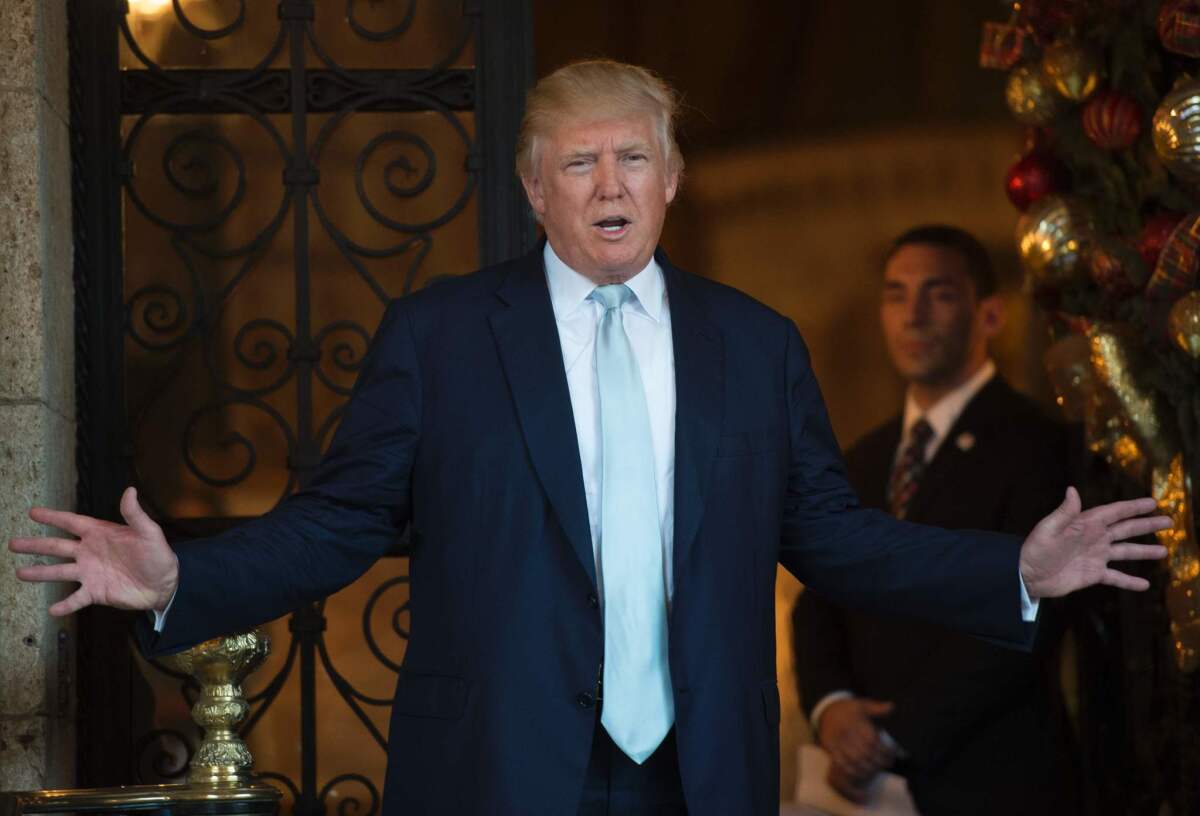
President-elect Donald Trump on Wednesday touted plans by telecom company Sprint and technology start-up OneWeb to hire a total of 8,000 workers in the U.S. in what he said was “very good news” for the economy.
He appeared to be highlighting previously made jobs announcements.
OneWeb, which is building a network of satellites to deliver high-speed Internet access, said on Dec. 19 that it expected to create nearly 3,000 jobs in the U.S. over the next four years after securing $1.2 billion in funding, mostly from Japan’s SoftBank Group Corp.
And the head of SoftBank, which owns Sprint, said on Dec. 6 that the company had agreed to invest $50 billion in the U.S. and create 50,000 jobs here.
The announcement by SoftBank Chief Executive Masayoshi Son came after he met with Trump at Trump Tower in New York City. Trump touted it that day.
Speaking at his Mar-a-Lago estate in Palm Beach, Fla., on Wednesday, Trump said Sprint was “going to be bringing 5,000 jobs back to the United States.”
“They have taken them from other countries. They are bringing them back to the United States,” Trump said.
Sprint, though, said in a statement that the jobs would be a mixture of new positions and others that were reinstated. It wasn’t clear whether those jobs were part of the 50,000 that were mentioned earlier in the month at Trump Tower.
“We are excited to work with President-Elect Trump and his administration to do our part to drive economic growth and create jobs in the U.S.,” said Sprint CEO Marcelo Claure. “We believe it is critical for business and government to partner together to create more job opportunities in the U.S. and ensure prosperity for all Americans.”
Trump also said the OneWeb hiring “is very exciting.” OneWeb did not immediately respond to a request for comment.
3:25 p.m.: This story was updated with comment from Sprint.
Kerry offers fierce defense of Obama’s support for Israel, urges resumption of Mideast peace talks
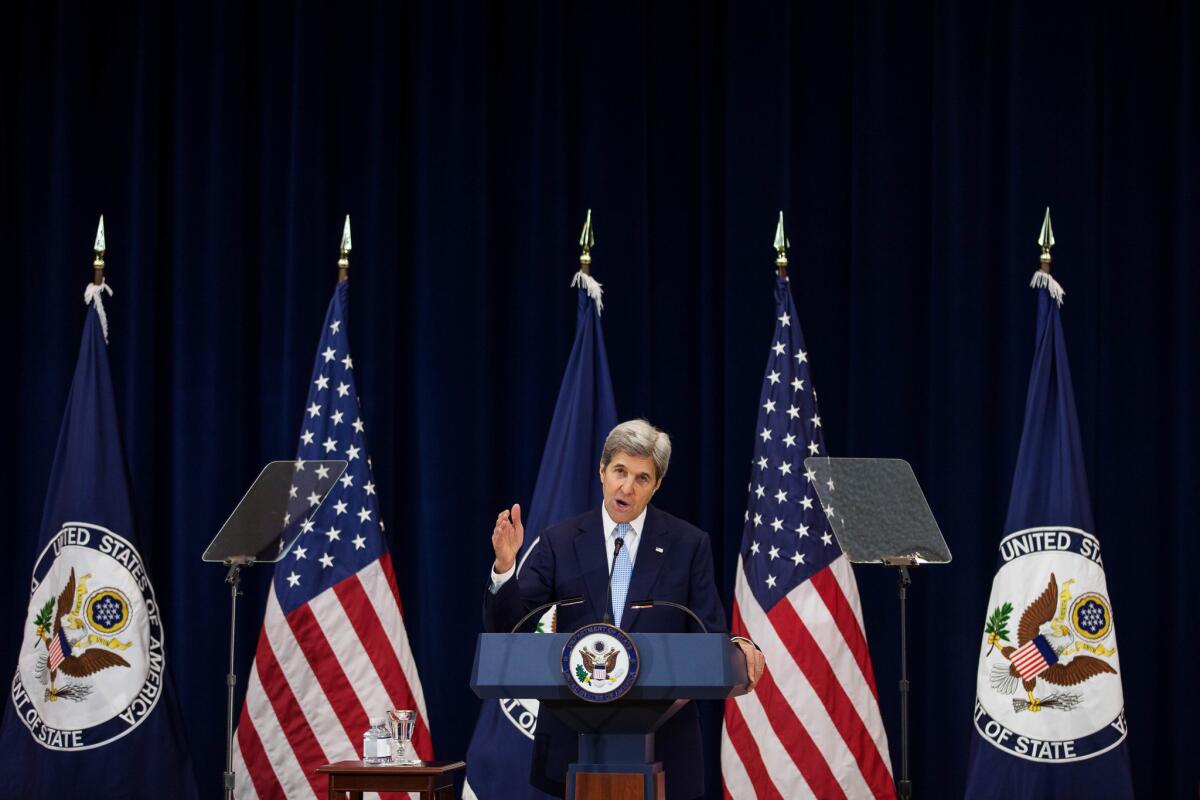
With President-elect Donald Trump tweeting from the sidelines, Secretary of State John F. Kerry on Wednesday outlined broad principles for reviving the moribund Israel-Palestinian peace process -- calls that quickly ignited a new burst of Israeli anger against the Obama administration.
Kerry’s lengthy and impassioned address, delivered at the State Department, marked the latest chapter in an unusually bitter public clash between the United States and Israel -- and the even more extraordinary spectacle of a president-elect again inserting himself into a sensitive diplomatic matter before taking office.
In a speech lasting more than an hour, Kerry appealed for a hiatus in Jewish settlement activity in the West Bank and East Jerusalem, called on Palestinian leaders to explicitly denounce terrorist attacks against Israelis, and warned repeatedly that the prospects for a “two-state solution,” with Israel and a Palestinian state existing side-by-side, were in jeopardy.
“We cannot in good conscience do nothing, and say nothing, when we see the hope of peace slipping away,” he said.
Former California lieutenant governor will meet with Trump to discuss running Agriculture department
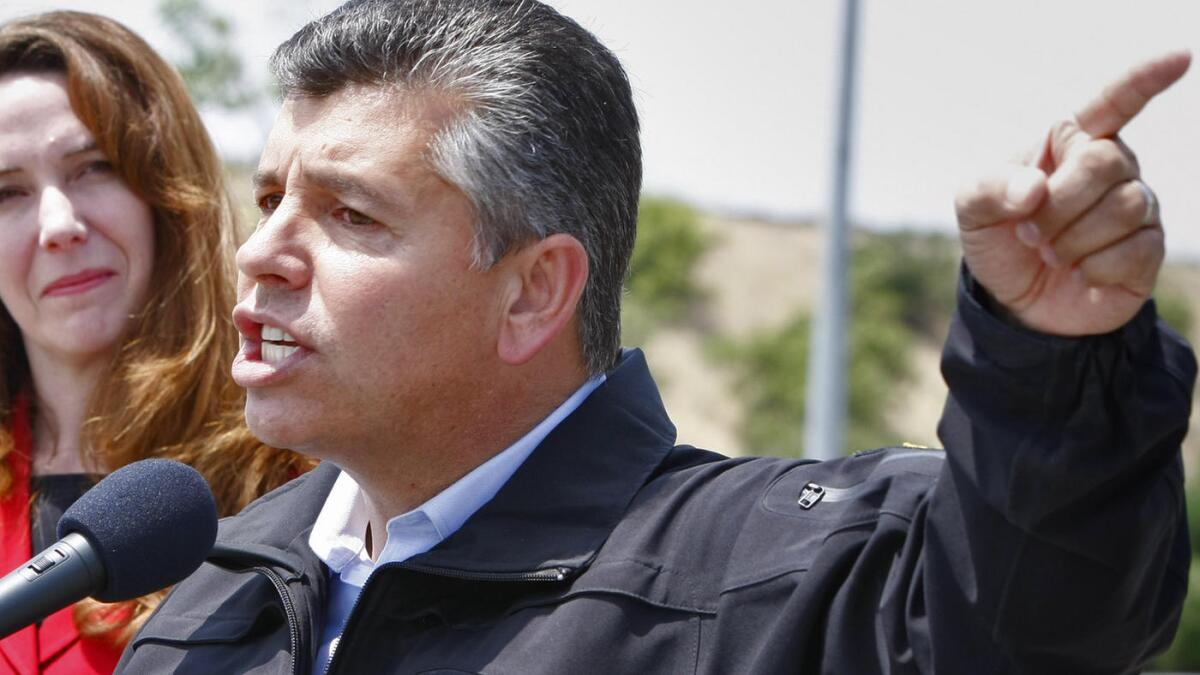
President-elect Donald Trump is considering former California Lt. Gov. Abel Maldonado to lead the Agriculture department, a move that would bring greater diversity to the Republican’s Cabinet.
Maldonado will meet with Trump on Wednesday at his Palm Beach, Fla., estate. Trump spokesman Sean Spicer noted that Maldonado, owner of Runway Vineyards in the Santa Maria Valley, comes from three generations of farmers and has “strong roots in the agriculture industry of California.”
Trump will also meet with Dr. Elsa Murano, the former president of Texas A&M University and a former Agriculture undersecretary for food safety, in connection to the post, one of the few Cabinet positions yet unfilled.
Maldonado, 49, was once considered to be the kind of Republican who could break through the party’s struggle to attract widespread Latino support. A Santa Barbara County farmer whose parents were Mexican farmworker immigrants, he served as mayor of Santa Maria before being elected to the state Assembly in 1998.
Perhaps Maldonado’s most notable political moment came when he worked with Gov. Arnold Schwarzenegger to force Democrats to embrace the top-two primary system for California during negotiations on the state budget crisis in 2009. Schwarzenegger rewarded Maldonado with the appointment to the then-vacant post of lieutenant governor in 2010.
But Maldonado’s role in helping push the nonpartisan primary system made him a pariah among many conservative Republicans, and he failed in subsequent races for Congress in 2012 and a brief flirtation with a run for governor in 2014.
If nominated and confirmed, Maldonado would be the sole Latino in Trump’s Cabinet.
Trump attacks Obama over Israel just ahead of Kerry’s speech on the Mideast
The detente between President Obama and President-elect Donald Trump, as both aimed to portray a smooth transition of power, appears in jeopardy.
Trump condemned the Obama administration’s foreign policy on Wednesday, tweeting he was doing his best to overlook “inflammatory” Obama moves, while engaging in 1990s-style sarcasm.
Last week, Obama decided to have the U.S. abstain from a United Nations Security Council vote on a resolution condemning Israeli settlement activity, which allowed the measure to pass.
The vote angered Israeli leaders, who accused senior U.S. officials of complicity in drafting the resolution, a claim disputed by the U.S.
Trump’s postings came just before Secretary of State John F. Kerry delivered a major address on U.S. foreign policy that included a rebuttal to Israeli government criticisms of the Obama administration.
Trump’s statement of support for Israel was welcomed by Prime Minister Benjamin Netanyahu, who has long had a tense relationship with Obama.
Trump transition spokesman Sean Spicer told reporters that the president-elect’s tweets “speak for themselves, very clearly.”
He also stressed that White House officials have been “helpful and generous with their time,” at least in terms of the “mechanics of the transition.”
In a brief statement to reporters Wednesday night, Trump said he had a “general conversation” with Obama during the day.
“Very, very nice,” was how the president-elect described the chat, which he said Obama initiated. A White House spokesman confirmed the call and characterized it as positive.
When asked whether he thinks the U.S. should exit the U.N., Trump repeated his earlier comments that the global body is “not living up to its potential.”
“When do you see the United Nations solving problems?” he asked. “They don’t, they cause problems, so if it lives up to its potential it’s a great thing, if it doesn’t it’s a waste of time.”
The U.N. seemed to respond to Trump on Monday, in a message pinned to the top of its Twitter feed:
Times staff writer Christi Parsons in Honolulu contributed to this report.
5:10 p.m.: This story was updated with White House comment.
2:45 p.m.: This story was updated with Trump’s comments.
John Kerry, tireless in his diplomatic efforts, often came up empty-handed
John F. Kerry is nothing if not indefatigable, traveling to all corners of the world as America’s top diplomat over the last four years. But as he prepares to leave office, he confronts a mixed legacy: a handful of successes coupled with searing defeats, especially in the Middle East.
His inability to halt the carnage in Syria, or to block Russia’s growing influence, ranks as the most serious blot on his record. But he also got nowhere trying to end the Israeli-Palestinian standoff, or to stop Saudi Arabia, a U.S. ally, from bombing civilians in Yemen.
Kerry’s greatest success was the historic accord to curtail Iran’s nuclear development program and a landmark climate change treaty to limit greenhouse gas emissions and slow global warming.
At Pearl Harbor, Obama says ‘we must resist the urge to demonize those who are different’
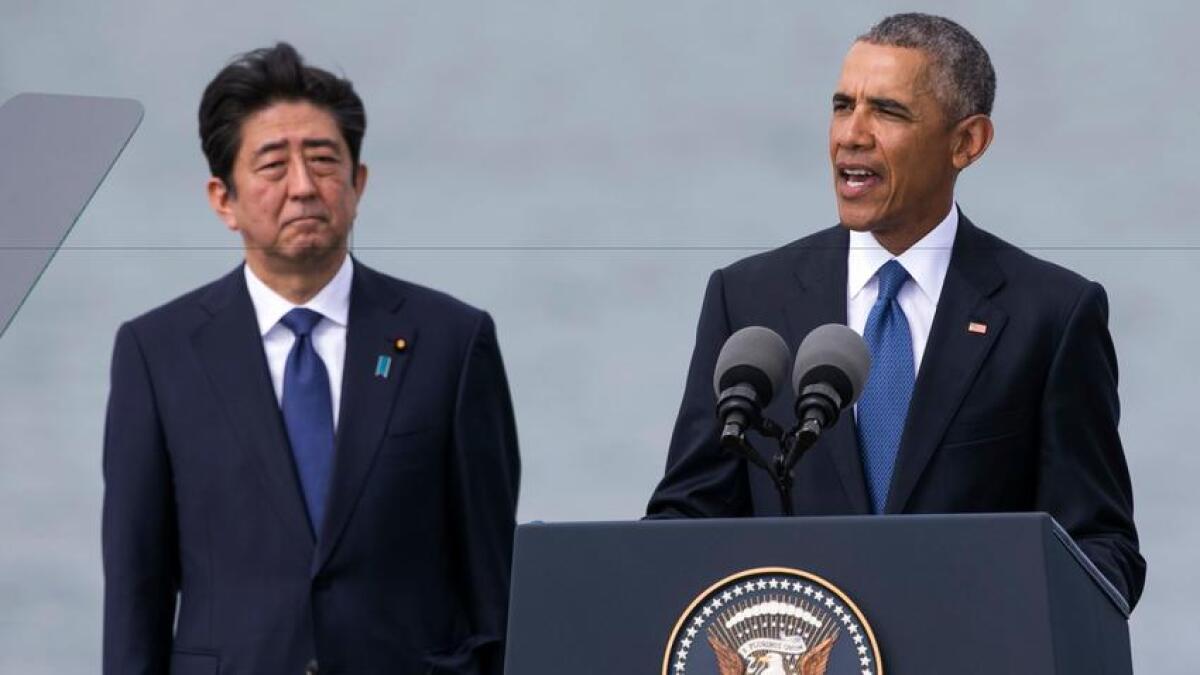
President Obama and Japanese Prime Minister Shinzo Abe scattered petals together on the waters of Pearl Harbor on Tuesday in a symbolic act aimed at laying to rest the enmity of the Japanese attack 75 years ago that drew the U.S. into World War II.
In a moment consumed with history, both leaders were fixed on the future. They expressed concern that the lessons of the war might be forgotten amid a shifting world order and the anti-internationalist sentiment that has swept over politics around the globe, most notably with the ascendance of President-elect Donald Trump.
Obama and Japan’s Abe to visit Pearl Harbor amid renewed talk of nuclear concerns
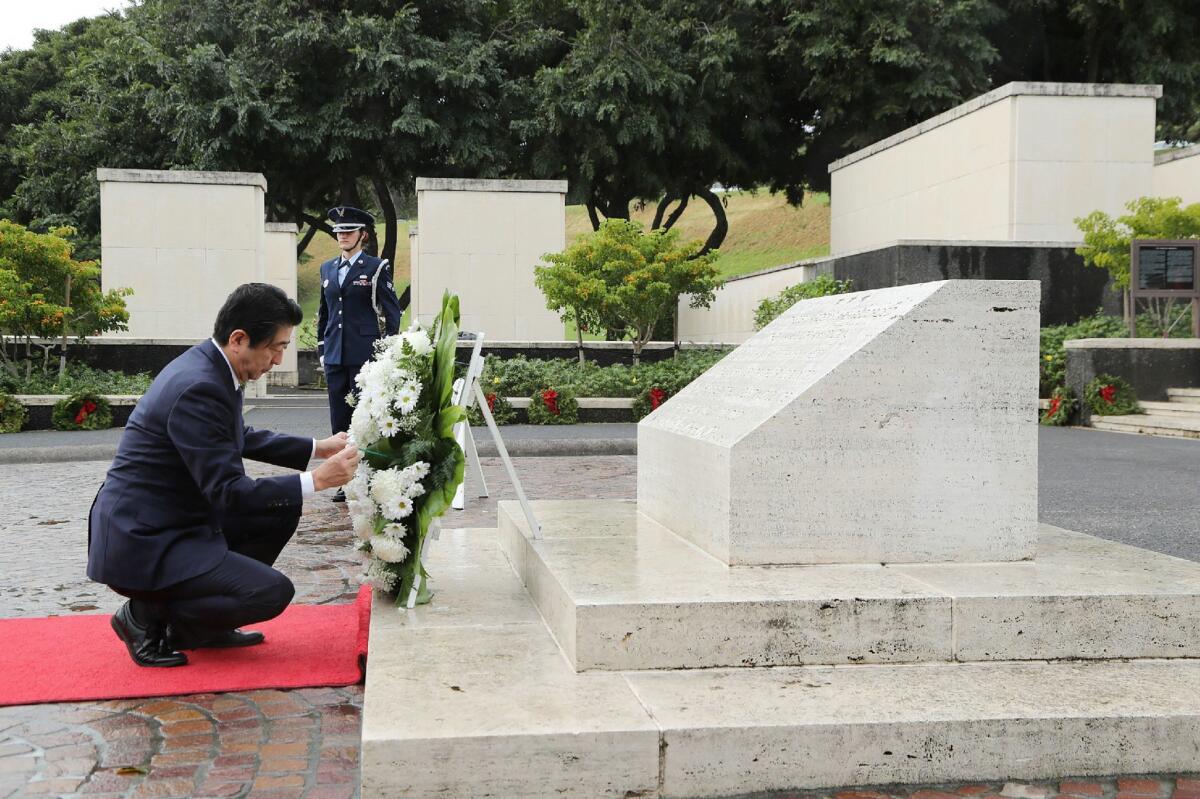
President Obama and Japanese Prime Minister Shinzo Abe are scheduled to honor the war dead at Pearl Harbor on Tuesday, marking the 75th anniversary of the attack that thrust the U.S. into World War II.
The visit was planned as a coda to Obama’s visit to Hiroshima in May, where Abe hosted him as the first sitting president to visit the site where the U.S. dropped one of two nuclear bombs in 1945 to end the war, the only instances of nuclear attacks in history.
But the visit has taken on a new meaning. President-elect Donald Trump reawakened old fears of a nuclear arms race last week by declaring his commitment to “strengthen and expand” U.S. nuclear capability.
In his remarks at Pearl Harbor, Obama will have an opportunity to address those renewed anxieties and to lay out the dangers of an arms race. Obama has fought to stop the proliferation of nuclear weapons and to secure existing caches.
The visit is meant to highlight the strength of the relationship between the U.S. and Japan, an administration official said. Several Japanese prime ministers before Abe have visited the Pearl Harbor site. But Abe is the first to go to the memorial at the resting place of the battleship Arizona, where 1,177 American military personnel died in the Japanese aerial attack on Dec. 7, 1941.
Will the Fed’s Janet Yellen ‘take away the punch bowl’ after Trump takes office?
After three years of almost single-handedly juicing up the slow-growing economy, Janet L. Yellen and the Federal Reserve should be looking at easier days ahead.
Yellen, in what will probably be her last full year as Fed chair, may finally get help from somewhere else in Washington.
Tax cuts and infrastructure spending planned by President-elect Donald Trump, if backed by the Republican-controlled Congress, would lighten the load for a Fed whose easy-money policies have been the primary economic support for the nation.
She is already breathing easier on the Fed’s employment mandate; the jobless rate has fallen to a nine-year low of 4.6%. Inflation, too, is under control and, by all accounts, creeping toward the central bank’s optimal level of 2%.
And yet, Yellen may come under as much economic and political pressure as ever, on both the Fed’s policy and the independence of the institution.
Obama says he could have beaten Trump
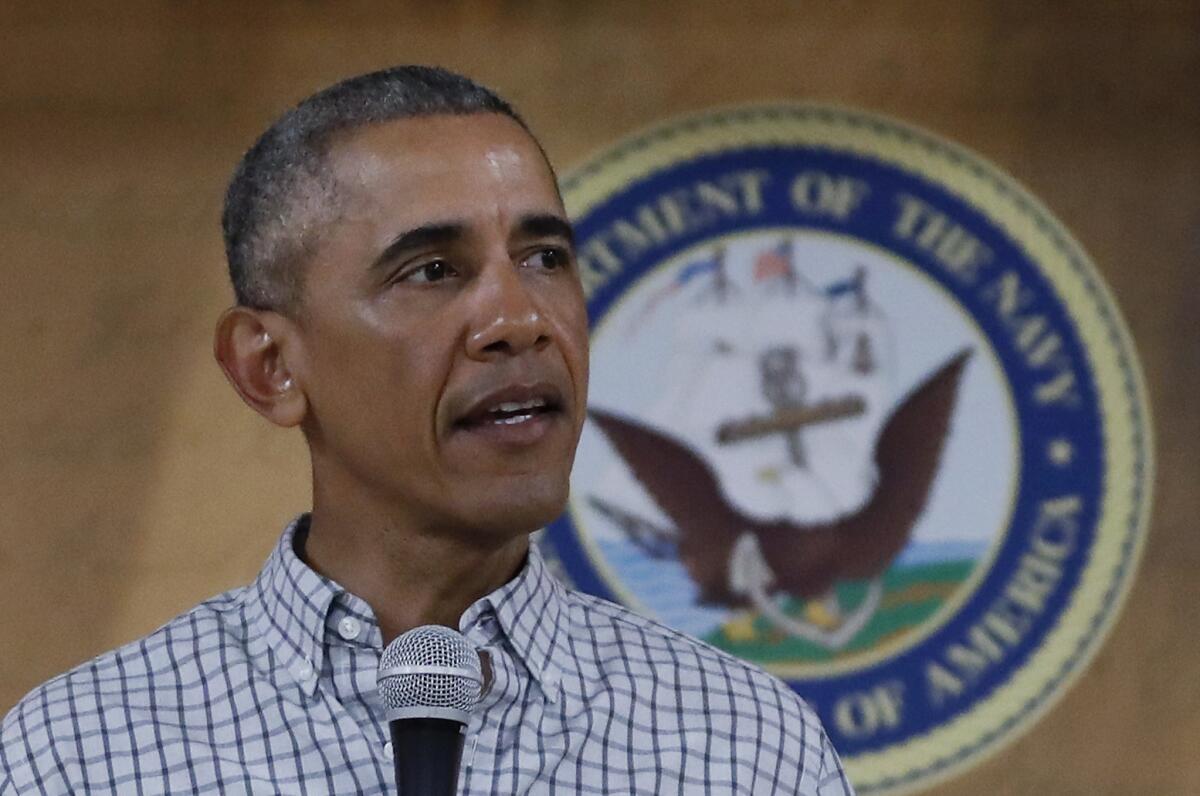
President Obama says he could have defeated Donald Trump in last month’s election by recapturing the same “vision of hope” that twice carried him to the presidency.
Obama also was mildly critical of the Democratic nominee, Hillary Clinton, saying her campaign didn’t do enough to get her message out.
The remarks were notable because Obama has been careful since the election to avoid criticizing Trump, or to deliver a post-mortem on Clinton’s failed bid.
Obama spoke in a wide-ranging interview with former senior advisor and now CNN commentator David Axelrod for the Democratic political operative’s Axe Files podcast. The interview was released by CNN on Monday.
“You know, I am confident in this vision because I’m confident that if I -- if I had run again and articulated it, I think I could’ve mobilized a majority of the American people to rally behind it,” Obama said.
His comments were part of a wider discussion of what he called “ugly” sentiments of racism and xenophobia that surfaced during the 2016 campaign.
Obama repeated his assertion that Clinton faced a double standard as a woman, which put her at a disadvantage.
But he also said a kind of complacency set in that made the Clinton campaign too cautious and thus unable to get its message out sufficiently.
“If you think you’re winning, then you have a tendency, just like in sports, maybe to play it safer,” Obama said.
During the interview, Obama also spoke of his family, the strength he’d gotten from wife Michelle and the improbability of his own political career.
And the president said the spirit that his candidacy originally inspired, especially among young people, was “never snuffed out” despite the last eight years of turmoil.
“The idealism and the dedication stayed with the staff and got us through some really hard times,” he said.
Trump later responded to the remarks on Twitter.
UPDATE
2:07 p.m.: This article was updated with Trump’s response.
This article was originally published at 12:28 p.m.
Trump team seeks to ease fears on women’s programs at State Department
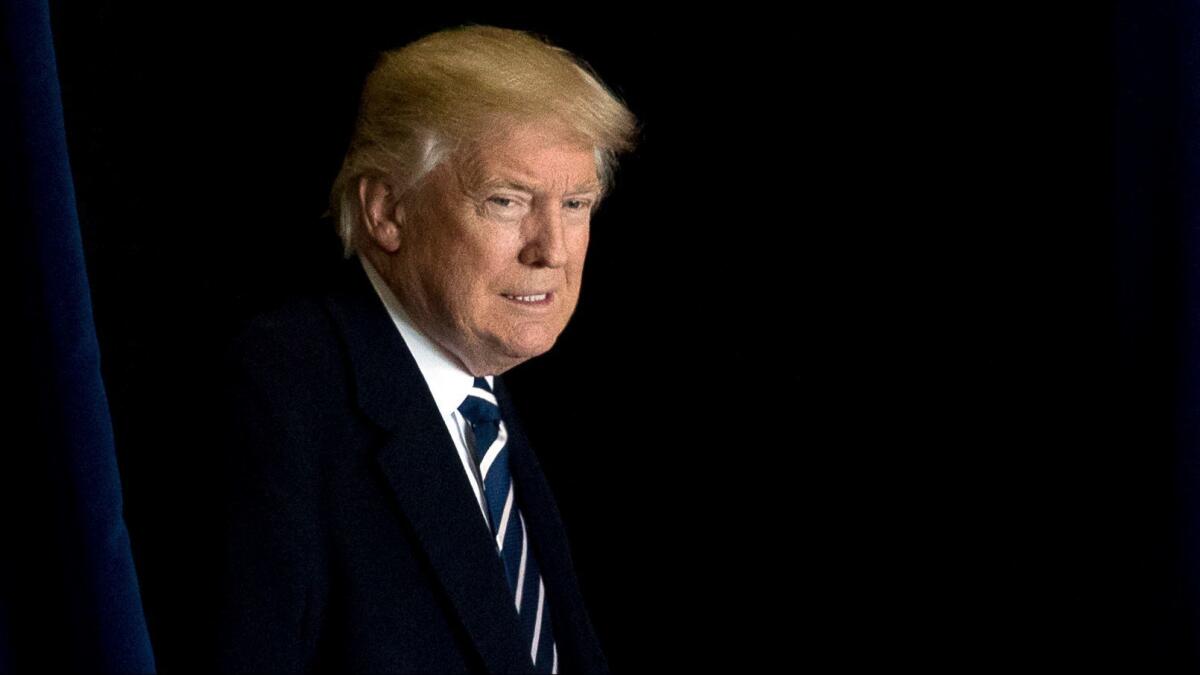
Donald Trump’s transition team said Friday its requests to the State Department for details on positions and funding for global women’s programs were part of an effort to “ensure and protect” gender equality.
The statement appeared to be an attempt to allay concerns that Trump might seek to cancel or roll back gender-focused programs at the State Department following a request by the transition team on Wednesday for information about them.
Most were created or championed by Trump’s campaign rival, Hillary Clinton, when she served as secretary of State during President Obama’s first term.
The transition team statement Friday did not outline Trump’s plans for the programs, which seek to promote equality, education and vocational training for women around the world as well as combat gender-based violence.
“President-elect Trump will ensure the rights of women across the world are valued and protected,” the statement said.
“To help fulfill this promise, the transition team inquired about existing programs at the State Department that helps [sic] foster gender equality, ends gender-based violence, and promotes economic and political participation — finding ways to improve them.”
The statement said the inquiry was one of hundreds of requests it sent to federal departments as part of the transition effort.
Trump team asks State Department for details on programs aimed at helping women
Donald Trump’s transition team has asked the State Department for details on programs aimed at benefiting women around the world, including identifying staff members who worked to reduce gender-based violence and promote women in the workplace.
In an email sent to numerous State Department offices Wednesday, the president-elect’s transition team asked for urgent response to its inquiries about “gender-related staffing, programming and funding.”
Many of the programs were begun or were championed by Hillary Clinton, who was secretary of State during President Obama’s first term and who lost to Trump in November.
The unusual request to the State Department follows a similar email to the Department of Energy. There the transition team asked for names of staff members who had worked on efforts to combat climate change, which Trump has dismissed as a hoax.
Several Obama administration officials called that query chilling. The Trump team withdrew the request after it was widely criticized.
The latest email suggests the incoming Trump administration will attempt to roll back some of the State Department’s most innovative programs and may seek to penalize people who worked on them.
“People are freaked out,” said a senior State Department official who was not authorized to speak publicly.
The email asked the State Department to deliver “issue papers from bureaus and offices (one paper max per bureau/office) outlining existing programs and activities to promote gender equality, such as ending gender-based violence, promoting women’s participation in economic and political spheres, entrepreneurship, etc.”
It said the issue papers should note jobs “whose primary functions are to promote such issues,” as well as money allocated for those activities and programs in fiscal year 2017.
While at State, Clinton made women’s issues a top priority.
An office was created to deal exclusively with “global women’s issues,” and money was allocated for programs that promote education of girls, train women in marketable skills and offer microloans.
Trump taps seasoned Republican operative Sean Spicer as White House press secretary
President-elect Donald Trump named Sean Spicer as his new press secretary, tapping a seasoned Republican operative as the public face of the new White House.
Spicer, a top Republican National Committee strategist who brought a measure of establishment Washington to Trump’s operation, is known for his combative but engaging approach to communications.
He will likely take over the press podium as the top spokesman at the incoming White House.
Two other veterans of the Trump campaign’s press operation also will get White House jobs: Jason Miller, who had been Trump’s communications chief after moving from the campaign of Republican Sen. Ted Cruz, will stay in that role as communications director at the White House.
Hope Hicks, who was Trump’s spokesperson on the campaign trail and one of his earliest campaign aides, will be assistant to the president and director of strategic communications, and Dan Scavino will serve as director of social media.
“Sean, Hope, Jason and Dan have been key members of my team during the campaign and transition. I am excited they will be leading the team that will communicate my agenda that will Make America Great Again,” Trump said in a statement.
Trump insists he still wants to drain the swamp, Gingrich comments notwithstanding
On Wednesday, former House Speaker Newt Gingrich said that Donald Trump and his aides no longer wanted to use the phrase “drain the swamp.”
Apparently, Gingrich, a Trump ally, got off script. The president-elect quickly fired off a tweet.
Obama eliminates post-9/11 registry for foreigners, making it harder for Trump to restart it
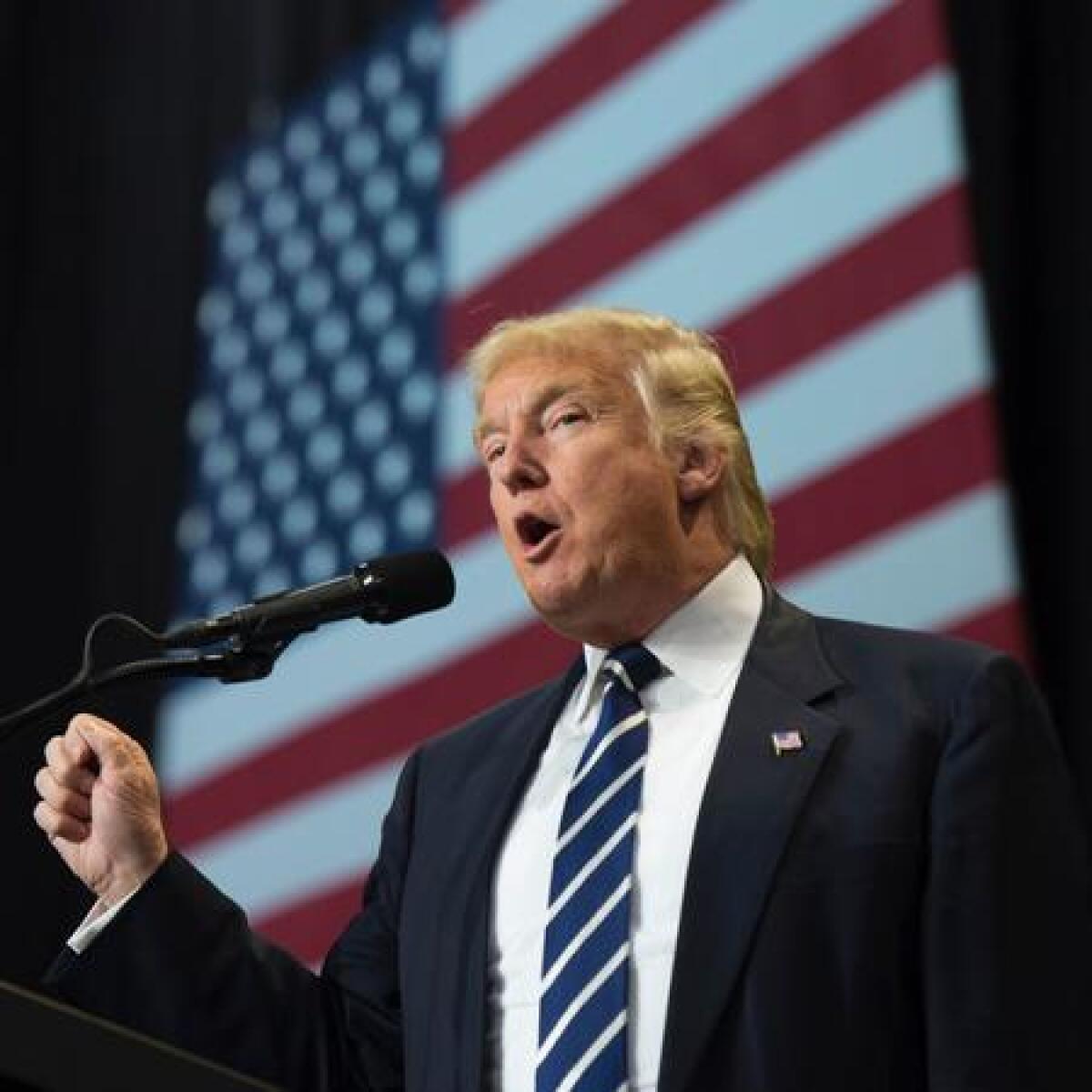
The Obama administration is taking apart a controversial, dormant national registry program that tracked visitors from countries with active terrorist groups for several years following the Sept. 11, 2001, attacks.
A final rule eliminating the program will be published in the federal register on Friday.
The move would make it more difficult for President-elect Donald Trump to revive the registry, which hasn’t been used since 2011. The Department of Homeland Security determined it was ineffective and didn’t improve security. Civil rights advocates have long said the program was discriminatory.
On the campaign trail, Trump promised to track Muslims coming to the U.S. and require them to register. He later changed his stance to say he would bar people from countries with a record of Islamist extremism.
Trump’s policy advisors have been looking closely at ways to jump start the registry, called the National Security Entry-Exit Registration System, after he takes office at the end of January.
With the program being officially dismantled on Friday, Trump’s team would have to issue new federal rules to restart it, a process that could take several months and would require a period for soliciting comments from the public, which likely would be contentious.
The Trump transition team is preparing several executive actions for the incoming president, Trump spokesman Jason Miller told reporters Thursday morning when asked about Obama dismantling the registry.
Stopping “radical Islamic terrorists” from entering the U.S. is of “paramount importance,” Miller said. He didn’t say directly if Trump would rebuild the visitor registry.
“The American people strongly support tough measures to keep radical Islamic terrorists out of our country, and President-elect Trump has made clear that we will suspend admissions of those from countries with high terrorism rates and apply a strict vetting procedure for those seeking entry in order to protect American lives,” he said.
When asked on Wednesday if he would set up a registry for Muslims or impose a ban on Muslim immigrants in the wake of the truck attack on a Christmas market in Berlin, Trump said simply: “You know my plans.”
Democratic lawmakers and civil liberties advocates have demanded in recent weeks that Obama dismantle the registry. They’ve cited a 2012 inspector general report that said Homeland Security databases collecting traveler fingerprints, flight manifests and intelligence information on foreigners are more effective at preventing terrorist attacks.
Sen. Patrick Leahy (D-Vt.) praised the Homeland Security Department’s decision to strip away “dead-letter regulations” no longer in use.
“These regulations symbolized an ineffective program based on religious and ethnic profiling, rather than individualized suspicion — a program based on fear, rather than reason,” Leahy said in a statement. “That has no place in this great country, under any administration.”
Trump is unwinding some foreign deals but many potential conflicts remain
The Trump hotel in Baku, Azerbaijan, would be “among the finest in the world,” Donald Trump promised two years ago, another example of “our involvement in only the best global development projects.”
But the dream of a world-class Trump Baku died this month, with Trump saying he was backing out of the deal because of delays and blown deadlines caused by the developer, a 34-year-old with close family connections to the country’s government.
The demise of Trump Baku is not an isolated decision. With his inauguration less than a month away, President-elect Trump’s company has pulled out of a few international business deals that might have created especially sticky conflicts and controversies for his administration.
Trump names UC Irvine professor and fierce China critic to new White House Trade Council
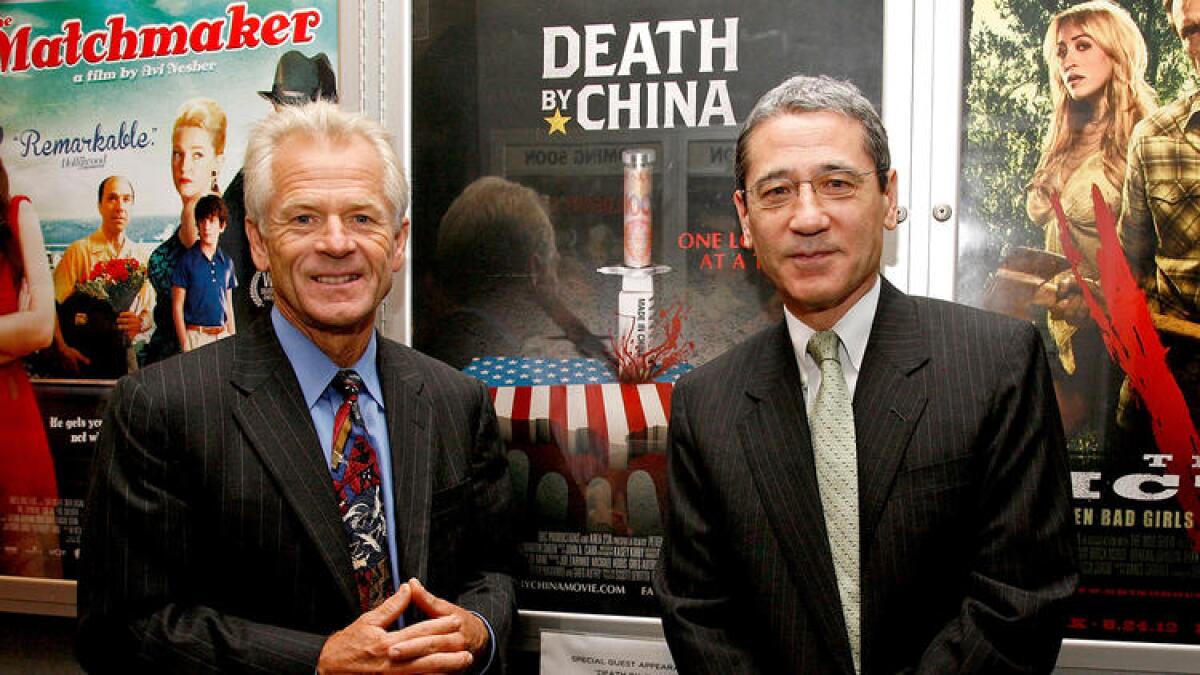
President-elect Donald Trump, signaling that he intends to follow through on his tough talk on trade, is establishing a new White House-based trade council to be headed by a vehement critic of China’s economic policies.
Trump on Wednesday named Peter Navarro, a Harvard-trained business professor at UC Irvine, as director of trade and industrial policy and head of the newly created White House National Trade Council.
The move sends a strong message: The Trump administration will take a much more aggressive posture to shrink the nation’s large trade deficit and combat what the president-elect and Navarro believe are forces behind America’s manufacturing woes — unfair and mercantilist practices on the part of China and other trading partners.
The issue of race has hung over Sen. Jeff Sessions like a shadow. Here’s why
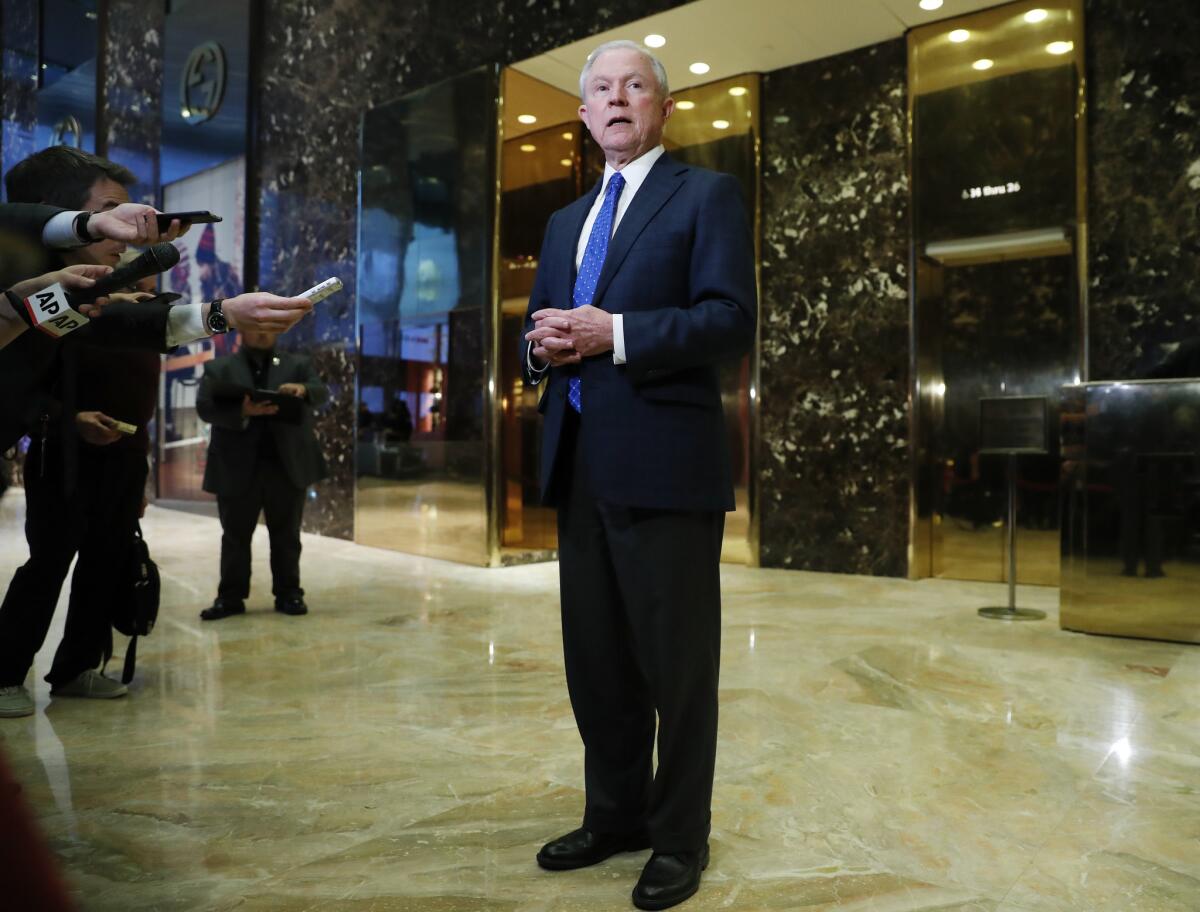
Jeff Sessions’ uneasy history with race can be traced back to the long, winding country roads that cut through the pine forests and farm land in this deep corner of the Deep South.
As a boy, Jefferson Beauregard Sessions III began each day before dawn, boarding a segregated bus to his all-white school. En route he and his classmates passed the bus ferrying black students in the opposite direction.
The day ended when he sat down to dinner each night with his father, an avowed segregationist until the end of his life.
Reflecting on those years, Sessions acknowledged recently that he knew back then that segregation was morally wrong and regretted standing by passively as civil rights leaders in the 1960s struggled and died in the fight for equality.
“I should have stepped forward more and been a leader and more positive force,” Sessions said in February while participating in a ceremony honoring the Selma “foot soldiers.”
Kellyanne Conway will join Trump in the White House
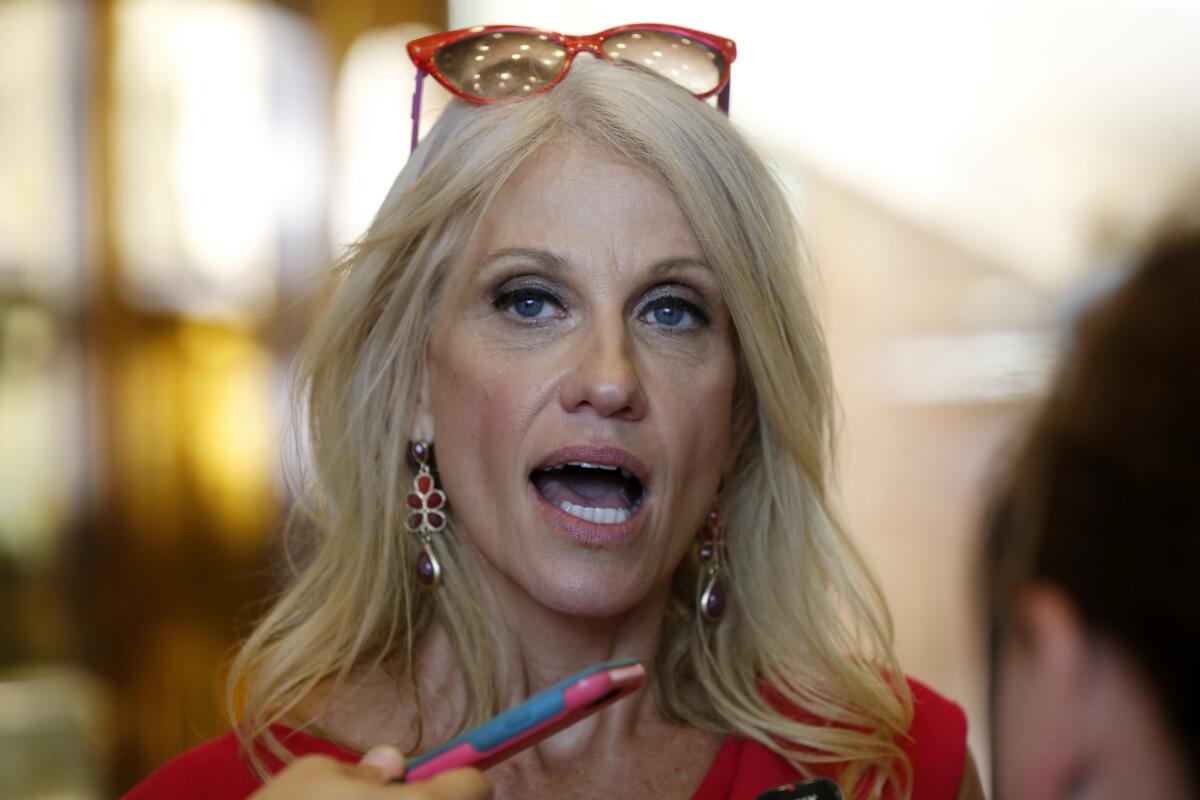
Donald Trump has named his media-savvy campaign manager, Kellyanne Conway, to advise him in the White House in the role of counselor, his transition team announced early Thursday morning.
The move comes after Conway sought to put to rest speculation that she would continue to serve as the public face of the Trump team. But the new job is sure to keep her profile high.
Conway will “will work with senior leadership to effectively message and execute the administration’s legislative priorities and actions,” according to a statement from the Trump transition team.
“Kellyanne Conway has been a trusted advisor and strategist who played a crucial role in my victory,” Trump said in the statement. “She is a tireless and tenacious advocate of my agenda and has amazing insights on how to effectively communicate our message.”
The appointment would boost diversity in a Trump inner circle made up mostly of older white men. It also sets up another potentially competing power center on a White House staff that already will have several, including Reince Priebus, the chief of staff; Stephen K. Bannon, the chief strategist; and Stephen Miller, the policy chief.
Conway had previously turned down other proposals for White House jobs, telling reporters late last month that she did not want to spend long hours away from her children.
At that point, Conway said she thought she could best help Trump by forming an outside organization to support his policies. But that role appears to have gone to Brad Parscale, who ran Trump’s online operations during the campaign.
Conway joined Trump’s campaign during the summer when it was beset with infighting and disarray. She is widely credited with helping bring message discipline and professionalism to an operation in desperate need of it.
In the run-up to the election and the weeks that followed, Conway was a ubiquitous presence on cable news networks, capably moving through her talking points in tough interview settings – often on the firing line and held to account for the exaggerations and incendiary remarks Trump was prone to make on the campaign trail and Twitter.
“I am humbled and honored to play a role in helping transform the movement he has led into a real agenda of action and results,” Conway said in the statement. She is the founder and owner of the Polling Company, inc./WomanTrend, a GOP firm that has been advising candidates for two decades.
Trump has not yet chosen a press secretary. But he is believed to be considering several candidates. Sean Spicer, former communications chief of the Republican Party who has served in a spokesman role for Trump through the transition, has been a prominent possibility, although Trump reportedly has considered several women, including conservative talk radio star Laura Ingraham and Fox News personality Kimberly Guilfoyle.
Trump Hotel employees in Las Vegas get a union contract
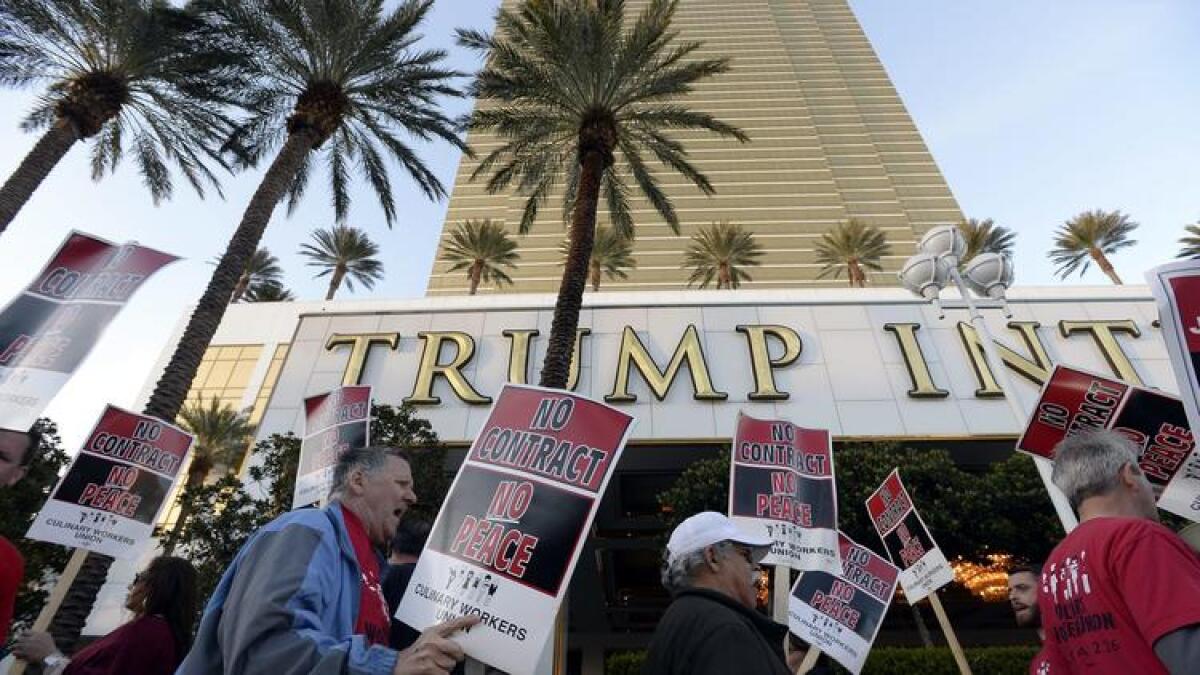
It’s owned by President-elect Donald Trump and is among a handful of hotels on the Las Vegas Strip to not be unionized.
But that will change soon.
For more than a year, Trump and his staff at the Trump International Hotel Las Vegas have fought efforts by employees and the Culinary Workers Union Local 226 to negotiate a contract. But a four-year contract announced by the union on Wednesday will offer Trump employees annual wage increases, a pension and family healthcare, among other benefits.
In Nevada, the culinary union is the state’s largest and most powerful, representing nearly 55,000 workers who serve cocktails and prepare food at hotels throughout the state. A majority of the union’s members are Latino.
Wait! Don’t cancel that Air Force One order just yet
After Donald Trump scolded Boeing earlier this month for the escalating cost of building a new Air Force One, the company’s CEO projected confidence that Trump wouldn’t be following through with his threat to “cancel order!”
The two men met together at Trump’s Mar-a-Lago resort in Florida on Wednesday. Boeing CEO Dennis Muilenburg said they spoke about a range of issues. The Air Force One project, which Trump complained would cost taxpayers more than $4 billion, invariably arose.
“We’re going to get it done for less than that, and we’re committed to working together to make sure that happens,” Muilenberg said. The company had previously noted that the project did not yet have a firm price tag.
“I was able to give the president-elect my personal commitment on behalf of the Boeing Company. This is a business that’s important to us. We work on Air Force One because it’s important to our country, and we’re going to make sure that he gets the best capability and that it’s done affordably,” Muilenberg added.
He called the conversation “terrific” and Trump “a good man” who is “doing the right thing.”
The presidential aircraft remains a long way from takeoff — a new plane won’t be ready for use in the next four years. Even if Trump is reelected, he might not get to use the plane, as the earliest projected date for completion is 2024.
Boeing is currently doing early development work on the plane — a modified 747 — that will likely be outfitted with such gadgetry as top-secret communications equipment, countermeasures to foil missile attacks, and aerial refueling capability that would enable it to remain airborne for days at a time if necessary.
The timing of delivery was among the topics that came up at Trump’s meeting with the Boeing CEO.
“That’s what we’re going to work on together,” Muilenberg said. “We have an active 747 production line, and we’re eager to get started on the program. We haven’t actually started the build of the airplane yet, but once we finalize the requirements and make sure that it’s affordable, we’ll launch on building the aircraft. We’ve got a hot production line and we’re ready to go.”
The government actually has two planes outfitted to serve as Air Force One, which is the designation given to whichever plane is carrying the president. The current planes, which were put into service during the Reagan administration, are nearing the end of their design life.
Fierce China critic and UC Irvine professor to head Trump’s new trade council
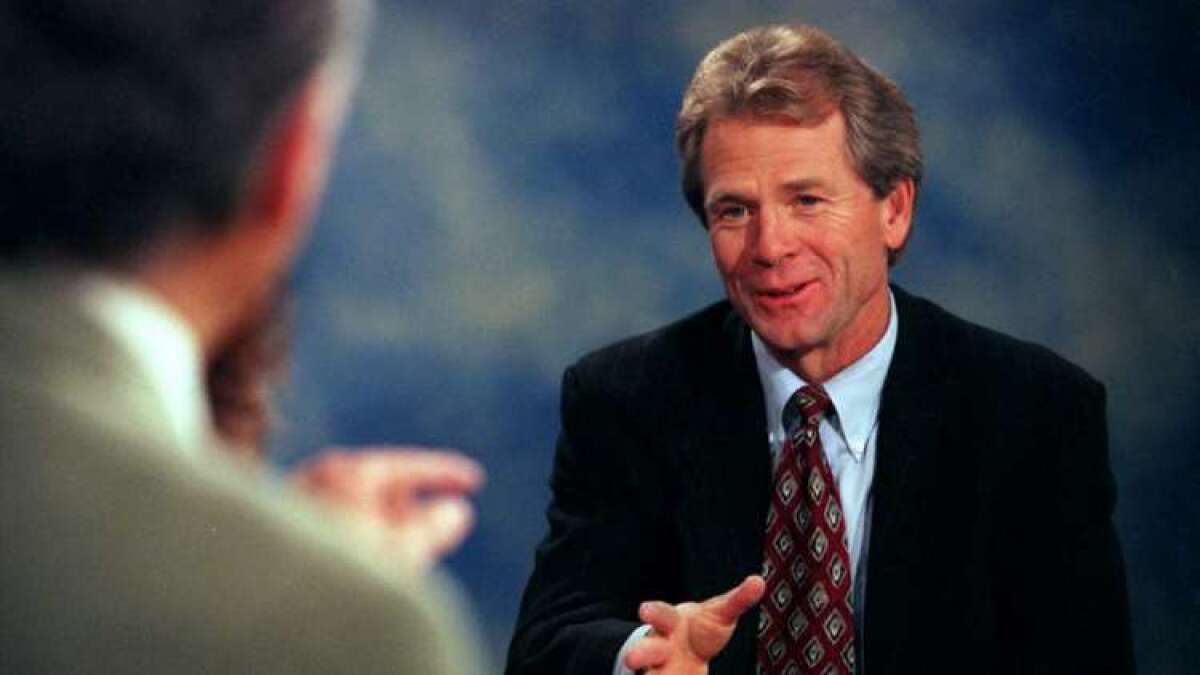
President-elect Donald Trump is establishing a new White House-based trade office that will be headed by a UC Irvine professor known for his fierce criticisms of Chinese trade and economic practices.
In appointing Peter Navarro as director of trade and industrial policy and the head of the new National Trade Council inside the White House, Trump is signaling that he wants to follow through on his tough campaign rhetoric in which he blamed the Chinese for the large U.S. trade deficit and manufacturing woes.
During the campaign,Trump threatened to slap a 45% tariff on Chinese imports.
Navarro, a Harvard-trained economist who advised Trump during the campaign, is the author of the book “Death by China: Confronting the Dragon — a Global Call to Action.” Trump endorsed the 2011 book as well as Navarro’s film version of the polemical work.
“I read one of Peter’s books on America’s trade problems years ago and was impressed by the clarity of his arguments and thoroughness of his research,” Trump said Wednesday in a statement announcing the appointment. “He will fulfill an essential role in my administration as a trade advisor.”
Trump said the new trade office would develop policies to shrink the nation’s trade deficit and curb the off-shoring of jobs, as well as to lead initiatives such as the Buy America, Hire America program.
Navarro, in a statement, said he would be honored to serve Trump and the nation and “to advise on policies to re-balance our trade, rebuild our industrial base, and restore America’s comprehensive national power by making America great again.”
Trump stops the ‘drain the swamp’ talk as new alligators emerge
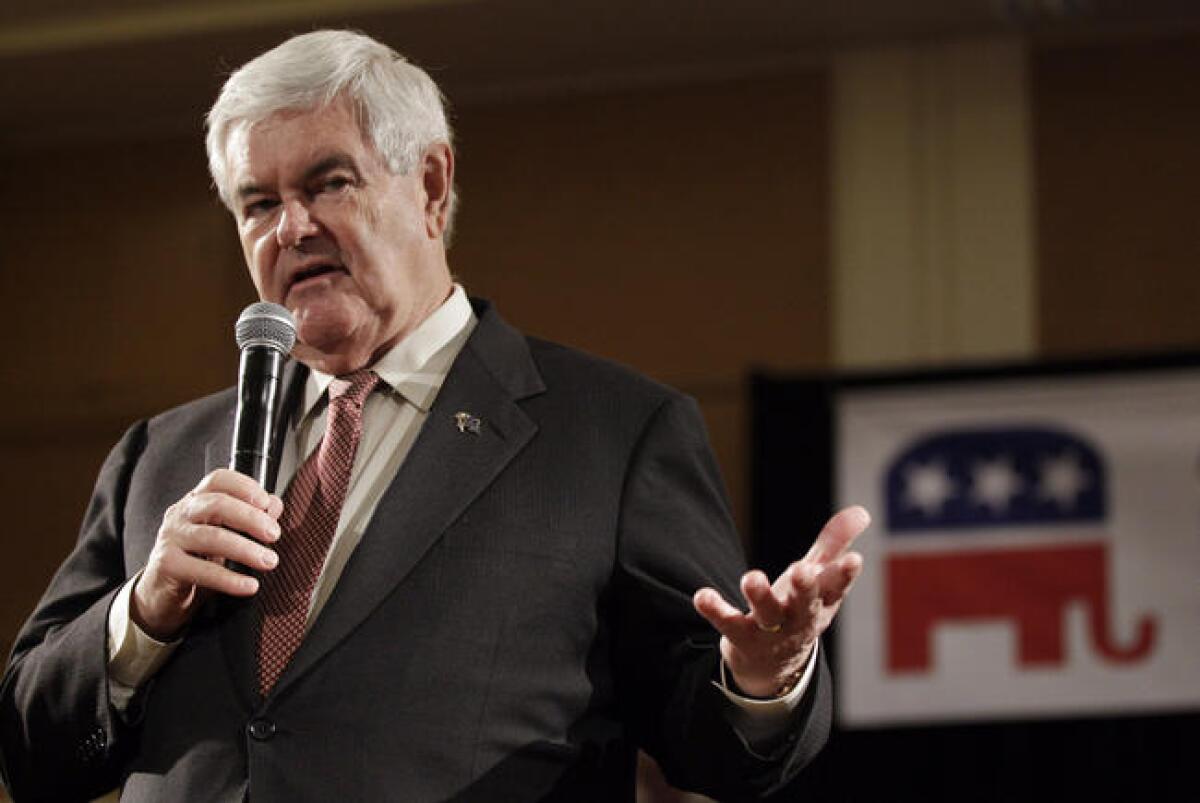
It made for a great slogan during the campaign, but now that he’s won, Donald Trump is finding that maybe he doesn’t actually want to “drain the swamp.”
In fact, the alligators seem to be doing quite well.
Former campaign manager Corey Lewandowski on Wednesday boasted about his access and proximity to Trump in announcing a new consulting firm he plans to open with former Trump campaign advisor Barry Bennett. The firm’s offices will be one block from the White House.
Clients who pony up what are sure to be hefty fees for the firm’s services are being assured by Lewandowski in his marketing materials that he turned down “multiple opportunities within the administration” so he can serve them.
The pitch implies Lewandowski will remain a de facto surrogate for Trump — with all the access that implies — as he bills those seeking to influence the Trump administration for his services.
So perhaps the time is ripe for Trump to stop using the “drain the swamp” phrase. And that is what Trump has decided to do, according to former House Speaker Newt Gingrich, who describes himself as an outside advisor to the president-elect.
“I’m told he now just disclaims that,” Gingrich said in an interview on National Public Radio, referring to the slogan Trump used in the final phase of his campaign to crystallize his promise to cleanse Washington of insiders and self-dealers.
“He now says it was cute, but he doesn’t want to use it anymore,” Gingrich said, adding that perhaps all this swamp draining talk isn’t presidential.
“He’s in a different role now and maybe he feels that as president, as the next president of the United States, that he should be marginally more dignified than talking about alligators in swamps,” Gingrich said.
“I personally have, as a sense of humor, like the alligator and swamp language,” he added. “I think it vividly illustrates the problem, because all the people in this city who are the alligators are going to hate the swamp being drained. And there’s going to be constant fighting over it. But, you know, he is my leader, and if he decides to drop the swamp and the alligator, I will drop the swamp and the alligator.”
Lewandowski, for his part, made no mention of swamps or alligators in announcing his new consulting firm would be open for business.
Death penalty in steep decline, but not in Los Angeles County
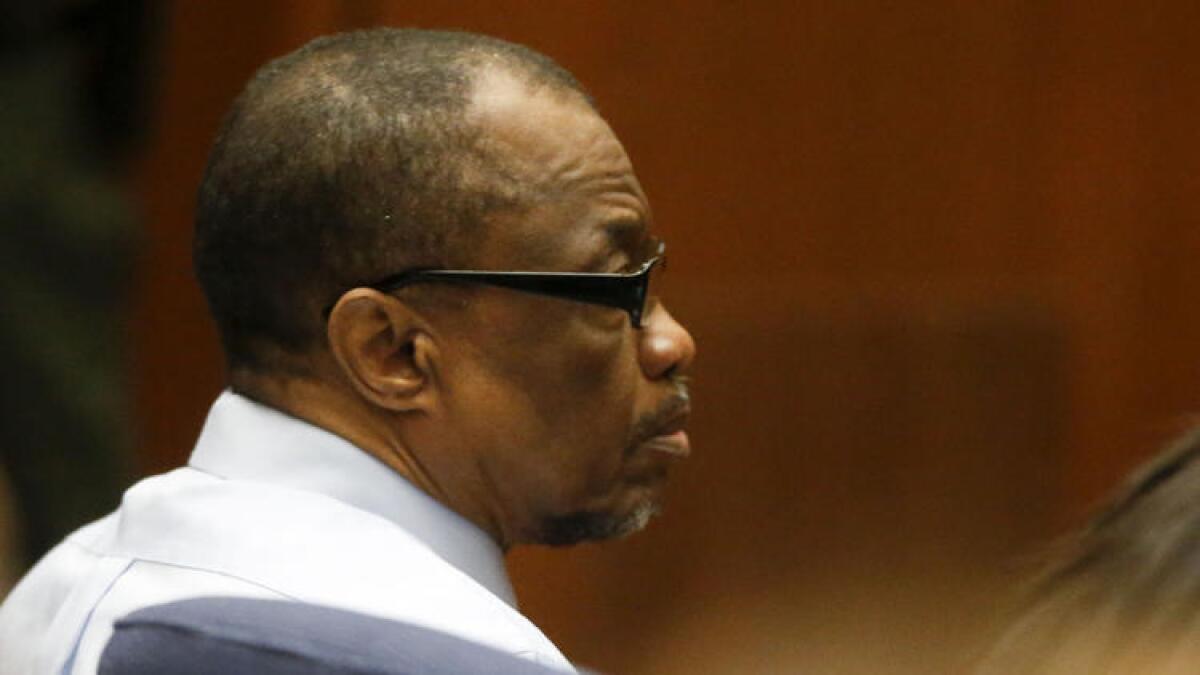
Los Angeles County and the state of California again recorded the most new death sentences this year, amid a sharp decline across the nation in both executions and new death sentences.
Judges and juries in Los Angeles County imposed a death sentence on four murderers during 2016, including Lonnie Franklin Jr., the so-called “Grim Sleeper,” who was convicted of killing 10 women. No other county had more than one death sentence, according to the Death Penalty Information Center.
Since 2010, Los Angeles County has recorded 36 new death sentences, more than any county in the nation.
This year marked the first time in more than 40 years where no state recorded 10 or more new death sentences, the group said in its year-end report. California had the most with nine, followed by Ohio (five), Texas (four), Alabama (three) and Florida (two).
California has by far the nation’s largest death row, with 750 condemned inmates, but it has not carried out an execution in the past decade.
Overall, the report documented the steep decline for capital punishment over the past two decades. The number of new death sentences had fallen by 90%, from 315 in 1996 to only 30 this year.
And the number of executions has fallen from a high of 98 in 1999 to 20 this year. Georgia (nine) and Texas (seven) accounted for most of the executions. The only other states to put inmates to death were Alabama (two), Missouri (one) and Florida (one).
Robert Dunham, the group’s executive director, says the nation is clearly turning away from capital punishment. “Whether it’s concerns about innocence, costs and discrimination, availability of life without parole as a safe alternative, or the questionable way in which states are attempting to carry out executions, the public grows increasingly uncomfortable with the death penalty each year,” he said.
But his report noted that California’s voters, by a 53%-47% margin, rejected a ballot measure to abolish the death penalty, and narrowly approved a measure, by a 51%-49% margin, to limit appeals and expedite executions.
New survey finds less optimistic Democrats seeking many paths to their future success
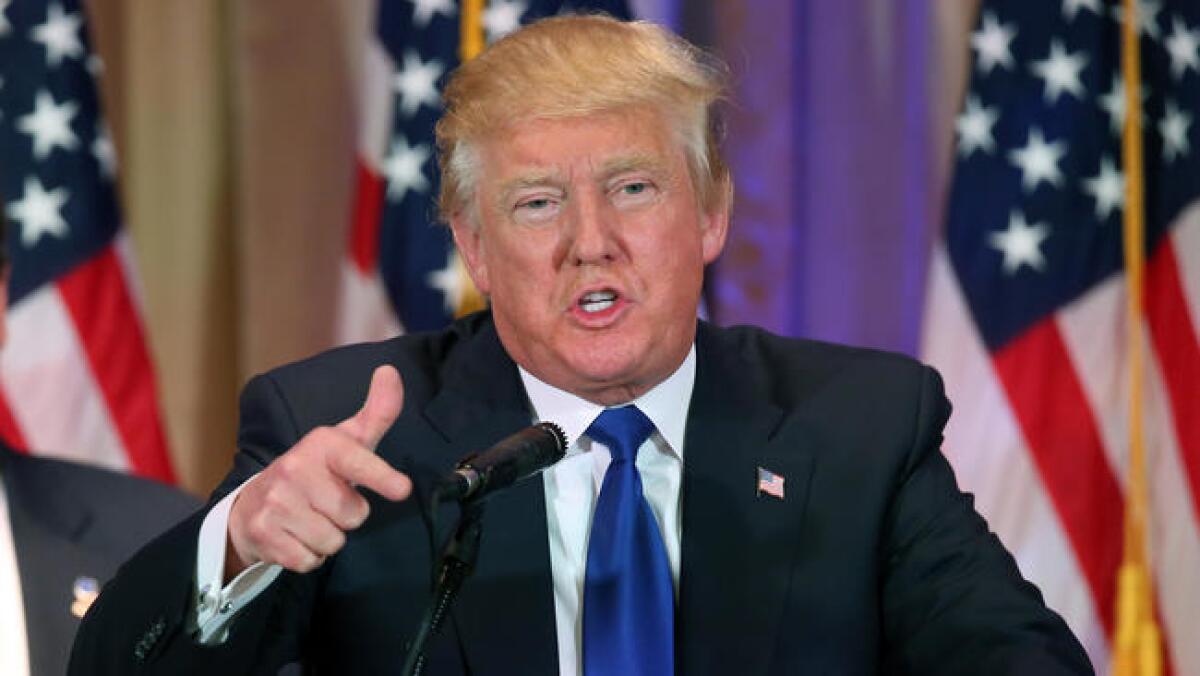
Since Hillary Clinton’s November defeat, Democrats have squabbled over how to return to prominence.
Should they continue to court ascendant voter groups in the country, such as women, minorities and young people? Or should they turn to those who have long been in their camp but abandoned the party nominee this year, such as rural and non-college-educated voters.
The answer, according to a Pew Research poll published Tuesday: Democrats want to walk both paths, simultaneously.
The poll asked Democrats and Republicans whether their parties had spent too much, too little or just the right amount of time meeting the interests and concerns of specific groups of voters.
Among Democrats, 64% said the party had spent too little time talking to rural voters, and 58% said the same about non-college voters.
Almost two-thirds of Democrats said low-income voters had not gotten enough of the party’s attention, and 58% said middle-class voters had been ignored to some extent.
But Democratic voters did not want to let up on the party’s outreach to its stronger supporters this year.
About half said that the concerns of women and African American voters had gotten too little attention, while 43% said the same about Latinos.
In the case of women, African Americans, Latinos, low-income voters, rural residents and younger voters, Democrats were substantially more likely than Republicans to say their party had not put enough emphasis on the groups’ concerns.
The poll suggested far more confidence by Republicans than Democrats in their party’s current positioning.
Much of that may simply be the flood of confidence that accompanies a presidential victory.
When the pollsters asked before the election about their view of their party, 61% of Republicans said they were optimistic, as did 77% of Democrats about their own party.
After the election those figures reversed, with 79% of Republicans optimistic compared with 61% of Democrats.
A key to Trump’s success also was evident in the poll: a chameleon-like ability to make the different ideological groups in the party think he was one of them.
Almost 3 in 5 conservatives said that Trump’s views were conservative. And among moderates, 52% said that Trump’s ideology was a mix of conservative and liberal, echoing their own posture.
But queries about the new president’s impact on his party drew sharply partisan responses. More than two-thirds of all voters said that Trump had forced major changes on his party.
Yet 72% of Democrats cast those changes as bad ones, while 83% of Republicans cast the changes as good ones.
The artist and the senator: One built a desert masterpiece, the other a Nevada legacy
When Sen. Harry Reid heard about a reclusive artist building a massive land sculpture across desolate acres in the Nevada desert, he knew they should meet.
It’s not just that Reid enjoys eccentrics and fighters, which he does. Michael Heizer had found an unusual way to express the majesty — and artistry — of the same lonely Nevada landscape that formed Reid’s childhood, when he would escape the dismal, rugged conditions of tiny Searchlight to play in the desert’s hidden springs and abandoned fortresses.
Both men discovered in Nevada what many outsiders miss. Far from seeing a nuclear wasteland, a dumping site or even a playground for gamblers, they drew inspiration from Nevada’s quiet beauty.
Heizer created an American masterpiece — a milelong complex of dirt, rock and cement rising from the desert floor like modern-day pyramids or the Mayan ruins of Chichen Itza.
For Reid, his appreciation for Nevada’s unique landscape became a cornerstone of one of the most lasting yet less-familiar pieces of his political legacy.
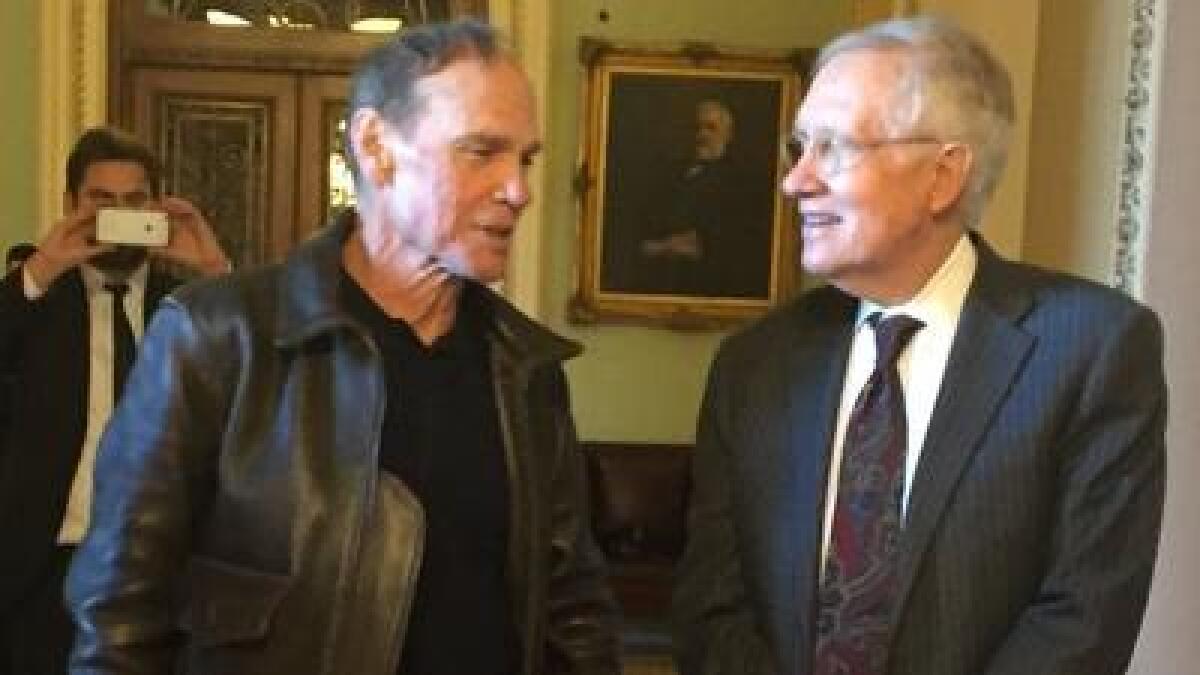
With 304 votes, electoral college seals Donald Trump’s election as president — despite more desertions than ever
They convened amid unusual scrutiny, widespread protests and rafts of speculation about efforts to alter the outcome, but, in the end, the nation’s 538 presidential electors mostly stuck to the script Monday, formally sealing Donald Trump’s victory with 304 votes in the electoral college, well above what he needed to capture the White House.
After all the efforts to lobby Republican electors to desert Trump, only two did — a pair from Texas, one of whom voted for former Texas Rep. Ron Paul and the other for Ohio Gov. John Kasich.
Indeed, instead of an uprising against Trump, the day’s voting was punctuated more by small, but persistent, gestures of Democratic discontent with Hillary Clinton. A handful of electors deserted her and a few more tried to, but were deterred by state “faithless elector” laws.
Some of the Democratic dissenters were supporters of Sen. Bernie Sanders of Vermont, who lost the primaries to Clinton but galvanized the party’s left wing. Others were backers of an abortive effort that had tried to recruit Democrats and Republicans to unite behind a third candidate other than Clinton or Trump.
In the end, seven electors voted for a person other than the candidate who won their states — the largest number of electoral college desertions in a presidential contest in U.S. history, eclipsing a record set in 1808.
As electoral college meetings end in Hawaii, Bernie Sanders gets a vote that will stick
The last of the 50 states gave Bernie Sanders his first electoral college vote that counted.
Hillary Clinton received three of the state’s four electoral votes after winning 60% of the popular vote here last month. But one elector, David Mulinix, said he cast his vote for the Vermont senator because he was the “most qualified” candidate.
“They can call me faithless, but the point is if we don’t think someone’s qualified — and Hillary Clinton I do not feel is qualified,” he said.
Hawaii’s electors are chosen by the major parties at their state conventions. Mulinix said he joined the party only this election cycle to support Sanders, who he said would have been elected president had he been the Democratic nominee. He had previously told the Associated Press he would cast his vote for Clinton, but said he changed his mind at the last minute.
“She did not lose the vote to Russian hackers; she lost the vote right there at the convention,” he said, referring to the Democratic National Convention, where he said Sanders’ backers were treated unfairly.
“They robbed us, and the millennials know it.”
Mulinix, who, like his fellow electors, wore a lei made of green jade flowers, arrived for the vote with a list of candidates who had received votes in other electoral college meetings across the country. He was aware that an elector in Maine had tried to vote for Sanders but that his vote had been invalidated. An election official said the vote for Sanders here would count.
The brief proceedings here in a nondescript conference room on the state Capitol’s third floor began with another elector, John Bickel, asking whether there was any penalty for electors who cast their ballots for someone other than the winner of the statewide vote.
He said later that he had asked because he suspected someone might stray.
“The electoral college is outdated. If any election has proved the electoral college is outdated, it’s this one,” Bickel said.
Dolly Strazar, another elector and the vice chair of the state Democratic Party, said she had long supported the electoral college because it ensured some degree of competition between large states and small ones like Hawaii.
“It really seems in our times, it’s thoroughly outdated,” she said.
Janice Bond, the fourth elector, said she would have voted for Sanders but did not believe she was able to. She also expressed regret that President Obama, who was born in Hawaii and is vacationing here with his family, did not attend the meeting.
“To have him be on our island and not show face was disappointing,” she said.
‘No fireworks’ as Nevada electors cast votes for Clinton
Nevada’s six electors cast their votes for Hillary Clinton on Monday afternoon in Carson City, reflecting her victory in the swing state despite losing the overall electoral college vote to President-elect Donald Trump.
Clinton won Nevada by almost 3 points over Trump, and the swing state was one of her few bright spots on election day.
The six electors – five from northern Nevada and one from Las Vegas – cast their ballots before about 75 people who had packed into the Old Assembly Chambers of the state Capitol. A few brought signs in support of Clinton, and there was some applause when the votes were cast. It all took place in less than a half-hour.
“No fireworks,” said Wayne Thorley, deputy secretary of state for elections.
He said about 40 people showed up in front of the state Capitol in the morning in sub-freezing temperatures to also show support for Clinton. Thorley said he hadn’t anticipated a lot of controversy as the electors were required to sign a pledge before voting that said they wouldn’t deviate from Nevada’s Nov. 8 election results.
In solemn ceremony, California electors cast votes for Hillary Clinton
In a proceeding long on formalities and short on speeches, California’s 55 electors cast their vote for Democratic presidential candidate Hillary Clinton on Monday, a ceremony that coincided almost exactly with Republican Donald Trump clinching the national electoral college win.
Contrasting with the spirited protests outside the state Capitol, the mood in the state Assembly chambers was muted, even a bit glum, as electors, tapped by the state’s Democratic establishment, convened to cast their votes for Clinton. California, which overwhelmingly backed Clinton in the presidential contest, requires all 55 electors to back the state’s winner.
“Today’s solemnity and formality reminds us that in our nation, American greatness and American independence, rests on a foundation of law,” said Assemblyman Ken Cooley (D-Cordova), who presided over the event.
As written ballots were distributed, the room was completely silent, save for the clicking of camera shutters. Just moments before voting began, Trump, Clinton’s rival, had secured the electoral college win, with Texas, California’s perennial rival, putting him over the top. His victory went unacknowledged in the ceremony.
Among the electors were current elected officials, such as Assemblywomen Susan Talamantes Eggman of Stockton and Shirley Weber of San Diego. Others included Christine Pelosi, daughter of House Minority Leader Nancy Pelosi, and Laphonza Butler, leader of the powerful labor union SEIU in California. Electors did not make individual speeches during the main ceremony, and Trump’s name was hardly mentioned.
But there were subtle references to the rancorous political season: Rev. Bob Oshita, the Assembly chaplain and former reverend of the Sacramento Buddhist Church, urged leaders to engage in “calming self-reflection” in an opening prayer.
The tone grew considerably sharper at the end of the gathering, when Pelosi offered a motion calling for an investigation into Russian efforts to influence the election outcome.
“I move that as an Electoral College, we do not normalize this election. We do not accept Russian interference in our election,” Pelosi said. Her motion was adopted by electors, with applause.
This post was updated at 3:32 p.m. with comments from Christine Pelosi. It was originally published at 3:12 p.m.
All of Florida’s electoral votes go to Trump
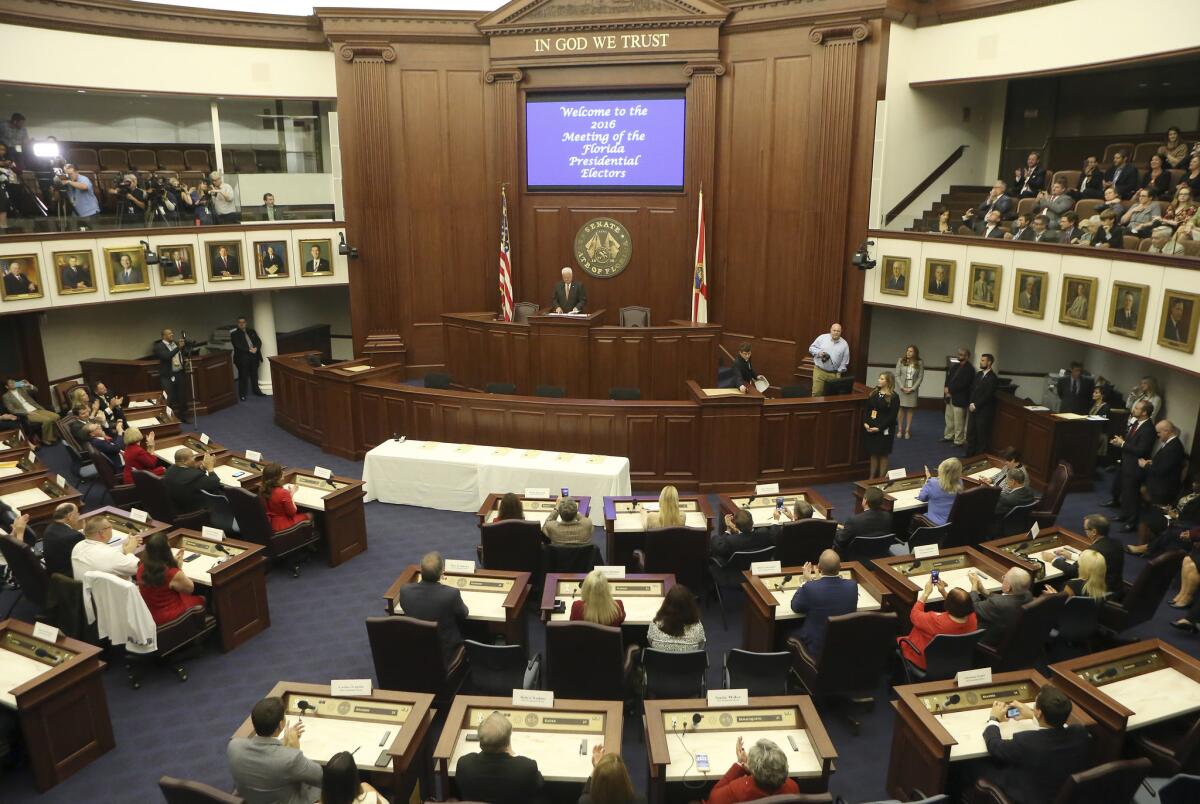
Donald Trump officially won all 29 of Florida’s electoral college votes on Monday during a ceremony held at the Capitol in Tallahassee, despite pleas from protesters to electors to change their vote at the last minute.
About 100 protesters gathered outside the Florida Senate chambers before the vote, chanting “love trumps hate” and “flip the vote” and holding signs that read “Vote Your Conscience, Don’t Make Russia Great Again!”
The electors, made up of Republican Party of Florida members and high-ranking elected officials like state Atty. Gen. Pam Bondi, Senate President Joe Negron and state party chairman Blaise Ingoglia, did their best to ignore the protesters.
Mexican billionaire Carlos Slim was a Trump nemesis. Now the president-elect says he’s ‘wonderful’
Donald Trump has decided that Mexican billionaire Carlos Slim, one of his favorite villains during the presidential election, might not be so bad after all. He’s even “wonderful,” Trump now says.
The two dined together Saturday at Trump’s Mar-a-Lago resort in Florida, after which Trump had only nice things to say about Slim, according to a report in the Washington Post. Trump described the interaction with his erstwhile nemesis as “a lovely dinner with a wonderful man.”
This is not how Trump talked about Slim, one of the world’s richest men, during the election. The Mexican billionaire was a regular target of the then-GOP nominee because of his large ownership stake in the New York Times. Add to that Slim’s generous contributions to the Clinton Foundation and his citizenship in the country Trump reveled in attacking, and he made for good fodder at Trump rallies.
When Trump objected to the New York Times coverage of his campaign — and its reporting on the allegations by multiple women of past inappropriate sexual advances by Trump — he alleged it was all part of a conspiracy cooked up by Slim. Trump called the outlet’s reporters “corporate lobbyists for Carlos Slim and for Hillary Clinton.”
The New York Times called Trump’s charges a fabrication, saying Slim had never inserted himself in editorial decision making there. And Trump offered no evidence to the contrary. A spokesman for Slim said at the time the two had never met, and the Mexican businessman had no interest in involving himself in the U.S. election.
Now they’ve met. The takeaway from the meeting, though, is murky. Maybe it indicates Trump is softening his posture toward Mexico — or maybe it just indicates billionaires enjoy the company of other billionaires.
Meet the California electors
Among the electors are Janine Bera, the wife of Rep. Ami Bera of Elk Grove; Christine Pelosi, the daughter of House Minority Leader Nancy Pelosi and chairwoman of the state party’s women’s caucus; Eileen Feinstein Mariano, granddaughter of Sen. Dianne Feinstein; and Olivia Reyes-Becerra, daughter of Rep. Xavier Becerra of Los Angeles.
State Assemblywomen Susan Eggman of Stockton and Shirley Weber of San Diego, former state Sen. Christine Kehoe of San Diego, Los Angeles City Councilwoman Nury Martinez and Laphonza Butler, president of the Service Employees International Union chapter that represents home care employees, also are on the list.
All of California’s electoral votes go to Clinton
Three Washington state Democratic electors vote for Gen. Colin Powell, one for Faith Spotted Eagle
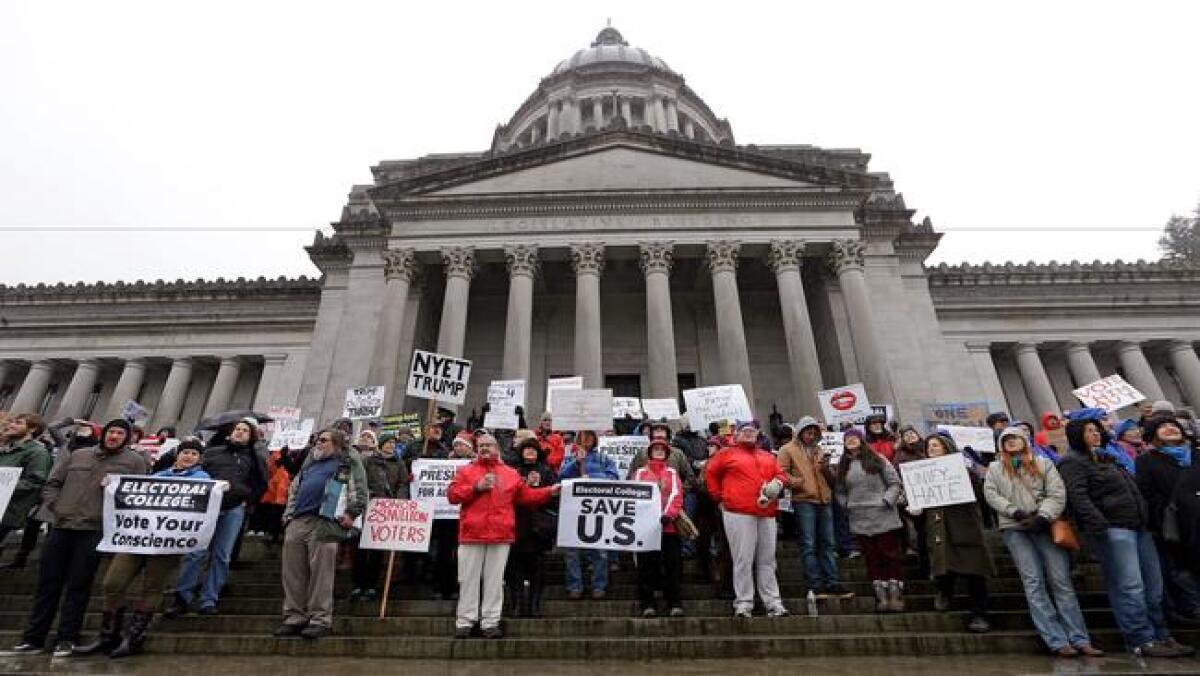
Despite a statute binding the 12 members of the electoral college to vote for the winner of the state’s 2016 presidential election popular vote, four Washington electors made history and risked a $1,000 fine by voting for someone else Monday. But it wasn’t Donald Trump.
Hillary Clinton, supported by 57% of the state’s voters, wound up with eight of the 12 electoral votes at a session held in the State Capitol building here.
Gen. Colin Powell received three votes. And Faith Spotted Eagle, an elder of the Yankton Sioux, received one.
Colorado elector says he was ‘oppressed’ by state law into voting for Clinton
In Denver, all nine electors voted for Hillary Clinton, after one was replaced for casting his ballot for Republican Ohio Gov. John Kasich instead.
A boisterous crowd packed the state Capitol and booed when elector Michael Baca was dismissed and another sworn in to take his place.
“Vote your conscience!” someone cried.
The new elector voted for Clinton.
Hecklers screamed “Resign! Resign!” at Secretary of State Wayne Williams after he shooed Baca’s lawyer off the podium.
Suspense had been building for weeks over how the electors would vote. Two courts blocked their attempts to vote for someone other than Clinton. State law here says electors must support the candidate who won the popular vote.
On Sunday night they went to court again, this time asking a judge to reject a new oath drawn up by the secretary of state requiring electors to pledge to support the winner of the popular vote. Their motion was denied.
As they waited, the crowd sang “This Land is Your Land” and “America the Beautiful.”
But once the electors filed in, it was over quickly.
Elector Robert Nemanich said he was “oppressed” by state law into voting for Clinton and would go to the U.S. Supreme Court. He did not elaborate.
Lance Armstrong, 68, stood outside with an American flag.
“I’m glad some of the electors made a point today,” he said. “Any point is better than none.”
Trump officially gets 270th electoral vote, sealing his election as president
Donald Trump has obtained the required 270 electoral votes to become president.
Although electors in dozens of states still have to vote, the electoral balloting in Texas put Trump over the majority threshold, according to a state-by-state tally by the Associated Press. Thirty-six of the state’s electors voted for Trump, one for John Kasich and one for Ron Paul.
The next, and last, official step in the electoral process is for Congress to count the votes. Under the procedure set out by the 12th Amendment to the Constitution, that formal process is scheduled for Jan. 6.
Some anti-Trump activists had hoped against hope that they could persuade electors in states that voted for Trump to defect, but their efforts were unsuccessful.
Electors are nearly all party loyalists. Additionally, they faced more than two centuries of tradition and, in some states, legal obligations that called for them to cast their ballots according to which candidate won the popular vote in their states. No defectors have ever changed the result of a presidential election.
Four electors today successfully defected in Washington state. Instead of voting for Hillary Clinton, who won the state’s popular vote, three electors voted for former secretary of State Colin Powell and one voted for Faith Spotted Eagle, an environmental activist. Electors in two other states who tried to vote against the state’s winner were replaced with alternates. There may be additional defections in the remaining states, but since Trump now has a majority of the electoral votes, those would not be enough to change the result.
Emotions high in Maryland as electors unanimously vote for Clinton
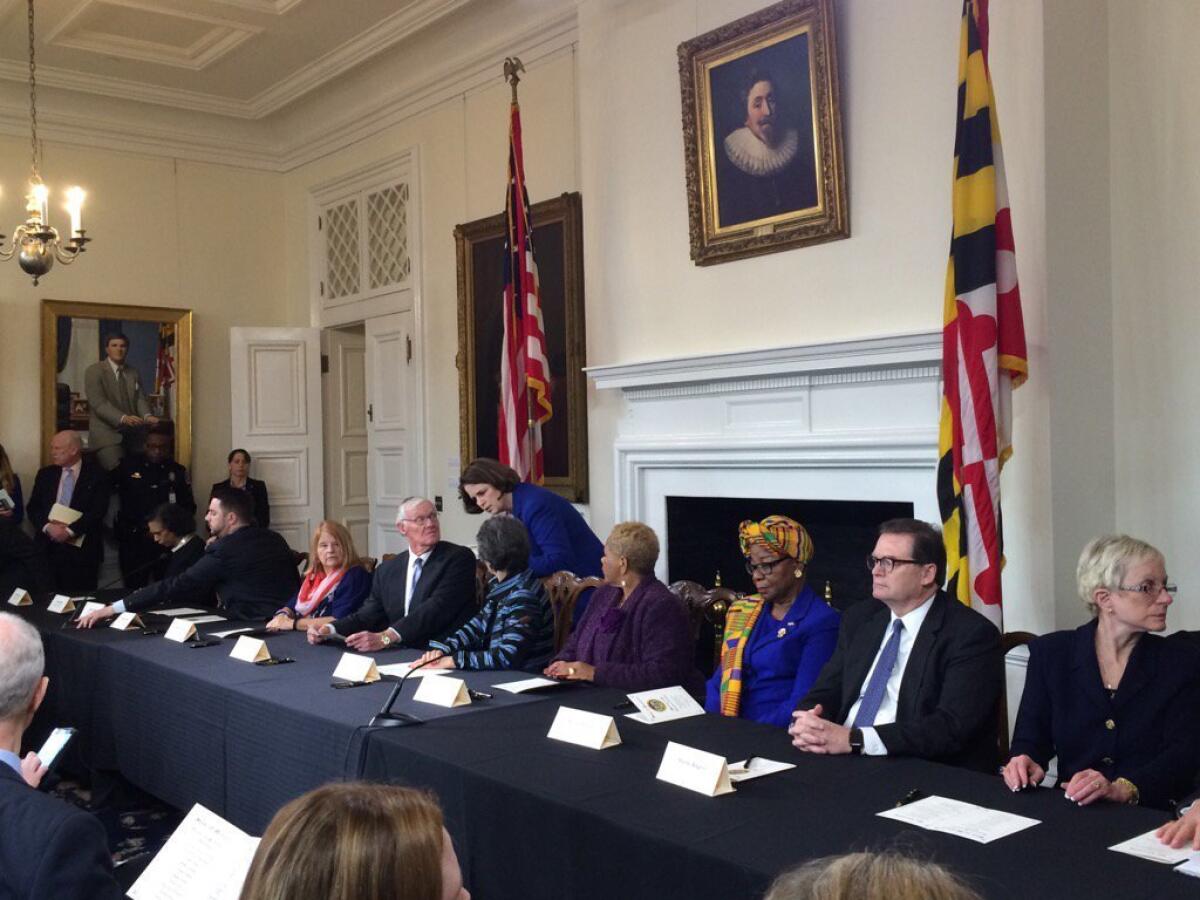
As Maryland’s 10 electors unanimously cast votes for Democrat Hillary Clinton for president Monday, several said they were privileged to vote for the county’s first female presidential nominee.
Outside, hundreds of anti-Trump protesters cheered as the solemn ceremony unfolded on live-stream television. A state delegate, who had the ceremonial task of handing the electors’ votes to another official, wept while executing her duty.
“This is an emotional moment for many, many women in this country and in this state,” said Del. Maggie McIntosh, a Baltimore Democrat. She added later: “I guess I didn’t cry enough on Nov. 8.”
Maryland’s electors were bound by state law to vote for the winner of Maryland’s popular vote, which Clinton secured with more than 60% of the ballots cast.
About 100 protesters who had been chanting and singing around the historic State House grounds for at least four hours before the vote said they came in solidarity with protesters in Republican state capitols, pleading with electors not to endorse President-elect Donald Trump.
“This is appalling and unacceptable, and I’m hoping the Republicans, in particular, rise above and do the right thing,” said Cheryl Kreiser, a retired teacher from the Washington, D.C., suburb of Silver Spring. For an hour every day for the last 21 days, Kreiser has protested Trump’s win on the steps of the Lincoln Memorial. “It was the only way I could cope with the disappointment,” she said.
Maryland’s Republican Gov. Larry Hogan, who wrote in his father’s name rather than vote for Trump on election day, opened Maryland’s 58th electoral college meeting but left the room before electors were sworn in. Each elector had been appointed by the Maryland Democratic Party state chair, Bruce Poole, who reminded the crowd the United States is not a direct democracy ruled by the popular vote.
“A lot of people lose sight of the fact that we’re a republic. We’re not a democracy,” Poole said. “The whole idea was that the president would not be chosen just by the whims of the moment, but instead there would be an opportunity for people who were thoughtful, who had judgment, who had integrity to take a step back from the moment of emotion and consider what would be in the best interest of the country.”
Before he introduced Maryland’s electors, Poole lamented the state of political discourse in the country.
“We live in the age of information. It is not necessarily the age of wisdom or age of judgment,” he said. “People on both sides, on all sides, make decisions at the snap of a finger.”
Maryland was both the model for creating the electoral college and the first state in the country to vote to bypass it. Framers modeled today’s system after the way the Maryland House of Delegates selected Maryland senators, a process the state later abandoned after it was considered undemocratic, according to a history of the electoral college written by staff at the Maryland Board of Elections. Hogan noted the state is one of six to have participated every year since 1789.
In 2007, Maryland was the first state to vote to sign the National Popular Vote Interstate Compact, a promise designed to award the electoral college to the winner of the national popular vote. It required enough states to comprise 270 votes to sign on for it to take effect. So far, only 10 states — including California — with a combined 165 votes have signed the compact.
The president of Maryland’s electors, Courtney Watson, also co-chaired Clinton’s campaign in Maryland. She said she thought changes to the electoral college should be considered and described Monday as a poignant moment for Maryland residents.
“It’s a very emotional time,” she said. “Many of us have worked long and hard, and for the first woman candidate. The point, though, is that people are still moved and even more engaged. And that’s what I find promising for our future and the future of women.”
Christine Pelosi, daughter of Nancy Pelosi and California elector, demands to know the truth about Russian influence
California elector Christine Pelosi on Monday told crowds gathered outside the Capitol that she has been part of a chorus of people demanding to know the truth about Russian interference in the November presidential election.
Pelosi, House Minority Leader Nancy Pelosi’s daughter, is leading 10 other electors in a call for an intelligence briefing on Russian influence.
Shouting into a microphone Monday, she said Russian hackers aim to turn the American people against each other and had marginalized her and others for speaking out.
“They trespass on servers,” she said. “They receive stolen emails. They pump out stories that day after day focus on scandal rather than policy, rather than talking about climate and immigration and human rights.”
California’s meeting of electors is about to get underway in the state Capitol.
After prayer for national unity, Georgia electors vote for Trump
Outside the Georgia Capitol today, some may have held a flicker of hope that a GOP elector would refuse to cast a ballot for Donald Trump as 45th president of the United States.
Yet among the inner circle of Republicans who gathered inside the cozy, wood-paneled Senate chamber, there was little doubt about what would unfold.
One by one, all 16 electors -– dressed in formal business suits and red dresses, bow ties and blazers -- cast their ballots for the contentious Republican candidate.
It was a short ceremony, with little opportunity for disruption. Security guards prevented the public from entering the chamber, cordoning off the hallway outside the room with a red rope and locking the main door before proceedings began.
The electors chosen by Georgia’s Republican Party included well-connected attorneys and real estate agents, a high school teacher and a farmer. As they waited for the gathering to begin, many snapped selfies and waved at loved ones above in the upper gallery.
After a call to order by the Georgia Republican Party chair, the electors bowed their heads, and Rachel Little, an elector and grass-roots Republican organizer, delivered an invocation.
“Lord, we know we are a divided country right now,” she said. “We pray that you will unite us. … We pray that [those who oppose Trump] will see our conservatism lived out in a gracious way.”
In a short speech, Gov. Nathan Deal hit out at activists who had bombarded electors with emails, letters and phone calls in an effort to sway their votes.
“You have been the subject of harassment by those who perhaps are not as dedicated to the proposition of what this body is supposed to do as they are agitated by the fact that the people didn’t do what they wanted them to do.”
“I have every confidence you will not succumb to that,” Deal told the electors. “My words to you: Do your job.”
Shortly before the electors cast their ballots, Rep. Barry Loudermilk, a Republican who represents Georgia’s 11th District, took to the podium to present a short history of the electoral college.
“Our founders actually despised the idea of democracy because mob rule often results in a decision made out of pure emotion,” Loudermilk told the electors, after referencing the “noise” of protesters outside. “It does not result in good government. In fact, our founders often cited the historic trial of Jesus as how mob rule does not work.”
The electoral college was devised to protect the integrity of government, Loudermilk said.
“To protect those who live in the rural areas of America, those who work, those who are part of the farming communities and part of the industrial communities, those who live and work every day, that their interests are protected as well of those who make their living on Wall Street.”
For a moment earlier this year, there was an inkling of a Republican revolt against Trump in Georgia. In August, Baoky Vu, a GOP elector based in Decatur, Ga., admitted he might not cast his ballot for Trump if he won. Within hours, however, he was forced to resign.
Trump went on to win 51% of Georgia’s popular vote. On Monday, Vu did not show up at the Capitol, and he was formally replaced by a solid Trump backer, John Padgett, the chairman of the Georgia Republican party.
There seems little chance that Georgia legislators might vote to overhaul the electoral college. Earlier this year, Republican legislators authored two bipartisan pieces of legislation in Georgia’s House and Senate that would have made Georgia’s electoral votes based solely on the outcome of the national popular vote. Yet both bills stalled, and Republicans say there is little momentum to revive the debate.
“The system prevents the tyranny of the majority,” said Kirk Shook, an elector who is a high school teacher in rural Oconee County. He scoffed at those who, since the election, had sought to overhaul the electoral college system.
“There’s all this weeping and wailing and gnashing of teeth,” Shook said of those who opposed Trump’s win. “And rightly so. There’s going to be a Republican president, a Republican Congress and a Republican Supreme Court. With the stroke of a pen, 90 percent of what Obama considered his legacy will be gone.”
Four Washington state electors defect from Clinton; one chooses Faith Spotted Eagle instead
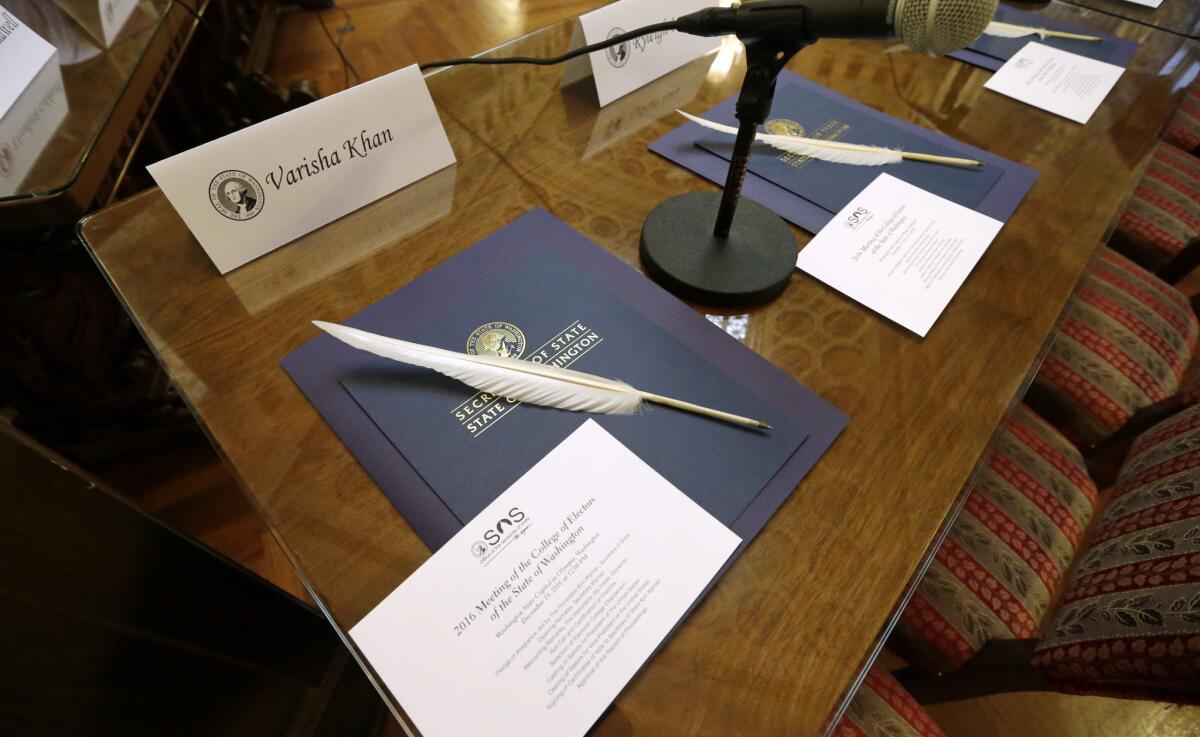
Four members of the electoral college in Washington state cast their votes for a candidate other than Democrat Hillary Clinton, who won the state’s popular vote.
It’s the first time in four decades the state’s electors have broken from the popular vote for president. Washington’s 12 electors met Monday afternoon in the state Capitol to complete the constitutional formality. Clinton got eight votes while other candidates got the remaining four.
Elector Bret Chiafalo, who earlier in the day said he planned to vote for Republican Ohio Gov. John Kasich, said that he ultimately changed his vote to former Secretary of State Colin Powell after conversations with other Washington electors. The exact breakdown of the other four votes wasn’t immediately known, although at least one vote was cast for “Faith Spotted Eagle.”
In last month’s election, Republican Donald Trump won 306 electoral votes to Clinton’s 232, though Clinton’s tally will now be lower.
A candidate needs 270 electoral votes to win.
The last time an elector broke from the popular vote in Washington was in 1976, when Mike Padden, who is currently a Republican state senator, voted for Ronald Reagan instead of Gerald Ford, who had won the state.
In California, which Clinton won in a landslide, protesters are railing against the electoral college
Hundreds protest the electoral college at Capitol building in Sacramento
Cheers and chants of “U.S.A” and “Keep him out” filled the air Monday, as dozens of protestors gathered outside the California Capitol in a last ditch attempt to sway the electoral college from voting for president-elect Donald Trump.
Speakers called Trump a celebrity and authoritarian “unfit” for the presidency. And they urged Congress to do away with the electoral college process, which they described as an outdated and broken system susceptible to foreign influence and manipulation.
“This is a secret system of voting where we are not allowed to see where the votes are actually coming from or how they are counted,” Brent Turner, with the movement organization Democracy Spring, shouted into a microphone.
John Franco, a 52-year-old business owner visiting Sacramento from New Orleans, said he came to the demonstration with his family to protest that secret process.
“We don’t feel a system that can be manipulated represents the interests of the people who voted for Hillary Clinton,” he said.
Rochelle Towers, 68, said she drove in from Oakland in an attempt to persuade the electoral college from voting for Trump. She said she would not have to live through a lot of what its decision would set in motion.
“But my children and grandchildren will,” she said. “Even though this is a real long shot, I’ll take any shot that there is.”
Colorado elector removed after refusing to vote for Clinton
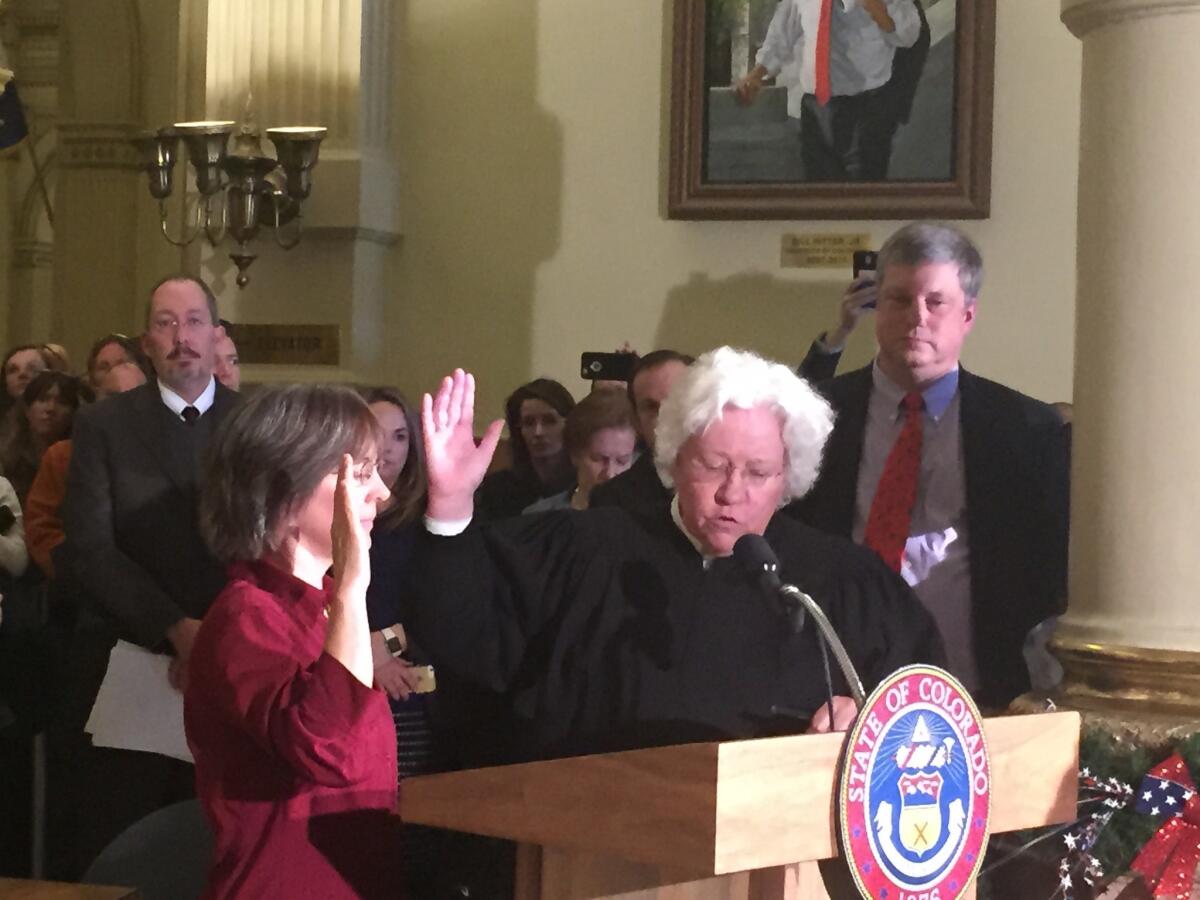
Eight of nine Colorado electors have voted for Hillary Clinton.
One elector, Michael Baca, refused to vote for Clinton and was immediately replaced with an alternate, who was sworn in on the spot.
As the crowd jeered, the new elector promptly voted for Clinton.
Shouts of “Resign!” followed Secretary of State Wayne Williams’ announcement of the results.
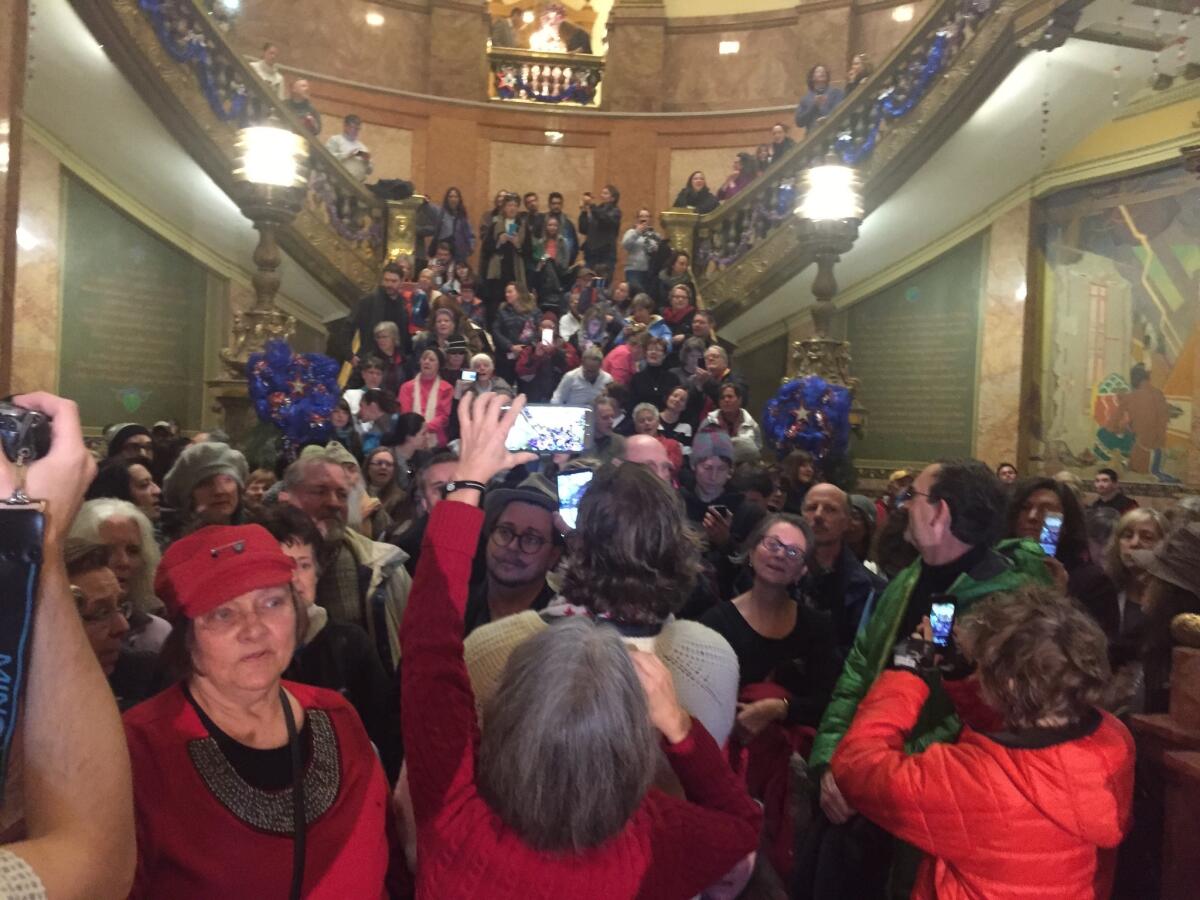
Electors say they have been barraged with emails
Arizona elector J. Foster Morgan said he had received several letters protesting the election of Donald Trump, but experienced nothing on the scale of some his fellow Arizona electors whose email addresses were distributed to protest lists.
“They heard the worst thing imaginable,” Morgan said. “I just got a few letters.”
Despite protests outside the meeting, Morgan said, the vote “went fine.”
Eleven votes for Donald Trump.
Democratic electors in Minnesota and Maine try to vote for Bernie Sanders
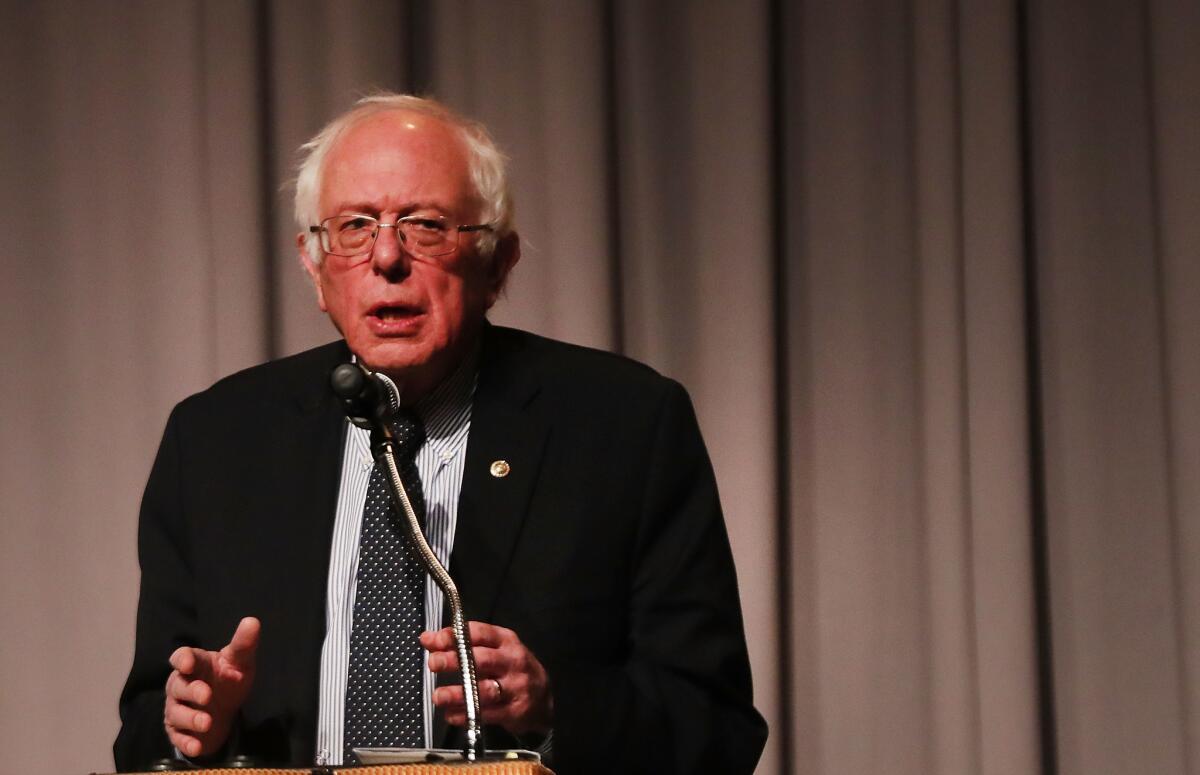
A second elector — this one in Minnesota — has refused to cast a vote for Democrat Hillary Clinton in Monday’s electoral college tally.
It wasn’t immediately clear why Muhammad Abdurrahman didn’t vote for Clinton, but he was a delegate for Bernie Sanders at the Democratic National Convention.
The electors are pledged to cast Minnesota’s 10 electoral votes for Clinton since she won the state.
Abdurrahman was immediately replaced by an alternate who later voted for Clinton.
Earlier in the day, a so-called “faithless elector” in Maine cast his vote for Sanders, who lost the Democratic presidential nomination to Clinton. David Bright said on his Facebook page that he cast his vote for Sanders because voting for Clinton would not have helped her win.
But he ultimately voted for Clinton on a second vote after being ruled out of order.
Utah voting goes off without incident — six for Trump
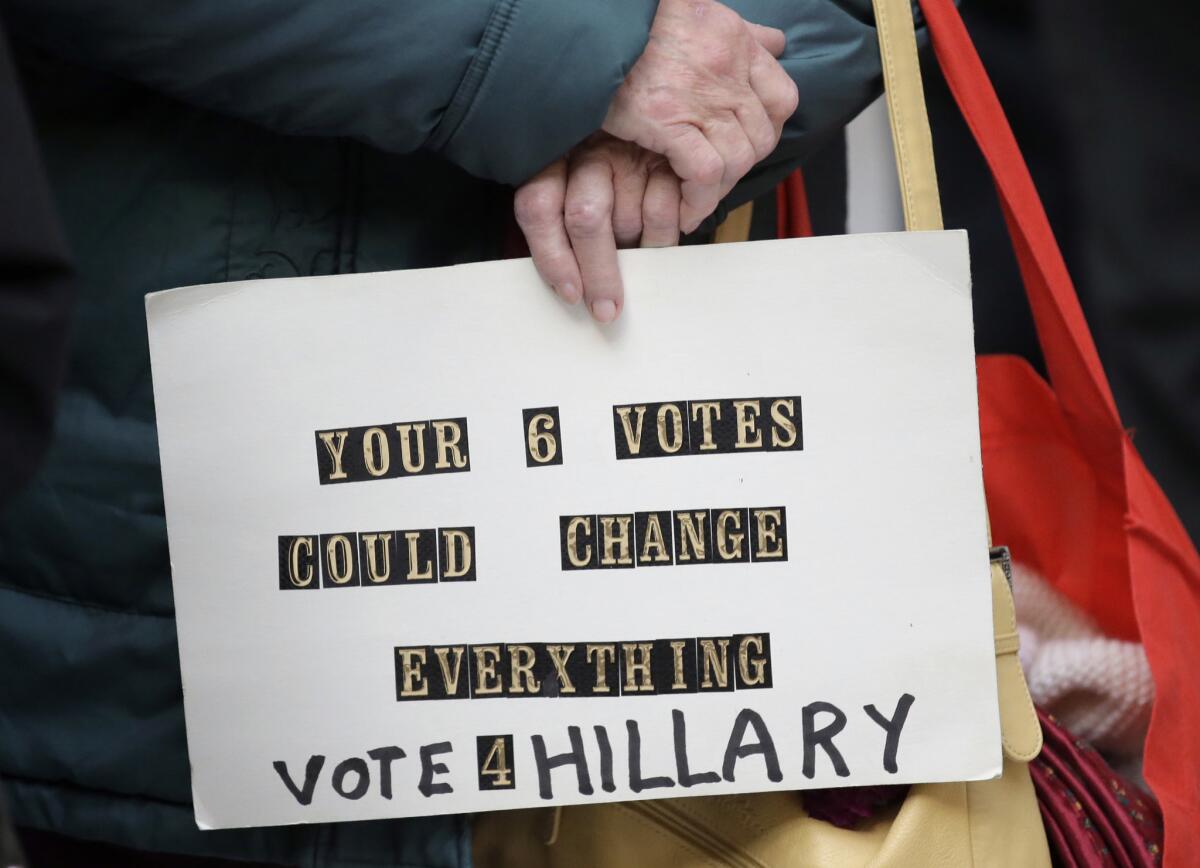
Despite chants of “vote your conscience” and “the whole world is watching” from more than 100 protesters, Utah’s six electors cast their votes for President-elect Donald Trump today in Salt Lake City.
Lt. Gov. Spencer Cox announced the official results within minutes of the votes being cast, but he was drowned out by jeers of “Shame on you” by the protesters.
“I hope you know this is what our country is all about,” Cox said. “I hope all of us here are sincerely grateful we live in a country where we have the opportunity to express ourselves.”
The six electors -- two small-business owners, a custom metal worker, a farmer, a Brigham Young University professor and a Republican activist -- quickly introduced themselves before casting their ballots.
The votes were largely a formality, as the state requires electors to vote for the winner. Trump defeated Democratic nominee Hillary Clinton by getting 45%t of the vote. He also withstood a challenge from Evan McMullin, who garnered 21% in what was largely a protest vote from those, many of them Mormons, who felt uncomfortable casting a ballot for Trump.
Cox said the turnout for this year’s electoral vote was a far cry from 2012, when four people and one camera crew showed up.
“I’m a big fan of the electoral college,” Cox said to the restless crowd. “You don’t have to boo me now. You can boo me later.”
About 200 protesters and Trump supporters arrived in the rotunda of the state Capitol about three hours before the votes were cast shortly after noon. The room where the votes were cast was too small to accommodate everyone, and the fire marshal sought to limit occupancy to about 130 people.
Interest was high, and the vote even drew Hawthorn Elementary School students, who helped lead the room in the Pledge of Allegiance.
Cox thanked them for coming and told them they were “getting an experience you’ll never forget.”
Clinton elector balks in Minnesota
In Minnesota, where the 10 electors had all pledged their votes to Hillary Clinton, one of them refused to go through with it. Elector Muhammad Abdurrahman opted not to vote. He was replaced by an alternate, who cast a vote for Clinton.
As Pennsylvania went unanimously for Trump, a voice from the back: ‘Thank you’
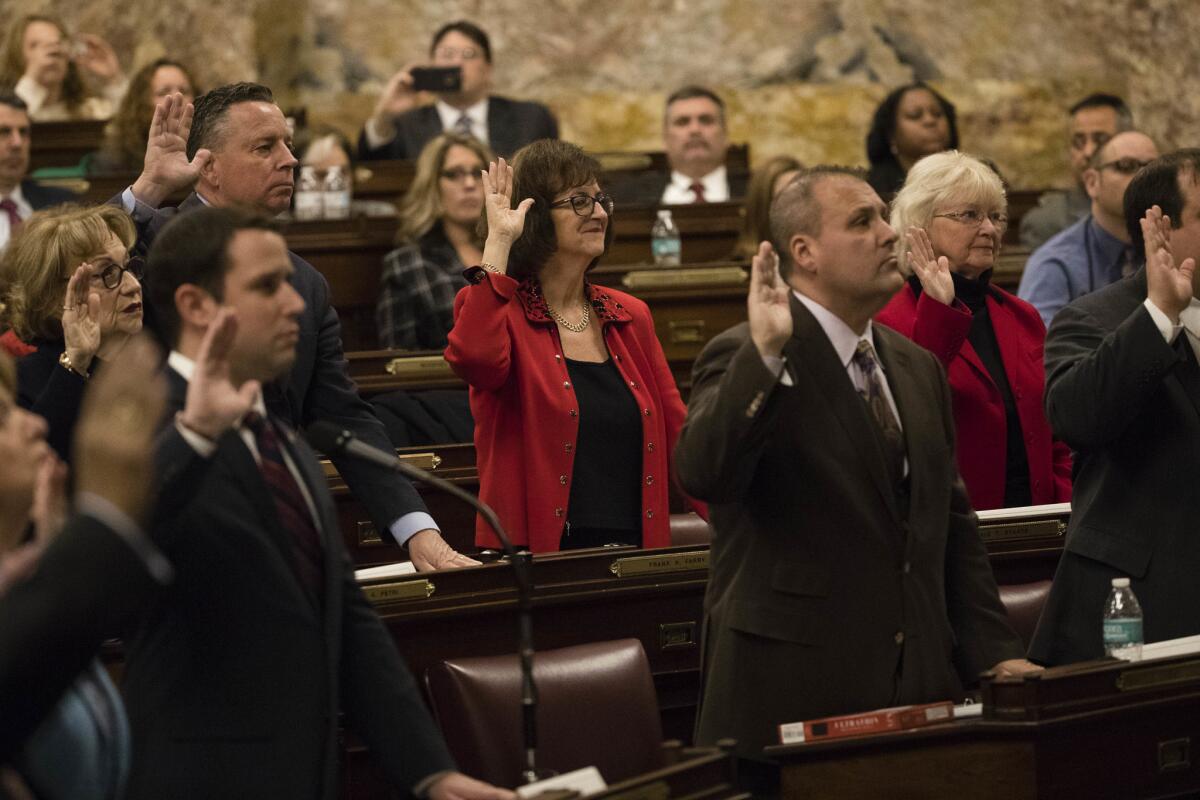
In Pennsylvania’s capital of Harrisburg, the state’s 20 electoral college voters selected Trump today in a ceremony marked by traditional pomp and bellowing protests.
Trump won the popular vote in Pennsylvania by 44,292 votes — the first Republican presidential candidate to do so since 1988. It earned him the state’s 20 electoral college votes.
When the result was announced shortly before 1 p.m. inside the gilded, ornate House chamber, protesters jeered and supporters cheered.
“Shame on you,” a woman’s voice called down from the public balcony.
“Thank you,” a male voter’s voice responded back from the floor.
The latest electoral college vote count: 241 Trump, 115 Clinton
How some electors have reacted to all the mail from voters
Protesters outside Florida Senate chambers: ‘Trump is dangerous’
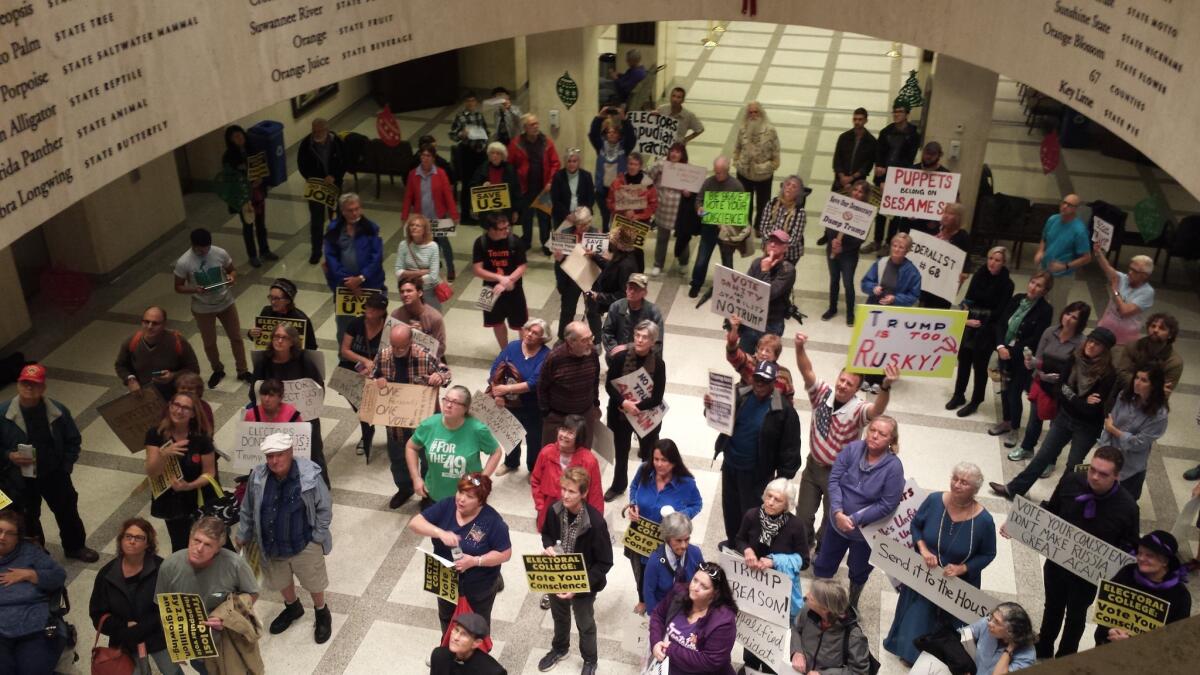
A group of about 100 protesters huddled outside the Florida Senate chambers Monday morning as Florida’s 29 electors prepared to cast their votes for Donald Trump in the formal electoral eollege vote ceremony later in the day.
The protesters held signs that read “You can fix this, keep America free,” “What would Hamilton do?” and “Electors: Protect Us, Trump is Dangerous,” pleading for electors to change their minds and not vote for Trump, who beat Hillary Clinton by 112,911 votes in Florida, about 1.2%t of all votes cast in the state.
Tallahassee resident Bonnie McCluskey held a sign reading “Send it to the House.” If enough electors across the country do not vote for Trump, he’ll fall short of the 270 electoral votes required to win the presidency, sending the matter to the U.S. House.
“The reason I’m here is because I don’t trust [Trump]) and I think he will harm the United States,” McCluskey said. “My grandmothers were suffragettes; their ancestors were willing to be traitors to the British crown to create this democracy and I don’t want to see it end. And that sounds awfully dramatic but that’s how I’m feeling.”
She said that part of the reason she doesn’t trust Trump is because he didn’t pay a company she worked for that did promotional videos for his buildings in 1998.
“They were basically given the opportunity to take 10 percent or go to court. Back then I didn’t realize that was his business plan,” McCluskey said. “I didn’t make the deal with him I was just one of the people who saw a company go bankrupt.”
Despite the pleas from protesters, all of Florida’s electors are expected to vote for Trump. Some, such as Florida Senate President Joe Negron, have posted pictures of hundreds of letters they’ve received asking them to change their vote but declaring they’ll be voting for the Republican candidate.
Colorado electors make last-ditch plea to switch votes
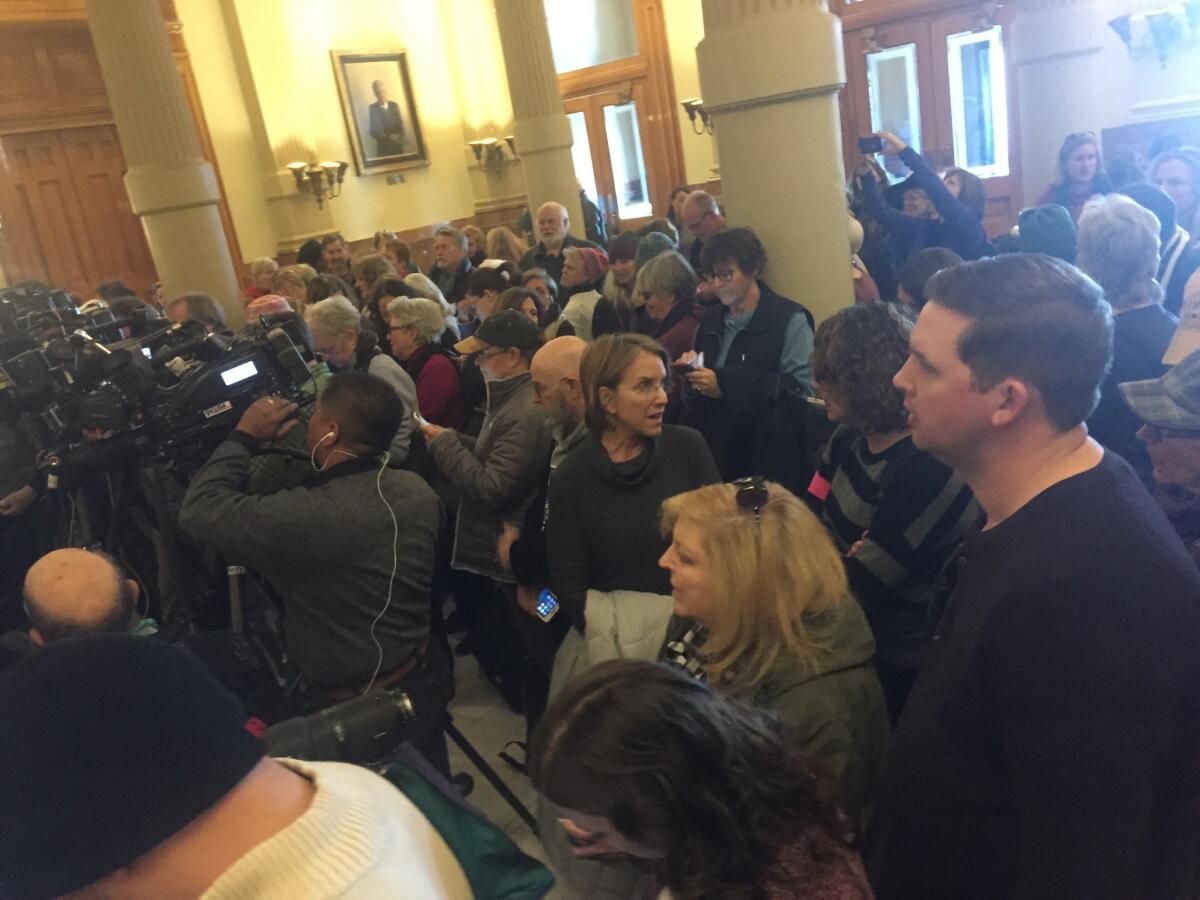
Colorado electors are trying a last-chance legal appeal to avoid voting for Hillary Clinton, and instead vote for an alternative candidate to replace Donald Trump. A week ago, a district court judge told them they had to vote for Clinton, who won the popular vote in Colorado.
A few days ago, a federal appeals court upheld that decision. But just hours before the vote today, two electors filed suit to stop the Colorado secretary of state from requiring them to swear to vote for the candidate supported by the electorate.
Their effort is part of a loose national scheme to defeat Trump by persuading Republican electors to join with Democrats, such as those in Colorado, and coalesce around an alternative candidate. There has been no decision so far.
Chants of ‘Shame!’ erupt as Wisconsin electors cast ballots for Trump
Wisconsin’s 10 presidential electors unanimously cast their ballots for Republican Donald Trump as expected Wednesday, but the vote still drew chants of “Shame” from dozens of demonstrators who had pleaded for them to back away from the president-elect.
The typically procedural vote in a fourth-floor conference room in the Wisconsin State Capitol was anything but routine as about 150 protesters greeted the 10 electors with signs pleading for them to “vote your conscience not your pledge.”
In a short 15-minute meeting, the electors quickly cast their ballots for Trump. They did not address the controversial nature of the election and no speeches were made before the ballots were cast.
“We’re very excited to represent the hard working activists around the state who delivered this,” said Brad Courtney, the Wisconsin elector who chaired the meeting. “It’s been a wonderful time, and it’s going to be fun to go to Washington in January to watch Donald J. Trump be sworn in as the next president.”
Courtney called it a proud moment, nothing that the vote marked the first time Wisconsin had backed a Republican presidential candidate since Ronald Reagan in 1984.
After the vote had been tallied, one woman stood up, shouted and marched toward the front of the room where the electors were seated before she was restrained.
“You don’t deserve to be in America,” she shouted. “You have sold us out! Listen to your hearts! Listen to the facts!”
Police escorted her from the room.
About 75 members of the public, most of them gathered in opposition of Trump, had watched as the votes were cast. An additional 50 gathered in an overflow room nearby.
Among those in the overflow room was Lauren Velazquez, who made the three-hour drive to Madison from Chicago’s Old Irving Park neighborhood. She had been hopeful the electors would “buck tradition” and “vote for something bigger, upholding democracy.”
“I think the electoral college was created as part of the system of checks and balances to really make sure at the end of the day that the principle of democracy is preserved,” said Velazquez, 37, who works for a nonprofit organization. “It’s the super anti-immigrant rhetoric in a country founded by immigrants and it’s the fact that it’s public knowledge at this point that the election was influenced by foreign entities and a foreign government. That’s antithetical to what this country was founded on.”
Illinois electors cast their votes for Hillary Clinton
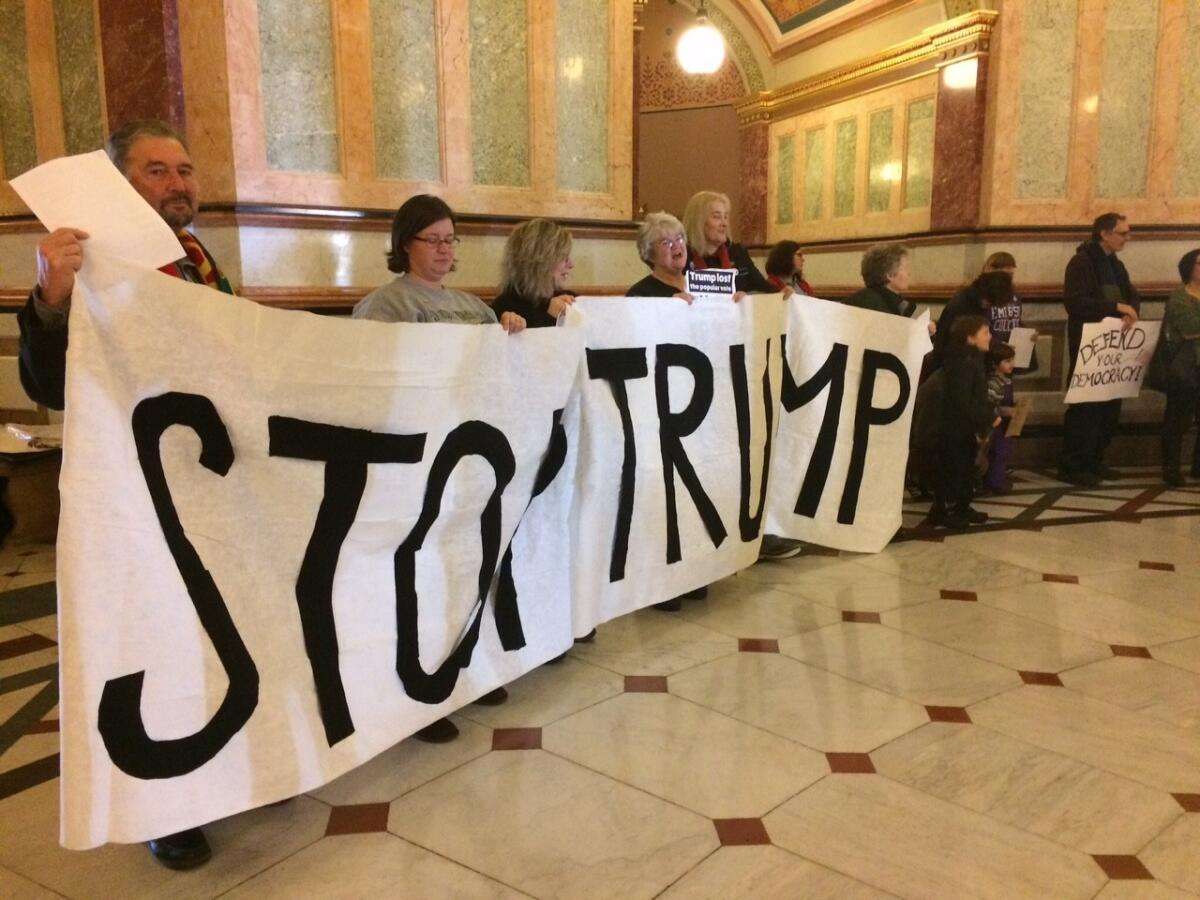
All 20 of Illinois’ electors cast their vote for Democratic presidential nominee Hillary Clinton on Monday, a bittersweet finish for many who had hoped to claim the state as the birthplace of the nation’s first female president.
Instead, they were prepared for their colleagues in other states to ultimately decide the contest for Republican Donald Trump.
“Surely, it’s a historic occasion whenever the electoral college meets, it was a big disappointment for me, being a Hillary delegate to the convention and an elector,” said Cook County Board President Toni Preckwinkle, who also served as chairman of Illinois’ electoral vote. “But this is our American system of democracy, and we are going to move ahead.”
Before the vote, a small group of protesters gathered inside the Capitol Rotunda, unfurling a “Stop Trump” banner and chanting “vote your conscience” as they encouraged electors to stand against Trump.
The demonstration wasn’t needed to sway Illinois’ electors. The state voted overwhelmingly for Clinton, who was born in Chicago and raised in suburban Park Ridge. Clinton won 55.8% of the vote in Illinois, compared with 38.8% for Trump. In 2007, Illinois passed a state law that electors must pledge to honor the popular vote when casting electoral votes.
Illinois electors cast their ballots in a small hearing room inside the state Capitol, one by one dropping paper ballots into a wood box. Many paused for a photographer who was there to document the vote, with some giving brief remarks.
Elector Vera Davis, the wife of U.S. Rep. Danny K. Davis (D-Ill.), said she was thankful for the privilege to vote for the first woman to be nominated by a major party. Former State Rep. Lauren Beth Gash called for a ‘thorough, independent investigation” over U.S. intelligence agencies’ assertion that Russia interfered in the country’s political system by hacking into Democratic Party emails.
Preckwinkle dismissed calls to eliminate the electoral college as “a waste of time and energy,” saying “it’s better just to focus on winning by the rules of the game as they are.”
“The system is what it is, and those of us who wished for a different outcome in this election better get working,” Preckwinkle said, saying that Democrats must focus on organizing and recruiting younger voters.
“I am 69 years old, and all the candidates who were running for president are my age and older, so we’ve clearly got some problems in both parties about the next generation of leadership,” Preckwinkle said.
Electoral vote hits halfway point, with 25 states and no surprises
Protester in Arizona: ‘Don’t let Putin elect our president’
This elector’s vote was not up for grabs
Bill Clinton was among the electors in New York. He and the 28 other members of the state’s Electoral College cast their votes as expected for Hillary Clinton as they met in Albany on Monday.
Clinton was the first of the state’s electors to cast his vote. He received a standing ovation when he was introduced by Gov. Andrew Cuomo as “one very special New Yorker we all call friend.”
The Clintons bought a house in Chappaqua, N.Y., in 1999 at the end of Bill Clinton’s second presidential term.
The proceedings Monday featured a who’s who of New York Democratic politics, including New York City Mayor Bill de Blasio, a fierce opponent of President-elect Donald Trump.
Trump’s name was not mentioned at all during the proceedings, but in a last minute dig, the electors voted to donate their compensation for serving on the electoral college to the New York Immigration Coalition.
Electors in 21 states have voted so far, all according to script
Demonstrators carried away by police outside meeting of electors in Pennsylvania
Hundreds gathered outside the Pennsylvania state Capitol Monday to protest the Electoral College vote Republicans will cast at noon for President-elect Donald Trump.
At least half a dozen protesters were carried or marched away by Capitol police after blocking a street.
Inside the Capitol, protesters sang a version of the “Twelve Days of Christmas.” They offered a dozen reasons they believe Trump should not be the nation’s 45th president. One accused him of being a stooge of the Russian government, which the CIA has said interfered in the election by hacking Democrats’ computers and disseminating emails. Another cited Trump’s boast on an “Access Hollywood” tape that he had used his celebrity status to grope women.
For protester Pamela Bateson, a 62-year-old retired educator, Trump represents the fascism her father fought against in World War II.
Steve O’Hearn dressed in an oversized Russian hat and overcoat to symbolize Russia’s meddling. He says he doesn’t understand how Republicans can ignore the CIA’s findings given their party’s longstanding opposition to Russia under former President Ronald Reagan.
“I’m welcoming the Russians,” O’Hearn said, adding, “There’s no reason why you can’t be funny and serious at the same time.”
Trump won the popular vote in Pennsylvania by 44,292 votes — the first Republican presidential candidate to do so since 1988. It earned him the state’s 20 electoral college votes.
Protests underway at Arizona Capitol as electors prepare to meet

Tom Mecony of Oro Valley, Ariz., explains why he is protesting at today’s meeting of presidential electors in Arizona.
Nearly 300 people gathered in two rows on either side of the main entrance to the Arizona Capitol tower Monday morning as the state’s 11 electors made their way inside.
At the moment of the scheduled 10 a.m. vote inside the Capitol, the protesters sang “America the Beautiful” and continued to chant, “We reject the president-elect.”
Jennifer Cohen said she knew that the the electors had already announced their decision to cast their votes for Donald Trump, but hoped to defy those “who tell us to stop whining and be quiet.”
“I know how they’re going to vote, I’m more here to show that someone is here to stand up for what’s right and wrong,” said Cohen, an emergency room physician from Phoenix. “This is how movements start.”
No Trump defections yet: Electoral college vote so far is 75 for Trump and 27 for Clinton
Electors have been meeting this morning in states such as Arizona and New Hampshire to cast their votes. So far, electors in nine states with a majority of voters who voted for Donald Trump have also cast their votes for the GOP candidate, despite efforts by anti-Trump forces to get some electors to defect.
‘Our chance of changing their minds is virtually zero,’ Georgia electoral college protesters acknowledge
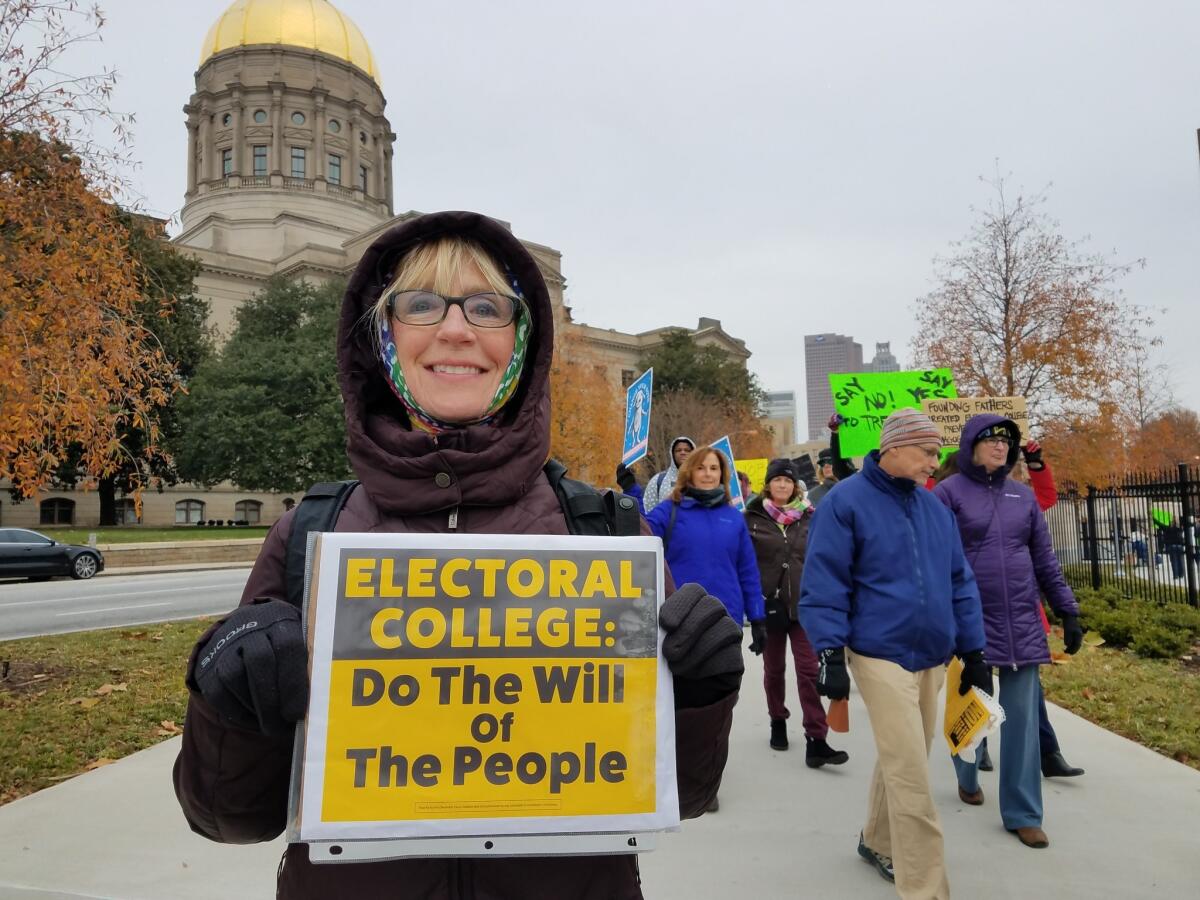
Hundreds of protesters gathered outside Georgia’s gold-domed state Capitol early Monday morning in what they said was a bid to prevent Donald Trump from becoming the nation’s 45th president, yet few seemed to have faith they might persuade the electors meeting inside.
All 16 GOP electors in Georgia, a solidly Republican state where Trump won 51% of the vote, are expected to vote for Trump.
“I think our chance of changing their minds is virtually zero,” acknowledged Connie Wernersbach, 62, a retired intensive care nurse who had driven to the Atlanta Capitol building from Fayetteville, Ga. “This is just a demonstration to show we’re unhappy.”
Many chanted “Reject the president-elect” and “Dump Trump” as they marched to keep warm on a narrow strip of sidewalk behind the building. Wearing thick winter coats, gloves and hats, some held signs that castigated Trump as a “fascist thug” and “Putin’s Poodle.”
Wernersbach, who wielded a placard saying “Electoral College: Do The Will of The People,” said she was “terribly worried” about the prospect of Trump becoming president: “He is completely unfit for office.”
For a brief moment earlier this year, there was a glimmer of a revolt against Trump in Georgia, one of 21 states that does not bind its electors to the results of their state’s popular vote. In August, Baoky Vu, a GOP elector based in Decatur, Ga., admitted he might not cast his ballot for Trump if he won. Within hours, however, he was forced to resign.
The remaining electors have steadfastly backed the party line, even as activists hoping to change their minds have bombarded them with 6 a.m. phone calls and thousands of emails and letters.
Still, a few demonstrators outside clung to the hope that one of the electors might rebel and refuse to cast a ballot for Trump.
“I have faith that at least one person in there might vote for their conscience,” said Lucy Ahmann, a 17-year-old high school student from Decatur who attended the demonstration with her sister, aunt and grandmother. “Maybe Trump is not the will of Georgia?”
Maine electoral college voter has declared plans to defect to Bernie Sanders

Trump held a comfortable lead of 306 votes to 232 for Hillary Clinton, based on the popular vote tallied on and after Nov. 8.
Sen. Bernie Sanders lost the Democratic nomination to Hillary Clinton, but he and his supporters will get a small reward today, according to one of four Maine electoral college members.
David Bright, a Sanders supporter, said in a Facebook message that he would vote for the Vermont independent. He is one of only two of the 538 electors nationwide who have announced plans to vote for a candidate other than the one who carried his state. The other is an elector in Texas who has said he does not plan to vote for Donald Trump.
Bright’s decision would split Maine’s electoral delegation among three people — Sanders, Clinton and Trump.
Maine and Nebraska are the only states that split their electoral votes by congressional district, the rest are winner-take-all.
In Maine, Trump won the 2nd Congressional District, giving him one electoral vote. Clinton won the 1st Congressional District and the state’s popular vote, giving her three electoral votes — or so it seemed until Bright announced he’d vote for Sanders.
“If my vote today could have helped Secretary Clinton win the presidency, I would have voted for her,” he wrote. “But as the Electoral College meets all across this nation on this day, I see no likelihood of 38 Republican electors defecting from their party and casting their ballots for Secretary Clinton.
“So Hillary Clinton will not become President, and there is nothing I can do about that. Knowing this, I was left to find a positive statement I could make with my vote.”
Bright said that he meant “no disrespect to our nominee” but wanted to recognize the new voters drawn into politics this year by Sanders, who energized young voters around the nation but could not surmount Clinton’s deep ties to establishment Democrats, women and others.
Sanders did better in caucus states, where his enthusiastic supporters outnumbered Clinton backers — including in Maine, where he defeated her by a nearly 2-1 margin.
“Democracy is hard, and messy, and complicated, and those of us who have been at this game for a long time have learned to take the defeats when they come,” Bright wrote. “But those lessons don’t come easily for new voters. So I cast my Electoral College vote for Bernie Sanders today to let those new voters who were inspired by him know that some of us did hear them, did listen to them, do respect them and understand their disappointment.”
“I want them to know that not only can they come back to the process, but that they will be welcomed back; that there is room in the Democratic Party for their values.”
In 1969, Democrats and Republicans united to get rid of the electoral college. Here’s what happened
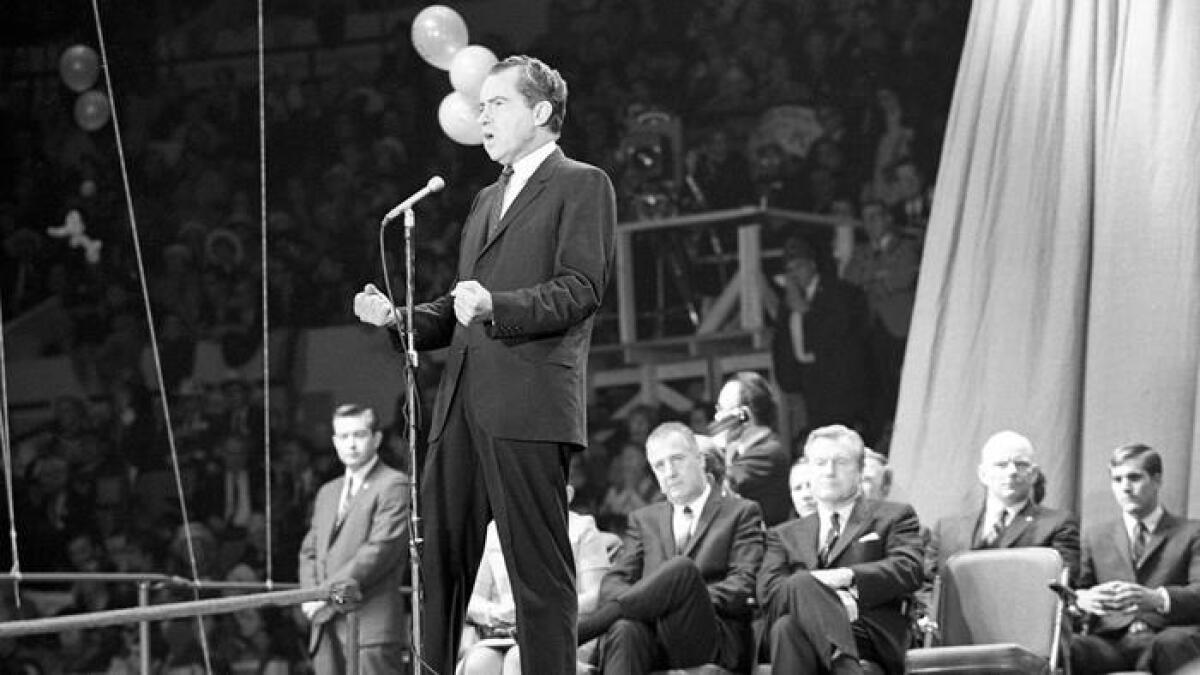
It turned out to be a bipartisan effort.
In 1969, Republican President Richard Nixon supported a push in Congress to abolish the electoral college. So too did his rival in the presidential race a year earlier, Democrat Hubert Humphrey.
The reason both united in support: former Alabama Gov. George Wallace.
Wallace — who had famously said, “Segregation now, segregation tomorrow and segregation forever” — stoked racial animosity as the candidate of the American Independent Party. He won five Southern states and netted 46 electoral votes.
Even before the 1968 election, there was fear that Wallace would win some electoral votes and possibly cause a tie between Nixon and Humphrey. Under the Constitution, the House of Representatives would then select the president and the Senate the vice president.
Protests and rituals abound as electors begin to gather
As electors begin to gather in state capitals, the usually obscure rituals of the day are attracting much more than the usual amount of attention. In Indiana, where one of the first meetings took place, electors formally signed the ballot form, then cast all of the state’s 11 votes for Donald Trump, as expected.
In some states, protests have greeted the electoral college meetings.
So far, however, there’s been no evidence of any votes being changed.
Protests outside electoral college votes are underway. They probably won’t change the outcome
The protest above is taking place outside Georgia’s Capitol, where electors are expected to select Donald Trump because he won the state’s popular vote. Dozens of similar protests are expected or already underway in other states.
Some electors in some states are expected to vote against their state’s winner, but not many. The AP interviewed 330 electors and found only one Republican elector who said he wouldn’t vote for Trump.
There were some electors who refused to vote for winning candidates in the 1800s, such as six who declined to support James Madison, but never enough to sway the outcome of the race. In the last century there have only been a handful of cases.
Most recently, there were some attempts to persuade electors to back Al Gore over George W. Bush during the disputed 2000 election, but they were unsuccessful.
Here’s what it looks like when New Hampshire’s electors gather to vote
You can watch the proceedings live here.
Our next president will be selected today by a clique of elites. Here’s why
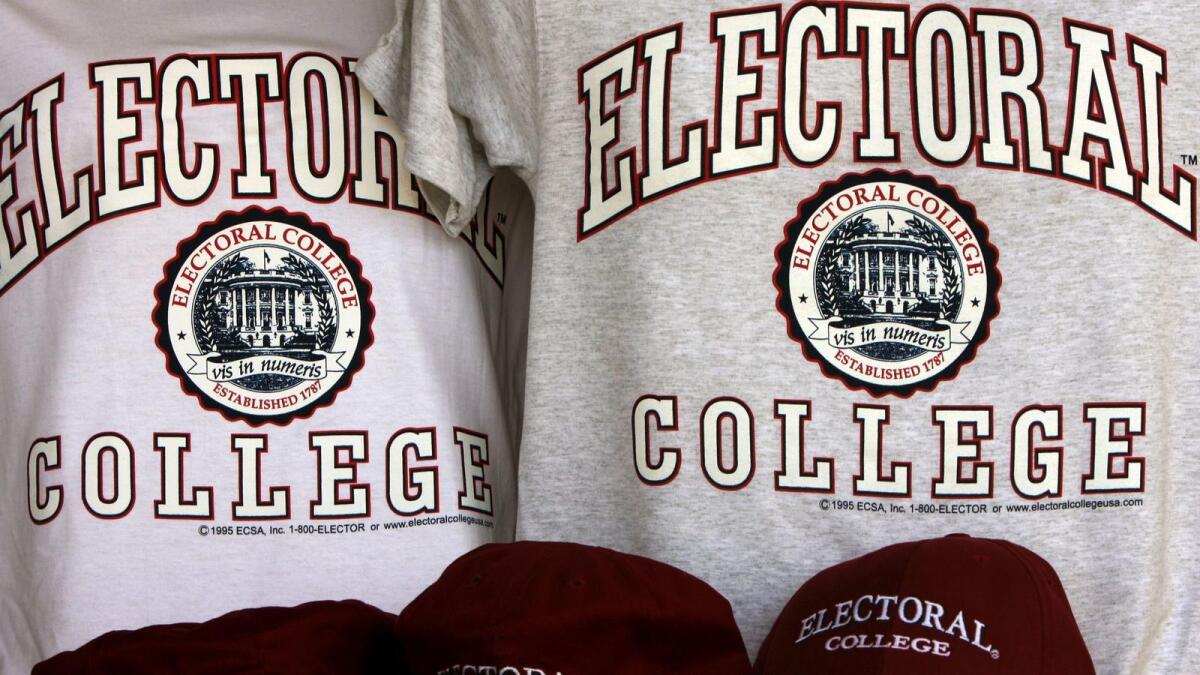
Today 538 electors from the 50 states, including three from the District of Columbia, will convene across the country to cast the votes that decide who will sit in the Oval Office in January.
Donald Trump is expected to win when the electors vote, even though more Americans cast ballots for Hillary Clinton. Trump was more popular in states that control more electoral votes. That’s the system. Regular Americans don’t get a direct say in who becomes president, and not all Americans’ votes are equal.
That’s the very intent of the electoral college, albeit a design forged from an 18th century political struggle over how to balance freedom and slavery, elitism and populism, independence and accountability.
Protesters have their eyes on the electoral college vote even though Trump is very likely to prevail
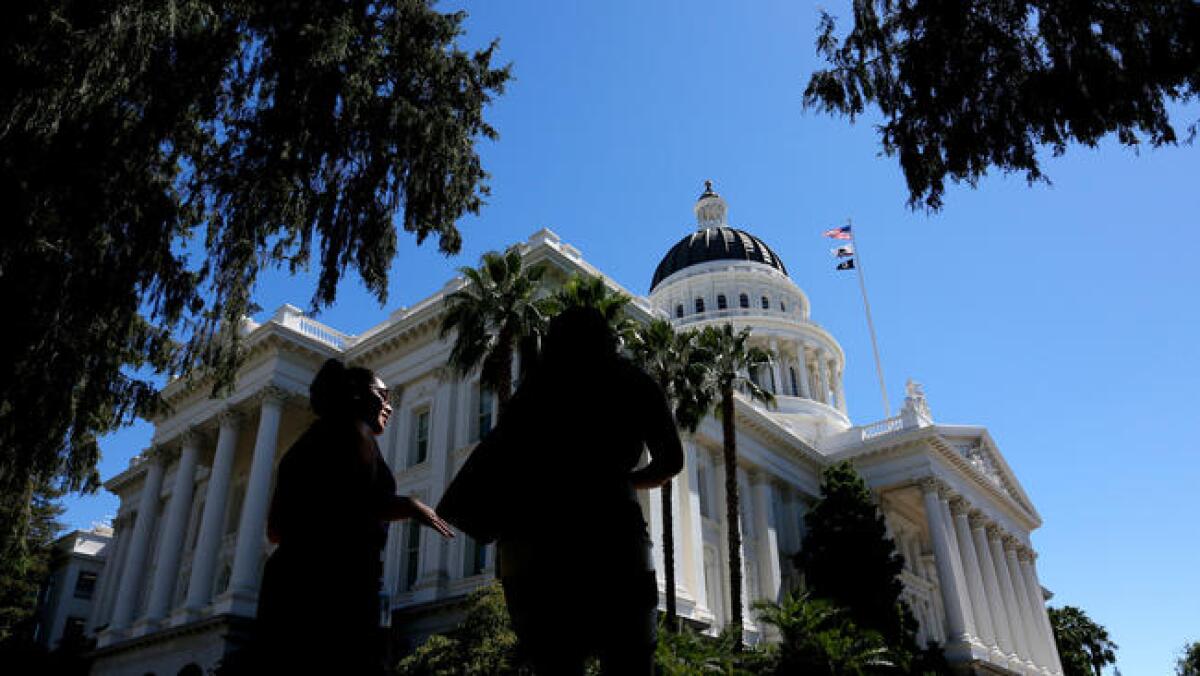
In keeping with the chaotic campaign, the run-up to the electors’ balloting has been filled with protests and disputes over the constitutionally mandated gatherings.
Millions of Americans have signed petitions, deluged electors with letters and emails and indulged in elaborate hypotheticals about how those votes might be swayed. The passion behind those efforts has been intensified by post-election drama over U.S. intelligence that indicates Russia attempted to assist Trump before the election by stealing and distributing private emails from Democratic institutions and activists.
Going into the Monday meetings in each of the 50 states and the District of Columbia, Trump held a comfortable lead of 306 votes to 232 for Hillary Clinton, based on the popular vote tallied on and after Nov. 8.
Reminder: This is how the electoral college works
Electors are gathering in the state capitals today to cast their votes for president. Despite long-shot efforts to block him, Donald Trump should win the vote based on his win of the popular votes of key states. In case you’ve forgotten, watch this reminder of how the electoral college — a uniquely American system — works.
Senators call for select panel to investigate Russian hacking
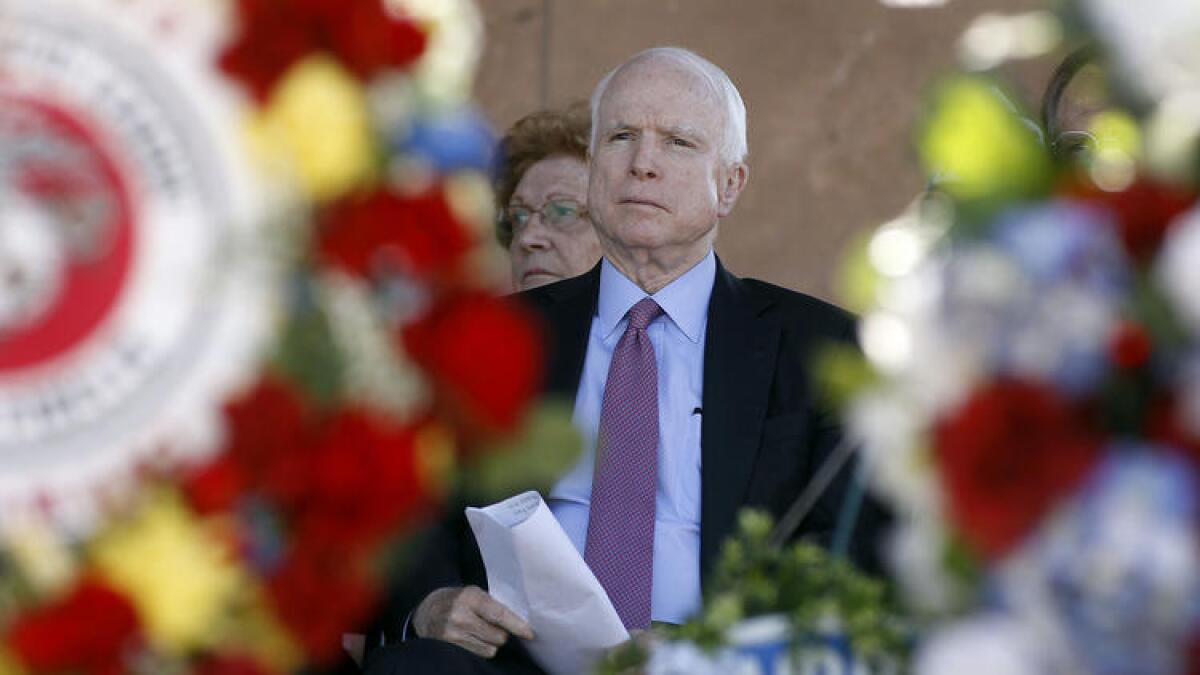
Four powerful members of the Senate called Sunday for creation of a special select committee to investigate Russian attempts to influence the presidential election, a sign of growing concern that GOP leaders’ plans to use existing panels will produce a partisan inquiry.
Sens. John McCain (R-Ariz.), who chairs the Armed Services Committee, and Charles E. Schumer (D-N.Y.), the incoming minority leader, said the specter of a foreign power trying to sway the U.S. election demands a special bipartisan investigation.
“We need to get to the bottom of this,” McCain said on CNN’s “State of the Union.”
“There’s no doubt they were interfering,” he said. “There’s no doubt…. The question is now, how much and what damage? And what should the United States of America do?”
Schumer told a news conference in New York that it’s “clearer and clearer that the Russians hacked our cybersystem with the intent of influencing the election.”
“It sure should raise the hackles of every American,” he added.
At Alabama rally, Trump promises hope for the ‘forgotten men and women’
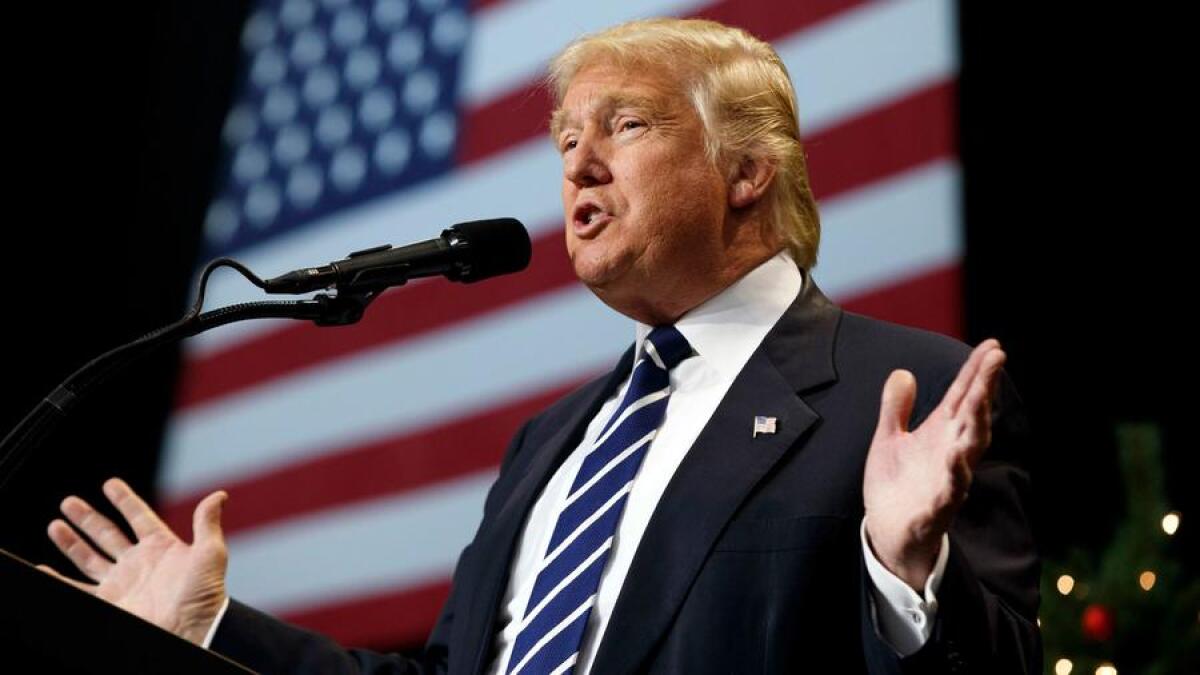
President-elect Donald Trump used the final stop on his “thank you” tour to tell an enthusiastic crowd in Alabama that he will bring jobs and hope to “the forgotten men and women of this country.”
But he also took issue with a recent comment made by first lady Michelle Obama, who suggested in an interview that some Americans had lost hope.
The incoming president said he had “tremendous hope” for the years ahead. “This is truly an exciting time to be alive…. The script is not yet written,” he said. “But the pages will be authored by you,” he said, pointing out to the huge cheering crowd.
Trump said the main goal of his administration will be to bring jobs and prosperity to the areas of the country that have struggled. He said he will promote “two simple rules: buy American and hire American.”
He said he had returned to Mobile, Ala., because he had one of his first large rallies there in August 2015. Alabama is also the home state of Sen. Jeff Sessions, the first senator to endorse Trump and his choice to be the next U.S. attorney general.
Earlier in the day, Trump said he had selected South Carolina Rep. Mick Mulvaney, a conservative Republican and a budget hawk, to run the Office of Management and Budget.
The most important elevator in New York: The Tower of Power called Trump
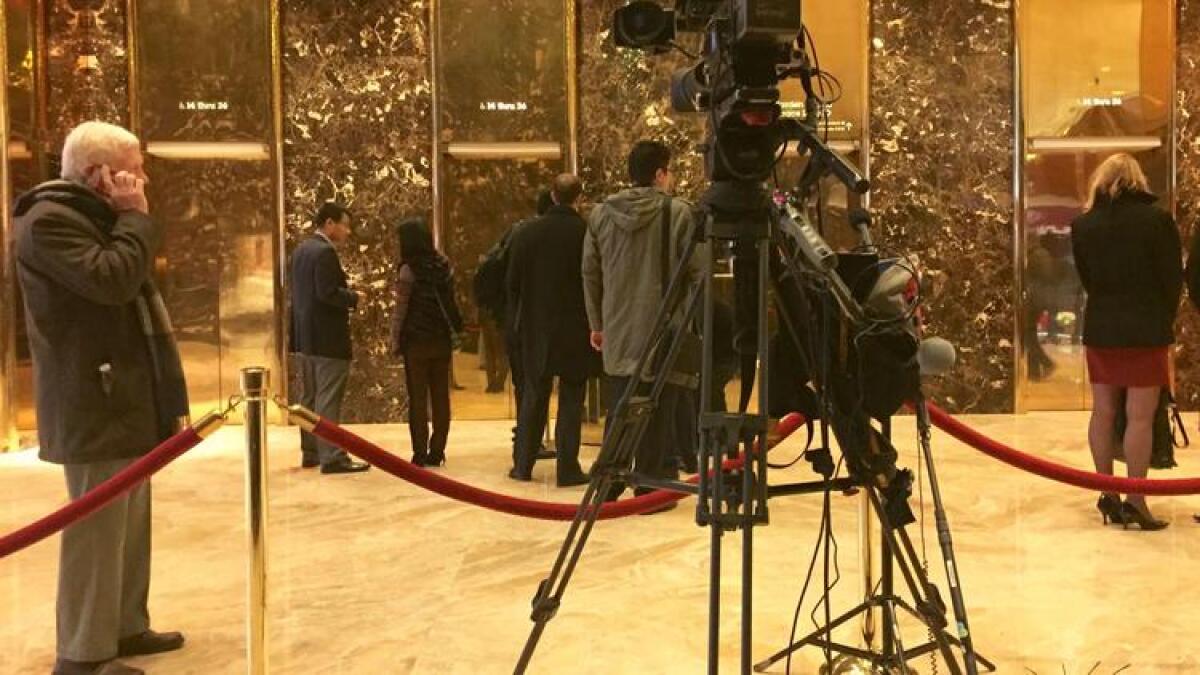
They are the elevators that scale the tower of power.
Through their gold-hued doors step courtiers and critics, job-seekers and publicity hounds. Punching the “up” button over the last several weeks have been all manner of celebrities, from the worlds of politics, entertainment and sports — united by their desire to enter the private offices of President-elect Donald J. Trump.
Here’s a look at some of them.
China pledges to return U.S. sea vessel to Pentagon in ‘appropriate manner’

China agreed Saturday to return an American sea drone it had captured after the Pentagon demanded it back, defusing tensions at the end of a week of confrontations over Beijing’s territorial ambitions in the South China Sea.
China’s Defense Ministry said it would return “in an appropriate manner” the U.S. sea vessel seized this week by the Chinese navy.
But the ministry also accused the U.S. of “public hyping” that was “not conducive to solving the problem smoothly.”
Trump administration could upend decades of U.S. policy on Israel and Palestinians
Here in the desert hills of the West Bank, near the Palestinians’ principal city of Ramallah, a group of Orthodox Jews has built the town of Beit El, a place that most of the world considers an illegal settlement constructed on occupied Palestinian land.
For decades, U.S. policy has opposed such settlements as harmful to the peace process. But the Israeli settlers now have some well-placed American supporters.
Funds to help construct Beit El came partly from a U.S.-based foundation run by President-elect Donald Trump’s son-in-law, Jared Kushner, and the Kushner family.
And David Friedman, Trump’s longtime real estate lawyer who was named Thursday as the next U.S. ambassador to Israel, served as the president of the American Friends of Beit El foundation. His name is on a girls’ school in the settlement in tribute to his support.
The amounts given by the Kushners were small; $5,000 here, $10,000 there, according to Internal Revenue Service filings.
But they constitute another piece in the puzzle of how the Trump administration will approach one of the Middle East’s most intractable conflicts.
There are growing signs that Trump is poised to upend decades of U.S. foreign policy on dealing with Israelis and Palestinians, giving Israel a freer hand to build settlements and relocating the U.S. embassy to Jerusalem.
Obama expresses sorrow over Aleppo but defends approach

President Obama on Friday expressed sorrow over the carnage in Aleppo but said there was no way for the United State to intervene and stop the slaughter in Syria “on the cheap.”
“We cannot claim we have been successful” in efforts to stop the Syrian bloodshed, Obama said. “ So that is something I have to go to bed with every night.”
“But I continue to think it was right approach” to avoid direct military involvement in Syria’s civil war, he added.
Obama has held back from taking on the regime of Syrian President Bashar Assad, saying there was no military solution possible and that any resolution of the conflict must be a political one.
Images of shelling in Aleppo this week have saddened the president, aides say, as he watches children mourning their lost families and refugees flowing down the streets hoping to reach safety.
In his final news conference of the year, Obama told reporters than he grieves their loss but squarely places the blame on the Syrian government and its supporters – especially in Russia.
CIA director: FBI and CIA find ‘strong consensus’ that Russian hacks were intended to help Trump win election
There is “strong consensus” among U.S. intelligence services that Russia orchestrated hacks and online leaks in part to help Donald Trump win the White House, the head of the CIA told agency employees in a message Friday.
FBI Director James B. Comey and Director of National Intelligence James R. Clapper Jr. agree with a CIA assessment that top Russian officials oversaw a covert plan to expose internal communications from Hillary Clinton’s campaign and the Democratic National Committee and influence the outcome of the U.S. elections, CIA Director John Brennan wrote in a message, according to a U.S. official.
“Earlier this week, I met separately with FBI [Director] James Comey and DNI [Director] Jim Clapper, and there is strong consensus among us on the scope, nature, and intent of Russian interference in our presidential election,” Brennan wrote. The message was first reported by the Washington Post.
In recent days, lawmakers had said that there was disagreement between the FBI and CIA over Russia’s intentions in hacking into the email accounts and computer systems of top Democratic Party officials. Friday’s message appeared designed to put to rest concerns inside the CIA that other intelligence agencies didn’t support the agency’s conclusions.
President Obama has ordered intelligence officials to conduct a review of Russia’s actions during the 2016 elections before Obama leaves office in Jan. 20. President-elect Donald Trump has repeatedly denied Russia was behind the leaked emails and mocked the CIA’s assessment that top Russian officials intervened to help him get elected.
“The three of us also agree that our organizations, along with others, need to focus on completing the thorough review of this issue that has been directed by President Obama and which is being led by the DNI,” Brennan wrote.
In addition to hurting Clinton’s campaign and boosting Trump’s chances, U.S. intelligence officials also believe Russia acted with a broader goal of discrediting the U.S. political process and undermining U.S. efforts to promote democratic governments elsewhere in the world.
U.S. will retaliate against Russian interference in the election, Obama says
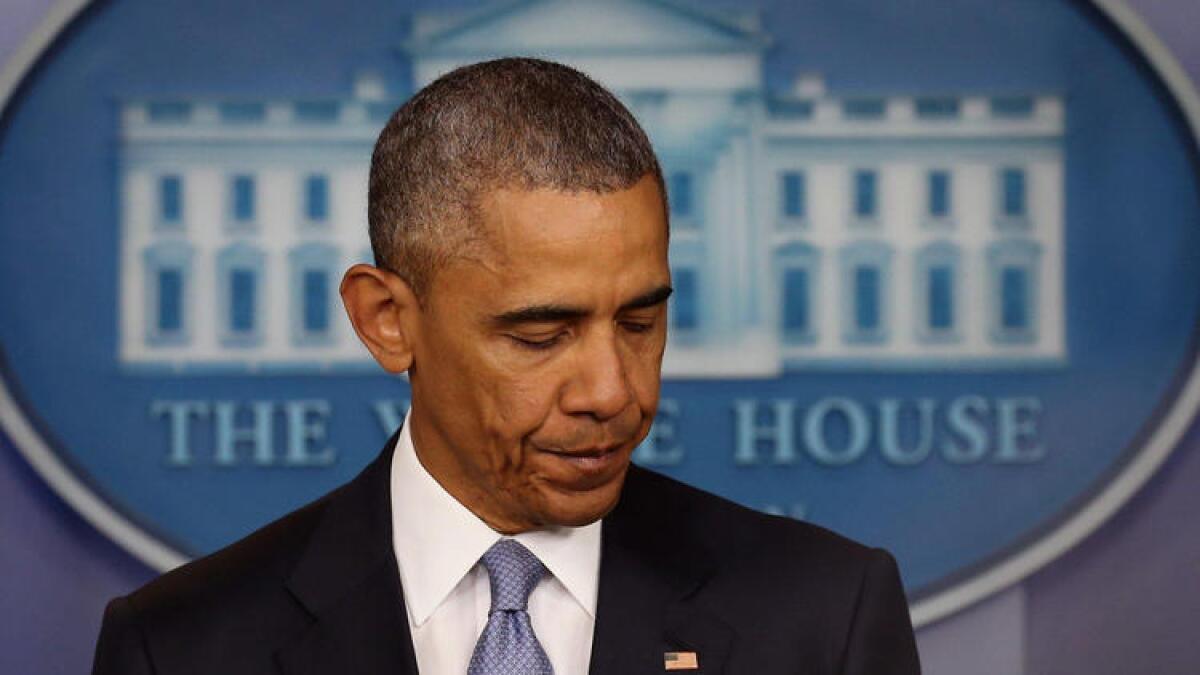
President Obama on Friday threatened Russia with retaliation for the election-season hacking of Democratic emails, promising, “We can do stuff to you.”
Obama would not specify what the retaliatory actions would be but said they would be designed to make Moscow think twice about such cyber actions in the future.
“Certain actions” are on the way, Obama said during his final news conference of the year. Some of the actions “we can divulge publicly,” others the public will never hear about.
“The idea that public shaming is going to be effective I think doesn’t read the thought process in Russia very well,” Obama said.
Intelligence officials have said they have little doubt that the hacks were part of a Russian effort to influence the outcome of the election. The hacks revealed internal communications of the Democratic National Committee and the campaign of Democratic nominee Hillary Clinton.
Russian officials deny involvement and say the U.S. should show more proof or let the subject drop. Obama has ordered his intelligence network to run a full review before Republican Donald Trump is inaugurated on Jan. 20.
In an interview on National Public Radio that aired earlier in the day, Obama said, “There are still a whole range of assessments taking place among the agencies.
“When I receive a final report, we’ll be able to [have] a comprehensive and best guess as to those motivations.
“But that does not in any way, I think, detract from the basic point that everyone during the election perceived accurately — that in fact what the Russian hack had done was create more problems for the Clinton campaign than it had for the Trump campaign.
“There’s no doubt that it contributed to an atmosphere in which the only focus for weeks at a time, months at a time, were Hillary’s emails, the Clinton Foundation, political gossip surrounding the DNC,” Obama said.
The U.S. Senate Select Committee on Intelligence plans to investigate Russia’s actions, committee Chairman Sen. Richard Burr (R-N.C.) said Friday.
The committee will interview senior officials “of both the outgoing and incoming administrations,” issuing subpoenas if necessary, Burr said in a written statement.
Much of the committee’s work is likely to be behind closed doors, however, although it may open some of the hearings “to help inform the public about the issues,” Burr said.
The Senate Armed Services Committee, under its chairman, Sen. John McCain of Arizona, also plans to investigate.
Obamacare sign-ups hit new record even as GOP promises repeal

More than 670,000 people signed up for health coverage through the Affordable Care Act on Thursday, marking the busiest single enrollment day since the healthcare law’s coverage expansion began three years ago.
The record tally, announced by President Obama at his year-end news conference Friday, continues the strong enrollment this fall following Donald Trump’s Nov. 8 election victory.
And it underscored again the challenge that Trump and his Republican congressional allies face in repealing Obamacare, as the law is often called.
“More are signing up by the day,” Obama told reporters in the White House briefing room.
The surge in sign-ups this week prompted the U.S. Department of Health and Human Services to extend the deadline for getting coverage that would begin on Jan. 1. The deadline for that coverage is now 11:59 p.m. PST on Dec. 19. The enrollment period runs through the end of January.
This enrollment period comes at a critical moment for the marketplaces and the health law that Obama signed in 2010.
The program has recorded historic gains over the last three years, as more than 20 million previously uninsured Americans gained health insurance, and the nation’s uninsured rate dropped to the lowest level ever recorded.
Congressional Republicans have pledged to vote to roll back the law early next year.
But the GOP has not yet advanced any alternatives that would protect the millions of people who now depend on health coverage through the law.
Many of these Americans have low incomes and rely on Medicaid, which has been expanded through the health law.
But about 11 million get commercial health plans through HealthCare.gov and similar state-based insurance marketplaces such as Covered California that were created through the law.
More than 80% of these consumers receive government subsidies to offset the cost of their premiums.
The Thursday tally incudes new and returning customers getting health plans through HealthCare.gov, the federal marketplaces serving 38 states.
It does not include enrollment on the remaining 13 marketplaces run by states, including California, and the District of Columbia.
Covered California, the nation’s largest state marketplace, has also been seeing strong enrollment this fall. Like HealthCare.gov, Covered California extended its enrollment deadline for Jan. 1 coverage to Dec. 19.
12:43 pm: This post has been updated with additional background information
U.S. Jewish groups oppose Trump’s choice for ambassador to Israel
Several American Jewish groups Friday expressed dismay at Donald Trump’s choice for U.S. ambassador to Israel, a hard-liner who supports expanded West Bank settlements and opposes the traditional two-state solution seen by many as the best hope to resolve the region’s decades-old conflict.
The President-elect said Thursday that he would nominate his longtime friend, bankruptcy lawyer David Friedman, as U.S. envoy to Israel.
Friedman, who advised Trump during the presidential campaign, has taken numerous positions that contradict longstanding U.S. policy under both Democratic and Republican administrations.
Friedman immediately voiced his hope to strengthen U.S. bonds with Israel from its “eternal capital” of Jerusalem.
The United States, like most countries, has its embassy in Tel Aviv and does not recognize Jerusalem as Israel’s capital.
Part of Jerusalem is also claimed by the Palestinians as their capital, and U.S. policy has always maintained that the matter should be resolved in peace talks not by fiat.
During the campaign, Trump pledged to move the U.S. Embassy to Jerusalem. As presidential candidates, Bill Clinton and George W. Bush made similar vows but never followed through once they reached the White House.
Friedman also has supported Jewish settlements in the West Bank, which most of the world consider illegal.
He dismisses proposals for a two-state solution with an Israeli state and a Palestinian state living side-by-side. That has been the basis for U.S. and international diplomacy for decades as the best route to peace.
“Mr. Friedman’s personal connection to and support of a number of organizations committed to building additional settlements in the West Bank certainly suggests that he will not be an advocate for a two-state solution,” said Rabbi Rick Jacobs, president of the Union for Reform Judaism, one of the largest Jewish organizations in the United States.
“We continue to believe – as have both the American and Israeli governments for a generation – that only a two-state solution will allow Israel to remain both Jewish and democratic while also addressing the legitimate aspirations of the Palestinians,” Jacobs said in a statement. “To our great concern, it appears that Mr. Friedman does not share that commitment.”
J Street, a liberal pro-Israel advocacy group that supports a two-state solution, said it was “vehemently” opposed to Friedman’s confirmation in the Senate.
They noted that Friedman had likened liberal pro-peace Israelis to “kapos,” Jewish prisoners who were forced to assist the Nazis in World War II concentration camps.
“His nomination is reckless, putting America’s reputation in the region and credibility around the world at risk,” said Jeremy Ben-Ami, president of J Street.
Obama: U.S. will retaliate for Russian election hacking, but you may never see it
President Obama said the U.S. must retaliate against Russia for the election-season hack into Democrats’ emails and that his administration will do so on its own time frame -- perhaps in secret.
“Some of it may be explicit and publicized, some of it may not be,” Obama said during an interview that aired on National Public Radio on Friday morning.
“I think there is no doubt that when any foreign government tries to impact the integrity of our elections … we need to take action,” Obama told NPR host Steve Inskeep. “And we will, at a time and place of our own choosing.”
Intelligence officials have said they have little doubt that the hacks were part of a Russian effort to influence the outcome of the election. The hacks revealed internal communications of the Democratic National Committee and the campaign of Democratic nominee Hillary Clinton.
Russian officials deny involvement and say the U.S. should show more proof or let the subject drop. Obama has ordered his intelligence network to run a full review before Republican Donald Trump is inaugurated on Jan. 20.
“There are still a whole range of assessments taking place among the agencies,” Obama told Inskeep. “And so when I receive a final report, we’ll be able to [have] a comprehensive and best guess as to those motivations.”
“But that does not in any way, I think, detract from the basic point that everyone during the election perceived accurately — that in fact what the Russian hack had done was create more problems for the Clinton campaign than it had for the Trump campaign,” Obama said.
“There’s no doubt that it contributed to an atmosphere in which the only focus for weeks at a time, months at a time were Hillary’s emails, the Clinton Foundation, political gossip surrounding the DNC,” Obama said.
The U.S. Senate Select Committee on Intelligence plans to investigate Russia’s actions, committee chairman Sen. Richard Burr (R-N.C.) said Friday.
The committee will interview senior officials “of both the outgoing and incoming administrations,” issuing subpoenas if necessary, Burr said in a written statement.
Much of the committee’s work is likely to be behind closed doors, however, although it may open up some of the hearings “to help inform the public about the issues,” Burr said.
The Senate Armed Services Committee, under its chairman, Sen. John McCain of Arizona, also plans to investigate.
This post was updated with Sen. Burr’s statement.
China seizes U.S. underwater drone in South China Sea, prompting a formal complaint

The Pentagon on Friday demanded the return of a U.S. Navy underwater drone that was seized by a Chinese military vessel in the South China Sea, an incident that also triggered a formal diplomatic complaint from the U.S government.
U.S. officials say the seized device was collecting data on water salinity, surveying the ocean bottom and gathering other scientific information.
The U.S. State Department issued a formal demarche with Beijing about the incident, involving the unarmed torpedo-like vehicle known as an autonomous underwater glider.
Peter Cook, a Pentagon spokesman, said the Defense Department has “called upon China to immediately return an unmanned underwater vehicle that China unlawfully seized.”
Beijing should “comply with all of its obligations under international law” and recognize the device as “a sovereign immune vessel,” he said.
The incident began as the Bowditch, a U.S. survey vessel, attempted to retrieve two drones that the Navy said were collecting oceanographic information about 50 miles northwest of Subic Bay in the Philippines, once home to a major U.S. Navy base.
The crew had recovered one drone when a Chinese warship swept in and deployed a smaller boat that seized the second device, which was about 500 yards away, according to U.S. officials.
The Pentagon said the Bowditch contacted the Chinese ship on the radio to seek return of the drone, but the request was ignored.
The Navy said the incident occurred in international waters, and not in one of the areas claimed by China or other nations in the region’s numerous territorial and maritime disputes. It’s unclear where the drone had conducted its surveys, however, and whether China viewed it as a spy drone.
The seizure came at a tenuous time in U.S.-China relations.
China issued a strong condemnation of President-elect Donald Trump this week after he hinted his administration might be open to reevaluating four decades of U.S. policy toward China and Taiwan, which China regards as a rogue province.
The U.S. does not recognize Taiwan as an independent nation, but Trump earlier this month accepted a telephone call from Taiwan leader Tsai Ing-wen, setting off alarm bells in Beijing.
China’s Foreign Ministry warned that any changes in the so-called One China policy could rupture diplomatic ties. Chinese state media said Trump is “as ignorant as a child.”
Adding to tensions are recent commercial satellite imagery that analysts said showed China had installed antiaircraft guns and other weaponry on several of the artificial islands China is building off the mainland’s southern coast.
Submarine drones, outfitted with radar and sensors, are useful in a variety of roles in science and national security.
Unlike aerial drones, which are remotely controlled using GPS signals and data links, underwater craft are not able to receive satellite commands as they scour the ocean floor, sometimes for months at a time.
So the machines need to be able to navigate on their own to carry out missions.
The small unmanned subs can withstand the crushing pressures of the deep ocean, and have been used in ocean exploration and to locate airplane wreckage and shipwrecks.
Trump is delivering on his promise to be unpredictable on foreign affairs. Not everyone’s convinced that’s a good idea
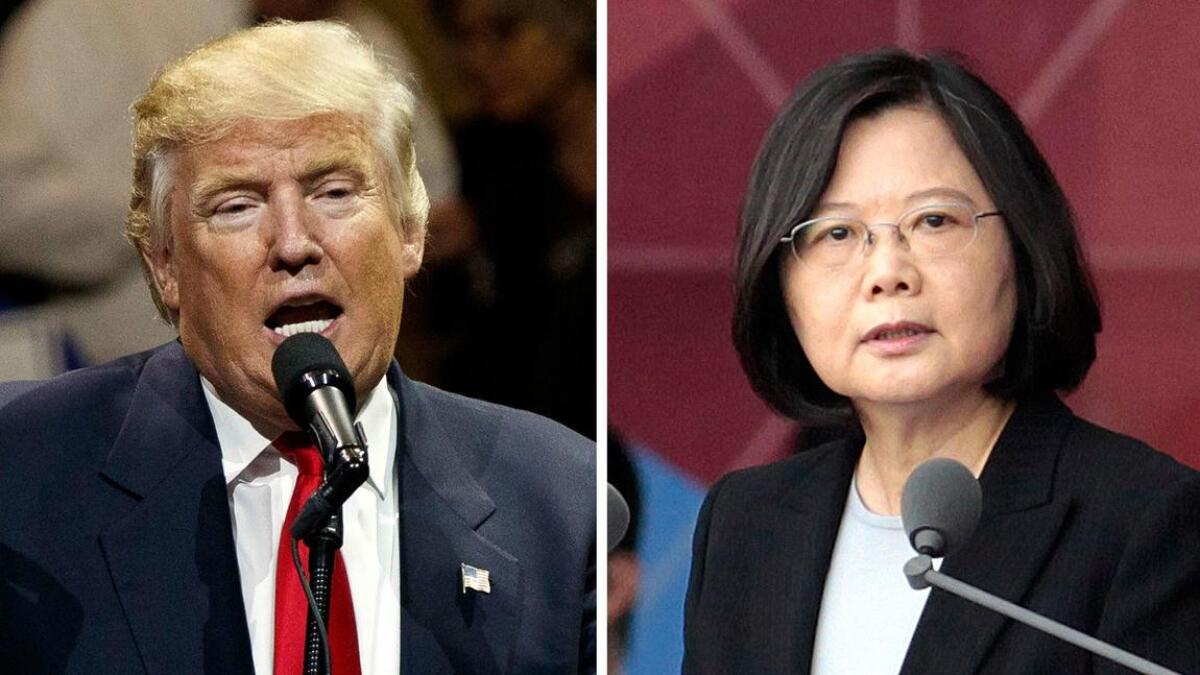
For eight years, many of President Obama’s critics denounced what they saw as excessive caution in dealing with foreign governments.
No need to worry about that anymore.
President-elect Donald Trump has already begun obliterating the current administration’s “no drama” approach. He sees unpredictability as a valuable tool, which keeps adversaries off guard, softening them up to cut good deals.
Many foreign affairs veterans from across party lines see danger ahead.
Trump once welcomed a visit from immigrant ‘Dreamers.’ Now they await his next move
Gaby Pacheco strode into Trump Tower’s gilded lobby on a mission to convince the businessman to back immigration reform and help young people like her who were brought to the U.S. illegally as children.
Back in that summer of 2013, Donald Trump was just beginning to flirt with a presidential run, and others warned her that he might be using the visit for publicity. But she and other Dreamers, as the young immigrants are called, coveted the star power he might bring to the cause.
Almost an hour later, she and a few colleagues departed the surreal encounter with doubts about Trump’s understanding of the issue, an inkling of his future political ambitions and, most oddly, parting gifts of chocolates, jewelry and neckties from his famous brands.
But they also left with a reason for optimism.
When Trump walked his young visitors to the elevator, he turned and nodded: “You convinced me,” he said.
Soon they will know whether they did.
Trump attacks White House aide who challenged his stand on Russian hacking to sway election
Donald Trump called Josh Earnest “a foolish guy” Thursday after the White House press secretary said the president-elect should stop attacking U.S. intelligence agencies for their conclusion that Russia tried to help Trump win the election.
The back-and-forth reflected rising tension between the incoming and outgoing presidents over Trump’s friendly posture toward Russian President Vladimir Putin.
“This foolish guy, Josh Earnest, I don’t know if he’s talking to President Obama,” Trump told thousands of supporters at his latest postelection campaign rally, in Hershey, Pa.
“You know, having the right press secretary is so important because he is so bad the way he delivers a message. He can deliver a positive message and it sounds bad.”
Trump called Obama “very positive” and wondered why Earnest was not. “Maybe he’s getting his orders from somebody else – does that make sense? Could that be possible?”
At a White House press briefing Thursday morning, Earnest fielded questions on Trump’s rejection of U.S. intelligence agencies’ conclusion that Russia tapped emails from Hillary Clinton’s allies and released them to help swing the election to Trump.
Earnest reminded reporters that Trump openly called on Russia in July to hack Clinton’s email, a statement that advisors later suggested was a joke.
“An adversary of the United States engaged in malicious cyber-activity to destabilize our democracy,” Earnest said. “That’s not a joke. Nobody at the White House thought it was a joke. Nobody in the intelligence community thought it was a joke. I’m not aware of any members of Congress in either party that was briefed on this matter multiple times dating back to the summer thought it was a joke.”
Obama has ordered a review of hacking aimed at influencing U.S. elections since 2008 and expects to get a report on it before Trump takes office on Jan. 20.
“It might be time to not attack the intelligence community,” Earnest said, “but actually be supportive of a thorough, transparent, rigorous, nonpolitical investigation into what exactly happened, and to cooperate with it, and to support it.”
Trump picks hard-liner for Israel ambassadorship
President-elect Donald Trump said Thursday that he plans to nominate as ambassador to Israel his lawyer, a hard-liner on the Middle East who has voiced opposition to decades of U.S. policy in the region.
David Friedman, who served as one of Trump’s main advisors on Israel during the campaign, vowed to perform as a “rock-solid partner” to Israel’s conservative leadership.
He has been quoted recently expressing doubt about the so-called two-state solution, the existence of an Israeli and a Palestinian state living side by side in peace, which has been the basis of U.S. policy for decades and the framework for peace negotiations in that part of the world.
“To blindly embrace a two-state solution because it’s been an American policy for the past 25 years is not something he’s going to do,” Friedman said in a recent interview with the Israeli website Ynet.
He added that Trump believed the two-state solution for Israel and Palestine was simply not working.
In the announcement of his appointment, Friedman also upended another U.S. tenet, saying he looked forward to being able to “strengthen the unbreakable bond” between the United States and Israel “from the U.S. Embassy in Israel’s eternal capital, Jerusalem.”
The United States, like almost every other country in the world, maintains its embassy in Tel Aviv and does not recognize Jerusalem as the capital of Israel because part of the city is also claimed by the Palestinians. The U.S. position is that the status of Jerusalem should be settled in negotiations.
Trump has said he would move the U.S. Embassy to Jerusalem. Previous presidential candidates have at times made a similar promise, but no president has ever done it out of concern that the move would inflame tension in an already volatile region.
“I think one of [Trump’s] first acts is going to be to recognize Jerusalem as the capital of Israel,” Friedman said in the Ynet interview, although he added that the actual move of the embassy might not happen right away.
Friedman, a bankruptcy lawyer, represented Trump in cases involving his Atlantic City casinos. He has been a columnist for two conservative publications in Israel. An Orthodox Jew, he is the son of a prominent rabbi from New York’s Long Island.
Trump pick for secretary of State has long Russia ties
As chief executive officer of Exxon Mobil Corp., Rex Tillerson has led a vast energy juggernaut, roaming the globe in search of multibillion-dollar deals, working with despots as well as democrats.
The brash Texas oilman has helped forge or supervise exploration, production and refinery projects in 50 countries on six continents, from Africa to the Arctic. The company was widely seen as a quasi-state, with more influence in some parts of the world than the U.S. government.
If Tillerson is confirmed as Donald Trump’s secretary of State, however, he may find that his 41-year career at the world’s largest publicly traded oil and gas company could hamper his ability to freely conduct foreign policy as America’s top diplomat.
A Senate confirmation fight already is brewing over Tillerson’s personal and business ties to Vladimir Putin, now Russia’s autocratic president. Few in Congress feel warmly about Putin, and many are outraged that CIA reports show that Russia used hackers to try to influence the U.S. presidential race.
After several days of leaks from his transition team, Trump confirmed Tuesday that he will nominate Tillerson, saying the 64-year-old oil mogul’s career “is the embodiment of the American dream.”
Trump’s electoral college win all but certain, but Hollywood actors urge revolt
All signs point to the electoral college sealing Donald Trump’s victory in the presidential election on Monday, but some Hollywood celebrities are calling for a revolt.
In a video released Wednesday, Debra Messing, Noah Wyle, Bob Odenkirk and other television stars plead with electoral college members to “vote their conscience” by rejecting Trump and picking someone else when they convene on Monday.
“As you know, our founding fathers built the electoral college to safeguard the American people from the dangers of a demagogue and to ensure that the presidency only goes to someone who is, to an eminent degree, endowed with the requisite qualifications,” actor Martin Sheen says in the opening of the video.
Sheen, who played a liberal president on NBC’s “The West Wing,” and the other actors argue that Trump is unfit for the presidency.
“He lacks the necessary stability,” Messing tells viewers.
The celebrities stress that they are not asking the 538 electors to support Hillary Clinton, who won the popular vote by about 2.8 million votes. Instead, they ask them to vote for someone more competent than Trump.
But the odds of the electoral college certifying anyone other than Trump as winner of the presidential election are extremely slim. The Associated Press reported Wednesday that a survey several of its reporters carried out of more than 330 of the electors found just one Republican declining to back Trump.
In 29 states, electors are legally required to support the presidential candidate who won their state’s popular vote. Even in other states, it is extremely rare for electors to vote for anyone other than the winner of their state’s popular vote.
In Colorado, a judge ruled Tuesday that the state’s nine electors are legally required to vote for Clinton, who won the state, halting a long-shot attempt by Democratic electors to unite with Republicans behind a candidate other than Trump.
By securing narrow victories in Michigan, Wisconsin, Pennsylvania and other swing states, Trump won 306 electors, easily surpassing the 270 needed to capture the White House. Denying him the presidency would require at least 36 Republican electors to desert him, something that currently there is no sign of.
Once again, Donald Trump makes false claim about warnings of Russian hacking
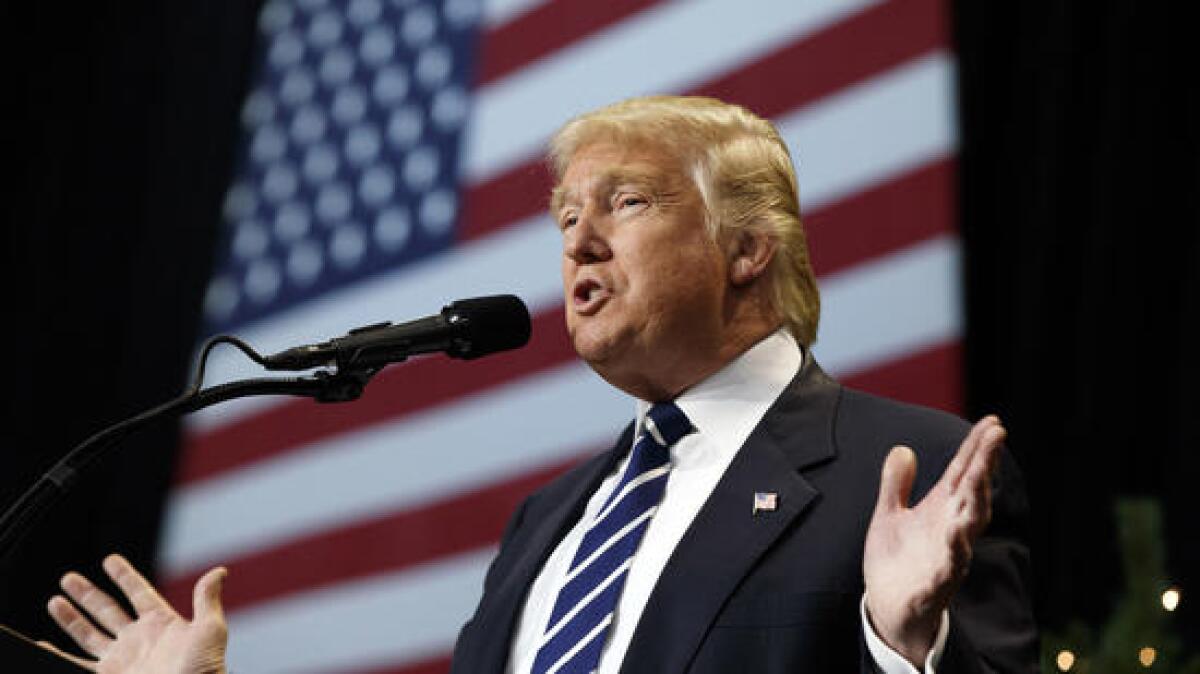
Dawn had barely broken Thursday when Donald Trump again spread via Twitter something provably false: that the White House had not raised an alarm about Russian interference in the presidential election until after Hillary Clinton’s defeat.
Trump himself had talked in September about accusations of Russian hacking, and again in October, after U.S. intelligence officials publicly accused Russians of complicity in purloining emails from Democratic organizations and officials. He talked about the hacking incessantly during the closing weeks of the campaign.
In a separate tweet Thursday, Trump accused the media of working “so hard to make my move to the White House, as it pertains to my business, so complex, when actually it isn’t.”
Except it was Trump and his team who canceled a long-planned Thursday news conference to explain how he’d handle his business while in office — citing the complexity of his company’s operations as the reason for the delay.
Trump’s tweet marked the second time in four days that he has asserted falsely that the government did not say anything in public about the Russian hacking until after the election.
His intent seemed to be framing concerns about Russian intervention in the election as an effort to delegitimize his election. Many of those alarmed about the foreign government’s actions — a group that includes Republicans — have said there’s no indication the intervention cost Hillary Clinton the White House.
Trump spokesman Jason Miller returned to that theme Thursday when asked about Trump’s tweets earlier in the day
“Well, I’d let the president-elect’s tweets speak for themselves,” he said. “I’d say the continued efforts to try to delegitimize the election at certain point — certain point got to realize that the election from last month is going to stand, whether it’s the recount or continued questions along this line, and we’re moving ahead and put together successful administration that’s ready to go to work serving the American people.”
Trump also turned to Twitter on Thursday for another frequent practice: retribution. His recent slighting of Boeing’s Air Force One contract came shortly after a Boeing official questioned his trade policy.
Shortly after Vanity Fair magazine published a negative review of Trump’s restaurant, he let loose with criticism of its longtime editor and its financial future.
“Has anyone looked at the really poor numbers of Vanity Fair Magazine,” Trump wrote. “Way down, big trouble, dead! Graydon Carter, no talent, will be out!”
Trump officially chooses Montana Rep. Ryan Zinke as Interior secretary
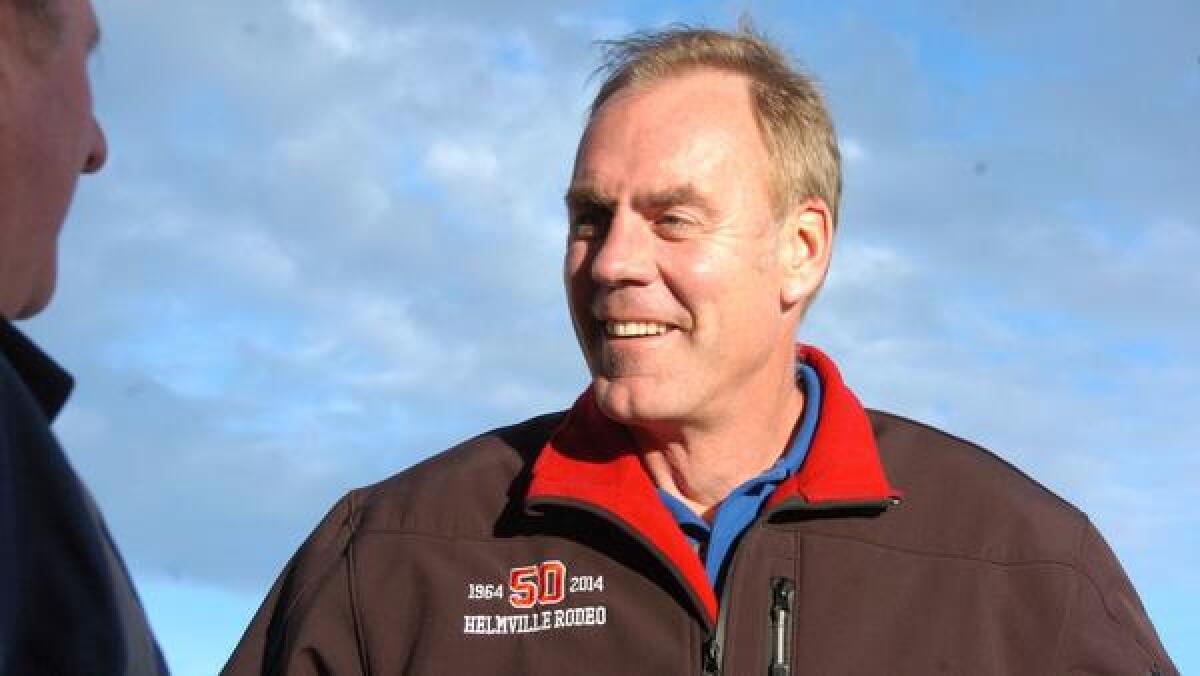
President-elect Donald Trump has officially chosen Montana Rep. Ryan Zinke to serve as his Interior secretary.
Zinke was an early supporter of Trump’s and publicly sought a Cabinet post when Trump visited Montana in May.
Trump’s decision to tap Zinke for Interior upends Senate Republican plans of recruiting the congressman to challenge two-term Democratic Sen. Jon Tester in 2018.
As Montana’s at-large representative, Zinke has proved he can win statewide, and the GOP considered Tester vulnerable in the midterms.
As with several other Trump Cabinet nominees, Zinke has advocated for increased energy drilling and mining on public lands and expressed skepticism about the urgency of climate change.
FCC Chairman Tom Wheeler to step down on Jan. 20, guaranteeing GOP majority
Tom Wheeler, the chairman of the Federal Communications Commission, announced Thursday that he would leave the agency on Jan. 20, guaranteeing Republicans will have a majority after President-elect Donald Trump takes office that day.
Wheeler, a Democrat who has served as chairman since late 2013, was widely expected to leave once Trump became president. The president gets to designate the chairman of the FCC, and Trump would pick a Republican to supplant Wheeler to head the commission.
But there was a question about whether Wheeler would buck tradition and stay on as a regular commissioner until his five-year term ends in 2018 to try to preserve some of his major policy actions.
Donald Trump has chosen an arch-right Cabinet. Here’s what might happen to his campaign promises
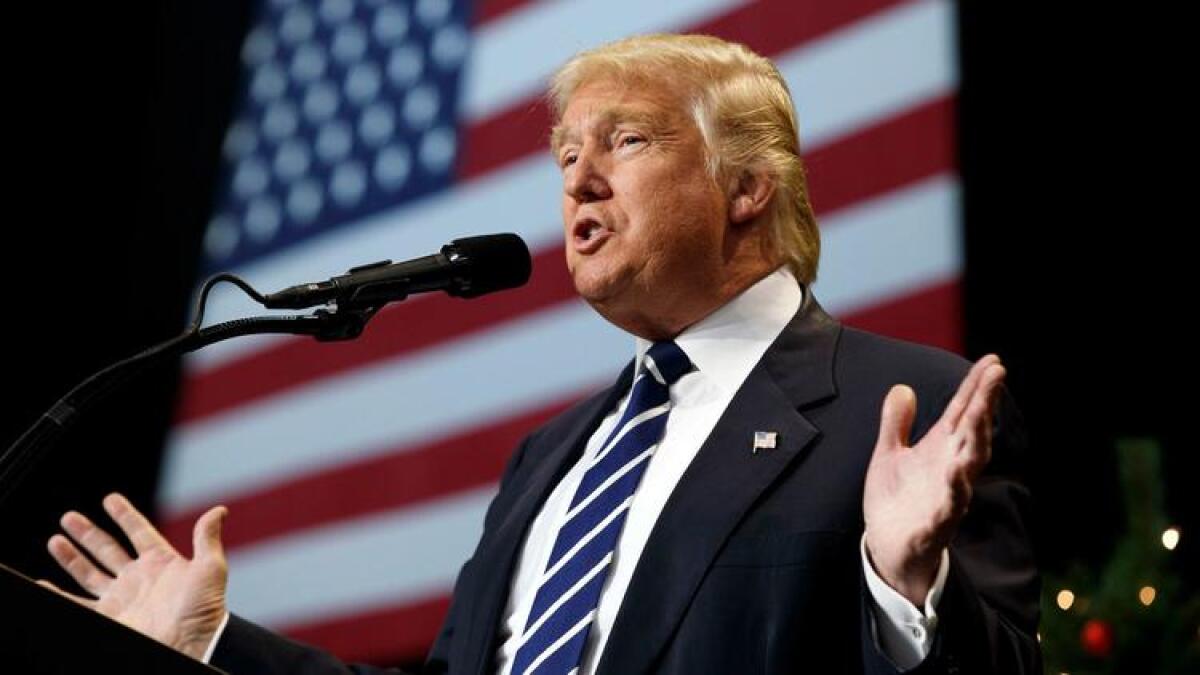
Donald Trump promotes himself as a man divorced from party ideology, a president-elect just as open-minded to input from Al Gore as from Newt Gingrich.
But with his Cabinet nearly complete, he has chosen one of the most consistently conservative domestic policy teams in modern history, setting himself up for hard decisions and potential conflict with some of his supporters when he begins to govern.
The internal conflicts have emerged with nearly every pick.
Trump campaigned against the big banks, then chose a former Goldman Sachs partner, Steven Mnuchin, to run his Treasury Department. He pledged to save Medicare and Social Security, then chose Rep. Tom Price (R-Ga.), who has advocated sweeping revisions in Medicare and Medicaid, to run Health and Human Services.
Trump has placed the burdens of working people at the top of his agenda, yet chose as Labor secretary an executive, Andrew Puzder, who talked in an interview about the advantages of replacing human workers with machines because they are “always polite, they always upsell, they never take a vacation, they never show up late, there’s never a slip-and-fall, or an age, sex, or race discrimination case.”
What happened when Silicon Valley went to Trump Tower
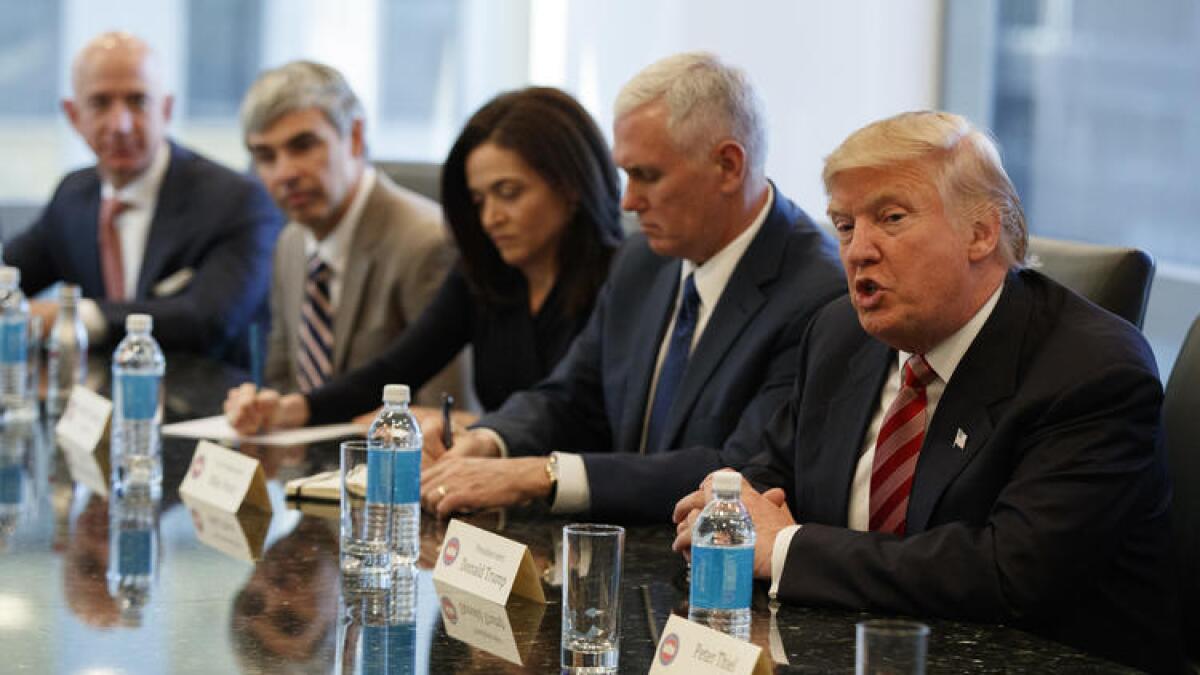
It wasn’t so much a reckoning as a reboot.
The nation’s top tech executives couldn’t know what to expect when they headed to Trump Tower in Manhattan on Wednesday for what President-elect Donald Trump’s transition team had billed as an innovation “summit.” They had reason to fear an ambush.
But if Trump holds grudges against Silicon Valley for the way that many of its denizens maligned and ridiculed him at every step of the presidential campaign, he worked hard not to let them show.
As Obama’s term winds down, public gives him high marks, but divides on his legacy
As President Obama’s term in office draws near to a close, he’s become an increasingly popular, but still polarizing, chief executive, with the public sharply divided over his legacy.
Overall, according to a new survey by the nonpartisan Pew Research Center, nearly half the public says history will remember Obama as an “outstanding” or “above average” president. The 45% who say so are the largest share since Ronald Reagan, who was viewed that way by 59%.
At the same time, the share saying history will view Obama as a below average or poor president, 27%, is higher than for any of his recent predecessors other than George W. Bush, who was seen that way by 57% of the public when he left office.
As it has been throughout his presidency, the partisan division over Obama is intense, with seven in 10 Democrats saying he will be remembered as outstanding or above average, but nearly six in 10 Republicans predicting he’ll be seen as below average or poor.
Partisan views of presidents have grown steadily more polarized for a generation. The public is more divided in its view of Obama than it was for Bush, who, in turn, suffered from a wider partisan split than did Bill Clinton.
Obama’s current job approval rating, 58% approving versus 37% disapproving, involves a similarly sharp partisan division.
Overall, Obama’s ratings are similar to those of Clinton and Reagan as they left office. The public’s view of him has improved markedly all year, with most of the improvement coming among self-identified independents, Pew found.
But while Democrats have consistently held a positive view of him, Republicans have been equally consistent in their negative view. Nine in 10 Democrats approve of Obama’s job performance, compared with 15% of Republicans. That’s the widest such partisan gap for any president going back to Dwight D. Eisenhower more than half a century ago.
In addition to the partisan gap, views of Obama also feature a big generation gap. More than three quarters of people in the millennial generation approve of his work. That drops to half of baby boomers and four in ten among those older than the baby boom.
About half of the public says Obama’s accomplishments will outweigh his failures. But only about a third say he has made progress toward solving major problems. Another third say he tried to make progress but failed, and one in five say he made the country’s major problems worse.
Not surprisingly, that assessment also has a big partisan split and also a split by race. Among African Americans, six in 10 say Obama made progress, compared with about four in 10 Latinos and just under one third of whites. Latinos are most likely likely to say he tried but failed, with almost half taking that view.
Asked what he’ll be most remembered for, about one in three Americans cite his landmark healthcare law, the Affordable Care Act, and one in six say Obama will be most remembered for being the nation’s first black president.
The Pew survey was taken Nov. 30 to Dec. 5 among 1,502 American adults. It has a margin of error of 2.9 percentage points in either direction.
Trump names heads of Uber and Tesla to his business advisory council
The heads of Uber and Tesla were named to President-elect Donald Trump’s business advisory council Wednesday, hours before a highly anticipated meeting between members of the incoming administration and some of Silicon Valley’s top executives.
Travis Kalanick, chief executive of ride-hailing giant Uber, and Elon Musk, the chief executive of Tesla Motors, will join a committee that previously had only one representative from the tech industry, Ginni Rometty, chief executive of IBM.
PepsiCo Chairman and Chief Executive Indra Nooyi was also named to the council Wednesday, bringing the group’s membership up to 19.
Kalanick and Musk have been critical of the president-elect.
In a November interview with CNBC, Musk said Trump was “not the right guy” for the presidency. Kalanick said last year he’d move to China if Trump won the election.
Of course, most tech bigwigs did not hide their distaste for Trump -- a fact that may be addressed in Wednesday’s meeting at New York’s Trump Tower with executives from Facebook, Apple and Google, among others.
Musk, whose companies are heavily invested in renewable energy, may clash with Trump over climate change, though the two could see eye to eye on creating more U.S. jobs.
Kalanick will likely advocate for labor laws that will allow his company to continue classifying Uber drivers as independent contractors rather than full-time employees with benefits.
But given Trump’s focus on jobs, Kalanick may find resistance to his long-term plan to replace human-driven cars with self-driving vehicles.
“I look forward to engaging with our incoming president and this group on issues that affect our riders, drivers and the 450+ cities where we operate,” Kalanick said in an emailed statement.
Representatives for Musk did not immediately respond to a request for comment.
Leading diabetes group joins opposition to Obamacare repeal
The American Diabetes Assn. has joined a growing list of patient advocates and other medical groups opposing the push to repeal the Affordable Care Act without first developing a replacement.
“The ACA provides numerous health insurance protections for people with, and at risk for, diabetes and has greatly improved access to adequate and affordable health insurance,” the group warned in a letter to congressional leaders.
“Congress should not risk critical advancements made under the ACA without simultaneously enacting a replacement plan that maintains or improves existing access to comprehensive, affordable healthcare coverage.”
The letter from the diabetes group – which advocates for nearly 30 million Americans with diabetes – follows a similar warning from the advocacy arm of the American Cancer Society, which also sent a strongly-worded letter last week to congressional leaders from both parties.
President-elect Donald Trump and senior Republican lawmakers have pledged to move early next year to roll back key parts of the healthcare law, popularly called Obamacare, including provisions that have allowed states to expand their Medicaid safety nets and have provided subsidies to low- and middle-income Americans to help with the cost of insurance premiums.
More than 20 million Americans who previously lacked insurance have gained coverage under the law.
To minimize disruptions, senior Republicans want to delay when the cuts would take effect. The idea is to buy time to allow the party to develop an alternative.
But many experts, including the American Academy of Actuaries and other independent groups, believe the GOP strategy would more likely lead to widespread turmoil.
Republican have been unable to agree on an alternative to the current law in the six years since it was passed.
The American Diabetes Assn. echoed those concerns.
“Repealing the ACA will create huge access barriers for millions of Americans, especially if no fully defined replacement is put in place immediately to meet the healthcare needs of individuals with chronic health conditions like diabetes,” the group said.
“The ACA ended fundamental inequities in access to adequate and affordable health insurance that separated Americans with diabetes from the tools they needed in the fight against the horrific and costly complications of diabetes including blindness, amputation, kidney failure, heart disease, stroke – and death.”
Silicon Valley CEOs didn’t hide their distaste for Donald Trump. Now comes the reckoning
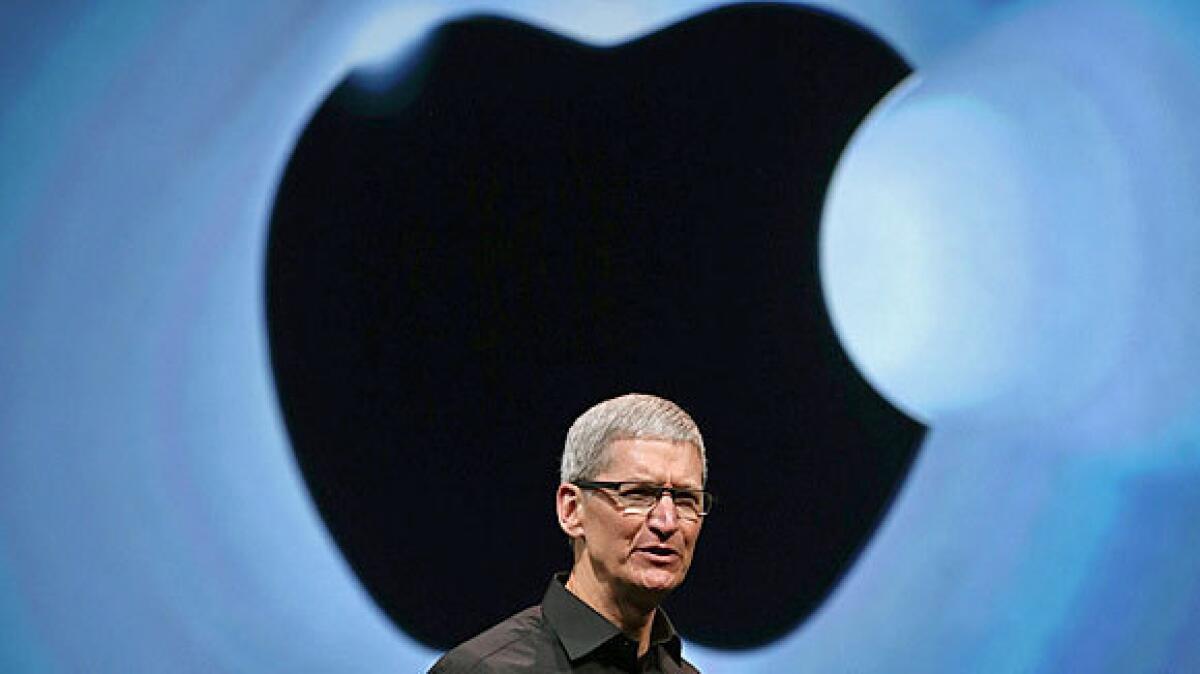
Silicon Valley’s entrepreneurs made little effort over the last year to conceal their distaste for Donald Trump, a candidate whose social media savvy belied what they saw as a staggering disregard for the innovation economy and the tech culture that has fostered it.
Now comes the reckoning.
Some of the nation’s top tech CEOs will find out how much of a grudge Trump holds when they ride the elevator up to his office in Trump Tower on Wednesday.
Tech titans including Apple Chief Executive Tim Cook, Sheryl Sandberg of Facebook, Elon Musk of Tesla and SpaceX and Larry Page of Alphabet, the corporate parent of Google, have been summoned by Trump as firms scramble to adjust to a reality for which they had not prepared — a potentially hostile president-elect indebted to almost no one in Silicon Valley, save for an idiosyncratic fellow billionaire they don’t particularly like.
In the new normal where no corporation is safe from the president-elect’s incendiary and stock-deflating Twitter barbs, tech firms could make an inviting target.
But Trump may yet find these liberal tech executives useful allies.
Trump brushes off concerns that secretary of State pick is too close to Putin
Donald Trump defended his choice of Rex Tillerson as secretary of State on Tuesday, brushing off concerns of both Democrats and Republicans that the Exxon Mobil chief executive is too close to Russian President Vladimir Putin.
“Rex is friendly with many of the leaders in the world that we don’t get along with, and some people don’t like that,” the president-elect told supporters at a “thank you” rally in West Allis, Wis.
“They don’t want him to be friendly. That’s why I’m doing the deal with Rex – because I like what this is all about.”
Trump praised Tillerson for striking “some of the greatest deals ever made in the oil industry” and said he would be joining “one of the great Cabinets – certainly the Cabinet with the highest IQ.”
Tillerson’s ties to Putin have alarmed critics at a time when Congress has opened a bipartisan probe of Russian meddling in the U.S. presidential election. Trump has mocked the Central Intelligence Agency for concluding that Russia hacked Democratic leaders’ emails and made them public to help swing the election to Trump.
At Exxon Mobil, Tillerson has lobbied to lift sanctions that the U.S. imposed on Russia for its occupation of Crimea and its military intervention in Ukraine. The sanctions have blocked giant Exxon Mobil projects in Russia.
Trump pointed to support for Tillerson from Dick Cheney, Condoleezza Rice and other Republican luminaries. Without mentioning the Iraq war that they prosecuted under President George W. Bush, he said Tillerson would help reverse “years of foreign policy blunders and disasters.”
Appearing onstage shortly before Trump was House Speaker Paul D. Ryan (R-Wis.). When Trump, who tussled with Ryan during the campaign, mentioned the speaker, the crowd booed.
“Honestly, he’s like a fine wine,” Trump told the audience once the jeers subsided. “Every day goes by, I get to appreciate his genius more and more. Now, if he ever goes against me, I’m not going to say that, OK?”
Trump said he and Ryan had “some amazing things in store,” such as tax cuts, the repeal of Obamacare and construction of a wall on the U.S.-Mexico border.
“We’re going to work on the wall, Paul,” Trump said to a burst of applause.
Also in the wings were Vice President-elect Mike Pence and Wisconsin Gov. Scott Walker. Trump joked openly about their presumed presidential aspirations.
“It’s going to be your turn very soon,” Trump said with a glance toward Walker. “You and Pence are going to have to fight it out.”
Governors of Western states look to the future under a Trump administration
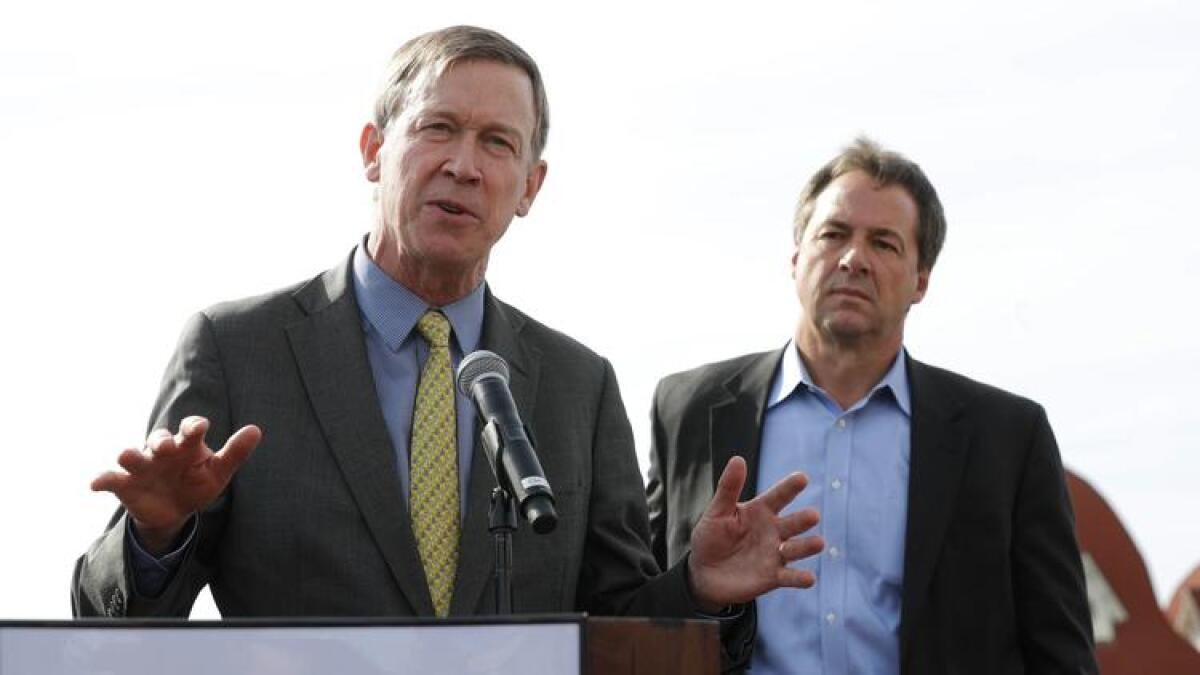
Governors on both sides of the political divide expressed uncertainty on Tuesday about what lies ahead under President-elect Donald Trump, whose stances on issues from immigration to healthcare have shifted over the last year.
“What positions is he going to take back? What things did he say he’s going to roll back on, and what things is he going to push forward? That uncertainty, I think, causes anxiety,” said Colorado Gov. John Hickenlooper, a Democrat, as he walked the manicured grounds of the spacious Hotel del Coronado, where the Western Governors’ Assn. opened its winter meeting.
New Mexico Gov. Susana Martinez, a Republican whom Trump mocked during the campaign as an ineffective leader for her state, said when it came to immigration she would like the administration to seek advice from the states. “We should make agreements together because we know our states the best,” Martinez said.
Trump team highlights Associated Press story on Tillerson — but just the positive parts
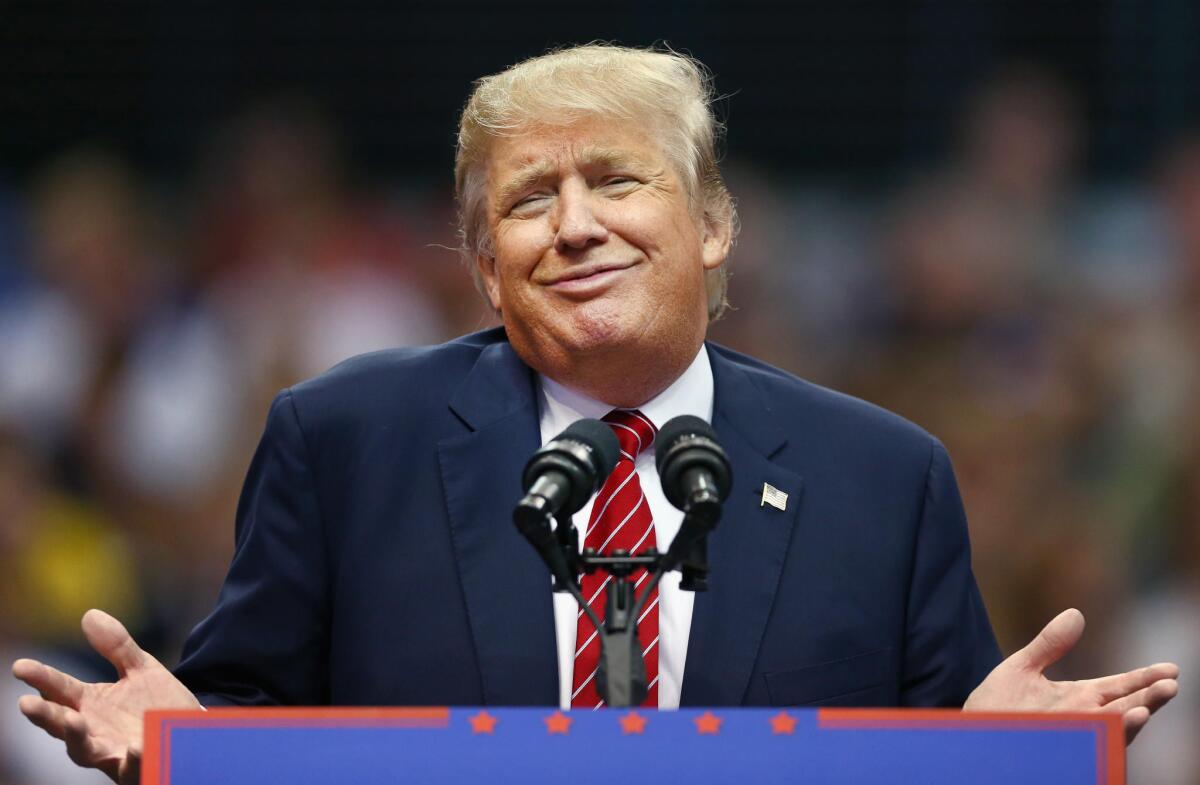
It looked like a standard news release. Donald Trump’s team sent an early morning missive to reporters using the subject line, “ICYMI: Trump’s Pick for State is an Accomplished Executive.”
The email featured what seemed to be a friendly Associated Press story about Rex Tillerson, the president-elect’s selection to be his secretary of State.
Turns out Team Trump used just 326 words of Jeff Horowitz’s 776-word Sunday story, which included analysis of Tillerson’s business practices, support for free trade and relationship with Vladimir Putin.
Among the portions clipped using ellipses were the second half of the story’s lead, highlighted in pink below.
The news release included all of the positive parts of the story, along with a “click here” link to the original piece.
It left out entire paragraphs regarding Tillerson’s backing of U.S. engagement in the Middle East, acknowledgement of the effects of climate change and the Order of Friendship granted to him by Putin, the Russian president.
It’s not unusual for press shops to highlight the news stories and headlines that reinforce their own talking points. But this “ICYMI” took things to the next level.
Here are some more sections omitted in the email.
Montana congressman is now the favorite to be Interior secretary
After transition officials put out word last week that Donald Trump had settled on a high-ranking establishment congresswoman from Washington state to serve as Interior secretary, it appears he has reconsidered.
Rep. Cathy McMorris Rodgers is no longer the favorite pick for the post managing 300 million acres of federal lands. Trump is now looking to Rep. Ryan Zinke, the at-large congressman from Montana, according to several news reports.
Zinke is a former Navy SEAL commander and ardent outdoor enthusiast who has broken ranks with GOP conservatives on some key environmental matters. Still, however, he is no favorite of environmentalists: He has a lifetime voting score from the League of Conservation Voters of 3 out of 100.
He also once called Hillary Clinton the “anti-Christ.”
Zinke gave up a post at the Republican convention in July over the issue of ownership of federal lands. The platform drafted at the convention calls for federal lands to be transferred to the states, a longtime goal of some western conservatives. Zinke opposes that, as does Trump.
Nearly a third of Montana’s land is publicly owned.
The Montana congressman also opposed a bill in Congress that would have permitted logging states to purchase up to 2 million acres of U.S. Forest Service land. And he has pushed for money for the Land and Water Conservation Fund, which goes to purchase park lands.
But while Zinke is an ally of outdoors groups seeking to preserve land for recreational purposes, on most environmental issues he aligns with Trump’s other Cabinet picks, almost all of whom have expressed skepticism about mainstream climate-change science and are pushing to ease restrictions on mining, drilling and hydraulic fracturing, or fracking.
“It’s not a hoax,” Zinke said of climate change in 2014, according to the Post, “but it’s not proven science either.”
That same year, at a campaign appearance, Zinke made the “anti-Christ” remark about Clinton, according to the Big Fork Eagle. He later said it was a joke.
Stymied vote recount exposed flaws in ballot integrity, Jill Stein says
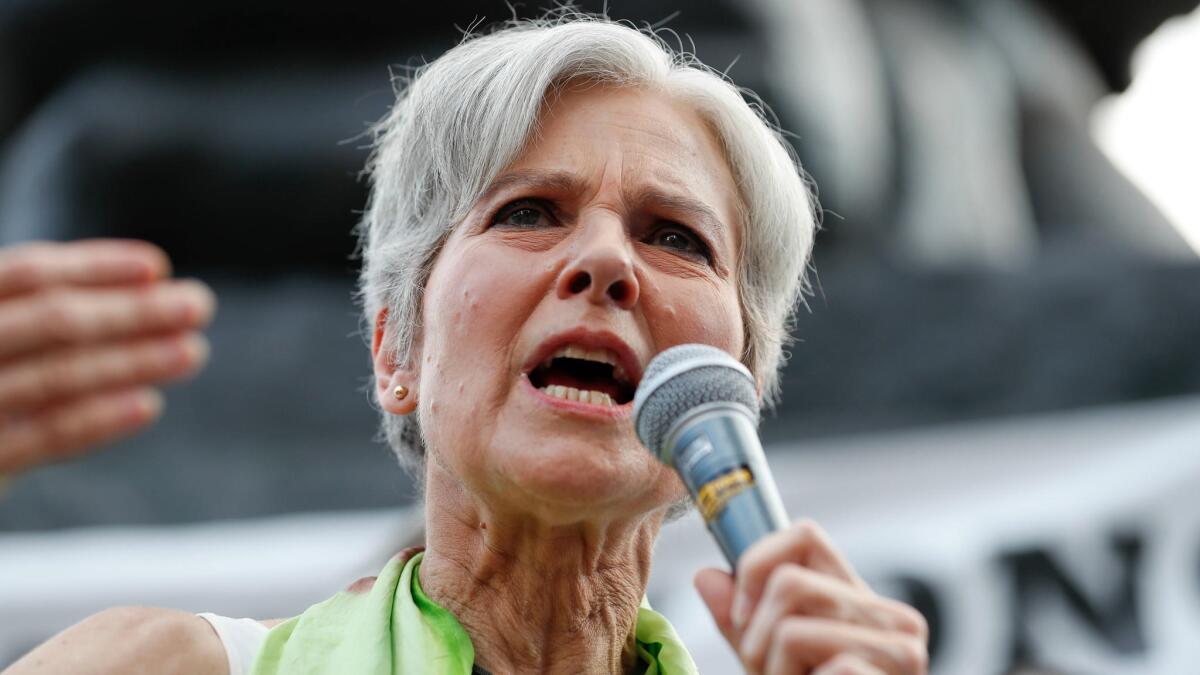
Jill Stein, the Green Party candidate for president, conceded Tuesday that her three-state vote recount drive was “stopped in its tracks,” but said she’d illuminated the need to shore up the security of balloting nationwide.
“While the count may have stopped, the movement for a voting system we can trust has been enormously energized,” Stein told reporters on a conference call.
Stein raised more than $7 million to seek recounts of the presidential vote in Wisconsin, Michigan and Pennsylvania. President-elect Donald Trump narrowly won those states.
Courts have blocked recounts in Michigan and Pennsylvania. The Wisconsin recount that was completed Monday wound up widening Trump’s margin of victory there to 22,748 votes out of the 2,976,150 cast.
Stein denounced Trump’s Cabinet appointments as “nothing short of a horror show,” but said she and Libertarian candidate Gary Johnson bore no responsibility for his national victory over Democrat Hillary Clinton.
Stein’s votes alone in Wisconsin, Michigan and Pennsylvania exceeded Trump’s victory margin over Clinton in each of those states. Clinton won the national popular vote by more than 2.8 million votes and would have captured the presidency if she’d won those three states.
Clinton aides say the minor-party candidates gained enough support from young voters in the campaign’s final days to swing the election to Trump.
Stein, however, said that if she not been on the ballot, many of the Americans who voted for her would have abstained or backed Trump over Clinton.
She and several advisors on the call said a tangle of laws and regulatory obstacles in Wisconsin, Michigan and Pennsylvania made it far too difficult to verify the integrity of the vote count.
They called for simplification of the nation’s patchwork of voting systems, with routine audits of random samples of paper ballots to confirm the accuracy of machine tallies.
Rick Perry wanted to scrap the Energy Department. Now he may run it
Former Texas Gov. Rick Perry holds the Department of Energy in such low regard that he famously couldn’t even remember it was on his list of federal agencies to eliminate altogether.
Now Donald Trump has chosen Perry to run it, according to multiple news reports.
In Perry, Trump would have another oil industry ally and climate skeptic in an administration that is shaping up to be dominated by them. And like other Trump picks for Cabinet posts, Perry is deeply skeptical of the department he would lead.
It was Perry’s disdain for the Energy department -- or, rather, his inability to articulate it -- that helped sink his bid for the GOP presidential nomination in 2012. “It’s three agencies of government, when I get there, that are gone: Commerce, Education and, the, uh, what’s the third one there?” Perry said during a primary season debate. “Commerce, Education and the uh, the uh...”
He continued. “The third agency of government I would do away with -- the Education, uh the, uh, Commerce, and let’s see -- I can’t... the third one, I can’t. I’m sorry ... oops.”
It was one of the more awkward moments in the history of presidential politics. Later in the debate, Perry finally remembered the agency he was reaching for was Energy.
Perry had been jockeying for the post with West Virginia Sen. Joe Manchin, a Democrat who supports Trump’s crusade to rollback environmental restrictions on coal energy production. Trump’s decision to pass over Manchin likely means the lawmaker will remain in the narrowly divided Senate to work with Democrats against much of the rest of the Trump agenda, and possibly against some of Trump’s nominees.
Perry is an unyielding proponent of opening up more land for drilling and hydraulic fracturing, or fracking, who promises to do away with subsidies for renewable energy and would set the department on a drastically different course than it is on now. Under the Obama administration, the Energy Department has been a hub of the president’s signature effort to counter global warming. It has distributed billions of dollars in loan guarantees to pioneering wind and solar projects, and its laboratories are incubators for clean energy innovation.
Like Trump, Perry has consistently mocked the Obama climate change effort as driven by politics. He questions the mainstream scientific consensus on global warming, that holds the Earth is warming at an alarming rate and time is running out to make aggressive reductions in greenhouse gas emissions. During his 2012 run, he called climate change a “contrived, phony mess.” When Perry ran for president again in the 2016 race, he joined almost all the other candidates in refusing the embrace the scientific consensus on warming.
But under Perry’s administration, Texas firms leveraged federal subsidies to become a national leader in wind energy. It produces more energy from wind than any other state, and Perry boasted that emissions in the state have dropped substantially as a result.
Even so, he continues to call for an end to such subsidies.
Trump digs in on Russia, faces potential confrontation with fellow Republicans
Donald Trump dug in deeply Monday against growing concerns over Russian efforts to influence the presidential election, setting up a conflict with his own party’s leaders even before he is inaugurated.
Trump sought to blame Hillary Clinton and the CIA for a renewed controversy over the hacking of Democratic emails during the campaign. The nation’s intelligence agencies have jointly blamed the hacking on Russia, and the CIA separately has reportedly concluded that the Russian effort was done with the specific intention of helping Trump win.
Trump persistently has refused to accept either of those conclusions; this weekend he sharply criticized the CIA and termed “ridiculous” any thought that Russia had tried to aid him.
On Monday, Senate Majority Leader Mitch McConnell of Kentucky defended the CIA. He and other Republicans announced their support for a congressional investigation of the foreign government’s actions.
As Trump and leading Republican senators head in opposite directions on the issue, concerns over Russia seem likely to dominate the weeks before Trump is inaugurated and could continue into the confirmation hearings for his senior advisors.
Trump chooses Exxon chief as next secretary of State
Donald Trump announced Tuesday he will nominate oil tycoon Rex Tillerson to be secretary of State, setting up a potential confrontation with fellow Republicans on Capitol Hill who are uneasy with the Exxon Mobil chief executive’s close ties to Russian President Vladimir Putin.
The move comes as Trump finds himself increasingly at odds with members of his own party over his favorable posture toward Russia. Senate Republicans have already announced they will move forward with a bipartisan investigation of Russian meddling in the presidential election, even as Trump mocked intelligence reports that Putin’s government sought to help him win the race.
In picking Tillerson, Trump is launching a battle of wills with some high-profile congressional Republicans, including the party’s 2008 presidential nominee, Arizona Sen. John McCain, who has spent the last several days signaling discomfort with the choice.
Trump says his sons will do ‘no new deals’ once they take over his business

Donald Trump said Monday night that his sons Eric and Donald Jr. would run his sprawling network of businesses after his Jan. 20 inauguration, but would do “no new deals” during his presidency.
“I will hold a press conference in the near future to discuss the business, Cabinet picks and all other topics of interest,” the president-elect wrote on Twitter. “Busy times!”
A series of Trump tweets Monday night made clear that his daughter, Ivanka, also planned to step away from the business, but offered no details. Her husband, Jared Kushner, was a top advisor to Trump during the presidential campaign and is likely to play a senior, but as yet undefined, role at the White House.
Trump said last month that he would hold a “major news conference” on Dec. 15 to disclose how he would avoid conflicts of interest in the White House. But a Trump spokeswoman said Monday that the announcement had been pushed back to January to give legal advisors more time to establish “proper protocol.”
Trump’s vast network of businesses spanning the globe poses substantial risk of conflicts of interest. He has suggested he might continue to hold an ownership stake in his businesses, even if he steps away from day-to-day operations, but government watchdogs say that would still pose enormous ethical problems.
Trump postpones plan to avert conflicts of interest in White House
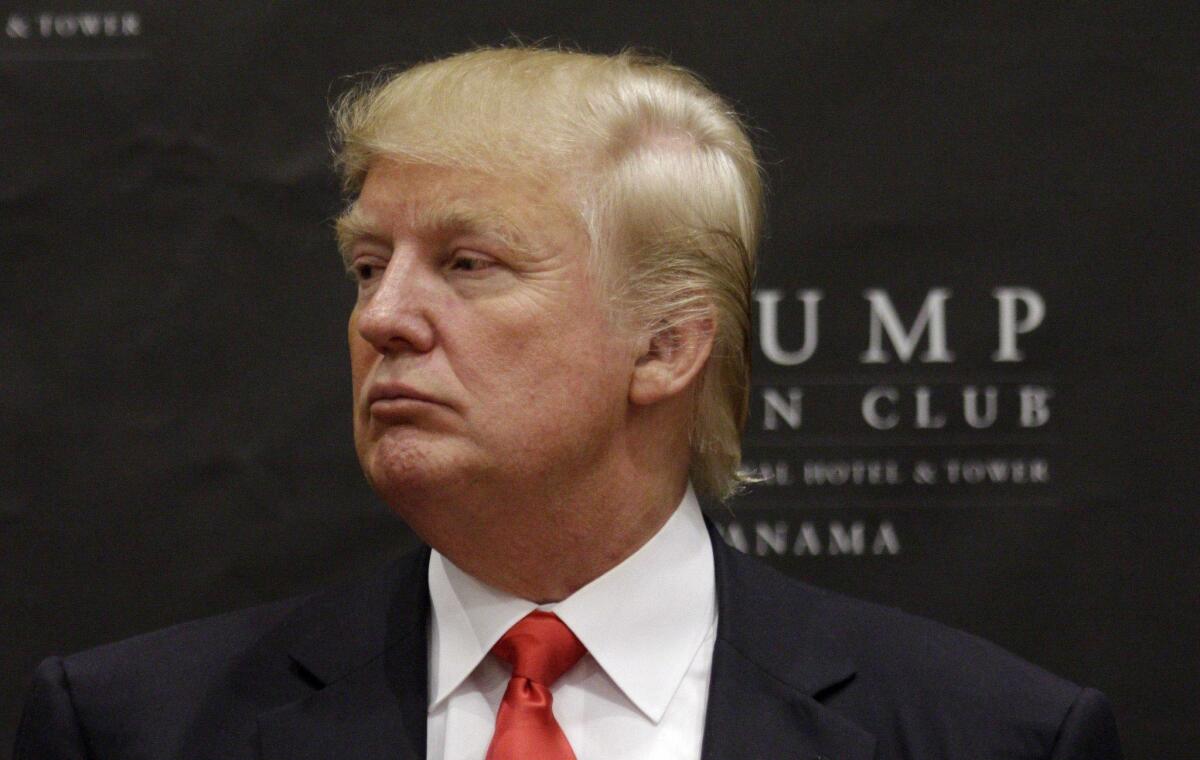
President-elect Donald Trump, whose global business deals pose major ethical challenges, scratched plans Monday for a “major news conference” on Thursday to disclose how he would avoid conflicts of interest in the White House.
Legal advisors to the president-in-waiting need more time to structure arrangements for a withdrawal from his business empire, Trump spokeswoman Hope Hicks said.
“With so many iconic properties and successful entities, moving the announcement to January ensures the legal team has ample time to implement the proper protocols so his sole focus will remain on the country and achieving his ambitious agenda with the help of the world-class Cabinet he has built,” Hicks said in an email.
Government watchdogs say Trump risks miring his presidency in scandal if he fails to isolate himself from his business more aggressively than what he has outlined in public remarks.
Trump’s business deals in Turkey, the Philippines, Scotland, India, Argentina and other nations could jeopardize the integrity of U.S. foreign policy, critics say.
On Nov. 30, Trump said he and his children would hold a major news conference on Dec. 15 to talk about “leaving my great business in total.”
“While I am not mandated to do this under the law,” he wrote on Twitter, “I feel it is visually important, as President, to in no way have a conflict of interest with my various businesses. Hence, legal documents are being crafted which take me completely out of business operations.”
In a Fox News interview that aired Sunday, Trump said his adult children would run the Trump Organization, but he would have “nothing to do with management.”
Asked about foreign interests trying to curry favor by doing business with the president’s family, Trump said he was already “turning down billions of dollars of deals.”
“I’m not going to be doing deals at all,” he said. “Now that would be – I don’t even know if that’s a conflict. I mean, I have the right to do it. You know, under the law, I have the right to do it. I just don’t want to do it.”
“I turned down seven deals with one big player – great player – last week, because I thought it could be perceived as a conflict of interest,” Trump added. “Probably a billion dollars of deals that I turned down.”
Trump said with his children in charge, it would be “totally different.”
“They’re not president,” he said. “But they’re not going to do it either. Oh, I see what you’re getting at. No. They’re not making deals either, for my company.”
Noah Bookbinder, executive director of the Citizens for Responsibility and Ethics in Washington, a nonprofit that tends to favor Democrats, said it was “a little worrying that Trump has pushed his plan to deal with conflicts of interest to some unnamed time in the future.”
“Hopefully this is a signal that he’s taking the issue very seriously and putting together a plan to deal with the myriad of conflicts his business brings by selling the business and putting the proceeds in a true blind trust, rather than using this as a stall tactic like he did to avoid releasing his tax returns after promising them,” he said.
Final Wisconsin recount tally strengthens Trump’s victory
Donald Trump slightly widened his lead over Hillary Clinton in a recount of Wisconsin’s presidential contest, leaving him more than 22,000 votes ahead in the final tally.
The results effectively ended the recount efforts of Green Party presidential hopeful Jill Stein in Wisconsin, Pennsylvania and Michigan, the crucial Rust Belt states that Trump won by narrow margins.
Courts blocked the recounts that Stein had sought in Pennsylvania, which certified its results on Monday, and Michigan.
The Wisconsin recount that was completed Monday increased Trump’s victory margin there by 131 votes. He won 1,405,284 votes -- 22,748 more than Clinton.
“The biggest reason for these small differences between the unofficial results on election night, the counties’ original canvasses and the recount results is human error,” said Michael Haas, administrator of the Wisconsin Elections Commission.
“Some voters do not follow the instructions and mark their ballots correctly for the machines can count them. In the tight deadlines to report the results, election officials make math mistakes, we forget things, we accidentally transpose numbers.”
Stein had argued that voting machines in Wisconsin, Pennsylvania and Michigan were susceptible to hacking, but produced no evidence of wrongdoing.
“This recount was never about changing the outcome; it was about validating the vote and restoring confidence in our voting system to Americans across the country who have doubts,” Stein said in a written statement.
Supreme Court upholds L.A. man’s bank fraud charge for siphoning money from a customer’s account
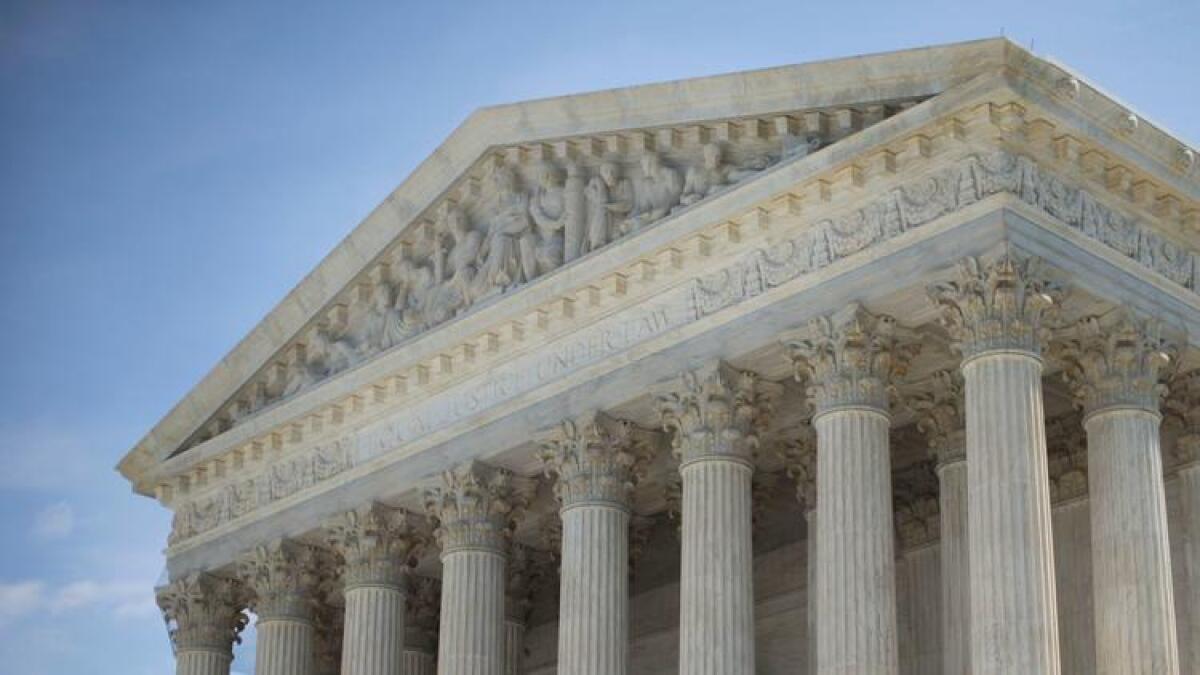
Someone who steals money from a customer’s bank account can be prosecuted for defrauding the bank, the Supreme Court ruled Monday, largely rejecting an appeal from a Los Angeles man who siphoned off nearly $300,000 from the checking account of a Taiwanese businessman.
Lawrence Shaw was accused of intercepting mail from Bank of America that was intended for Stanley Hsu, the businessman. According to the court documents, Shaw schemed to steal money by opening a PayPal account in his name and then transferring money from that account to accounts of his own.
White House defends CIA analysis: ‘You didn’t need a security clearance to figure out who benefited’
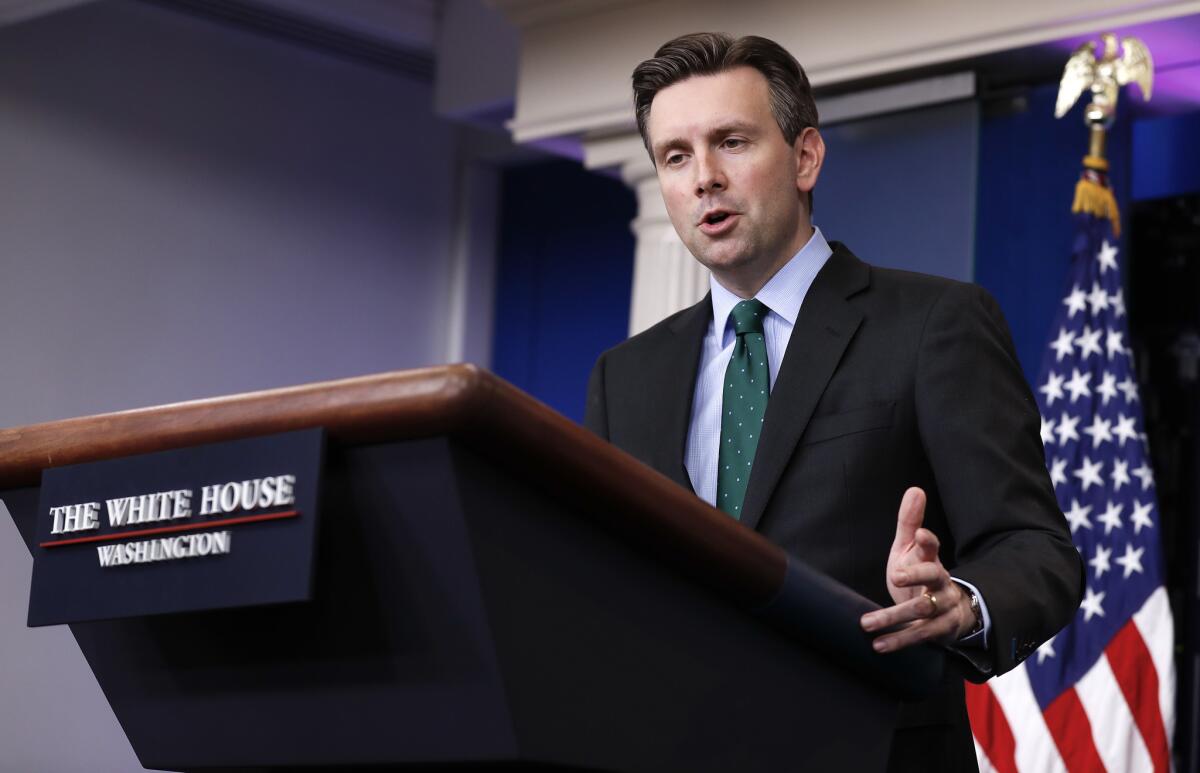
White House Press Secretary Josh Earnest on Monday defended a CIA finding that the Russians were behind the election-season hack of Democrats, saying, “You didn’t need a security clearance” to figure out who stood to gain from it.
“The president-elect didn’t call it into question. He called on Russia to hack his opponent,” Earnest said during an afternoon briefing. “So he certainly had a pretty good sense whose side this activity was coming down on.”
The final weeks of the campaign were focused on a discussion of emails that had been hacked and leaked by the Russians, he pointed out.
And the emails in question were those of a high-ranking adviser to Democrat Hillary Clinton’s campaign and of the Democratic National Committee, he added, not from the Republican National Committee and top Trump adviser Steve Bannon.
The remarks follow a weekend of talk-show debate about the hack, who carried it out and why. Trump ridiculed the CIA analysis on Twitter on Monday morning.
On a Monday morning conference call a short time later, Trump spokesman Jason Miller said the talk of Russian interference was “an attempt to try to de-legitimize President-elect Trump’s win.”
At the White House in the afternoon, Earnest argued that Trump did nothing to hide his high regard and ties to Russia.
“You didn’t need a security clearance to figure out who benefited from malicious Russian cyberactivity,” he said.
Russian hacking controversy is the fault of Hillary Clinton supporters and politics, Donald Trump and his team say
Donald Trump and his transition team portrayed questions about Russian interference in November’s presidential election as a fiction driven by “bitter” supporters of his defeated opponent — even as fellow Republicans in the Senate moved to investigate the hacking allegations.
In a series of early Monday morning tweets, Trump laid blame on his Democratic rival, Hillary Clinton, for a secret CIA analysis that found that the Russian government’s hacking of Democratic Party emails this year was meant to damage Clinton and boost Trump. The analysis was first reported by the Washington Post.
“Can you imagine if the election results were the opposite and WE tried to play the Russia/CIA card. It would be called conspiracy theory!” Trump tweeted.
He followed quickly with another comment: “Unless you catch ‘hackers’ in the act, it is very hard to determine who was doing the hacking. Why wasn’t this brought up before election?”
In fact, the issue was brought up before the election. Trump himself addressed the matter in the presidential debates, during which he consistently defended Russia against assertions that it had been behind the hacking of officials at the Democratic National Committee.
“I don’t think anybody knows it was Russia that broke into the DNC,” Trump said during the first debate in late September, refuting intelligence assessments he had been given. “I mean, it could be Russia, but it could also be China. It could also be lots of other people. It also could be somebody sitting on their bed that weighs 400 pounds, OK?”
On a mid-morning conference call, Trump spokesman Jason Miller said concerns about Russian election interference were an attempt to deny Trump his rightful win.
“I think really clearly what this is is an attempt to try to de-legitimize President-elect Trump’s win,” he said. He suggested that stories about CIA concerns were part of a trio of such effects that also included Green Party candidate Jill Stein’s attempted recounts in certain states and talk of Hillary Clinton’s popular vote victory.
“Where we are as an incoming administration is getting ready to serve the American people and hit the ground running,” he said.
“And that might upset some people who are bitter that their candidate lost in November, but that’s not going to slow us down from focusing on going to work for the American people.”
In a statement late Friday, Trump had responded to the Washington Post article by blaming CIA officials for an erroneous analysis — effectively taking the side of Russia over the U.S. intelligence agency.
“These are the same people that said Saddam Hussein had weapons of mass destruction,” Trump said of the CIA.
But his forceful comments have not stilled concern on Capitol Hill. On Monday, Senate Majority Leader Mitch McConnell (R-Ky.) declined to criticize Trump’s statement, but he defended the CIA as he agreed to a Senate investigation of Russia’s actions.
“I have the highest confidence in the intelligence community and especially the Central Intelligence Agency,” he said. “The CIA is filled with many selfless patriots, many of whom anonymously risk their lives for the American people.”
GOP leader McConnell stops short of saying hacking helped Trump: ‘Russians are not our friend’
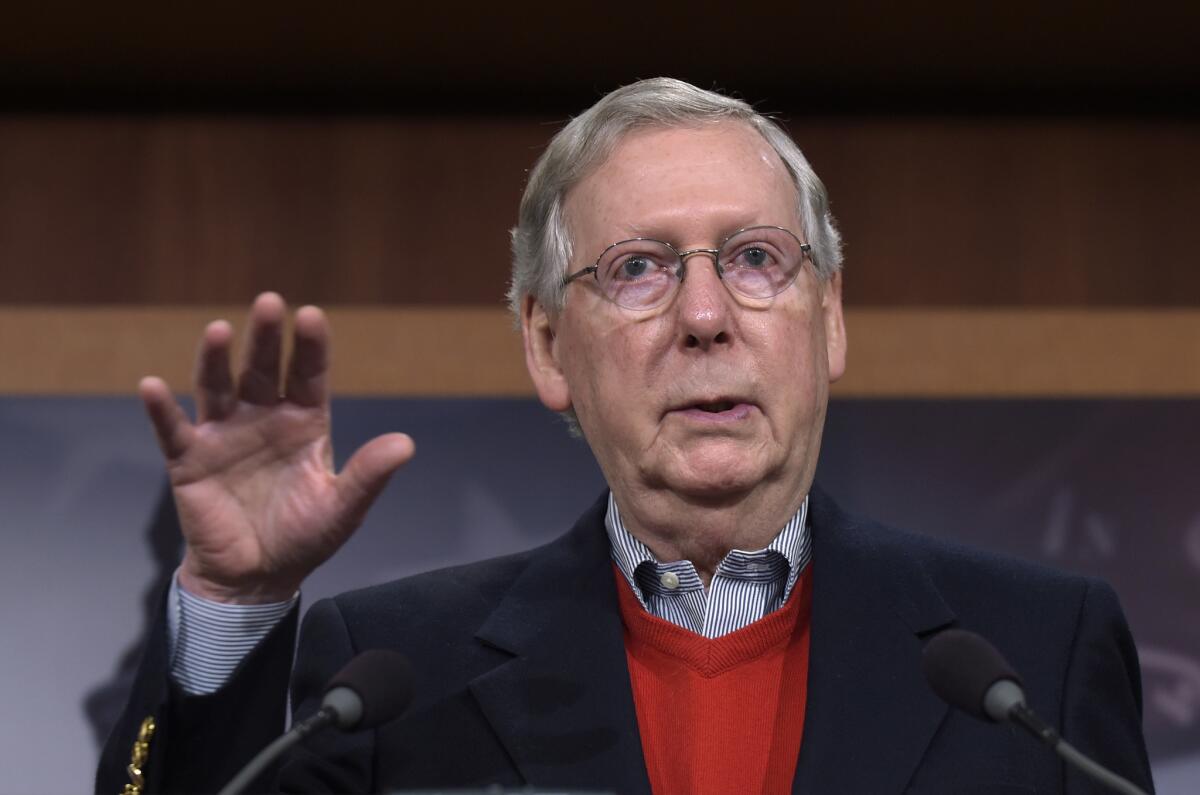
Senate Majority Leader Mitch McConnell condemned Russia’s role in U.S. political hacking, but stopped short of saying he believes Russia deliberately sought to sway the election to President-elect Donald Trump.
“We ought to approach all these issues on the assumption that Russia does not wish us well,” McConnell told reporters at a news conference Monday.
“The Russians are not our friend.”
Trump has cast doubt on the CIA’s assessment of Russian hacking and has repeatedly suggested he wants to see warmer ties between Washington and Moscow, putting the president-elect on a potential collision course with top senators from both parties.
Sen. John McCain (R-Ariz.), Sen. Lindsey Graham (R-S.C.), Sen. Charles E. Schumer (D-N.Y.), the incoming minority leader, and Sen. Jack Reed (D-R.I.) have jointly called for an bipartisan investigation into the foreign hacking and the role it may have played in the November election.
McConnell was careful not to attack Trump’s remarks, but said he welcomed the review through the regular channels of the Senate Armed Services Committee and the Senate Intelligence Committee.
Others have said a broader independent investigation should be conducted, similar to the 9/11 Commission convened after the Sept. 11, 2001, terrorist attacks.
“This issue should not and must not turn into a political football,” Schumer warned. “It’s absolutely essential that this investigation be bipartisan, wide-ranging, and have access to all of the relevant intelligence so that we can find out how this happened, and how we can stop it from happening ever again.”
McConnell is often careful with his words, and on Monday he was particularly circumspect.
The Kentucky Republican declined to venture beyond the public statements of the intelligence community on Russia’s intentions.
“Anything else is irresponsible, likely illegal and potentially for partisan political gain,” he said.
And he refused to discuss to reports that he was privately skeptical of information from an earlier classified briefing.
“It defies belief that somehow Republicans in Senate are reluctant to either review Russian tactics or ignore them,” he said.
“I have the highest confidence in the intelligence community and especially the Central Intelligence Agency. The CIA is filled with many selfless patriots, many of whom anonymously risk their lives for the American people,” he said.
The Senate leader did criticize President Obama’s administration, which he said “sat back” while Russia expanded its sphere or influence.
But he also pushed back against Trump’s views on foreign policy — particularly the role of the North Atlantic Treaty Organization as a defense against Russia.
“NATO’s important,” McConnell said. “We intend to keep the commitments that are made in the NATO agreement, which by any obj standard is probably one of the most, if not the most, successful military alliances in world history.”
Trump’s strategy on protecting American jobs rattles companies
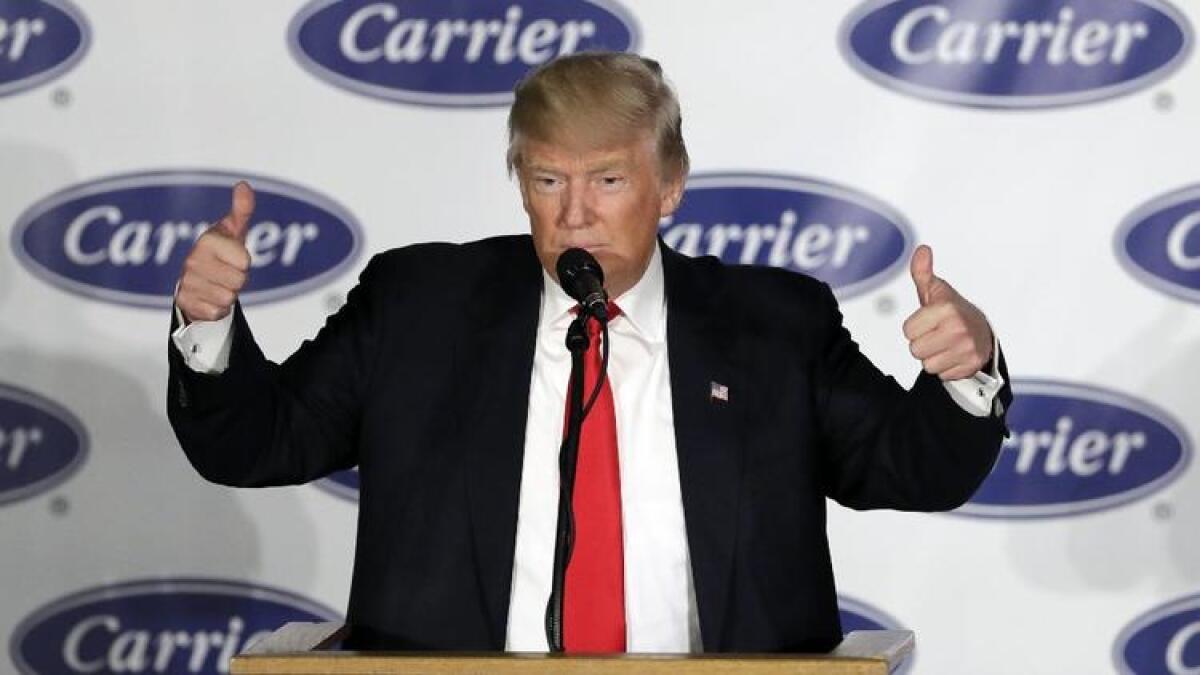
President-elect Donald Trump has not yet been sworn in, but he’s already set the tone for how he will deal with companies as the nation’s chief executive.
After successfully pressuring furnace maker Carrier Corp. to keep hundreds of jobs in Indiana instead of sending them to Mexico, Trump wasted little time in fingering another manufacturer in Indianapolis, Rexnord Corp., which is about to move south of the border and “rather viciously firing all of its 300 workers.”
Along the way, Trump issued a blanket warning that businesses shifting jobs abroad will soon be looking at tariffs of 35%, the same amount that he had threatened during the campaign that he would slap on Mexican imports. He spoke of 45% duties on Chinese goods.
Rhetoric aside, analysts reckon some companies now will think twice about moving. Why incur the risks of stiff penalties, damaging publicity and possibly even hectoring from the White House? Trump has said that companies thinking about leaving the U.S. will get “a lot of phone calls,” presumably from his new administration.
Trump and the GOP are charging forward with Obamacare repeal, but few are eager to follow
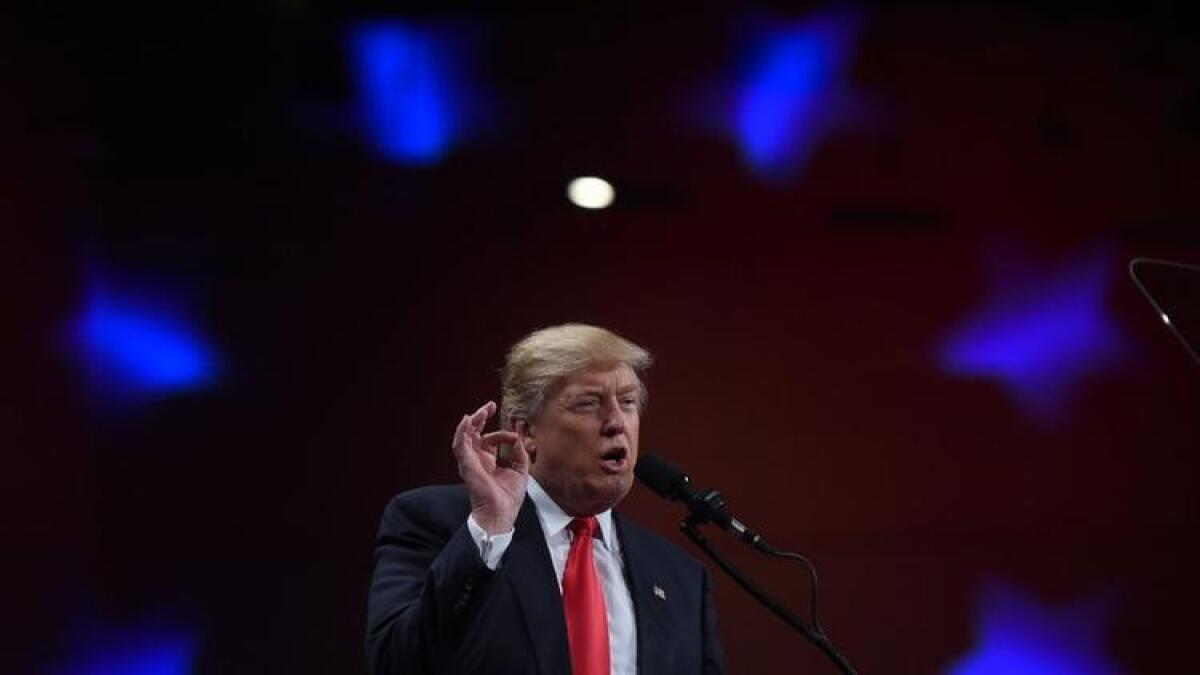
As they race to repeal large parts of the Affordable Care Act, President-elect Donald Trump and congressional Republicans are leaving behind nearly everyone but their base voters and a handful of conservative activists.
Not a single major organization representing patients, physicians, hospitals or others who work in the nation’s healthcare system backs the GOP’s Obamacare strategy.
New polls also show far more Americans would like to expand or keep the healthcare law, rather than repeal it.
Even many conservative health policy experts caution that the emerging Republican plan, which calls for a vote in January to roll back insurance coverage followed by a lengthy period to develop a replacement, could be disastrous.
Intensifying the political risks for Republicans, a growing number of patient groups are warning that millions of Americans are in danger of losing vital health protections and that Republicans need to agree on a replacement plan first, before they uproot the current system.
Chinese state media slam Trump for his latest Taiwan comments
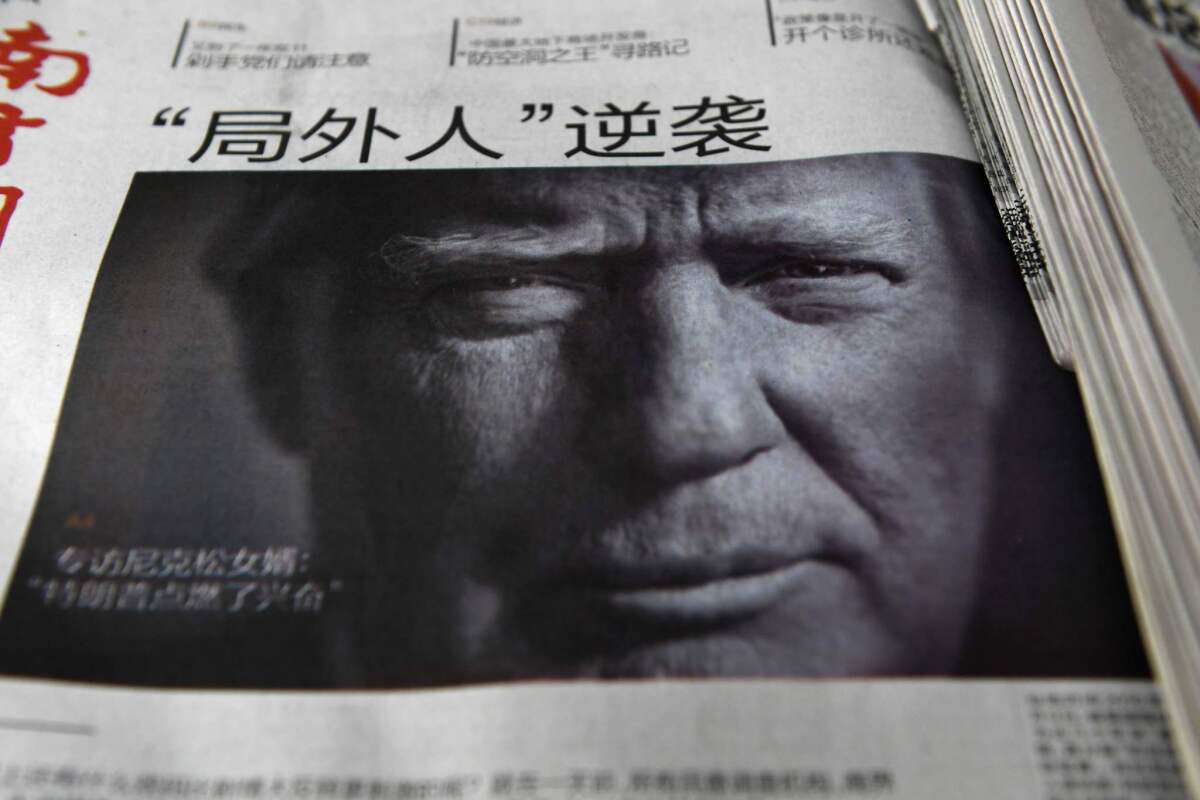
Chinese state media criticized President-elect Donald Trump on Monday after he hinted his administration might toss aside four decades of U.S. policy and not consider Taiwan part of one, united China.
The Global Times, in a biting editorial, called Trump “as ignorant as a child in terms of foreign policy” and warned him against a move that could rupture U.S.-China relations: “Listen clearly, the One-China policy cannot be traded.”
Trump’s comments on Fox News on Sunday morning took aim at Beijing just a week after he broke with long-standing precedent and accepted a call from Taiwan leader Tsai Ing-wen.
“I fully understand the one-China policy, but I don’t know why we have to be bound by a one-China policy unless we make a deal with China having to do with other things, including trade,” Trump said.
Trump’s call with Tsai marked the first direct contact between an incoming or current American president and Taiwan’s leader since the U.S. broke off formal diplomatic relations with Taiwan in 1979. Beijing considers the self-governing island a breakaway province and opposes any country’s attempt to recognize it. Both view themselves as the rightful governments of a united Chinese state.
Beijing lodged an official protest after the conversation but has not gone much further.
Trump told Fox News it would have appeared disrespectful not to take Tsai’s phone call. “Why should some other nation be able to say I can’t take a call?” he said on the news network.
Trump defends considering oil executive with ties to Vladimir Putin for secretary of State
President-elect Donald Trump on Sunday defended his potential choice of Rex Tillerson, a powerful oil executive with close ties to Russia’s president, for the post of secretary of State .
“He’s much more than a business executive. I mean, he’s a world-class player,” Trump said during a “Fox News Sunday” interview. “And to me, a great advantage is he knows many of the players, and he knows them well. He does massive deals in Russia. He does massive deals for the company, not for himself, for the company.”
Trump said he is still considering multiple candidates, specifically mentioning former Massachusetts Gov. Mitt Romney and Republican Sen. Bob Corker of Tennessee.
Reports of Russian meddling in election ‘ridiculous,’ Trump says
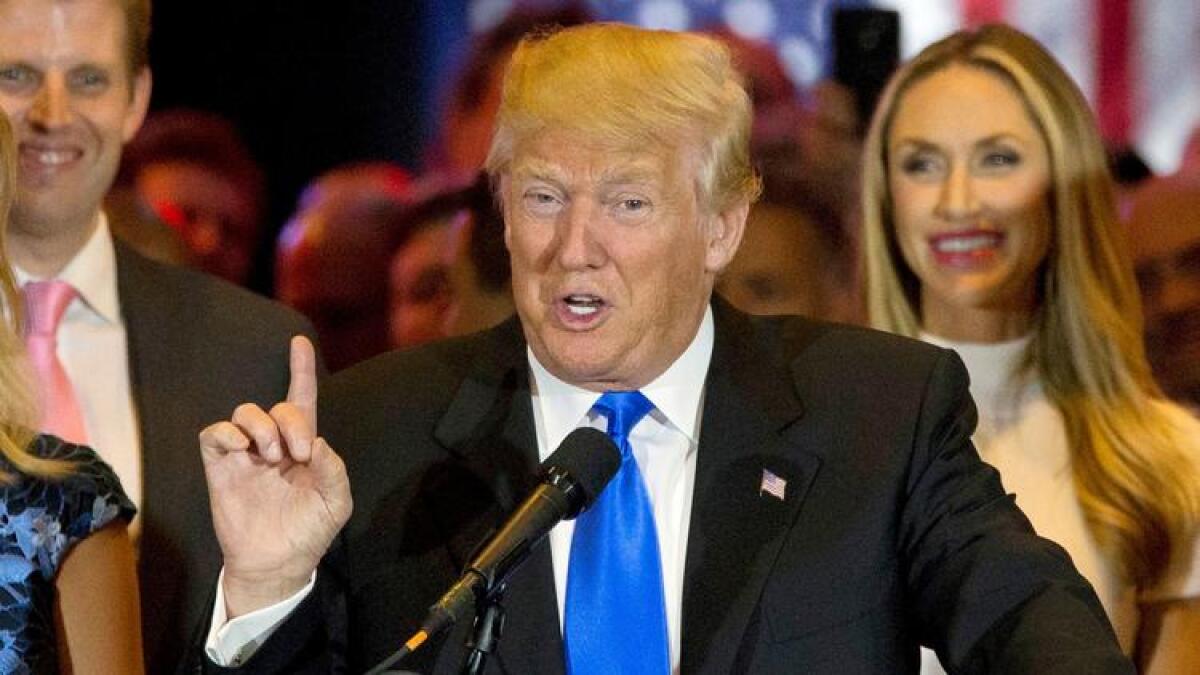
President-elect Donald Trump on Sunday blamed Democrats for reports of a secret CIA assessment that Russia tried to sway the 2016 election in his favor.
“I think the Democrats are putting it out because they suffered one of the greatest defeats in the history of politics in this country. And frankly, I think they’re putting it out, and it’s ridiculous,” Trump said on “Fox News Sunday.”
He also cast doubt on whether the intelligence community’s analysis is correct.
“If you look at the story and you take a look at what they said, there’s great confusion,” Trump said. “Nobody really knows, and hacking is very interesting. Once they hack, if you don’t catch them in the act, you’re not going to catch them. They have no idea if it’s Russia or China or somebody. It could be somebody sitting in a bed someplace. I mean, they have no idea.”
On Saturday, Trump’s transition team mockingly compared the secret CIA assessment to the agency’s historic misjudgments on Iraq’s weapons of mass destruction. Several prominent Republican and Democratic senators and representatives have called for congressional review of Russia’s influence in the election.
Prominent senators say Russian election interference should alarm all Americans
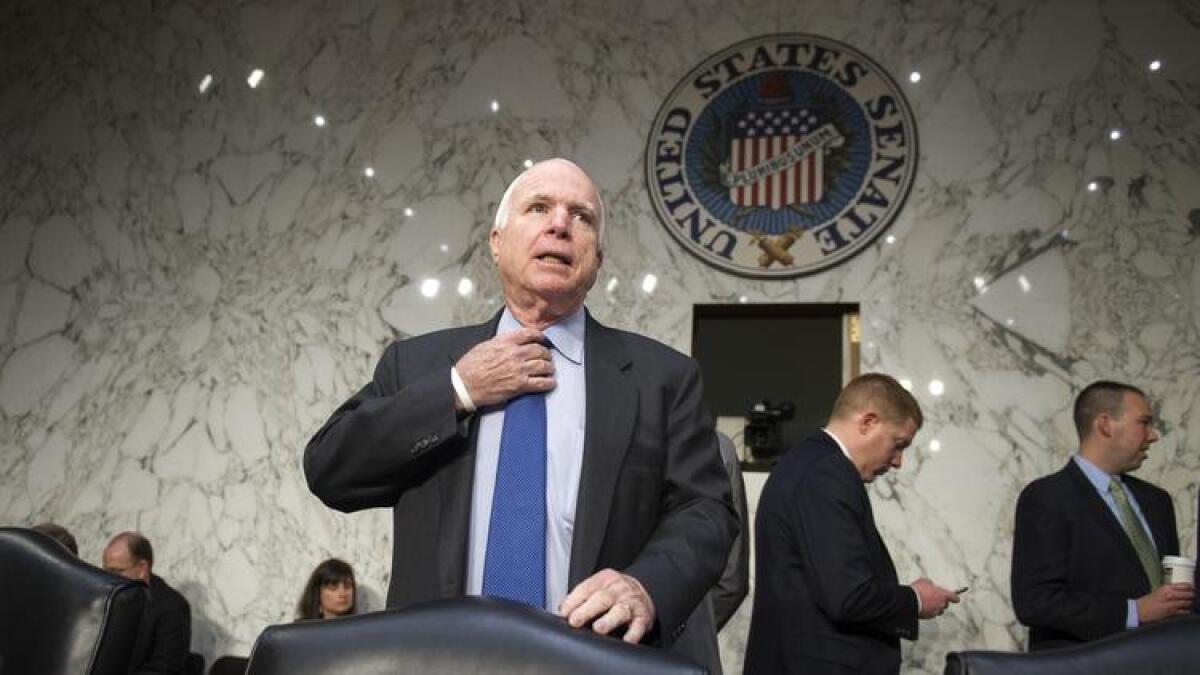
In a rare joint statement Sunday morning, four high-profile Republican and Democratic senators said news reports of the CIA’s analysis of Russian interference with the 2016 election should alarm every American.
“Democrats and Republicans must work together, and across the jurisdictional lines of the Congress, to examine these recent incidents thoroughly and devise comprehensive solutions to deter and defend against further cyberattacks,” said the statement from Senate Armed Services Committee Chairman John McCain (R-Ariz.), committee member Lindsey Graham (R-S.C.); incoming Senate Minority Leader Charles E. Schumer (D-N.Y.), and Armed Services Committee ranking member Jack Reed (D-R.I.).
“This cannot become a partisan issue. The stakes are too high for our country. We are committed to working in this bipartisan manner, and we will seek to unify our colleagues around the goal of investigating and stopping the grave threats that cyberattacks conducted by foreign governments pose to our national security,” the statement said.
Trump poised to pick Rex Tillerson, oil tycoon with ties to Russia, as secretary of State, reports say
In a decision that could alter U.S. relations with one of its principal rivals, President-elect Donald Trump is expected to choose Rex Tillerson, a powerful oil tycoon with close ties to Russia’s president, as secretary of State, according to media reports.
Tillerson, chief executive of Exxon Mobil Corp., one of the largest companies in the world, would likely face rocky Senate confirmation hearings because of his company’s business interests with Russia.
Many in Congress already are worried about Trump’s refusal to recognize what the U.S. intelligence community has concluded was hacking by Russia and an attempt to help Trump win the presidential race.
The Trump transition team said no official announcement on the nomination would be made until next week at the earliest, and they cautioned that other contenders had not been completely eliminated. Trump often changes his mind, and the Tillerson nomination would be highly controversial.
The obscure constitutional provision that could be trouble for Trump
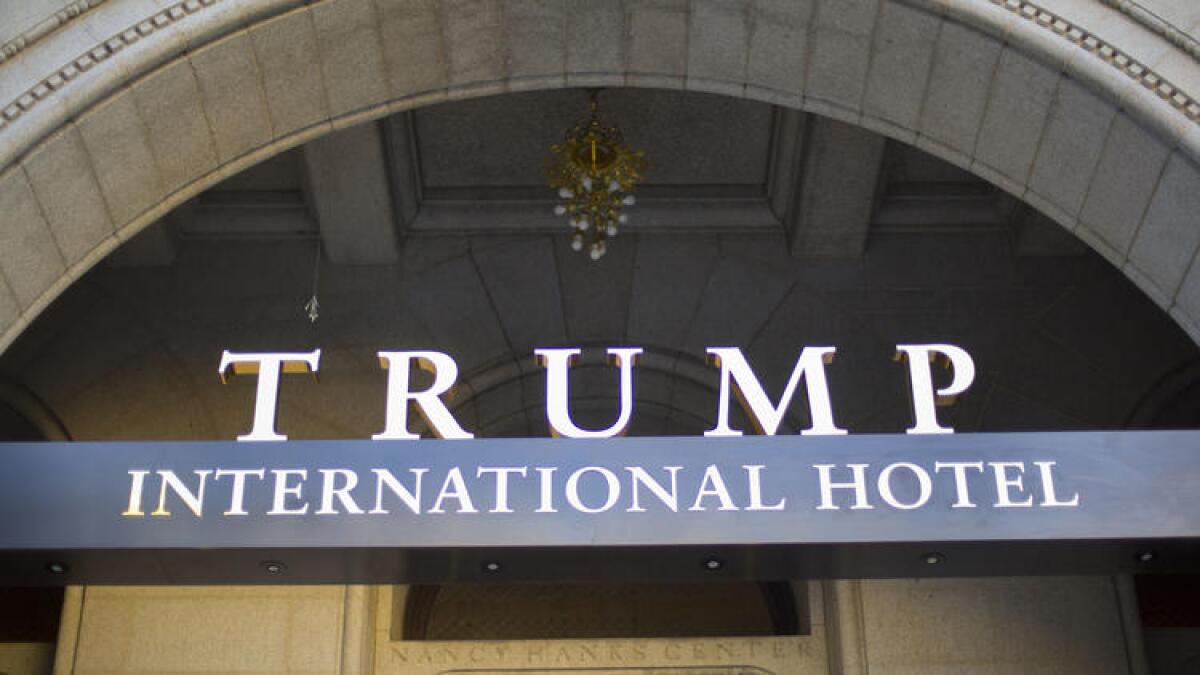
President-elect Donald Trump is set to take an oath next month to “preserve, protect and defend the Constitution of the United States.”
But a previously obscure provision in the the nation’s founding document has now become the focus of special attention because of Trump’s worldwide real estate holdings and business ventures.
Known as the “emoluments clause,” the provision says “no person holding any Office of Profit or Trust under them, shall, without the Consent of the Congress, accept of any present, Emolument, Office or Title, of any kind whatever, from any King, Prince or foreign state.”
Tensions erupt between Trump and CIA over Russia’s hacking during the 2016 campaign
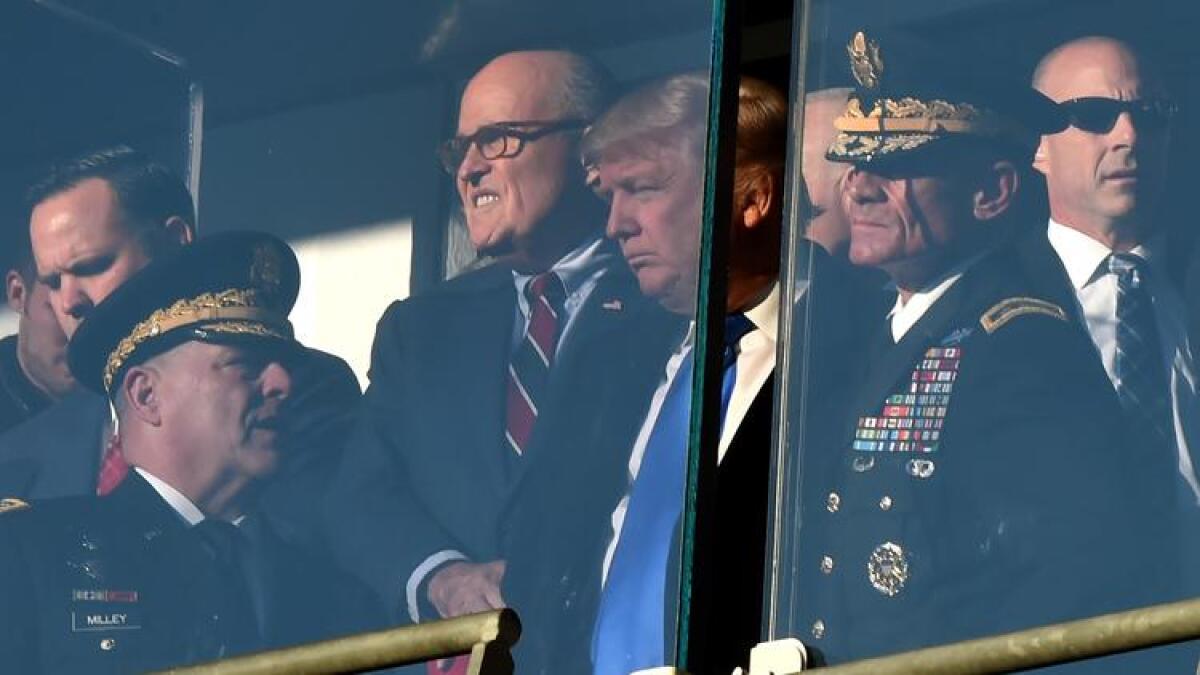
Tensions between Donald Trump and U.S. intelligence officials boiled over Saturday as Trump’s transition team mockingly compared a secret CIA assessment that Russia tried to sway the U.S. election in Trump’s favor to the agency’s historic misjudgments on Iraq’s weapons of mass destruction.
The widening public rift between the incoming president and the nation’s powerful intelligence community could pose high-risk problems both for his administration and for national security.
Republican wins U.S. Senate seat in Louisiana, giving GOP 52-48 edge in the chamber
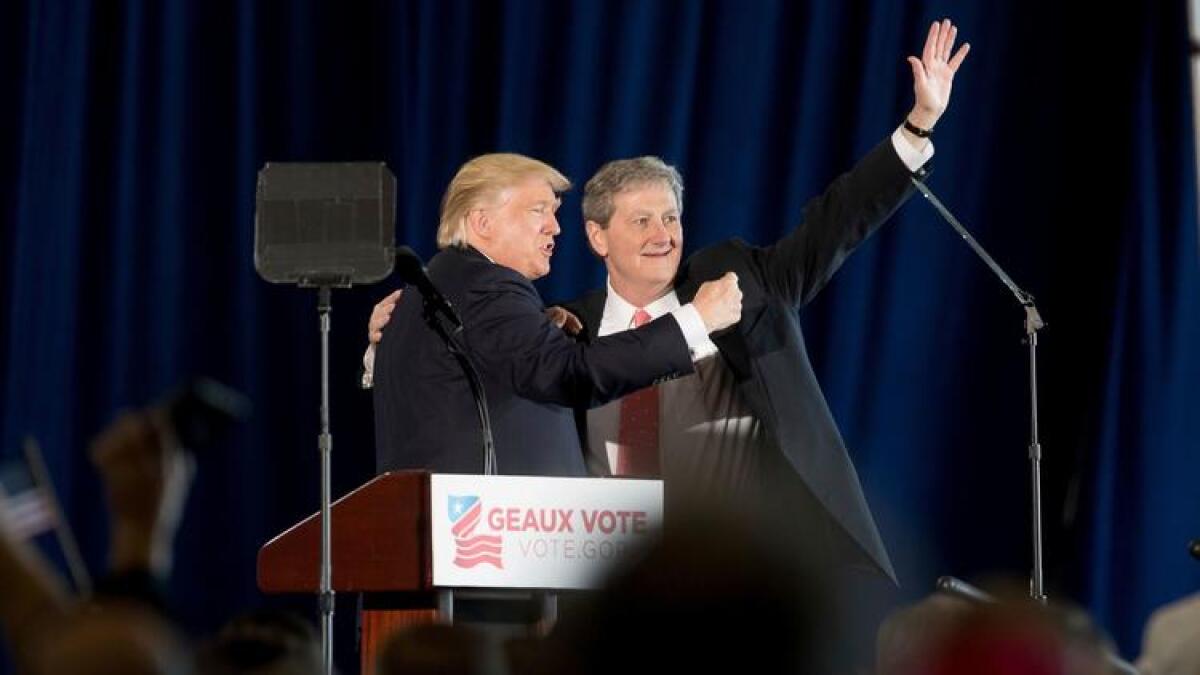
Louisiana voters Saturday chose to send Republican state Treasurer John Kennedy to the U.S. Senate, filling the chamber’s last seat and giving the GOP a 52-48 edge when the new term begins in January.
Kennedy had always been the runoff election’s front-runner in a state that overwhelmingly supported Donald Trump. He defeated Democrat Foster Campbell, a state utility regulator whose chances were seen as such a long shot that national Democratic organizations offered little assistance to Campbell’s campaign.
Voters also filled two open U.S. House seats Saturday, for the 3rd District representing southwest and south central Louisiana and the 4th District covering northwest Louisiana.
Donald Trump tweets that he won’t be working on ‘The Apprentice’
Trump names Dow Chemical chief to advisory role at same time federal government reviews proposed mega-merger
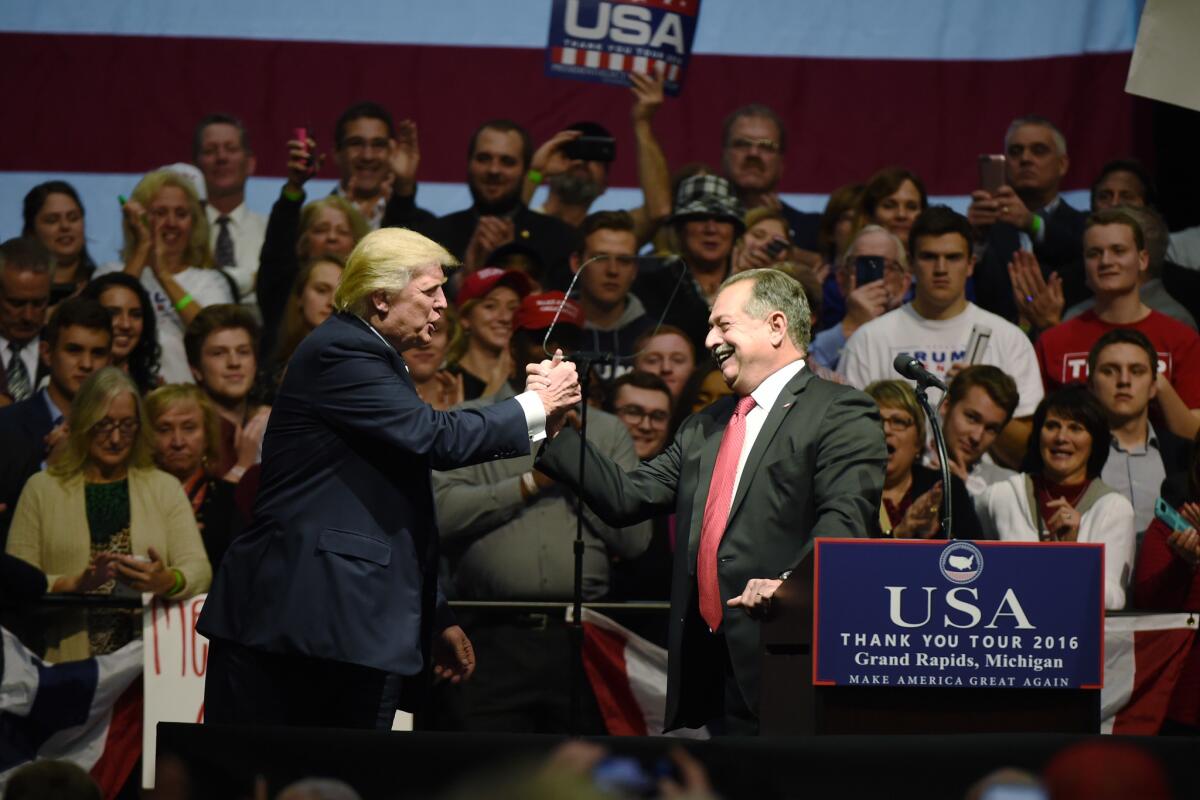
President-elect Donald Trump named the head of Dow Chemical to an economic advisory role Friday night, even as the federal government is reviewing the company’s proposed mega-merger with rival DuPont.
Trump announced the appointment of Dow Chief Executive Andrew Liveris as head of the Manufacturing Council at a rally in Michigan, where Dow -- one of the state’s largest employers -- is headquartered.
The council serves as a liaison between the U.S. manufacturing industry and the federal government.
Liveris’ focus, Trump suggested, would be job creation and revitalizing the country’s manufacturing sector.
“Let’s make America great again by building great things in America,” Liveris said to a roar from the audience in Grand Rapids, where Trump appeared as part of a postelection tour of states he carried in November.
With a flourish, Liveris announced the building of a new research-and-development facility in Michigan, which, he said, would create 200 jobs.
“Isn’t that great!” Trump exulted after clasping Liveris’ hand. “That’s what’s going to happen, folks, we’re gonna get jobs. We’re coming back.”
Unmentioned was the proposed merger between Dow and DuPont, two of the world’s largest chemical companies, which is under review by antitrust regulators in Washington and other countries.
Rudolph W. Giuliani won’t be joining Trump administration
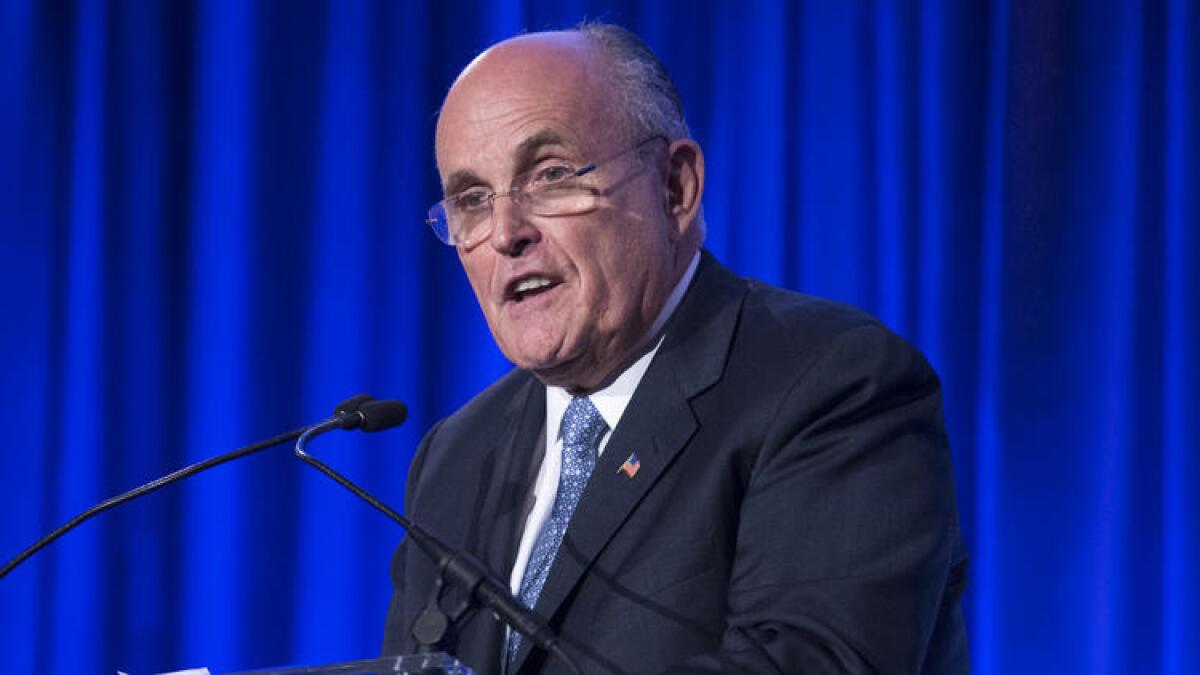
Former New York Mayor Rudolph W. Giuliani, the combative and fiercely loyal Trump surrogate who was widely expected to play a major role in the new administration, has taken himself out of the running for a Cabinet post.
The announcement from the Trump transition team came Friday, as the president-elect was still widely believed to be mulling Giuliani for the role of secretary of State or a major national security post. Giuliani appeared by Trump’s side at many of his rallies during the campaign, and he has often been Trump’s stand-in on the cable news networks and the Sunday television talk shows.
While more moderate when he was mayor of New York, Giuliani’s politics took a hard turn toward the right in recent years. His support of Trump had been unflinching in the face of a Republican establishment that remained uneasy with the New York businessman up through election day. But Giuliani’s uneven temperament and a history of incendiary remarks posed a challenge for Trump as he set out to assemble a Cabinet that assuages voter concerns about his own temperament.
Reince Priebus, who will be Trump’s chief of staff, said Giuliani “was vetted by our team for any possible conflicts and passed with flying colors.” He will continue to advise Trump and serve in the role of vice chairman of the transition.
“This is not about me; it is about what is best for the country and the new administration,” Giuliani said in a statement. “Before I joined the campaign I was very involved and fulfilled by my work with my law firm and consulting firm, and I will continue that work with even more enthusiasm. From the vantage point of the private sector, I look forward to helping the president-elect in any way he deems necessary and appropriate.”
Trump said in his statement that Giuliani “ would have been an outstanding member of the Cabinet in several roles, but I fully respect and understand his reasons for remaining in the private sector.”
The Trumpification of Washington has already begun, and residents wonder how he will change the city

The European diplomat crunched celery from his Bloody Mary at the hotel bar. Hundreds of donors to a conservative think tank buzzed around the lobby, awaiting a speech from Vice President-elect Mike Pence in the presidential ballroom.
“This is the place,” the diplomat said amid the rumble of Tuesday night activity, declining to allow his name to be used as he recounted the many powerful people in Washington who suddenly want to hold meetings or events here, at President-elect Donald Trump’s newest hotel.
“In a way, it’s a bit of hype,” he said.
Trump and hype have long gone together, as evidenced by the $100 cocktail on the hotel menu that combines rye and vodka with a modicum of caviar and a raw oyster.
Until his improbable political journey, however, Trump’s style had been mostly absent from the nation’s capital, a city he vanquished by mocking its values, expertise and conventions.
Now Washington, where just 4% of the voters chose Trump, must decide how to adapt to the man who will not only run the White House, but have his name prominently affixed to a landmark hotel just a few blocks away.
Transitions of power are part of life here, but Trump is a unique figure who ran against the establishments of both parties, calling into question the very underpinnings of the city.
“We are the nation’s capital, and we need to be respectful of the president and give the president all of the honors of the office,” said Elissa Silverman, a city council member. “But as a city, I would say we have different values.”
Trump said to pick drilling advocate Cathy McMorris Rodgers for Interior
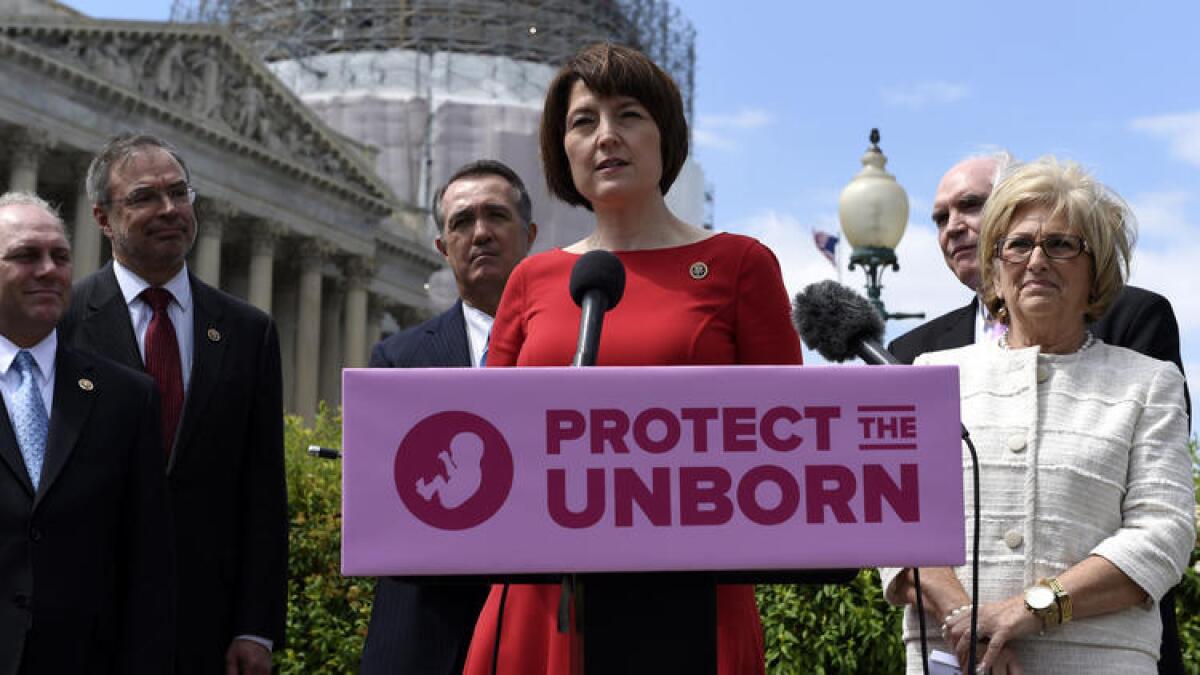
Donald Trump has chosen Rep. Cathy McMorris Rodgers (R-Wash.), a member of the GOP congressional leadership and a strident advocate for increased oil and gas drilling on federal lands, to head the Interior Department, according to multiple news reports.
McMorris Rodgers, the highest ranking Republican woman in the House of Representatives, would take the helm of a 70,000-person agency that manages hundreds of millions of acres of federal lands, including the National Parks system. She would be charged with implementing Trump’s plan to aggressively roll back many of the environmental restrictions the Obama administration has placed on federal lands, which the president-elect wants to open up for substantially more drilling and mining.
In picking the congresswoman, Trump has chosen an ally who has been loyal to him politically and who shares his view that big energy companies should have more access to the lands under federal stewardship. McMorris Rodgers has voted against environmental protections repeatedly, earning her a score of zero in 2015 from the League of Conservation Voters. She supports opening the Atlantic Ocean for drilling, and has fought efforts to regulate hydraulic fracturing, or fracking, on federal land. She also voted to make it easier to drill in Native American lands.
If confirmed, McMorris Rodgers would continue the tradition of a Westerner running the Interior department, which reflects the vast acreage of federal land in the West. While she has not had a high profile in environmental issues, McMorris Rodgers has been a trusted adviser to Trump, serving as one of the co-chairs of his transition team and working with Trump’s daughter Ivanka on childcare policies.
She is a polished and steadfast leader of the GOP caucus in the House, where she is often a point person to represent the party before the media. Her strong ties in Congress and experience brokering deals, rallying fellow Republicans, and staying on message will help Trump build bridges on Capitol Hill and project an orderly pursuit of his agenda.
But if confirmed, McMorris Rodgers will find herself at the center of the nation’s most contentious environmental battles, facing an organized resistance that already is mobilized to fight Trump’s plans.
The Sierra Club immediately declared her appointment unacceptable.
“Selling off our public lands to the highest bidder and opening them to drilling, mining and logging is not in the best interest of our country,” said a statement from Sierra Club executive director Michael Brune, “but that is exactly what Rep. McMorris Rodgers has voted to do over and over again.”
Senate leaders offer Trump a solution with new deportation deferral plan for Dreamers
President-elect Donald Trump promised this week to “work something out” for the Dreamers, and on Friday, two senators served up a possible solution.
Sen. Richard Durbin (D-Ill.) and Sen. Lindsey Graham (R-S.C.) will introduce legislation Friday to give young immigrants three years of protection from deportation under a new program allowing them to work, go to school or the military, and remain in the U.S. if they are otherwise lawful.
The bipartisan “Bridge Act” is an opening effort from Congress to help Trump move away from his harsh rhetoric against all immigrants in the country illegally.
Coming from two veterans of immigration battles in Congress, the bill focuses on the more than 700,000 young people brought to the U.S. as children who qualified under President Obama’s executive action for temporary work permits and deportation deferrals.
“This is an effort by Sen. Graham and myself to have a bipartisan answer to the question: What happens to these 800,000 and others like them while we debate the future of immigration,” Durbin said Friday, announcing the legislation in the Senate. “Let’s take care of these young people.”
Trump has spoken in supportive ways about the Dreamers, young people who grew up in the United States but are undocumented. In a Time interview this week, he vowed to do something for them that would “make people happy and proud.”
At the same time, the president-elect campaigned against illegal immigration in harsh tones and has vowed to undo Obama’s executive action. Obama’s Deferred Action for Childhood Arrivals program provided the young people with two-year work permits and deportation relief after they cleared an application process and submitted to background checks.
DACA permits are expiring every day, and many young people worry they will face the risk of deportation. Thousands of young people are scrambling to renew their permits before Trump takes office. A backlog has grown, officials report.
The program proposed by the senators would create a new status — “provisional protected presence” — for those who qualify under DACA.
According to Durbin, those who have DACA would receive provisional protected status until their current permit expires. They then could apply for an extension under the new system.
For those who don’t yet have DACA, but are eligible, they could apply for this new status, he said.
Critics of illegal immigration likely will oppose any continuation of temporary status for young people. But the measure may find support in Congress, where many lawmakers have been reluctant to target the young people who are living in their communities.
Obama orders full review of Russian hacking during the 2016 election
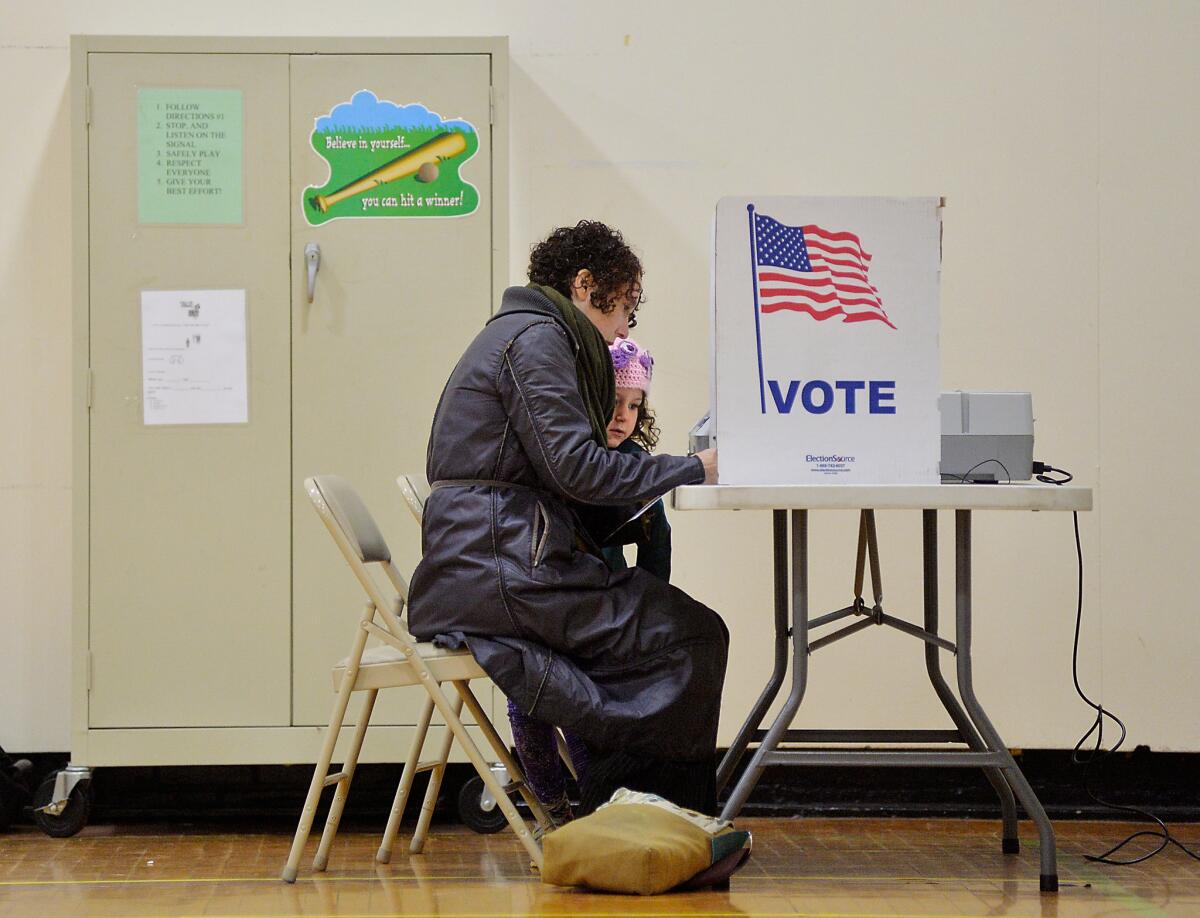
President Obama has ordered a “full review” of computer hacks and leaks that U.S. intelligence agencies say were aimed at disrupting this year’s presidential election, a top White House official said Friday.
The disclosure came after President-elect Donald Trump again dismissed an assessment by the 17 U.S. intelligence agencies that Russian authorities directed the theft and subsequent leaks from Democratic Party officials and Hillary Clinton’s campaign manager before last month’s election.
“We may be crossing into a new threshold and it’s incumbent upon us to take stock of that,” said Lisa O. Monaco, the White House counter-terrorism and Homeland Security advisor.
The report will be provided to Congress before Obama leaves office on Jan. 20 but may not be made public, Monaco said at a breakfast arranged by the Christian Science Monitor.
In a push against anti-Muslim hate crimes, U.S. attorney general set to visit mosque
Amid a rise in anti-Muslim hate crimes since the presidential election, U.S. Atty. Gen. Loretta Lynch plans to make her first visit to a mosque while in office.
Lynch is scheduled to address an interfaith gathering of Muslims and Christians on Monday morning at the All Dulles Area Muslim Society, a prominent Islamic center outside Washington, D.C.
Last month the FBI reported a 67% increase in hate crimes against Muslims in 2015 compared with the previous year. Since the election, civil rights groups have documented hundreds of incidents around the country that targeted Muslims, blacks, Jews, Latinos, immigrants and LGBT people.
In a video she released Nov. 18, Lynch called the rise in anti-Muslim crime “alarming” and offered her support to Muslims and other minority groups. She will follow the same theme Monday, according to the Justice Department. The next day, she will hold a roundtable with LGBT youth at a New York high school and visit the Stonewall National Monument to LGBT civil rights.
Some of the recent anti-Muslim incidents involve attackers who have invoked President-elect Donald Trump’s name, such as in New York City, where police said three men approached an 18-year-old woman on a subway car yelling Trump’s name before attempting to snatch the hijab from her head.
[Editor’s note: New York police on Dec. 14 said an investigation showed that the claim by the 18-year-old woman, Yasmin Seweid, was a fabrication. Seweid was arrested and charged with obstructing governmental administration and filing a false report.]
In California, Rhode Island, Massachusetts and several other states, mosques have received letters informing them that Trump is the “new sheriff in town” who will “cleanse America and make it shine again” by doing to Muslims as Hitler did to the Jews.
A man was charged with a hate crime for an incident last week in Brooklyn in which a Muslim police officer was accosted by a man who told her to “go back to your country” and threatened to cut her throat.
Dozens of American mosques have held emergency meetings of their congregations since the election to grapple with the incidents. Muslim clergy and community leaders have said Trump’s rhetoric on the campaign trail -- including his comments that Islam “hates” Americans and suggestions that he will create a Muslim registry -- have emboldened attackers.
This week, nearly 300 Muslim leaders released an open letter to Trump expressing their “serious concerns” about his policy proposals and calling on him to protect their communities.
“During and immediately following this year’s presidential election cycle, American Muslim organizations received more reports of anti-Muslim hate crimes than any other period of time since 9/11,” the letter said. “Your recent denunciation of such behavior on ’60 Minutes’ was a positive first step, and we urge you to clearly and strongly condemn bigotry, hate crimes and bias-based school bullying directed at any American, including American Muslims. We call on you to make mutual respect and acceptance a hallmark of your presidency.”
In Iowa, Trump signals more Carrier-style deals coming
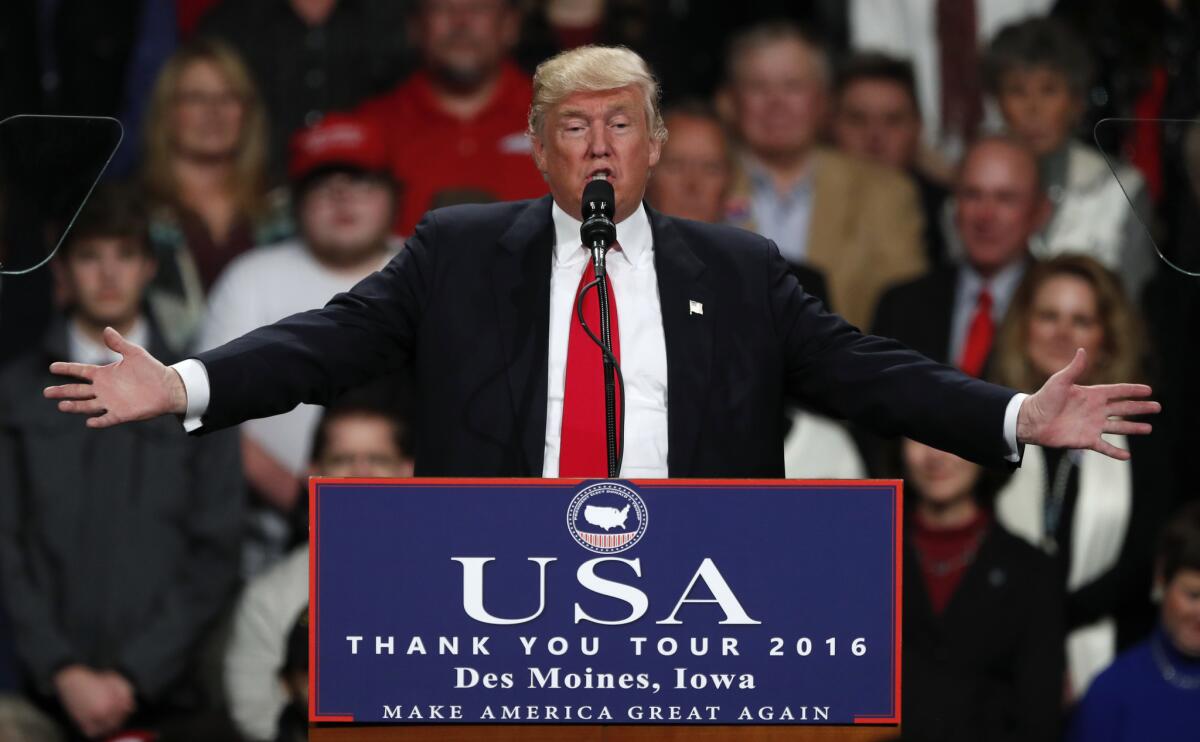
Is there more where the Carrier deal came from?
President-elect Donald Trump said Thursday he had been calling other U.S. companies that were preparing to send American jobs overseas, and had been having “success” in changing their minds.
“I said, ‘Give me a list of 10 companies that are leaving.’ And I actually love calling these companies,” Trump said at his latest “thank you” rally in Des Moines.
Trump and his transition team offered Indiana-based Carrier Corp. incentives to keep some of its workforce from leaving the state.
Critics, including some conservatives, have questioned the specific terms of the deal -- which included a mix of state tax incentives and the threat of new tariffs -- and the precedent set with such a direct intervention in a single business’ decision-making. Still, it’s been a political winner in some surveys.
Here’s how Trump described his recent calls with senior executives of the companies on his list:
“I say, ‘Hi, how you doing.’
“ ‘Oh, hello, Mr. President-elect. Congratulations.’
“ ‘Yeah, congratulations. By the way, while we’re on the phone, don’t leave. Please don’t leave. Please.’ ”
Trump then told the crowd: “We’ve had great success. You’ll be seeing a lot more success.”
His promise, without specifics, for repeat performances of the Carrier deal came as he formally announced in Iowa’s capital that he intended to send the state’s long-serving governor, Terry Branstad, to Beijing as his next ambassador to China.
“I can’t tell you how many people wanted that position,” Trump said. “You go over there, you live like a king. But he’s not looking to live like a king.”
Citing Branstad’s extensive experience with China, which included hosting its president, Xi Jinping, in the state years ago, as well as living in China decades before as an exchange student, Trump said Branstad would deliver for the U.S. as he’s delivered for the state.
“With Terry on our side, I know we will succeed in bringing our jobs back, and I also know that China, who’s been so tough and so competitive and frankly dealing with people that didn’t get it, but I’ll tell you what, we’re going to have mutual respect,” Trump said. “We’re going to have mutual respect. China’s going to benefit, and we’re going to benefit. And Terry’s going to lead the way.”
Will this puppy be Donald Trump’s presidential pet?
In many ways, the Trumps are different from families that have lived in the White House — for starters, the entire family is not planning to live there right away.
One philanthropist wants to do one thing to make the Trump White House more like those in the past: She wants Donald Trump to have a presidential pet.
Every previous president has had pets in the White House, among them dogs, cats, parrots, sheep, horses, bear cubs, a pygmy hippo and an alligator. (John Quincy Adams let an alligator live in a White House bathroom, according to the Presidential Pet Museum’s website.) President Obama didn’t have any pets when he was elected, but swiftly remedied that by bringing home Bo and, later, Sunny, both Portuguese water dogs.
Lois Pope, a former Broadway actress and the widow of National Enquirer founder Generoso Pope Jr., is a longtime philanthropist who helped fund the American Veterans Disabled for Life Memorial. At an event at Trump’s Mar-a-Lago resort last weekend, Pope presented “Patton,” a 2 1/2-month-old golden retriever/poodle mix puppy who is the descendant of military service dogs. The dog is named after Gen. George Patton, a favorite of Trump’s.
“From President Washington to President Obama, the White House has always been home to our four-legged friends, and we look forward to Patton upholding this long-standing American tradition to have a ‘First Dog’ there,” Pope said at the gala, which raised money to benefit initiatives for the American Humane Assn.
Pope said the president-elect was given a certificate formally presenting the dog to him at the Thanksgiving dinner celebration at Mar-a-Lago.
Leading cancer group calls on Congress to slow Obamacare repeal push

One of the nation’s leading patient advocacy organizations Thursday urged congressional leaders not to repeal the Affordable Care Act without first offering a replacement, joining the growing list of voices urging the GOP to slow its Obamacare repeal push.
“As members of Congress consider the future of the Affordable Care Act, it is critically important that cancer patients, survivors and those at risk of the disease don’t face any gap in coverage of prevention and treatment,” American Cancer Society Cancer Action Network President Chris Hansen said. “Replacement healthcare legislation that accompanies repeal needs to provide recognized patient protections that currently exist.”
Congressional Republicans have been working on plans to pass legislation early next year, rolling back major portions of the 2010 health law, including its Medicaid expansion and its system of insurance subsidies to help low- and middle-income Americans buy health coverage.
Senior GOP lawmakers say they intend to delay implementation of the repeal for two or three years to give themselves time to develop an alternative.
But many healthcare experts believe this approach will cause significant disruptions in the nation’s healthcare system, jeopardizing coverage for millions of Americans.
And major industry leaders – including insurers and hospitals – have been calling privately and publicly for a more measured approach.
“Delaying enactment of a replacement for two or three years, and leaving insurers without any certainty in projecting risk, could lead to the collapse of the individual health insurance market with long-term consequences,” Hansen said.
The American Cancer Society Cancer Action Network played an important role pushing for the coverage expansions made possible by the current health law.
That expansion has brought health coverage to more than 20 million previously uninsured Americans, surveys indicate.
House passes stopgap government funding bill, pushing budget battles to Trump’s White House
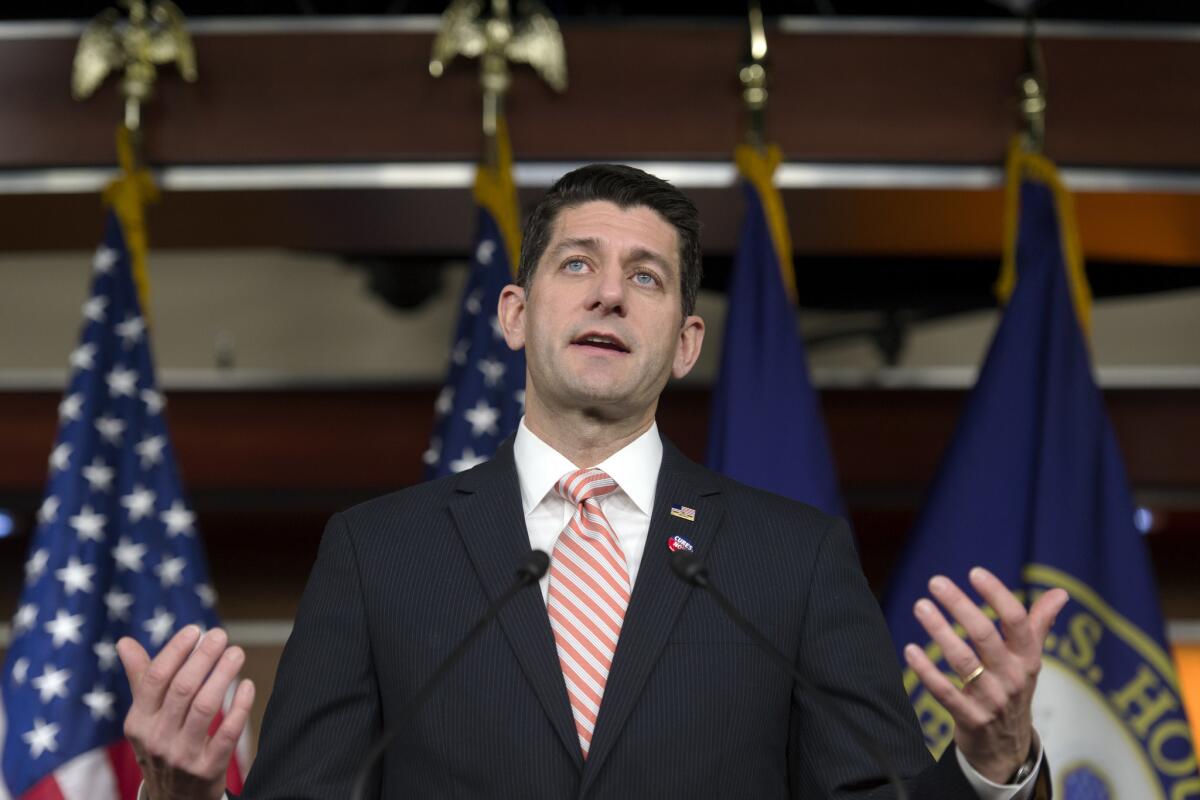
The House on Thursday approved a stopgap spending bill 326-96 that pushes the next budget showdown to President-elect Donald Trump’s administration in the new year.
It provides money to fund the government through April 28.
Senators were on track for final passage by Friday’s deadline, but hit an unexpected hurdle when Rust Belt lawmakers dug in for a fight over pension guarantees for out-of-work coal miners.
Even so, two weeks before the Christmas holiday, lawmakers could be wrapping up the 114th Congress as one that was notable not as much for big accomplishments but for concluding without too big of a mess.
Trump expected to pick Southern California fast-food executive Andy Puzder for Labor secretary
Pesident-elect Donald Trump is likely to tap Andy Puzder, chief executive of Southern California’s CKE Restaurants Inc. — a fast-food chain including Carl’s Jr. and Hardee’s — to be Labor secretary, according to news reports Thursday.
The transition team would not confirm the selection, but said additional Cabinet posts would be announced later Thursday. Puzder’s pick was first reported by the Wall Street Journal.
Puzder, 66, is a Trump economic advisor and fundraiser who also served as an economic advisor to Republican Mitt Romney’s 2012 presidential campaign. Puzder has been a critic of President Obama’s healthcare reform as well as new Labor Department rules to expand overtime pay, which recently were blocked by a federal judge.
He’s also expressed an openness to increasing the federal minimum wage, though he does not support a jump to $15 an hour from the current $7.25 because he thinks that would cost many low-wage workers their jobs.
Joe Biden gets bipartisan tribute on the Senate floor
Washington took a bipartisan turn on Wednesday when Republicans and Democrats honored Vice President Joe Biden on the Senate floor.
Biden served as a senator from Delaware for 36 years before he became vice president. As one of his last duties as president of the Senate, he presided over the vote for the “21st Century Cures” bill, part of the “cancer moonshot” initiative he shepherded after the death of his son Beau.
The Senate voted to pass the bill that will spend $6.3 billion on research for cancer and other chronic illnesses.
Former and current Senators were present during his tribute. Nearly 25 people spoke over the course of two hours, sharing personal and professional anecdotes that elicited both tears and laughter from Biden.
Here are some highlights.
Senate Majority Leader Mitch McConnell (R-Ky.)
“The amazing thing is the man we honor today wasn’t always a talker. He suffered from a debilitating stutter for most of his childhood. He was teased for it. But he was determined to overcome it, and so he did. With hard work. With determination. With the support of his family. It’s classic Joe Biden; he’s never stopped talking since.”
Sen. Chris Coons (D-Del.)
“The greatest honor of my life is to serve in the seat that you held for 36 years, and not just literally this seat in the Senate, but also a seat on the 7:15 Amtrak train down from Wilmington every morning. You logged over 2 million miles on Amtrak and millions more traveling around the world fighting for our country.”
Sen. Tim Kaine (D-Va.)
“The fact that you took your time on that day of importance to you, to shed some light and offer some joy to someone who was struggling -- that’s the Joe Biden that has us here for two hours offering these tributes.”
Sen. John McCain (R-Ariz.)
“I know how much you enjoy me calling you ‘Mr. President.’ You and I have served in this body for three decades. We’ve been friends for almost 40 years, since I was a Navy Senate liaison and used to carry your bags on overseas trips.”
Sen. Barbara A. Mikulski (D-Md.)
“Mr. Vice President, senator, foreign policy guru, the senator who was tough on crime but had a soft touch when it came to compelling human needs. A longtime colleague, but I know you as my friend, Joe.”
Sen. Orrin Hatch (R-Utah)
“It’s no secret that Joe and I often found ourselves on opposite sides of almost every major issue. That’s not quite true. We agreed on a lot of things. But in legislative battles, Joe proved himself to be a worthy opponent and an able sparring partner.”
Trump strikes back at union president who criticized Carrier deal
Federal judge agrees to end Michigan recount
A federal judge who ordered Michigan to start recounting presidential votes has dropped his decision, effectively ending a second look at ballots statewide.
Judge Mark Goldsmith acted Wednesday night, a day after the state appeals court said the Green Party candidate isn’t eligible to seek a recount of millions of vote cast Nov. 8.
Earlier Wednesday, the Michigan elections board said the recount would end if Goldsmith extinguished his earlier order.
It was Goldsmith’s midnight ruling Monday that started the recount in Michigan. But his order dealt with timing — not whether a recount was appropriate. More than 20 counties so far are recounting ballots, and some are finished.
The state appeals court said Tuesday that Jill Stein doesn’t qualify as an “aggrieved” candidate under state law because she got only 1% of the Michigan vote and can’t win with a recount. Stein is appealing to the Michigan Supreme Court.
Trump promises relief for ‘Dreamers,’ but immigrant advocates are taking no chances
President-elect Donald Trump has made many promises on immigration, including a new one Wednesday to “work something out” for the so-called Dreamers -- young immigrants brought to the country illegally as children.
“We’re going to work something out that’s going to make people happy and proud,” Trump said in a Time magazine interview.
“They got brought here at a very young age, they’ve worked here, they’ve gone to school here. Some were good students. Some have wonderful jobs. And they’re in never-never land because they don’t know what’s going to happen.”
Trump had routinely pledged to get rid of President Obama’s Deferred Action for Childhood Arrivals program, or DACA, the executive action that temporarily shields young people from deportation if they are students, in the military or working, and are otherwise law-abiding.
Trump still pledges to do that. But now he’s also suggesting he would like to find some way to continue accommodating these young people in the United States.
Advocates for the immigrants are taking no chances, pushing for a legislative fix in Congress and calling on Obama to intervene before Trump takes office.
More than 700,000 young immigrants are in the DACA program, and they provided the federal government with their personal data when they applied. Many worry the Trump administration will use that to track them down for deportation. They must reapply every two years.
On Capitol Hill, Sens. Lindsey Graham (R-S.C.) and Richard J. Durbin (D-Ill.) are working on a bill to protect the Dreamers if Trump ends the DACA program.
“We’re encouraged by these comments by President-elect Trump — they present an opportunity to do the right thing for more than 744,000 young people who grew up here,” the senators said in a statement. “We will soon have a legislative response ready if needed. They have much to contribute to the country they love.”
Chicago Mayor Rahm Emanuel, Obama’s first chief of staff, delivered a letter to Trump on Wednesday from 14 mayors calling for support of the young immigrants.
“We are clear as mayors that these are Dreamers who are seeking the American dream, and we should embrace them rather than do a bait-and-switch,” Emanuel told reporters after his meeting at Trump Tower. “All of us fundamentally believe that these are students, these are also people who want to join the armed forces.... They are something we should hold up and embrace.”
But others have been wary of Trump’s shifting positions on immigrants and his attacks on Mexicans as “criminals” and “rapists.”
“Before anyone falls into the trap of believing that Trump is ‘softening’ on immigration, they should remember that we’ve seen this movie before,” said Frank Sharry, executive director of America’s Voice, an immigration advocacy organization.
In the House, dozens of Democrats signed a letter asking Obama to pardon the Dreamers for civil immigration law violations before he leaves office.
The White House has rejected such appeals before, but lawmakers, including many from California, are pressing Obama to intervene.
“We have a responsibility to stand with the Dreamers,” said Rep. Luis V. Gutierrez (D-Ill.) at a news conference at the Capitol.
“The message [to Trump] is simple: If you come for Dreamers, if you come for immigrant families ... you will have to go through House Democrats, and we are standing together.”
But some Republicans on Capitol Hill are also holding Trump to the hard line on immigration he promised during the campaign.
Rep. Andy Harris (R-Md.) introduced legislation that would halt all federal funding -- including money for higher education -- for any entity that refuses to enforce immigration laws.
Already, the Los Angeles Police Department and the University of California system have indicated they would not abide by certain changes in immigration enforcement, and many big cities intend to provide lawful immigrants “sanctuary” from deportation.
The bill has support from lawmakers in several states, including California.
Trump chooses former World Wrestling Entertainment executive Linda McMahon to head Small Business Administration
Linda McMahon, who co-founded the World Wrestling Entertainment franchise and spent a fortune on two unsuccessful runs for the U.S. Senate, was named Wednesday as President-elect Donald Trump’s pick to head the Small Business Administration.
“Linda is going to be a phenomenal leader and champion for small businesses and unleash America’s entrepreneurial spirit all across the country,” Trump said in a statement announcing McMahon’s selection.
In her own statement, McMahon cited her entrepreneurial background, saying it taught her the challenges faced by small-business owners.
Along with her husband, Vincent, McMahon founded and built World Wrestling Entertainment, known worldwide for its quasi-sporting spectacles.
“As an entrepreneur myself, I have shared the experiences of our nation’s small-business owners and will do my best to advocate on their behalf,” McMahon said. “My husband and I built our business from scratch, building it to a publicly traded global enterprise with more than 800 employees.”
The McMahons have known Trump for decades, and he has participated in several WWE-sponsored events, including a 2007 “Battle of the Billionaires,” during which Vincent McMahon was lashed to a chair as Trump shaved McMahon’s head.
Linda McMahon stepped down as the company’s chief executive officer in 2009 and twice ran for the U.S. Senate from Connecticut, spending $100 million on her unsuccessful campaigns.
Trump wasn’t McMahon’s first choice for president. She initially backed New Jersey Gov. Chris Christie, but told the Associated Press in September that she maintained a friendly relationship with Trump and believed he would make a good president.
McMahon, a major GOP donor, gave $6 million to a pro-Trump super PAC in August and September.
Trump says ‘SNL’ is ‘mean-spirited,’ even though he likes Alec Baldwin
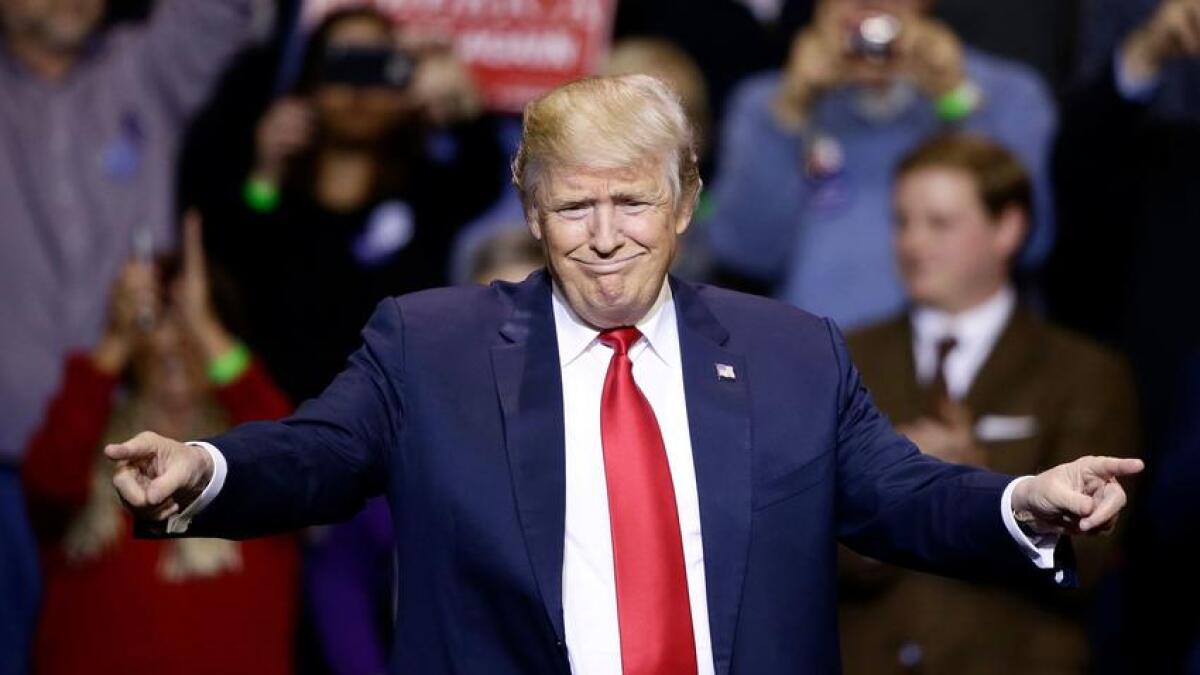
It appears Donald Trump has no plans to stop watching “Saturday Night Live.” Or stop tweeting about it.
On Wednesday during an interview on the “Today” show, Matt Lauer asked Trump about his habit of picking fights and sharing his grievances over Twitter. Specifically, Lauer was curious about Trump’s continued beef with “SNL.”
The president-elect has been a vocal critic of the comedy show, especially since Alec Baldwin portrayed him in various skits throughout the campaign. Trump has taken to Twitter multiple times to call the show “boring and unfunny” and accuse it of being “totally one-sided” and “biased.” In fact, the most recent “SNL” skit, which Trump complained was “unwatchable,” poked fun at his frequent tweeting.
Trump is said to choose strident fossil fuel ally Scott Pruitt to head EPA
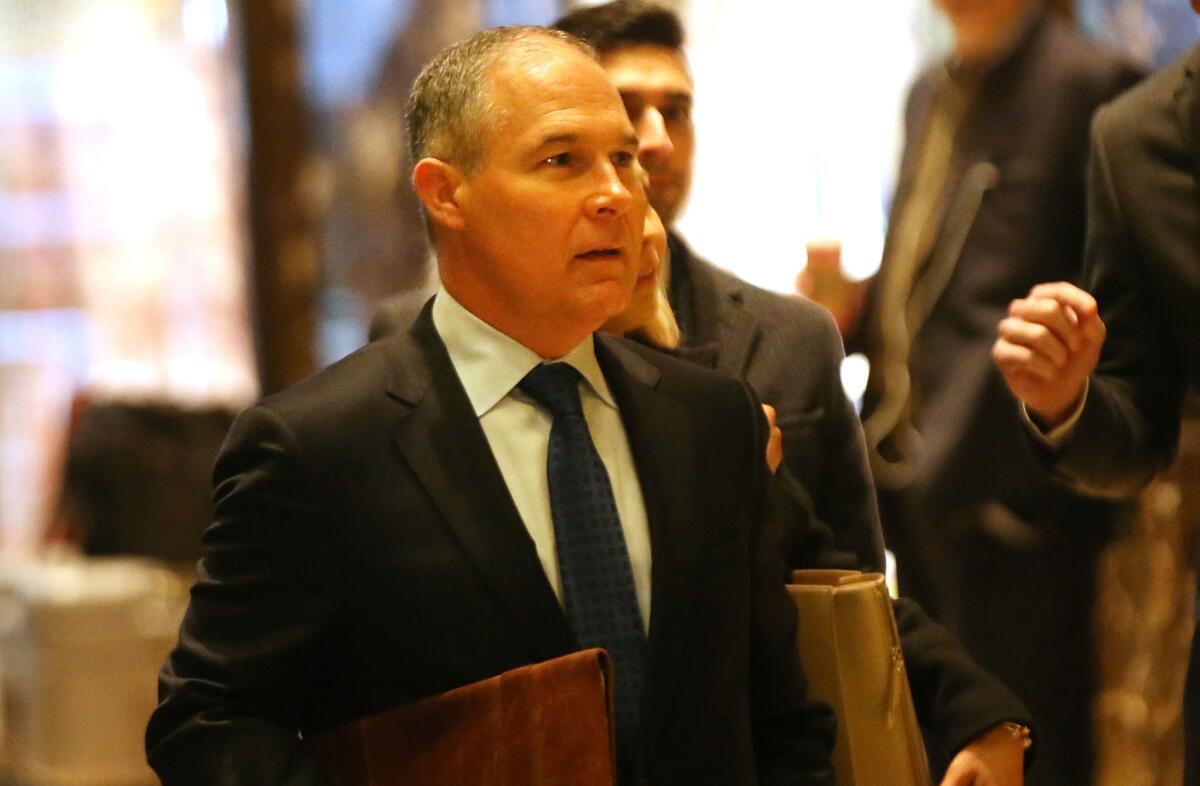
President-elect Donald Trump has picked Oklahoma Atty. Gen. Scott Pruitt to run the Environmental Protection Agency, signaling that he intends to make good on his vow to aggressively disassemble President Obama’s landmark effort to fight climate change.
The choice of Pruitt was reported by several media outlets citing unnamed transition officials.
Pruitt is a climate change skeptic and longtime ally of the fossil-fuel industry spearheading the 28-state effort in federal courts to block Obama’s signature climate change program, the Clean Power Plan. As EPA administrator, Pruitt cannot cancel the plan, but he can refuse to defend it against the litigation for which he was a key architect.
His knowledge of the inner workings of the case and experience as a litigator who has challenged several Obama administration policies, including Obamacare and the president’s executive actions on illegal immigration, make him well-positioned to roll back the climate plan.
“Pruitt has a strong conservative record as a state prosecutor and has demonstrated a familiarity with laws and regulations impacting a large energy resource state,” Trump transition spokesman Jason Miller told reporters earlier Wednesday, when he announced Pruitt would be meeting with Trump in New York.
Large environmental groups and some Democrats immediately called on the Senate to reject Pruitt’s confirmation.
“He is a climate science denier who, as attorney general for the state of Oklahoma, regularly conspired with the fossil fuel industry to attack EPA regulations,” said Sierra Club executive director Michael Brune, citing a 2014 New York Times investigation that found that energy lobbyists drafted letters that Pruitt would send to federal agencies and Obama outlining the hardships of federal regulations.
Pruitt has been outspoken in his criticism of the mainstream scientific consensus that the planet is warming at an alarming rate and governments need to act aggressively to reverse it. “Scientists continue to disagree about the degree and extent of global warming and its connection to the actions of mankind,” Pruitt co-wrote in an article for the National Review in May.
The choice of Pruitt suggests that Trump is not wavering in his vow to undo the Obama climate legacy, despite comments to reporters and a well-publicized meeting this week with former Vice President Al Gore that suggested Trump was keeping an open mind.
The people Trump has picked to put his environmental agenda in place are almost universally opposed to the policies that mainstream climate scientists say are necessary to curb dangerous planetary warming.
Trump close to naming retired Marine general to head Homeland Security, source says
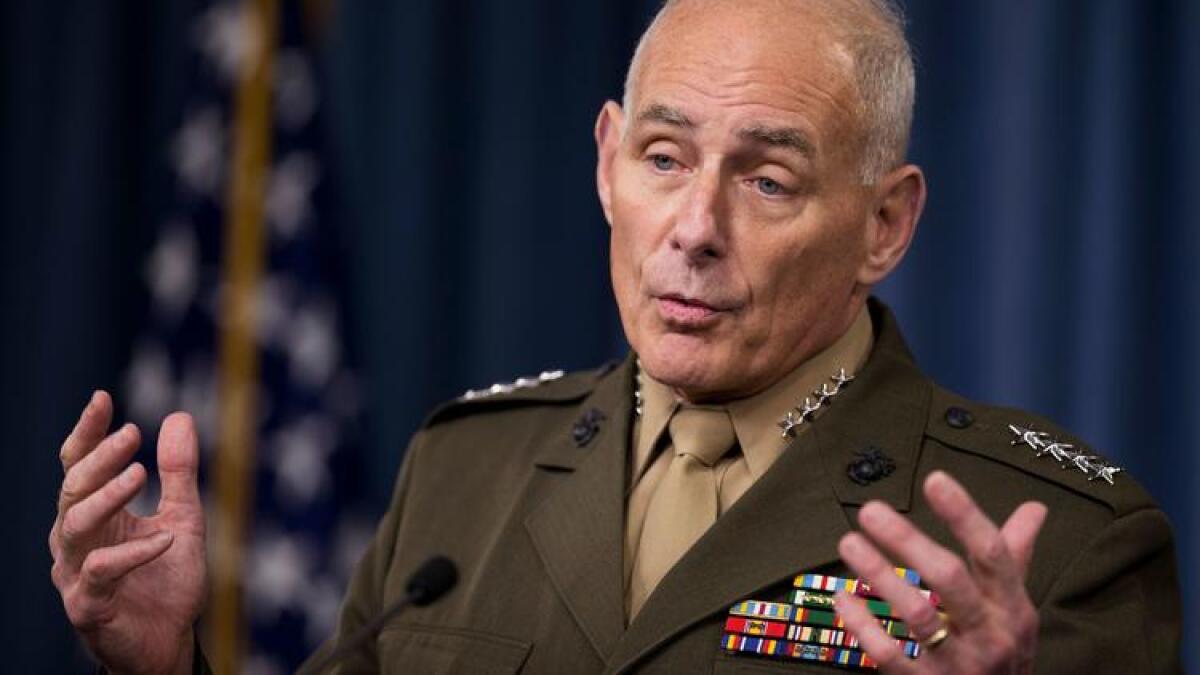
Donald Trump is expected to pick retired Marine Gen. John F. Kelly for secretary of Homeland Security, putting an outspoken combat leader in charge of defending the U.S. from terrorist attacks and carrying out Trump’s promised crackdown on illegal immigration.
The decision has not been made, but Kelly is the front-runner and most likely the final choice, according to a person close to Trump’s transition team who spoke on condition of anonymity to discuss internal deliberations.
Kelly would be the third recently retired general to join Trump’s Cabinet, a break with tradition that gives a decidedly military cast to the president-elect’s team of top advisors on national security and defense.
Kelly, 66, oversaw U.S. military operations in Central America and South America as head of U.S. Southern Command before he retired in January. He led troops in multiple tours in Iraq, and his son, also a Marine officer, died in combat in Afghanistan in 2010.
If named and ultimately confirmed by the Senate, Kelly will take over a department with 22 separate agencies and nearly 250,000 federal employees who do everything from make travelers remove their shoes at the airport to patrol on horseback along the border.
He would be responsible for delivering some of Trump’s most controversial campaign promises, including building a wall on the border with Mexico, boosting deportations of immigrants in the country illegally and potentially tracking foreign Muslim visitors.
Mayors ask Trump to reconsider his stance on immigration
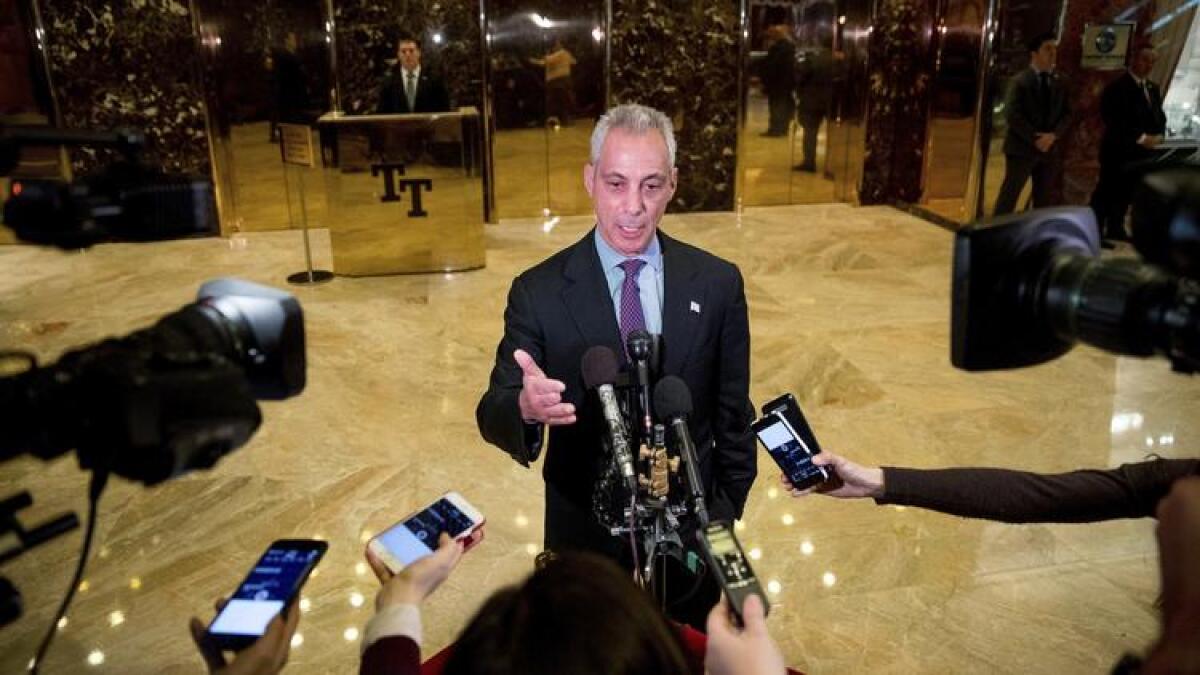
Chicago Mayor Rahm Emanuel met with President-elect Donald Trump in New York on Wednesday morning, using the discussion to urge Trump to reconsider his positions on immigration.
During his 45-minute meeting with Trump in his personal office high above Manhattan in Trump Tower, Emanuel hand-delivered a letter from the mayors of some of the nation’s largest cities urging Trump to continue protections offered to young immigrants instituted under President Obama’s administration.
The two-page letter asked Trump to continue Deferred Action for Childhood Arrivals, the DACA provision that protects young so-called Dreamers who came to the country before the age of 16 from deportation and allows them to study and work in the U.S.
“I delivered to the president-elect and his senior adviser and his chief of staff a letter signed by 14 mayors ... put together from across the country about our DACA students. And that they were working hard toward the American dream,” Emanuel told reporters in the Trump Tower lobby following the meeting.
Trump picks Iowa Gov. Branstad to be ambassador to China
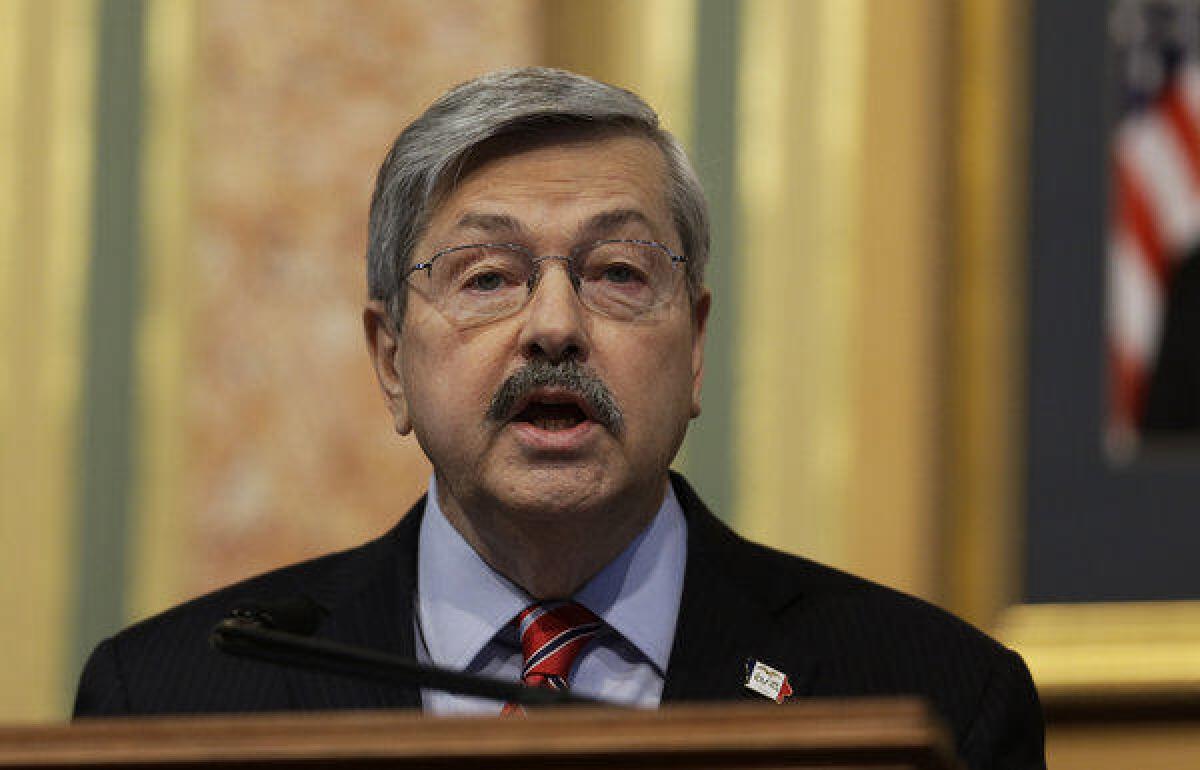
Donald Trump has picked Terry Branstad, the long-serving Iowa governor who proved a loyal and unflinching surrogate in the presidential race, to be the ambassador to China, the transition team said Wednesday.
The choice of Branstad is likely to reassure Beijing, which has been rattled by Trump’s rhetoric about China and his breaking decades of protocol with his outreach to Taiwan. The Iowa governor has deep ties to China and a personal friendship with Chinese President Xi Jinping.
Trump transition spokesman Jason Miller said Branstad is “someone who has a lot of experience and a great grasp of trade issues, agriculture issues, a tremendous understanding of China and Chinese people, and is someone who very much impressed the president elect not just in their meetings on the campaign trail but also in meetings after election.”
The Chinese government reacted favorably to the pick. “Mr. Branstad is an old friend of the Chinese people, and we welcome his greater contribution to the development of China-U.S. relations,” said Chinese Foreign Ministry spokesman Lu Kang, during a press briefing in China.
The choice signals to China that Trump is not looking to escalate tensions, despite an antagonistic tone toward the country that has endured beyond the campaign and into his transition. Trump warns of slapping massive tariffs onto Chinese imports if trade terms are not renegotiated to be more favorable to the United States and he accuses the country of manipulating its currency. Trump further alarmed Beijing when he accepted a congratulatory phone call last Friday from Tsai Ing-wen, the leader of Taiwan, an island nation China regards as a renegade province.
After a campaign in which China was often the target of Trump’s ire, the choice of Branstad is the first big move Trump has made to tone down the friction.
Branstad was one of the more visible establishment Republican leaders on the campaign trail with Trump. His son, Eric, ran Trump’s general election campaign in Iowa. When a videotape surfaced in October in which Trump boasted of his uninvited sexual advances, Branstad did not join other Republicans in distancing himself from the campaign. He said he accepted Trump’s apology and warned Iowans that only Trump could protect the country from Islamic extremists. Branstad is on his sixth term as governor of Iowa. He is the longest serving governor in American history.
The China post could prove to be Branstad’s toughest assignment yet. Trump has repeatedly vowed that he would drive a hard bargain with China, a position that is popular with the displaced factory workers who fueled Trump’s victory but risks touching off a trade war that could prove damaging to the American economy.
Branstad’s relationship with Xi stretches back to 1985, when the now-Chinese president visited the United States while working as an agricultural officer. In 2012, Branstad hosted a dinner in Iowa that Xi attended while serving as the Chinese vice president.
11:20 a.m.: This post was updated with comments from the Trump transition team and the Chinese Foreign Ministry.
Former U.S. Atty. Debra Wong Yang is reportedly under consideration to lead the SEC
Los Angeles lawyer Debra Wong Yang, the former top federal prosecutor for the region, reportedly is being considered by President-elect Donald Trump to chair the Securities and Exchange Commission.
Yang, a fourth-generation Angeleno who grew up in Chinatown, became the first Asian American woman to serve as U.S. attorney in 2002. Then-President George W. Bush tapped her for the position in the Central District of California, which includes Los Angeles, Orange, Ventura, Santa Barbara and San Luis Obispo counties.
A former state judge in California, Yang served as U.S. attorney until 2007.
Her cases involved bringing criminal charges against Hollywood private eye Anthony Pellicano and class-action law firm Milberg Weiss Bershad & Schulman. She also was instrumental in obtaining guilty pleas in the Credit Lyonnais banking scandal and in getting $1.5 billion in criminal settlements from Boeing Co. and Tenet Healthcare Corp.
After stepping down as U.S. attorney, she joined the Gibson, Dunn & Crutcher law firm. Working out of the Los Angeles office, she handles cases involving white-collar crime, corporate compliance, data privacy and matters involving China.
Trump channels Reagan, promising ‘peace through strength’
President-elect Donald Trump vowed Tuesday night to strengthen the U.S. military but limit its use, suggesting a pullback from areas like the Middle East where the country has spent decades trying to broker a peace between warring interests.
“We’ve spent at last count $6 trillion in the Middle East and our roads have potholes all over, our highways are falling apart, our bridges are falling, our tunnels are no good, our airports are horrible,” Trump said at a victory rally in Fayetteville, N.C. “We’ve got to start spending on ourselves.”
Invoking his “America First” policy, Trump pledged “to only engage the use of military forces when it’s in the vital national interests of the United States.”
“We don’t want to have a depleted military, fighting all over the place,” Trump said.
At the same time, he vowed to boost defense spending by ending the automatic cuts required under the congressional budget-trimming process known as sequestration.
The notion, he suggested, is to build a military so strong it will ward off any threats. “Peace through strength,” he called it, echoing the phrase President Reagan used during a massive military buildup during his two terms in office.
Trump appeared in Fayetteville, near the sprawling Ft. Bragg military base, as part of his “Thank You America” tour -- a swing through states he carried in November. His first stop last week was in Ohio; the tour continues later this week in Iowa and Michigan.
In a half-hour speech long on superlatives but short on specifics, Trump also promised to repeal and replace Obamacare with a cheaper and more responsive healthcare system; to vastly improve the care of the nation’s veterans; and to vigorously preserve and protect American jobs from being shipped overseas.
“We will defend American jobs,” he promised. “We have to look at it almost like a war.”
Son of incoming national security advisor fired from Trump transition team after promoting fake news
Michael Flynn Jr. has been let go from President-elect Donald Trump’s transition team after spreading online conspiracy theories on Twitter. He is the son of Trump’s pick for national security advisor, Gen. Michael Flynn.
“The younger Michael Flynn was helping his father with some administration and scheduling duties early on in the transition process, and he is no longer involved with transition efforts,” spokesman Jason Miller said in a teleconference Tuesday.
After an armed gunman fired a rifle in Washington’s Comet Ping Pong restaurant on Sunday in anger over a false child sex trafficking rumor, Flynn Jr. continued to promote the so-called PizzaGate conspiracy theory that inspired the shooting. The pizzeria has fended off threats since the story erupted about a month ago.
As Flynn Jr.’s tweets attracted national attention Monday, news broke that he had a government email, suggesting he was part of the Trump transition team – though Vice President-elect Mike Pence denied it on MSNBC’s “Morning Joe” Tuesday.
The elder Flynn has also spread false stories. A week before the election he promoted a rumor on social media that Hillary Clinton was involved with sex crimes involving children.
GOP to start Obamacare repeal Jan. 3 (but might not finish until 2019)
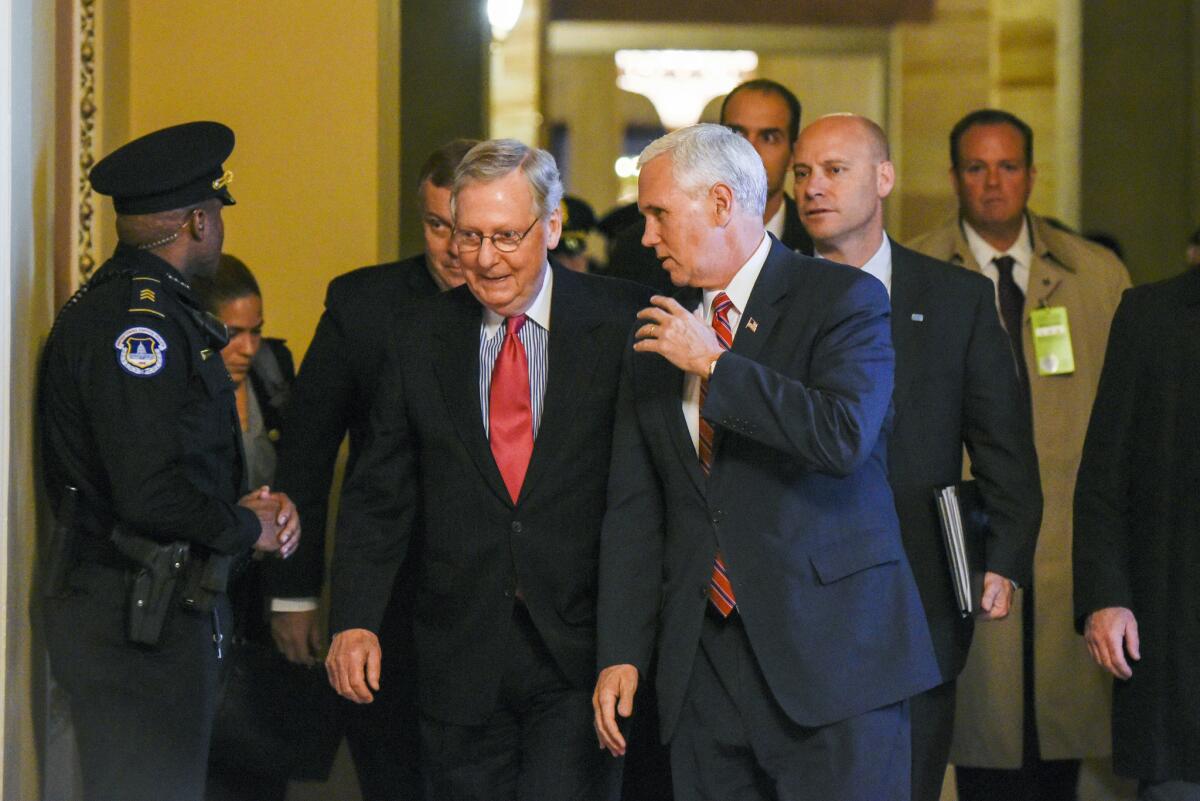
Republicans will begin the process of repealing Obamacare on the first day of the new Congress on Jan. 3, Senate Majority Leader Mitch McConnell announced Tuesday.
But don’t expect the healthcare law to come to a swift end that soon.
Republicans are wrangling over whether to give themselves two years to devise an alternative to President Obama’s signature domestic achievement -- which would push toward the midterm election in 2018. Or they might wait three years, until 2019, when the race for the White House will be underway.
Republicans are hesitant to fully gut the law until they have alternatives in place for the millions of Americans now relying on the Affordable Care Act for their coverage.
“The Obamacare repeal resolution will be the first item up in the new year,” McConnell said after senators met with Vice President-elect Mike Pence for their weekly policy lunch.
Pence left senators with the impression that there are steps the administration could quickly take to begin to replace provisions of the law with Republican-preferred ideas. The White House would rely on the regulatory process, which doesn’t require congressional action, senators said.
Senate Republicans are optimistic that President-elect Donald Trump’s administration, including his choice to lead the Health and Human Services Department, House Budget Chairman Tom Price of Georgia, can begin those kinds of regulatory actions right away.
“Healthcare’s kind of been driven into the ditch by President Obama and his healthcare law,” said Sen. John Barrasso (R-Wyo.). “It’s going to take time to get the cart out of the ditch.”
Supreme Court affirms broad reach of insider-trading laws
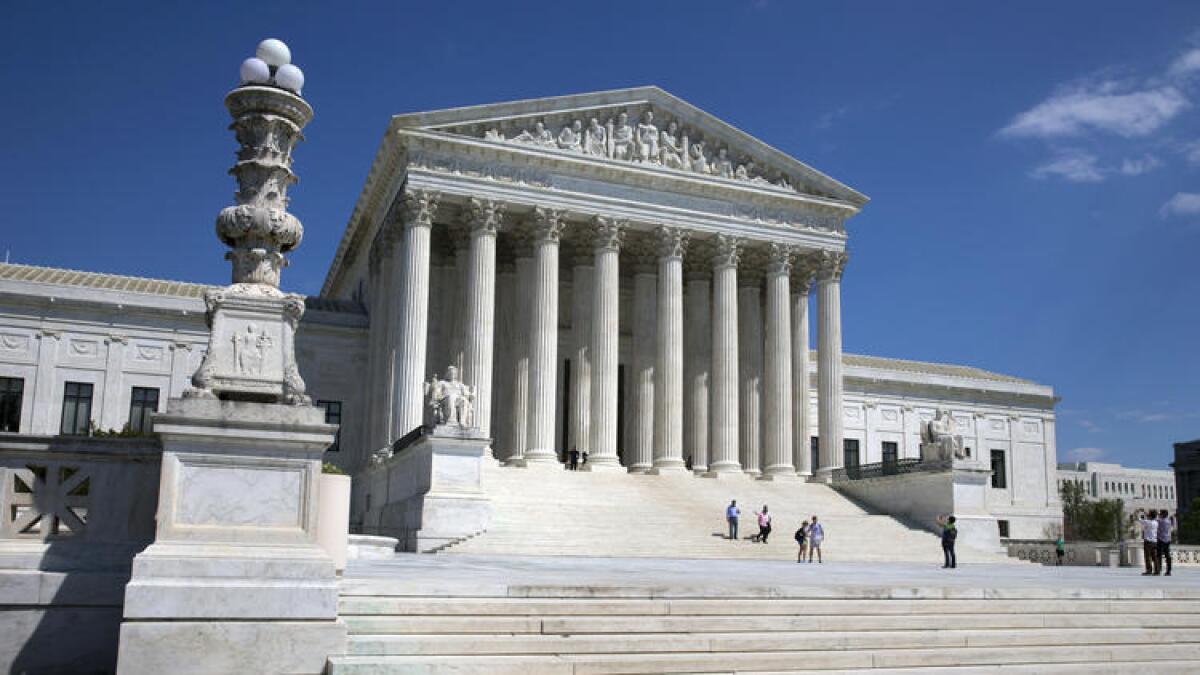
The Supreme Court on Tuesday upheld the broad reach of insider-trading laws, ruling that family and friends of corporate insiders can be prosecuted for profiting on secret stock tips even if they don’t pay money or other compensation for the information.
The unanimous decision affirmed the conviction of a Chicago man who made $1.5 million in stock profits by trading on confidential tips that originated from his brother-in-law, an investment banker in California.
The justices rejected claims of defense lawyers who argued that there was no crime because no money exchanged hands between the insider and the stock trader.
Instead, the court said exchanges within a family are like gifts and have value, even if no dollars are paid.
California KKK leader arrested in North Carolina stabbing before pro-Trump Klan parade

The California Ku Klux Klan leader who led a “white lives matter” rally that erupted in violence in Anaheim this year was arrested last week in connection with a North Carolina stabbing hours before a Klan parade celebrating Donald Trump’s election, authorities said.
William Hagen and another man were charged with assault after they stabbed another Klan member shortly before the victory parade in Roxboro, N.C., according to Capt. Frank Rose, who oversees criminal investigations for the Caswell County Sheriff’s Office in North Carolina.
Spokesman says Trump sold all his stocks in June
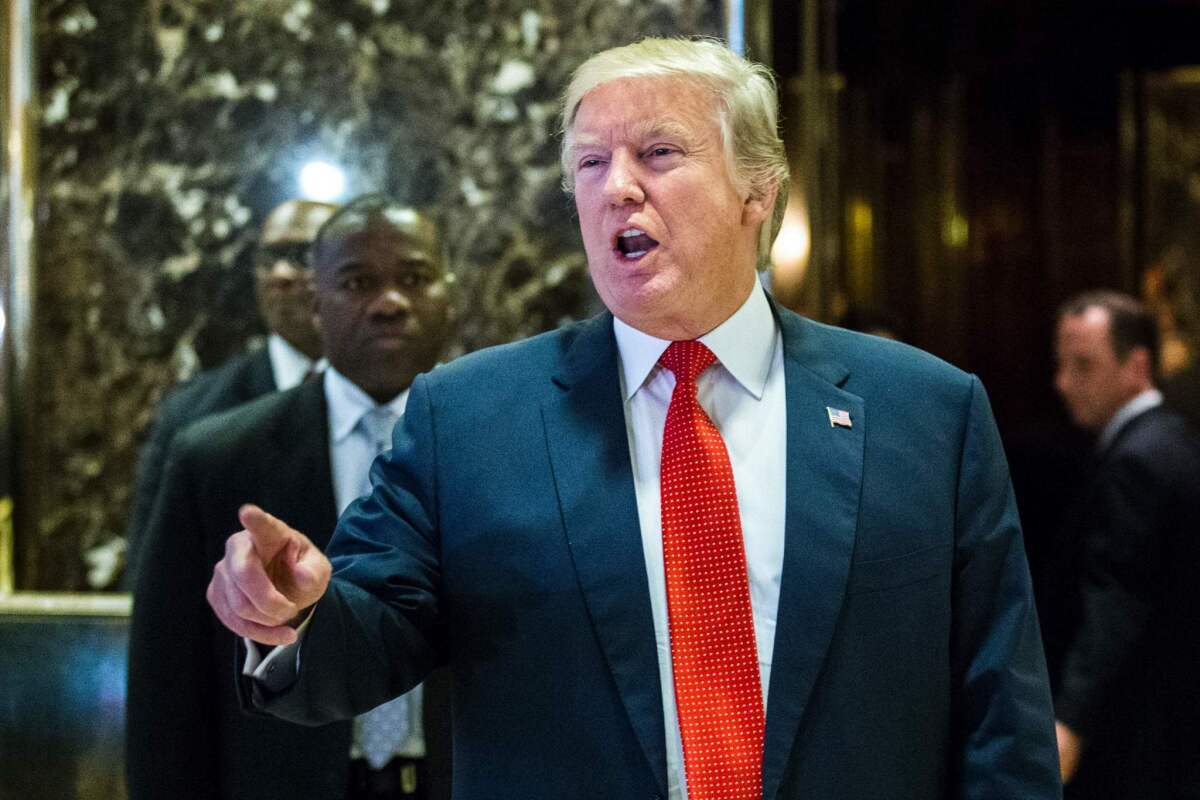
Donald Trump sold all of his stocks in June, a spokesman said Tuesday.
Aide Jason Miller was responding to a question from reporters about whether Trump had stocks in Boeing. Earlier Tuesday, Trump said the government should cancel its multibillion-dollar order with Boeing for new Air Force One presidential planes.
Miller confirmed later that he was referring to all of Trump’s stocks. He said he was not aware whether Trump had any stocks in Boeing at the time.
Trump wants the contract to build a new Air Force One canceled, calling the program ‘ridiculous’
President-elect Donald Trump took aim at Air Force One on Tuesday, criticizing the cost of the iconic 747 jumbo jet that has served as the president’s flying White House and projected America’s might wherever it lands.
The aircraft used by President Obama, built by Chicago-based Boeing Co., have been in service since the Reagan administration and are due to reach the end of a 30-year design life in 2017.
Supreme Court frowns on racial gerrymandering
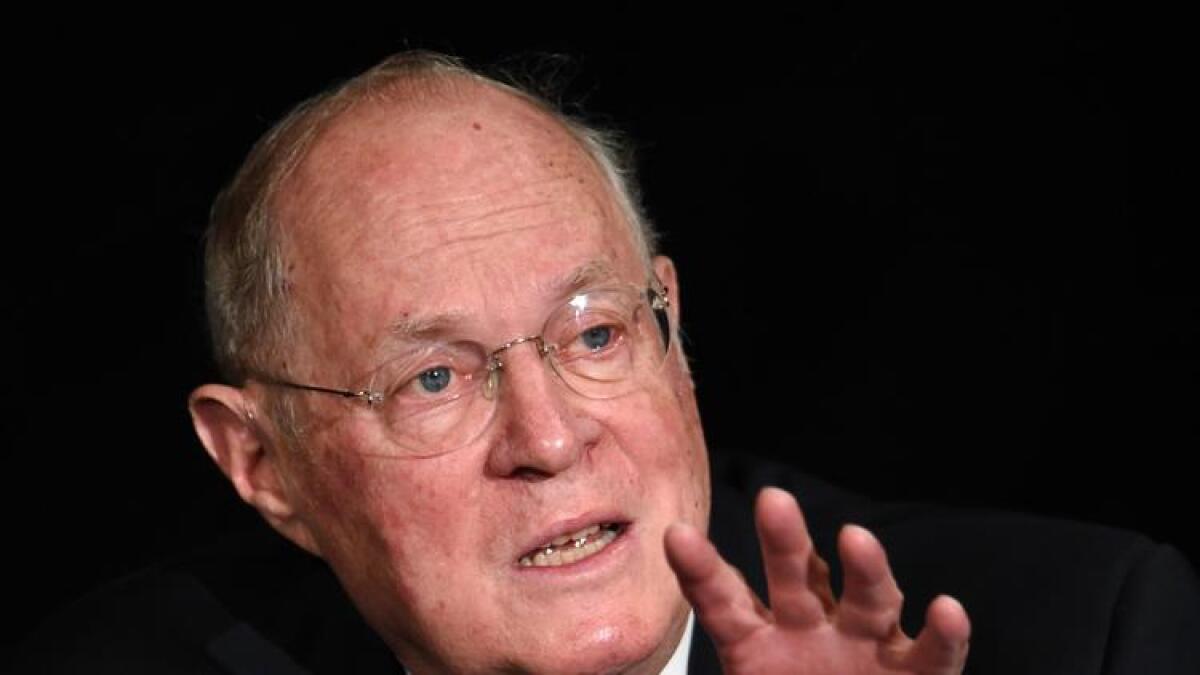
A Supreme Court majority on Monday appeared to lean in favor of Democrats in Virginia and North Carolina seeking to rein in what they call racial gerrymandering by Republican-controlled legislatures in those states.
Justice Anthony M. Kennedy, who is likely to hold the deciding vote in the case, said he was troubled that Republican leaders drew new election maps by moving more black voters into districts that already had a majority of African American residents and usually favored black candidates.
Clinton loyalists reassert themselves as Democrats chart future
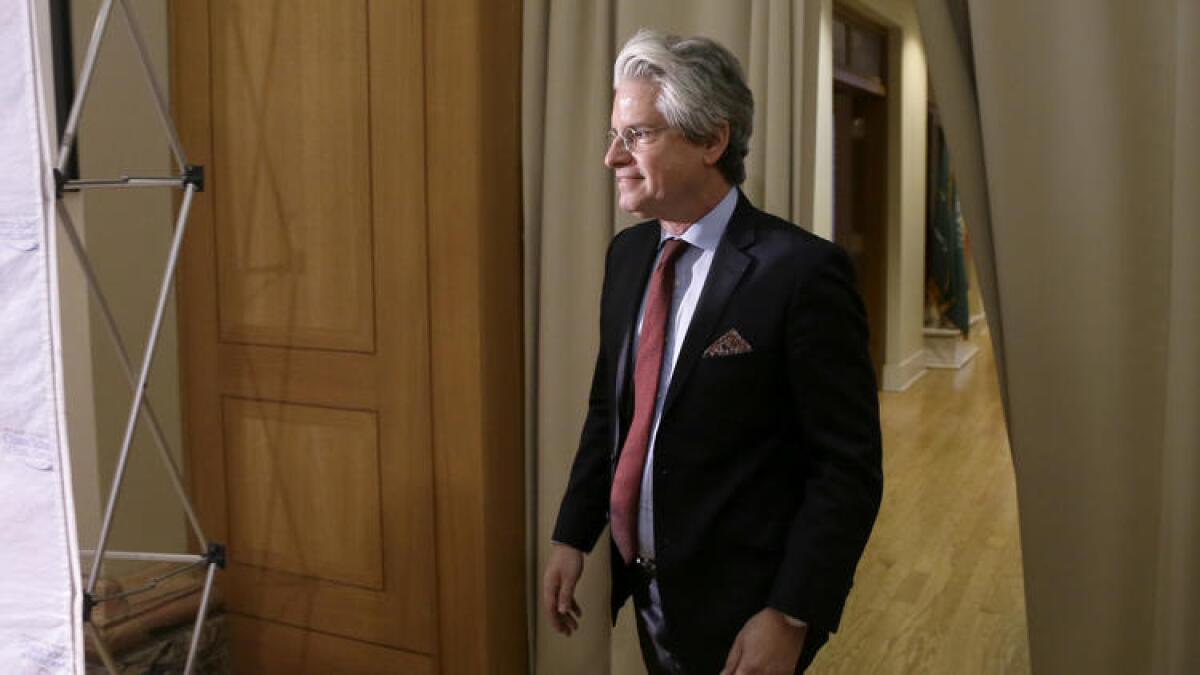
Longtime allies of Hillary Clinton who led the well-funded but ultimately unsuccessful shadow campaign against Donald Trump are reasserting themselves as their approach faces scrutiny amid a broader shakeout in their party.
David Brock and James Carville, who have been aligned with Bill and Hillary Clinton for decades, made the case Tuesday morning that they are best equipped to inflict damage on Donald Trump. In unveiling the new focus of American Bridge, their super PAC, the message from the duo seemed targeted as much at fatigued donors still perplexed over the Democrats’ inability to win in November as the reporters assembled on the call.
American Bridge is a nerve center of Brock’s sprawling network of nonprofits, which serve as a clearinghouse for opposition research and rapid response against the GOP. The organization saw considerable success in prior elections, as its trackers stalked opponents and broadcast all their missteps and gaffes, and data nerds dove deep into the backgrounds of political rivals. The model, which Republicans would mimic, showed signs of wear in this latest election, as Democrats struggled to keep up with the new political landscape of Twitter wars and fake news, and voter ambivalence to fact checking.
Brock rattled off data points about Trump’s unpopularity going into office to make the case that his groups were, indeed, highly effective during the campaign. But he also moved to protect his turf. Asked about the possibility of the Democratic National Committee being run by Minnesota Rep. Keith Ellison, a progressive favorite supported by Sen. Bernie Sanders and others looking to move the party away from the Clinton faction, Brock said the party should not be run by someone simultaneously serving in Congress.
“I feel strongly that we need a full-time chair,” Brock said.
He promised the retooled American Bridge would aggressively root out fake news and investigate every angle of Trump’s background and potential business conflicts. The Trump presidency, Brock said, “is shaping up to potentially be the most corrupt since the Gilded Age.” He suggested he will recruit Hillary Clinton herself join the fight “once she is ready.”
Carville said: “It would be a dereliction of duty to not do something of this magnitude to oppose an administration that did not receive a majority of votes and whose views do not comport with a majority of people.”
Supreme Court limits damages against Samsung in Apple dispute
The Supreme Court ruled for Samsung Tuesday in its patent dispute with Apple and set aside a $400-million damages verdict for copying the look of the iPhone.
The justices dealt only with the question of how much the South Korean firm should pay for copying several design features of Apple’s smartphone.
A jury found that Samsung had copied several features of Apple’s patented design, and a judge said the South Korean firm should pay out its “entire profit” from the sale of its smartphones.
Those damages of $399 million were upheld by a federal appeals court, but they were set aside by the high court in an 8-0 decision Tuesday.
In a brief opinion, the justices said the design features of the smartphones, including its rectangular shape, were a “component” of the product, not the entire product. Therefore Samsung should be forced to pay a lesser amount for copying the look of Apple’s iPhone, the court found.
But the high court did not decide on the proper amount. Instead, the justices sent the case back to an appeals court to decide on how much the design features contributed to the value of the iPhone.
A 35% tariff? GOP congressional leaders struggle to balance Republican principles in Trump era
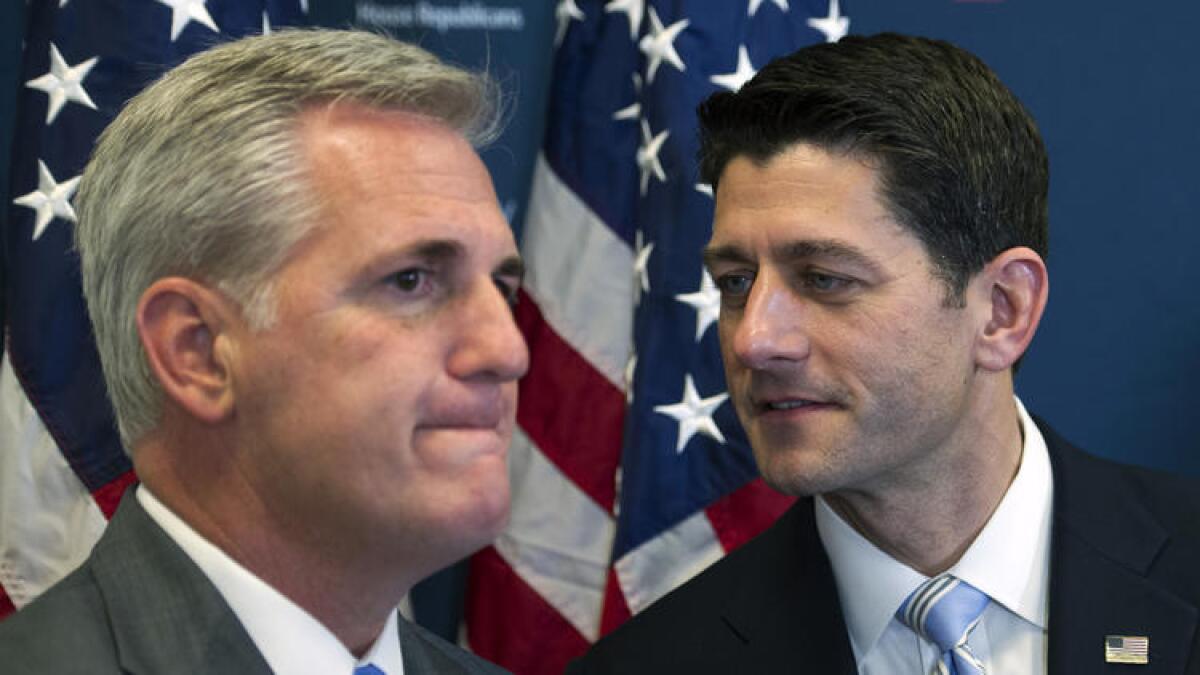
GOP leaders are coming to grips with what’s likely to be a complex, at times tortured, relationship with the Trump White House as they balance long-held Republican principles with a desire to avoid direct confrontation with the new president.
Republicans know Donald Trump is no traditional Republican. And privately many conservatives have frowned at his threatened 35% tariff on certain imports and his intervention to pressure Carrier Corp. not to move factory jobs to Mexico.
But they also want to maintain party unity and a strong relationship with the president-elect, lest they end up a target of Trump’s hostile tweets, as happened before the election to House Speaker Paul D. Ryan of Wisconsin.
House Majority Leader Kevin McCarthy found Monday just how hard it can be to walk that line.
The No. 2 House Republican tiptoed around repeated questions over Trump’s trade policies — seen as at odds with longtime GOP positions on free markets — before finally suggesting with exasperation that the president-elect’s proclamations should not be taken too literally since he’s not yet in the White House.
“Take a deep breath. He’s not sworn in yet,” McCarthy told reporters at his weekly off-camera briefing. “Let’s not predetermine what the outcome of this stuff is.”
Step by step, Trump is assembling an administration far more conservative than his campaign
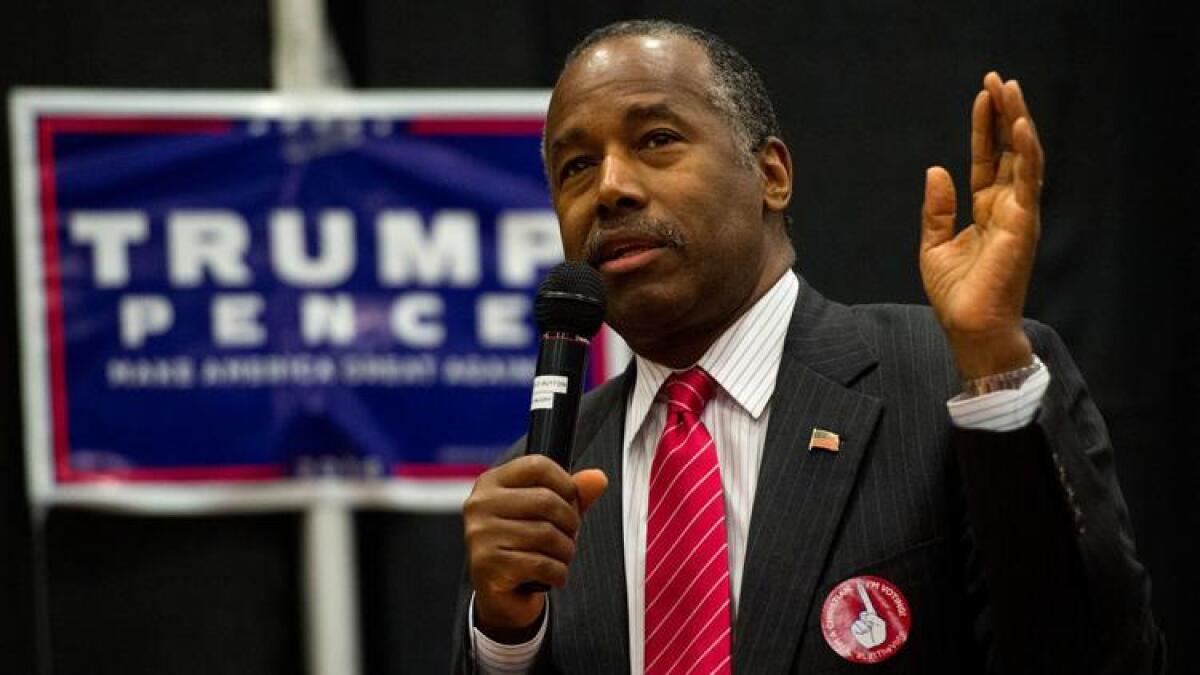
Donald Trump expressed fondness during the presidential campaign for some of the big federal programs that serve the country’s most vulnerable, but whatever warmth he may feel does not seem to be shared by the people he is choosing to run them.
Monday’s selection of Ben Carson, the former pediatric neurosurgeon and Republican presidential hopeful, to head the Department of Housing and Urban Development was the latest move to fit the pattern of stocking the Cabinet with social conservatives deeply skeptical of the government agencies they will be asked to oversee.
Trump chose Carson despite the physician’s protest last month that he lacked the credentials to run a federal agency. As a child, Carson lived in what he has described as a housing project in Detroit. Since becoming a doctor, however, he has had little other direct experience with urban policy or housing issues.
He would assume a post overseeing an agency that was elevated to the Cabinet level as part of President Lyndon Johnson’s Great Society effort to combat poverty — something Carson has declared an epic failure.
The job would test Carson’s management ability. The department, with an annual budget of $48 billion, oversees big development contracts and the distribution of lucrative grants to communities, and it has been historically susceptible to corruption in times of weak oversight.
Online anti-Clinton conspiracies turn into real danger as a gunman shows up at a Washington pizza place
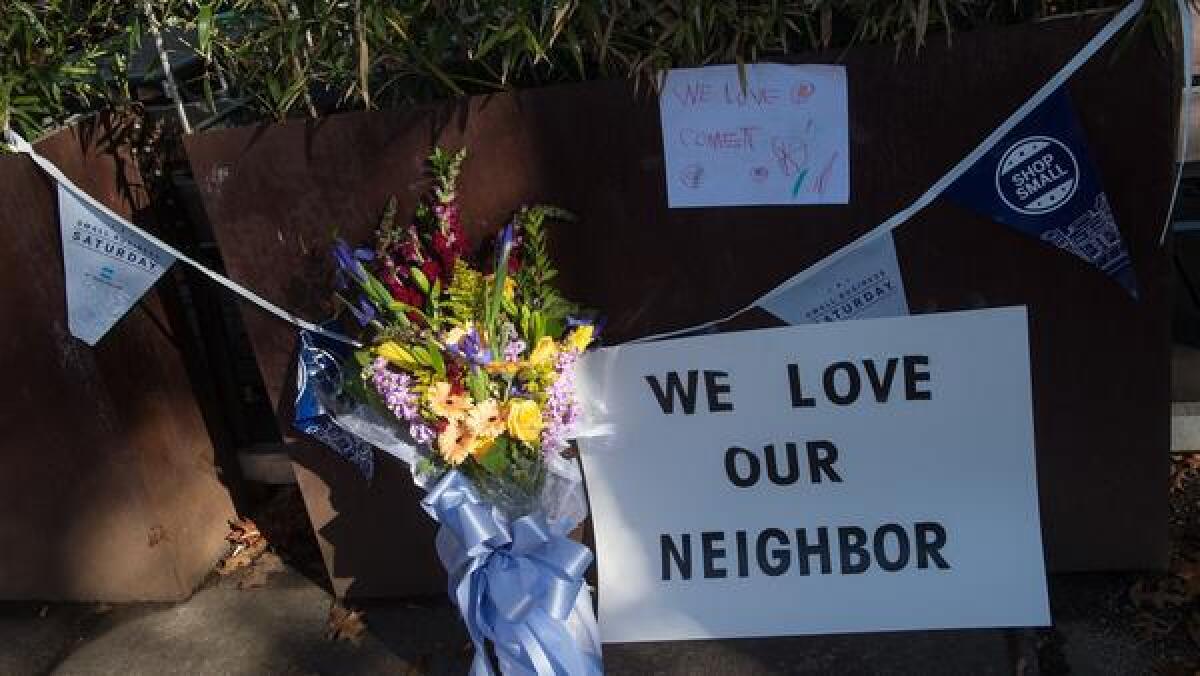
By Monday, a stretch of busy Connecticut Avenue in northwest Washington seemed back to normal, a day after a gunman entered a pizzeria intent on rescuing children trapped in an imaginary sexual abuse ring that Internet conspiracists insist was run by Hillary Clinton and a chief aide.
But it was not back to normal, not with the threat still hanging and no way to brush it aside. The sexual abuse ring is fictional, District of Columbia police said, part of an explosion of made-up news. The danger is real.
“This is a growing national problem — fake news that takes a truly menacing and vitriolic turn, and then fuels this potential for violence,” said Bradley Graham, who with his wife, Lissa Muscatine, owns a popular bookstore down the block from Comet Ping Pong, the restaurant that patrons fled Sunday when a man arrived with an AR-15 assault-style rifle and another weapon.
It is also the latest collision of an information ecosphere careening into unknown territory, the guardrails meant to prevent disaster bent useless by the hatred and animosity of the recently concluded presidential campaign.
In response to accusatory Trump tweets, Chinese Twitter users joke they’ll #AskTrumpFirst
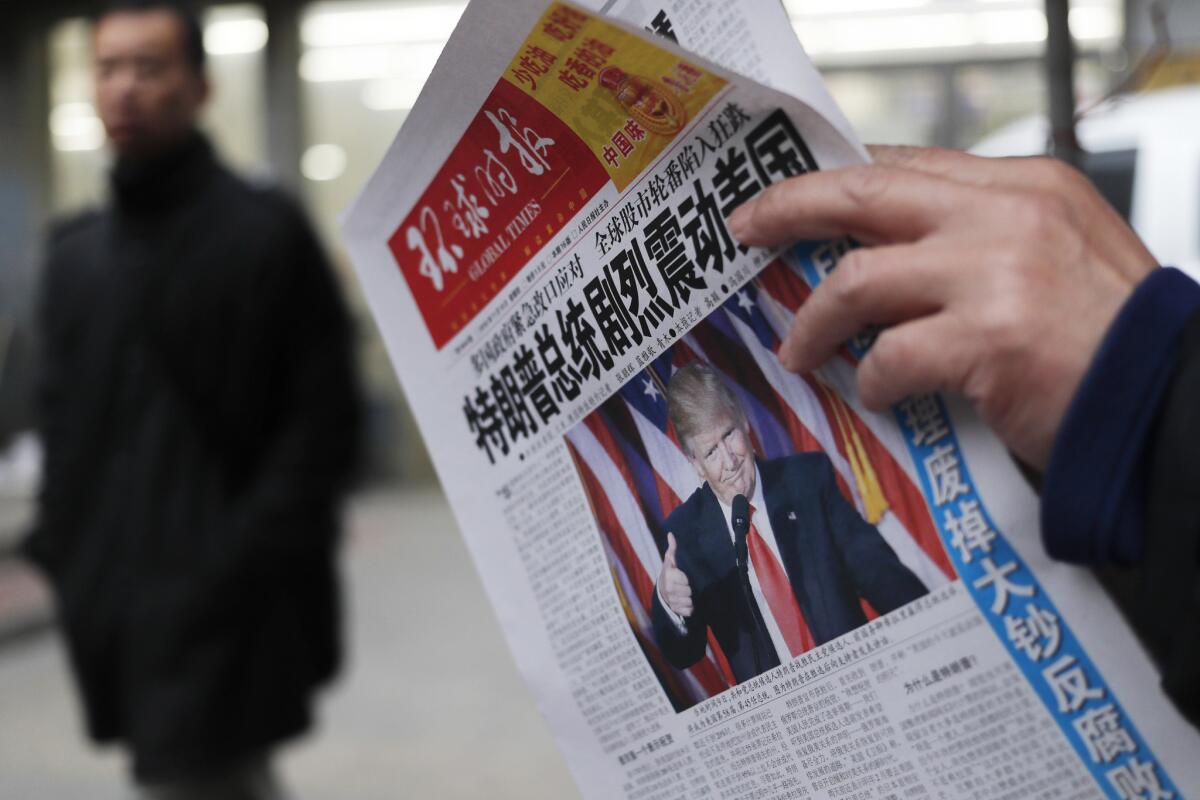
Chinese citizens, baffled by President-elect Donald Trump’s latest indictments of their country, have decided to meet him on his home turf: Twitter.
Yin Hao, an engineering graduate student in Guangzhou, started a hashtag on Monday in response to Trump’s Sunday afternoon Twitter storm. The future leader accused China of militarizing the South China Sea, taxing U.S. imports and devaluing its currency — an outdated claim. “Did China ask us if it was OK,” his tweet began.
So Yin started #AskTrumpFirst. The hashtag caught on quickly among Chinese Twitter users, even though the social media site is blocked in China.
People in China can access blocked sites like Twitter using special technology, such as virtual private networks, that sneak around the so-called Great Firewall and skirt censorship rules. Many users directed their responses to Trump’s Twitter account.
“I want it to be a Chinese version of the ‘Dear Ivanka’ movement,” Yin said, referring to an Instagram account that pleads with Trump’s daughter, Ivanka Trump, to address her father’s controversial behavior.
Irreverent social media commentaries offered some of the only response from China to Trump’s latest accusations – officials have stayed silent about his trade provocations.
“We never comment on other countries’ politicians and their personalities,” said Chinese Foreign Ministry Spokesman Lu Kang at a news conference on Monday, which drew twice as many reporters as usual. “We will not speculate on what motivates President-elect Trump and his team into taking certain moves.”
Joe Biden wouldn’t count out a 2020 run for president. But he was asked in an emotional moment
No, Joe Biden didn’t just announce a presidential run in 2020. But as he’s learned from experience, you never say never.
“I’m not committing not to run. I’m not committed to anything,” the vice president told reporters at the Capitol on Monday night after attending a Senate vote. “I learned a long time ago -- fate has a strange way of intervening.”
Biden might have run this year if not for fate intervening. He seriously weighed a candidacy in 2015 as he and his family grieved the death of his eldest son, Beau, who had brain cancer.
“The [grief] process doesn’t respect or much care about things like filing deadlines or debates and primaries and caucuses,” he said last year as he announced he would not run, saying he didn’t have enough time to mount a winning campaign.
But in that same speech, he rededicated himself to public service. Among the causes he pledged to champion was a cure for cancer.
Which is why Biden was even talking to reporters Monday at the Capitol. In his constitutional role as president of the Senate, he presided over consideration of legislation that includes $1.8 billion in funding for cancer research.
Before senators approved the measure, Senate Majority Leader Mitch McConnell (R-Ky.) announced a last-minute amendment: to rename the cancer funding provisions in honor of Beau Biden.
“It’s fitting to dedicate this bill’s critical cancer initiatives in honor of someone who’d be proud of the presiding officer today, and that’s his son,” McConnell said as Biden watched, clearly moved. The vice president silently clasped his hands in front of him after the final change was approved, and the chamber applauded in his honor.
Shortly after, Biden was asked about running for president in four years. “Yeah, I am. I am going to run in 2020,” he said. Asked whether he was serious, Biden paused, before acknowledging the role of fate.
It will be an emotional few weeks for Biden as he prepares to leave office. On Wednesday, he’ll return to the Senate for a bipartisan tribute to his 36 years as a member of the body, as well as eight as vice president.
On Dec. 18, his family will again mark another tragic anniversary: of the car accident that killed his first wife and infant daughter just after Biden won his first term in the Senate in 1972.
Nearly 300 Muslim leaders pen letter to Trump calling on him to protect Muslims amid violence

Leaders of the most prominent Muslim American groups have released an open letter to President-elect Donald Trump to “express serious concerns” about his policy proposals and upcoming administration and ask him to protect their community.
The letter, published Monday at MuslimLetterToTrump.com with 291 signatures, is endorsed by top officials from the Council on American-Islamic Relations, Islamic Society of North America, Muslim Public Affairs Council and Islamic Circle of North America, as well as dozens of imams, professors, activists and leaders of campus Islamic groups.
Muslim groups have strongly opposed many of Trump’s pronouncements and advisor picks since the election, though the letter is one among the first unified responses to the president-elect from members of the faith.
It comes amid reports that Trump is considering a registry of Muslim immigrants, something he suggested during his campaign, and after a spate of violence across the country against Muslim Americans. Some of the violence has been from attackers invoking the president-elect’s name. Muslim leaders have argued that Trump’s election has emboldened anti-Muslim sentiment.
“During and immediately following this year’s presidential election cycle, American Muslim organizations received more reports of anti-Muslim hate crimes than any other period of time since 9/11. Your recent denunciation of such behavior on ’60 Minutes’ was a positive first step, and we urge you to clearly and strongly condemn bigotry, hate crimes and bias-based school bullying directed at any American, including American Muslims. We call on you to make mutual respect and acceptance a hallmark of your presidency,” the letter says.
“Furthermore, along with many other Americans, we are deeply troubled by reports that your team is actively considering proposals that would target Muslims based on religion and violate their Constitutional rights. Advisors and members of your transition team have proposed a registry of Muslim immigrants and visitors to this country. Shockingly, an advisor cited the internment of more than 110,000 Japanese Americans during World War II -- one of the most shameful moments in our nation’s history -- as precedent for targeting Muslims.”
The letter says that Muslims wish Trump “success in upholding our country’s founding principles” and that they “will continue to engage all levels of our government to make America great.” They will also hold Trump and “all elected officials accountable for upholding our Constitution and the equal protections it guarantees.”
Signers of the letter, which organizers plan to send to Trump, include Khizr Khan, the Gold Star father who became known for his emotional plea against Trump during the Democratic National Convention. They also include Husain Abdullah, a former NFL player for the Minnesota Vikings and Kansas City Chiefs.
Son of Trump’s incoming national security advisor pushes conspiracy theory targeting pizza parlor
The son of Gen. Michael Flynn, President-elect Donald Trump’s national security advisor, is pushing a conspiracy theory that prompted an armed man to venture into a Washington restaurant Sunday.
Michael Flynn Jr. promoted a theory that erupted about a month ago. The falsehood, dubbed by some as “PizzaGate,” claimed that a pizzeria, Comet Ping Pong, and its owner were at the center of a child sex trafficking operation involving top Democrats, including Hillary Clinton’s campaign chair, John Podesta.
As the rumor spun up on extremist websites, the restaurant began fending off threats, peaking Sunday when a man with an assault-style rifle walked into the restaurant and fired at least one shot, prompting a lockdown and evacuation, according to police.
The 28-year-old suspect, identified as Edgar Maddison Welch of Salisbury, N.C., said he went to Comet Ping Pong to investigate the PizzaGate rumor. Once he found no evidence of pedophilia, he told police, he surrendered to authorities.
After Flynn’s tweets began gaining attention, he doubled down on his defense of the claims. CNN host Jake Tapper questioned Flynn through a private message on Twitter. Flynn tweeted some of Tapper’s remarks, saying it was evidence he “hit a nerve.”
Flynn is his father’s chief of staff and top aide. The elder Flynn pushed a conspiracy theory a week before the election that Clinton was involved with sex crimes involving children.
North Carolina Gov. Pat McCrory concedes he lost reelection bid
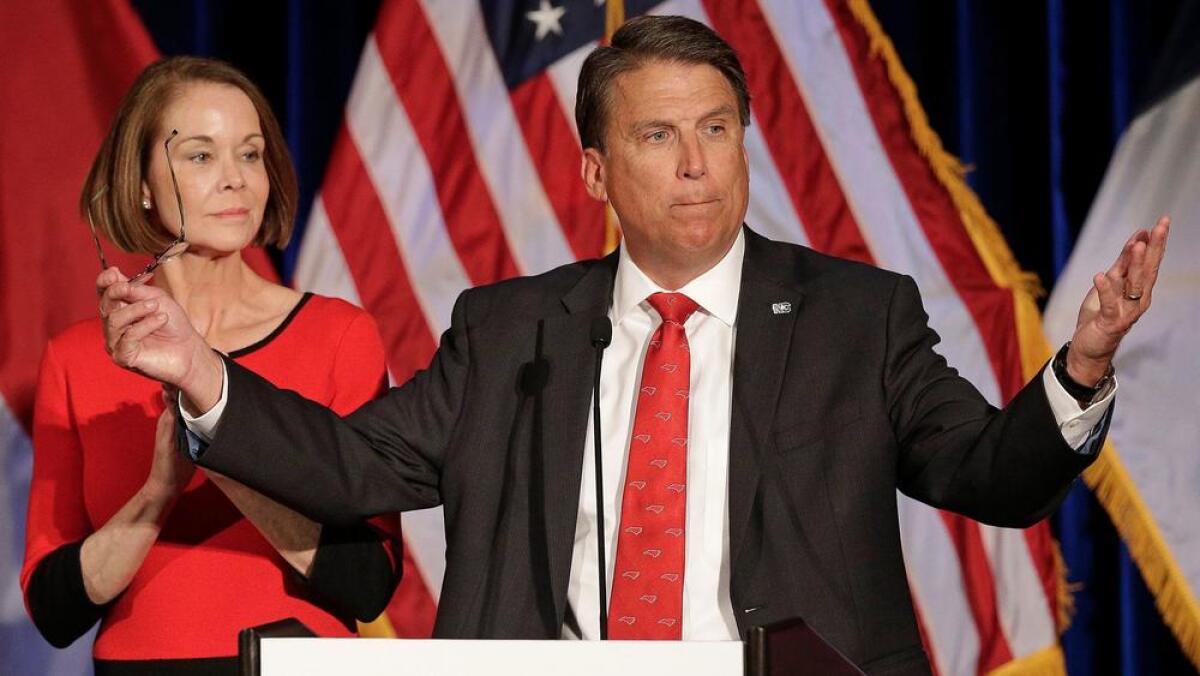
North Carolina Gov. Pat McCrory conceded the governor’s race Monday, clearing the way for Democrat Roy Cooper to be declared the winner nearly four weeks after election day.
The win by Cooper, the state’s outgoing attorney general, gives Democrats an important consolation prize after a disappointing election across the country. However, Republicans retain super majorities in both legislative chambers.
In a video message from his office posted to YouTube, McCrory said, “Despite continued questions that should be answered regarding the voting process, I personally believe that the majority of our citizens have spoken, and we now should do everything we can to support the 75th governor of North Carolina, Roy Cooper.”
Obama pledges the ‘unwavering support’ of the nation for Oakland fire victims

The victims — some as young as 17 — were found “throughout the entire square footage” of the warehouse.
President Obama mourned the deaths in last weekend’s warehouse fire in Oakland that killed at least 36, saying in a statement Monday that his administration was in close contact with local and state officials to monitor the response.
“While we still don’t know the full toll of this disaster, we do know that an American community has been devastated, and many people — including young men and women with their whole futures ahead of them — have tragically lost their lives,” Obama said.
Most of the victims were in their 20s and 30s, police have said, attending a secret electronic music show late Friday at the “Ghost Ship,” a piano factory that was being used as an art space.
Noting that Oakland is one of the “most diverse and creative cities” in the nation, Obama pledged the “unwavering support of the American people” as residents there recover.
Authorities are investigating whether any criminal activity led to the fire, one of the worst in modern California history.
Its cause is undetermined. Officials have said the warehouse was being investigated for possible code violations at the time of the fire. Some former residents described it as a cluttered “death trap” lacking fire sprinklers.
Big Republican states could have a lot to lose from Obamacare repeal
The Republican drive to repeal President Obama’s healthcare law just as soon as President-elect Donald Trump takes office already has hit snags, and new state-by-state data help show why.
Of the five states whose residents receive the most in subsidies to help them buy insurance, four — Florida, Texas, North Carolina and Georgia — have Republican-controlled congressional delegations.
Florida has the most to lose: Its residents will receive an estimated $5.2 billion in Obamacare tax credits this year, about one-sixth of the money that the federal government distributes to help people with their insurance premiums. That’s even more than California, the nation’s most populous state and the one Democratic bastion on the top-five list.
The data on the amount of the subsidies in each state were compiled by the Kaiser Family Foundation, which has tracked data on the Affordable Care Act since it took effect. The foundation based its estimates on the average amount of the tax credits and the number of people buying insurance under the law in each state.
The law provides subsidies to about 9.4 million Americans with moderate or low incomes to help them buy insurance. Almost half of those receiving subsidies live in the top five states.
The amount of the subsidy depends on recipients’ incomes and on the premiums in their market. As a result, the amounts vary considerably among states. In North Carolina, for example, the average subsidy is $401; in New York it is only $178. The national average subsidy is $291.
Republicans have a number of proposals to repeal the law but have not agreed on how to replace it. They seem likely to try a “repeal and delay” plan that could keep subsidies flowing for at least another year or two while they seek agreement on a replacement plan, but some conservatives, particularly in the House, are pushing for faster action.
Trump chooses former campaign rival Ben Carson to be housing secretary
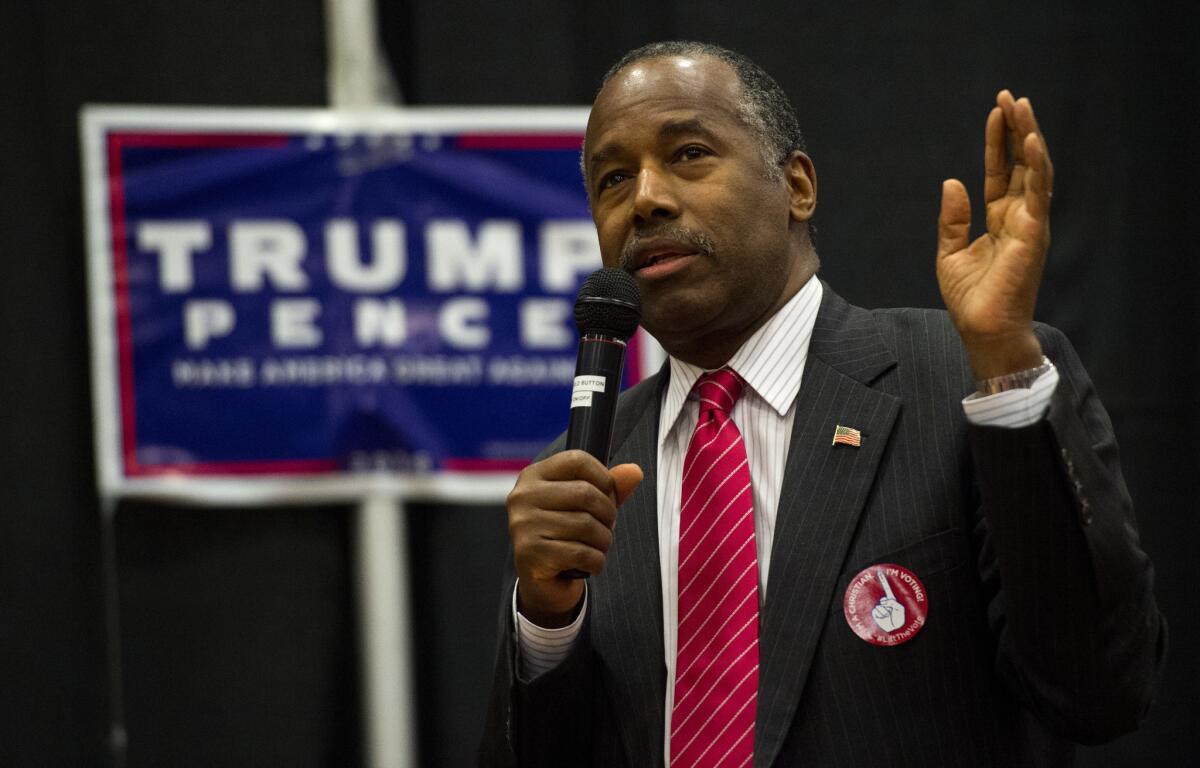
President-elect Donald Trump has chosen Ben Carson, a rival in the GOP presidential primary who became a top supporter, to run the Department of Housing and Urban Development.
Trump chose Carson despite the pediatric neurosurgeon’s protestations that he lacked the experience to run a federal agency. The announcement Monday that Carson has been picked for the post came after weeks of negotiations during which Carson said publicly he had little interest in serving in Trump’s Cabinet, but then expressed more openness to the idea as Trump publicly courted him.
“Ben Carson has a brilliant mind and is passionate about strengthening communities and families within those communities,” Trump said in a statement. “We have talked at length about my urban renewal agenda and our message of economic revival, very much including our inner cities. Ben shares my optimism about the future of our country and is part of ensuring that this is a presidency representing all Americans. He is a tough competitor and never gives up.”
Carson said in a statement that “I feel that I can make a significant contribution particularly by strengthening communities that are most in need. We have much work to do in enhancing every aspect of our nation and ensuring that our nation’s housing needs are met.”
The choice of Carson further positions Trump to move the federal government in a drastically different direction than President Obama on policies that will affect millions of low-income Americans. Carson, a tea party favorite, has been deeply critical of social welfare programs. He has characterized the country’s safety net of cash assistance, housing allowances and social services as a failure that perpetuates dependence on government.
Carson would be taking on a post that was elevated to Cabinet-level as part of former President Lyndon Johnson’s “Great Society” agenda, which Carson has pilloried as a colossal failure.
Trump picked Carson days after announcing that his administration’s effort to dismantle one of the most expansive programs serving low-income Americans, Obamacare, will be headed by Republican Rep. Tom Price of Georgia, a fiscal conservative and longtime crusader for substantially cutting healthcare spending. Price is Trump’s pick to run the Department of Health and Human Services.
Trump criticizes China on Twitter two days after unprecedented Taiwan call
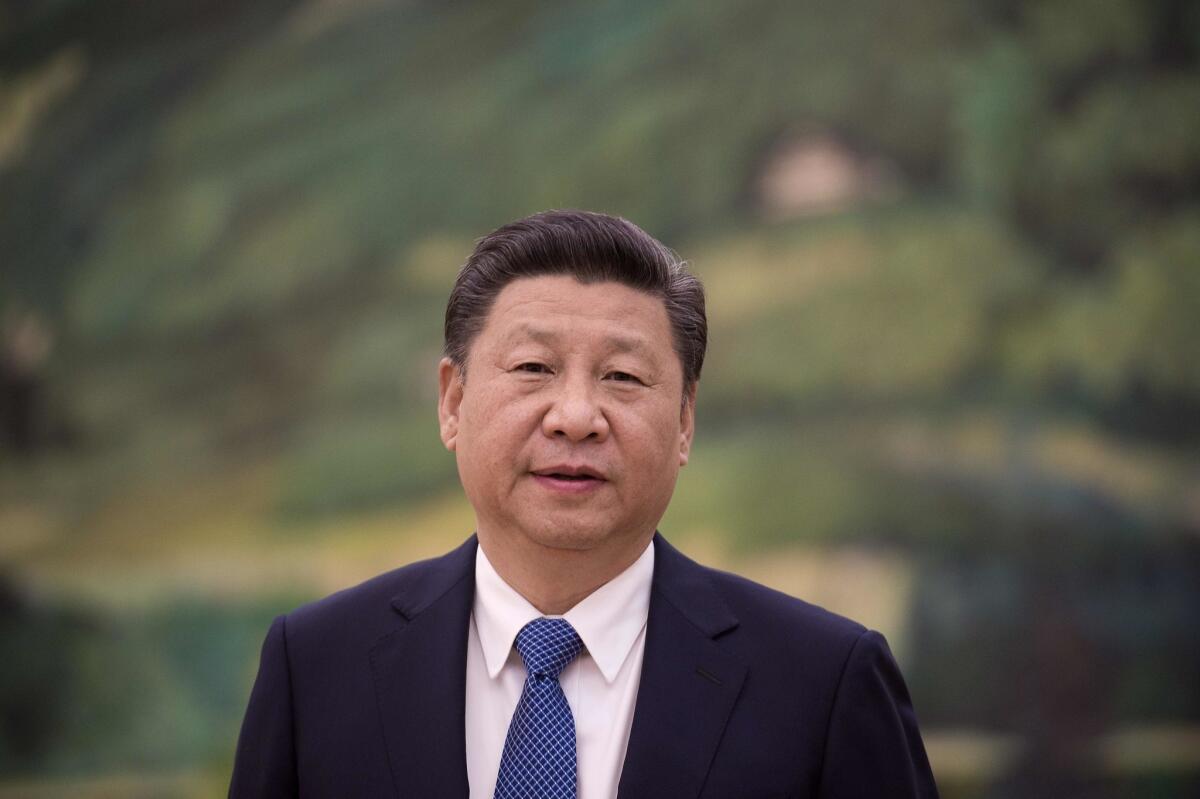
President-elect Donald Trump on Sunday blamed China for militarizing the South China Sea, taxing U.S. imports and devaluing its currency — even though the Chinese Renminbi has appreciated rapidly for the last 10 years.
“Did China ask us if it was OK to devalue their currency (making it hard for our companies to compete), heavily tax our products going into their country (the U.S. doesn’t tax them) or to build a massive military complex in the middle of the South China Sea? I don’t think so!” he wrote on Twitter.
The tweets come two days after Trump spoke on the phone with Taiwan President Tsai Ing-wen, an astonishing break with diplomatic protocol that confounded foreign policy experts and angered Beijing.
China regards self-governing Taiwan as a breakaway province, and the two sides enjoy a fragile peace marked by delicate political rhetoric and rising economic integration. China lodged a diplomatic protest with the U.S. over the call.
China’s central bank does heavily manipulate the country’s currency markets — yet the country’s real exchange rate has risen nearly 40% since 2004, according to the Bank for International Settlements, and the International Monetary Fund declared last year that the Renminbi was no longer undervalued.
Trump during his campaign slammed Beijing for taking U.S. jobs, claiming that it was “using our country as a piggy bank to rebuild China,” and was intentionally devaluing its currency to boost exports. “They’re the best, the best ever at it,” he said.
Paul Ryan says he backs Trump immigration proposals that focus on border security
House Speaker Paul D. Ryan said he is working with President-elect Donald Trump to tighten the nation’s immigration practices.
“What we’re focused on is securing our border,” Ryan told “60 Minutes” in its Sunday evening broadcast.
Ryan said Trump and their fellow Republicans had no plans for a deportation force that would round up people in the U.S. illegally.
“Here’s what we’re working on with respect to immigration — securing our border, enforcing our current laws,” Ryan said.
Noting that Trump has discussed people who have committed crimes beyond illegally entering the country, Ryan added: “That’s just enforcing laws for people who came here illegally, who came and committed violent crimes. We should enforce those laws. But really, what we’re focused on is securing our border.”
Since his election, Trump has said he would focus deportation efforts on criminals. But top aides have discussed widening that definition to include people suspected of crimes.
Trump also has said that some parts of his promised wall along the border with Mexico might be made of fencing material.
“Conditions on the ground determine what you need in a particular area,” Ryan said. “Some areas, you might need a wall. Some area, you might need double fencing. My own view on this is, whatever kind of device or barrier or policy to secure the border, that’s necessary to secure the border, then do it.”
Iran says it won’t walk away from the nuclear deal that Trump has threatened to ‘dismantle’
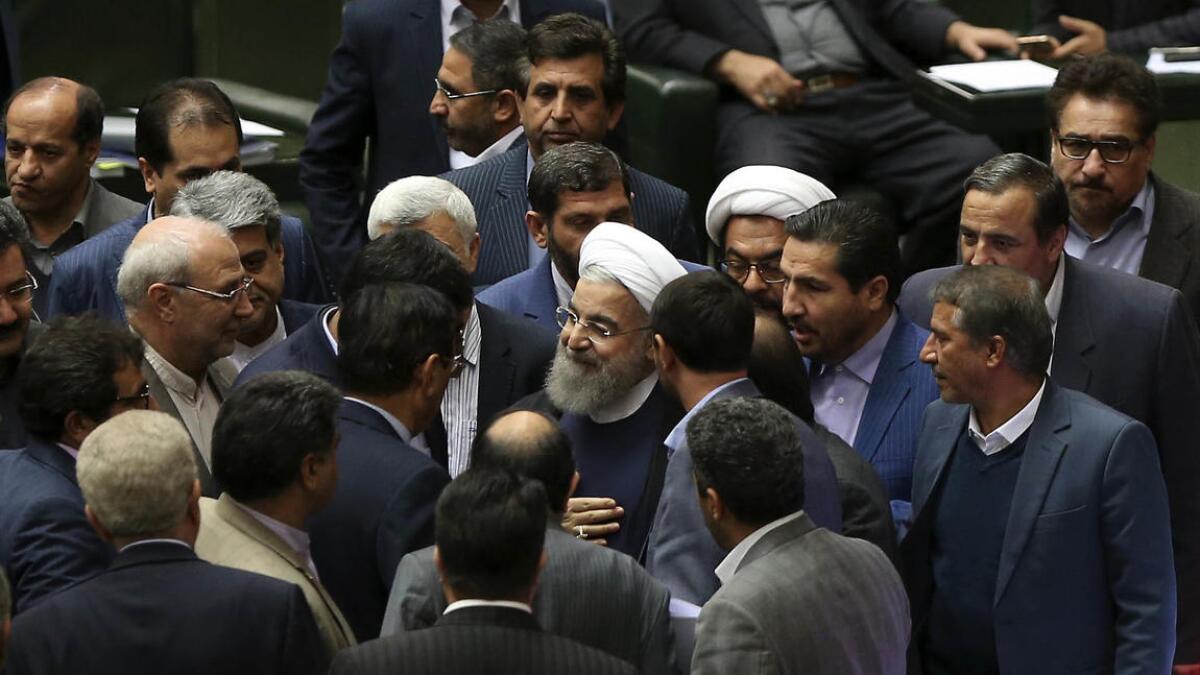
Iranian President Hassan Rouhani criticized U.S. lawmakers on Sunday for, in his view, undermining a landmark nuclear agreement, but he said Tehran had no intention of abandoning the deal.
In a speech to parliament, Rouhani slammed a Senate vote last week to extend for 10 years a longstanding package of trade, energy, defense and banking sanctions against Iran.
The unilateral U.S. restrictions were not rescinded by the agreement that Iran signed last year with six world powers — including the United States — to roll back its nuclear program in exchange for an easing of international sanctions.
Top advisor says Hillary Clinton needed no prodding to concede to Donald Trump
Hillary Clinton had already made up her mind to concede to President-elect Donald Trump before she talked with President Obama on election night, her campaign manager said.
“She made that decision on her own before she spoke to the president,” campaign manager Robby Mook said in a taped interview that aired on CNN on Sunday morning.
“And she made it because she believed, and she had said during the campaign, that it is important to our democracy that whoever wins, that their opponent concede the election and be supportive of them becoming president-elect,” Mook said. “And so she acted in good faith.”
A soon-to-be published book by well-sourced authors contradicted that claim. The book, by veteran reporters Amie Parnes and Jonathan Allen, says Clinton had not yet reached that decision before Obama advised her to concede. They cite three people close to Clinton familiar with how the night unfolded, according to a report by Parnes in the Hill newspaper.
“You need to concede,” Obama told Clinton as she and her family watched results come in from Michigan, Wisconsin and Pennsylvania, according to the story. Clinton called Trump in the early morning hours to concede the election.
Priebus argues ‘it’s possible’ that millions voted illegally, but no evidence suggests it
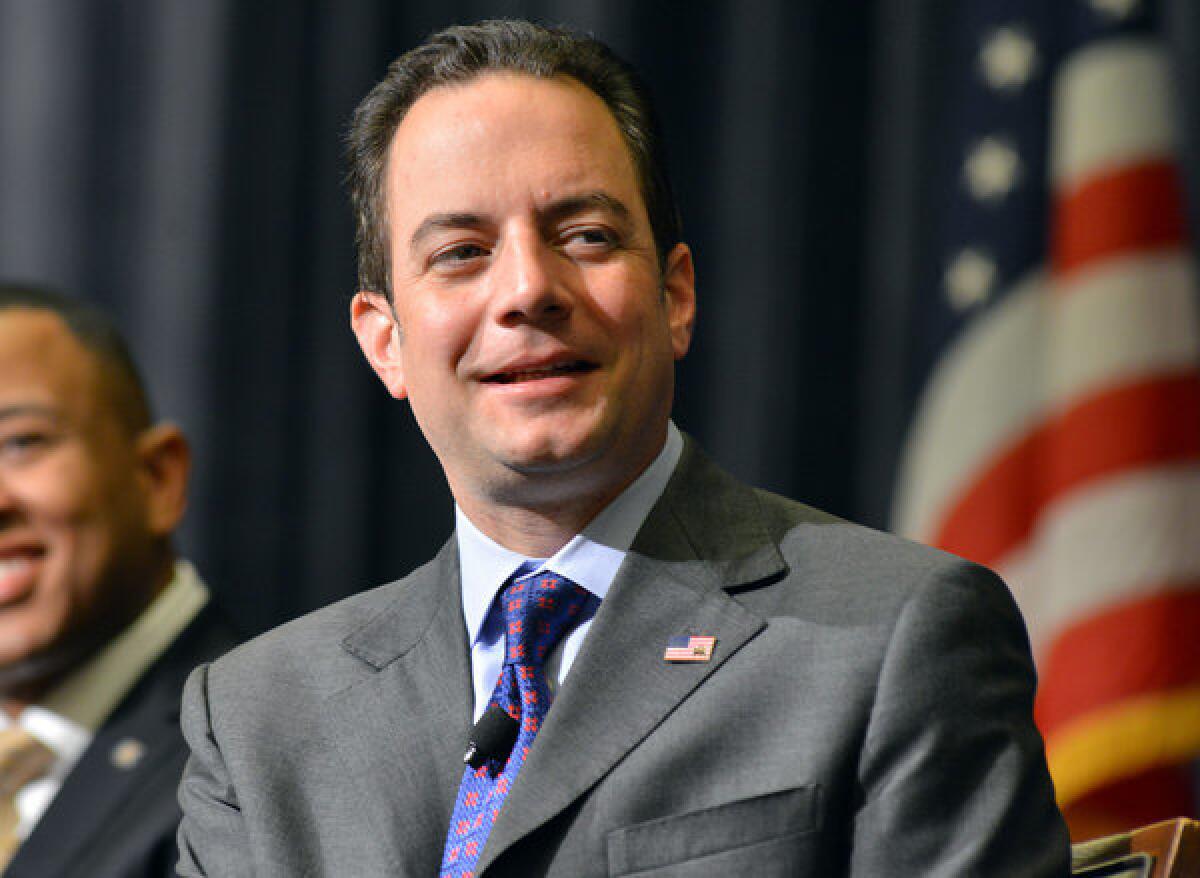
Incoming White House chief of staff Reince Priebus said Sunday that “it’s possible” millions of people voted illegally in the election of his soon-to-be boss, President-elect Donald Trump, though no evidence exists of such votes.
Priebus doubled down after Trump’s false assertion last week but cited no proof.
“I don’t know if that’s not true,” Priebus said on CBS’ “Face the Nation.”
“But you think millions of people voted illegally?” host John Dickerson asked.
“It’s possible,” Priebus replied.
Trump tweeted last week that he should have won the popular vote instead of Democrat Hillary Clinton but falsely claimed that millions of people illegally voted.
Though Trump won the electoral vote, Clinton got at least 2.5 million more votes than he did overall; votes are still being counted in several states, including California.
Trump has offered no evidence of voter irregularities in the 2016 race.
He has mentioned a statistical analysis by three Virginia academics that estimated that more than 6% of noncitizens cast illegal votes in 2008. But that study was attacked by other experts who say it made too much of a few people who said they were noncitizens and might have given incorrect answers in a survey.
The lack of evidence appeared to be evidence enough for Vice President-elect Mike Pence, who told ABC’s George Stephanopoulos that he can’t prove it’s not true.
“Look, I don’t know that that is a false statement, George, and neither do you,” Pence said.
While voter fraud does happen, it is rare and not in great enough numbers to tip an election, and experts say it is often attributable to error, not intent. Trump warned during the campaign that people were coming into the U.S. illegally to vote, but offered no proof, and no coordinated effort emerged.
“What we have seen are errors,” Dale Ho of the American Civil Liberties Union said before the election. “There’s not a horde of people trying to break into this country so they can vote.”
Trump again threatens massive tariffs for American corporations that export jobs
President-elect Donald Trump doubled down on his threat against U.S. businesses that send jobs abroad on Sunday, declaring it an “expensive mistake” and warning of a massive tax if companies try to sell foreign-made goods in the U.S.
Trump said he would impose a 35% tariff on goods produced overseas as he encouraged businesses to consider looking for better deals by moving state to state.
“The United States is open for business,” he tweeted.
The tax will make leaving “financially difficult,” Trump also said, part of a series of tweets on the topic, but “these companies are able to move between all 50 states, with no tax or tariff being charged.”
Trump will make decisions about companies that might move jobs “on a day-to-day basis,” Vice President-elect Mike Pence said on ABC’s “This Week.”
But neither Trump nor Pence provided clarity about what tariffs Trump might try to impose, on his own or with Congress, or how he would apply them.
The elliptical announcement follows a week in which Trump bragged about his ability to persuade U.S. corporations to rethink their off-shoring strategies.
Trump traveled to Indiana last week to mark the decision by Carrier, a heating and cooling manufacturer, to keep roughly half the 2,000 jobs it was planning to move to Mexico. Carrier’s impending move was a key talking point during Trump’s campaign for president, and during his visit to the plant, Trump celebrated his influence in the decision.
Carrier also won $7 million in incentives from the state, drawing concerns from critics about whether Trump had actually demonstrated how companies might extort benefits from state and local officials by threatening to move jobs out of the country.
But Pence characterized the process more as an act of diplomacy that Trump had initiated.
“What the president-elect did with Carrier was simply reach out one American to another and ask them to reconsider,” Pence said on “This Week.”
Watch the ‘Saturday Night Live’ skit that Donald Trump criticized
President-elect Donald Trump frequently complained during the campaign about the portrayal of him on “Saturday Night Live,” and his dim view of the show carried over last night into the transition.
Here’s the skit, about Trump’s compulsive tweeting, that drew his ire.
Trump’s call with the Taiwanese president was his latest break from diplomatic norms
He praises enemies, he ignores allies, he upends decades of policy.
And Donald Trump hasn’t even been sworn in as president.
In a series of telephone calls with foreign leaders apparently eager to congratulate the president-elect, Trump has broken many of the rules that govern delicate matters of international relations, leaving State Department diplomats shocked and confused.
China struggles to make sense of Trump and his phone call with Taiwan
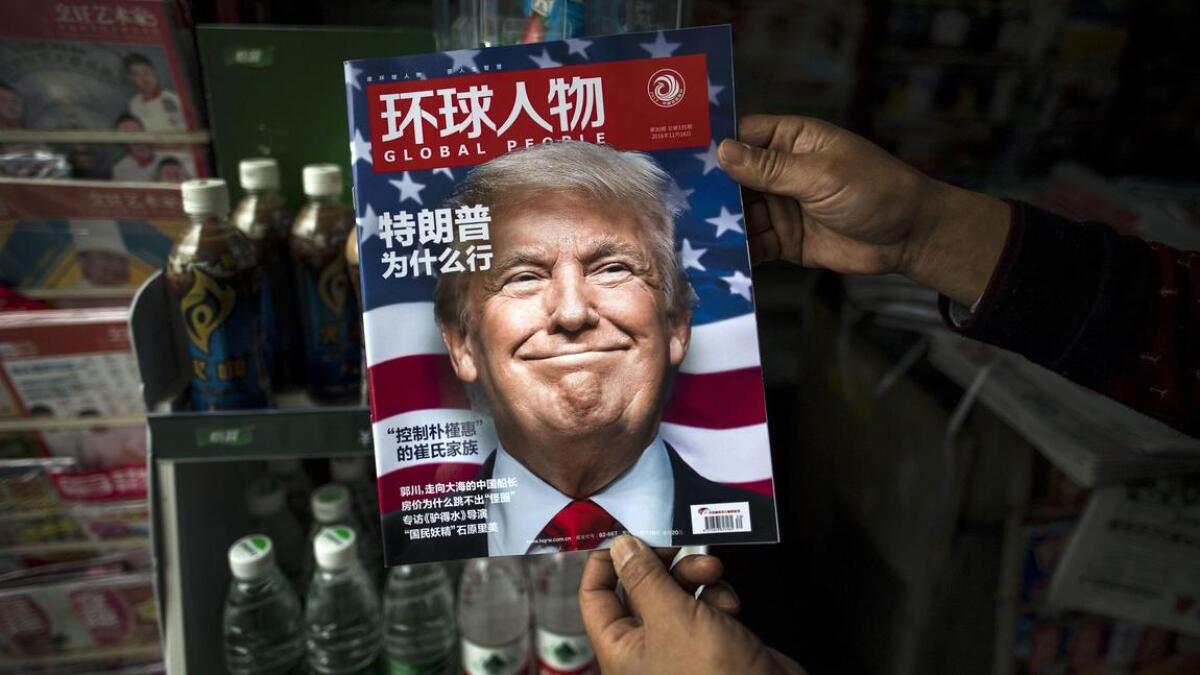
President-elect Donald Trump‘s surprise phone call with Taiwan’s president left many in China reeling over a perceived assault on the country’s sovereignty and questioning their assumptions about America’s future leader.
Although Trump repeatedly denounced China’s trade policies as unfair during the campaign, many here thought that his “America first” rallying cry might spare their country from lectures on human rights, territorial disputes and other diplomatic sore points.
“This is a message that their predictions were too optimistic,” said Shi Yinhong, director of the Center on American Studies at People’s University in Beijing. “China leaders will be quite prudent in their response, but this naturally increases worries in their minds about Trump’s possible attitudes and policy towards China.”
Green Party drops bid for statewide Pennsylvania recount
The Green Party is dropping its court case seeking a statewide recount of Pennsylvania’s Nov. 8 presidential election. It had wanted to explore whether voting machines and systems had been hacked and the election result manipulated.
The decision came Saturday, two days before a court hearing in the case. Lawyers for the Green Party-backed voters who filed the case say they can’t afford the $1-million bond ordered by the court by 5 p.m. Monday. However, Green Party-backed efforts to analyze election software in scattered precincts are continuing.
Green Party presidential candidate Jill Stein has spearheaded recount efforts in Michigan, Pennsylvania and Wisconsin, states where Republican Donald Trump won narrowly over Democrat Hillary Clinton. Trump and the Pennsylvania GOP had opposed the recount.
Steven Mnuchin, Trump’s pick for Treasury, resigns as MOCA board member
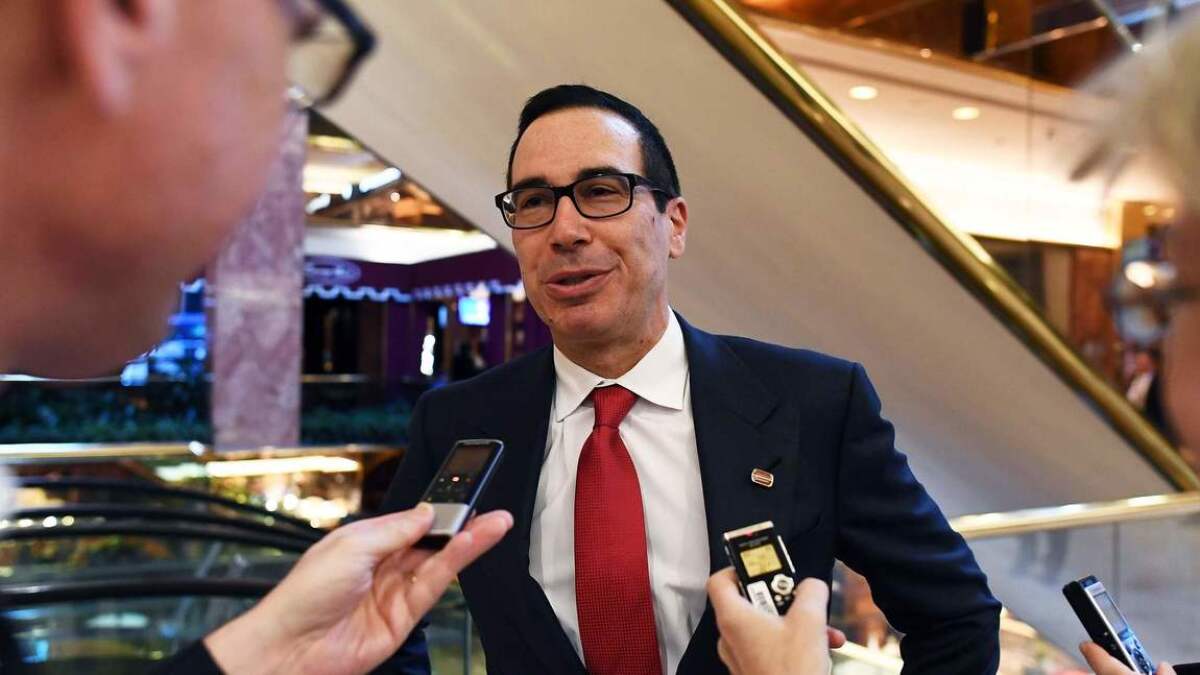
Following his appointment as the next Treasury Secretary by President-elect Donald Trump, California banker Steven Mnuchin has resigned from his board position at the Los Angeles Museum of Contemporary Art.
Mnuchin, a former Goldman Sachs partner and onetime co-chairman of the troubled Relativity Media studio, joined the Board of Trustees of the museum in December 2009. He cited a new workload as the reason for his resignation.
He’d never felt targeted for the way he looked. Donald Trump’s victory changed that

Mornings have been a little more somber for Mario Calderon and his family since Nov. 8, when he came home from school and told his mother what another kid had said on the bus — that because he was a Mexican he’d have to start sitting at the back now that Donald Trump would be president.
Mario had never felt a sting like that before — he was born in Idaho, just like his sisters. His stomach churned. He was confused. Lonely. Anger muscled its way forward too. The bus driver reprimanded the kid, and Mario didn’t sit in the back. But the seed was planted. He worried that it would happen again.
“I felt sad,” he said.
Trump’s victory, the threat to California’s greatest natural resource and new urgency for a strong Coastal Commission

All summer long, I celebrated the California coast, marking the 40-year anniversary of protections built into the Coastal Act.
Now winter is coming on, and I’m scared of what could happen to the greatest 1,100-mile beach on the planet.
We have a president-elect who said he’d like to bulldoze the Environmental Protection Agency, thinks global warming is a fairy tale and has surrounded himself with knuckle-draggers who would frack in marine sanctuaries and drill in Yosemite if they could get away with it.
What happens when your next president blocks you on Twitter

Heather Spohr of Thousand Oaks has been blocked from Donald Trump’s Twitter account since she called the president-elect “repulsive” on the social media platform last year. (Mel Melcon/Los Angeles Times)
Heather Spohr didn’t vote for Donald Trump, but that doesn’t mean she’s not interested in keeping up with what her soon-to-be president has been saying.
That hasn’t been so easy for the Thousand Oaks mother of two ever since she tweeted during a Republican primary debate last year that she found the celebrity businessman “repulsive” because of his feud with Fox News anchor Megyn Kelly.
Spohr is now one of an untold number of people who are blocked from following the president-elect on Twitter — a distinction that ordinarily wouldn’t matter except that Trump, who hasn’t held a news conference since July, uses the social media platform as his primary tool for communicating with the American public.
Philippine president says Trump complimented him on his controversial drug campaign
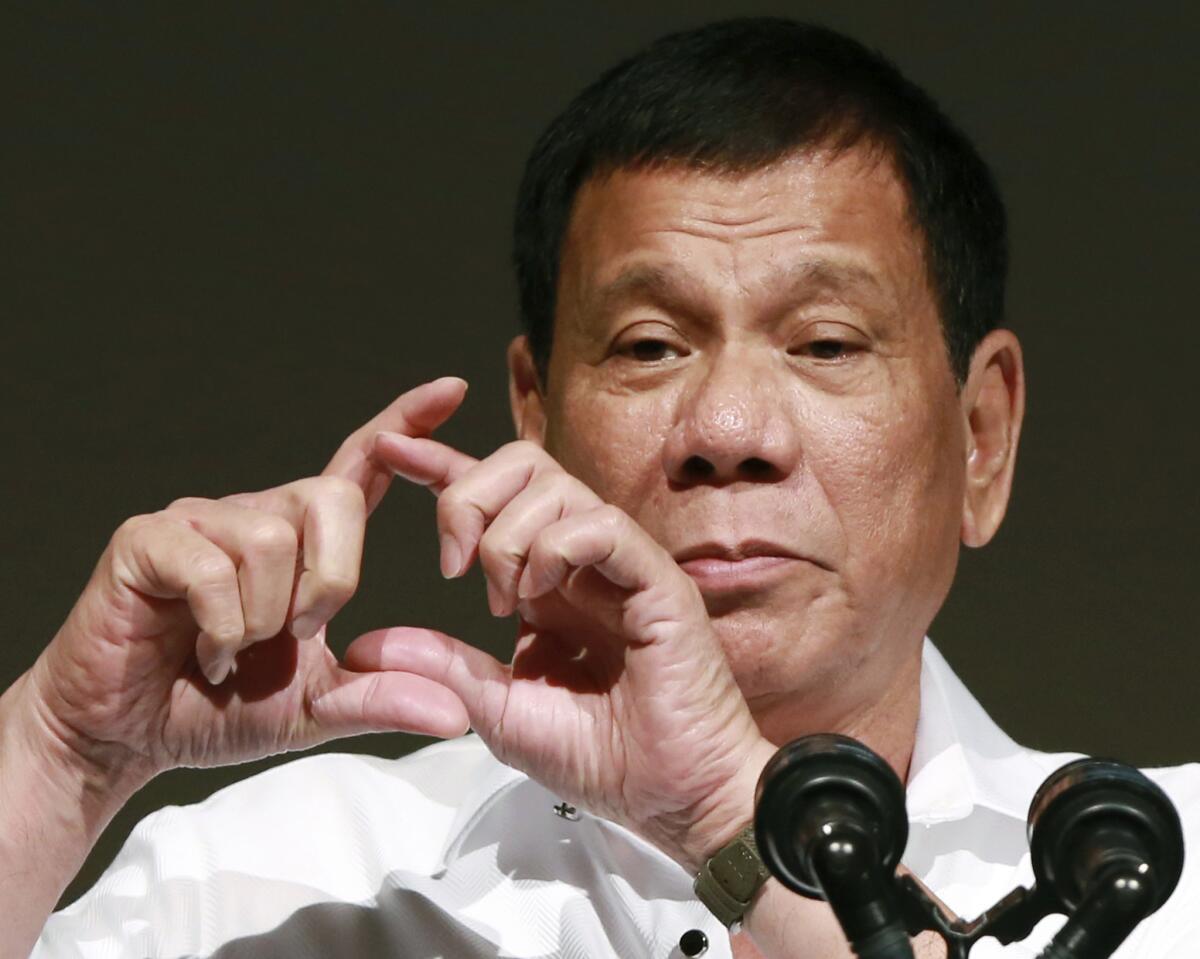
U.S. President-elect Donald Trump praised Philippine President Rodrigo Duterte’s anti-drug campaign — a bloodbath that has taken the lives of nearly 5,000 suspected drug dealers and users — in a phone call on Friday night, Duterte said.
Trump told the Philippine leader that he was conducting his drug war “the right way” and invited him to the White House, Duterte said, according to the Philippine Inquirer.
“The President-elect Trump wishes to extend his warmest regards to the Filipino people,” Duterte recounted, according to the newspaper. “And in just a few minutes, we were talking [about] a lot of things. He was quite sensitive also to our worry about drugs.”
“And he wishes me well too, in my campaign and he said that… well we are doing it as a sovereign nation, the right way,” he continued. “And he wishes us well. And I said that, well, we assured him of our ties with America.”
Trump’s transition team confirmed that the phone call took place, but did not say whether Trump praised the Philippine president’s drug war or invited him to the White House.
Trump and Duterte “noted the long history of friendship and cooperation between the two nations,” according to the Trump team’s statement, “and agreed that the two governments would continue to work together closely on matters of shared interest and concern.”
Duterte, 71, campaigned on promises to rid the country of illegal drugs by killing tens of thousands of drug dealers, and since his inauguration in late June, an estimated 4,800 people have been killed, most of them gunned down by police and vigilantes.
Duterte’s latest comments contrasted sharply with his exchanges with the Obama White House, which frequently criticized his drug campaign as an affront to human rights and due process. Duterte responded with hostility, calling Obama the “son of a whore” and threatening to “separate” from the U.S., a longstanding Philippine ally.
Donald Trump speaks with Taiwan’s leader, which could provoke China
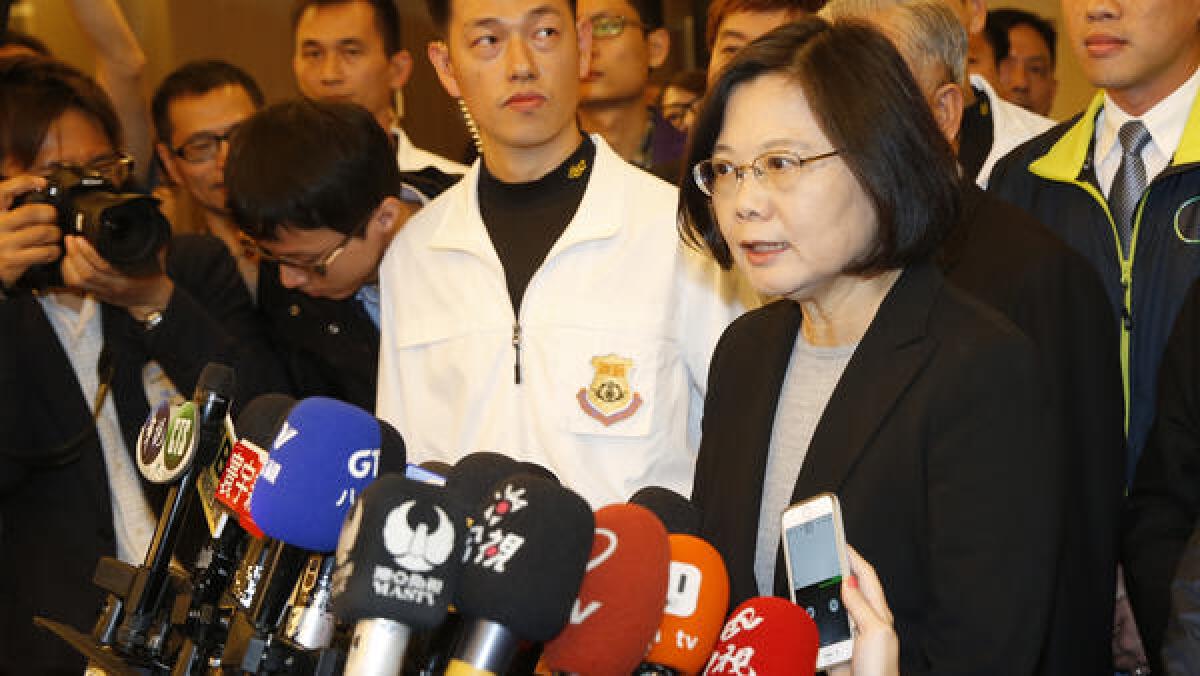
President-elect Donald Trump had a potentially provocative phone conversation Friday with Tsai Ing-wen, the president of Taiwan, which could upset delicate relations between the U.S. and the Chinese government.
It is believed to be the first call between a president or president-elect with a Taiwanese leader since 1979, when the U.S. recognized the mainland government and cut ties with Taiwan.
China has long been sensitive to any diplomatic recognition of Taiwan, which it regards as a rogue province. The reaction from China could be sharp.
The Trump transition team confirmed the call Friday in a statement summarizing contacts with four foreign leaders, including leaders from Afghanistan, the Philippines and Singapore.
Supreme Court to hear case about Southern California police shooting
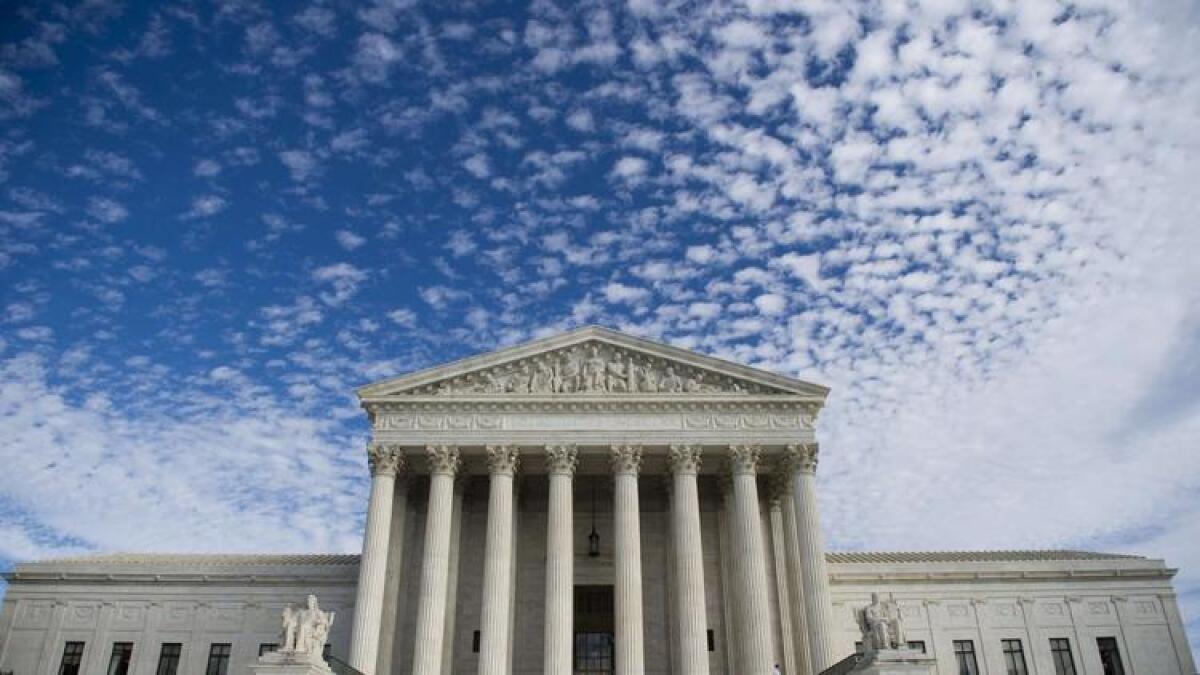
The Supreme Court agreed Friday to review a police shooting in Los Angeles County and decide whether officers can be held liable if they recklessly provoke a violent confrontation.
Two deputies were hit with a $4 million judgment for breaking into a shack behind a house in Lancaster in 2010 and shooting and severely injuring a couple who were sleeping there.
One of the victims, Angel Mendez, was holding a BB gun in the dark shack, and a judge decided the officers acted reasonably in firing their guns since they feared for their safety. At the time, they were looking for a fugitive who was said to be armed and dangerous.
But the judge nonetheless held the two officers liable because they had provoked the confrontation by entering the shack without a search warrant.
The justices have noted before that the 9th Circuit Court, which has jurisdiction on the West Coast, is the only one to have adopted this “provocation” rule in police shooting cases.
And on Friday, the high court said it would hear the officers’ appeal, which asks the justices to throw out this rule.
The case of Los Angeles County vs. Mendez will be heard and decided early next year.
Immigration detainees should be held in for-profit prisons, panel says
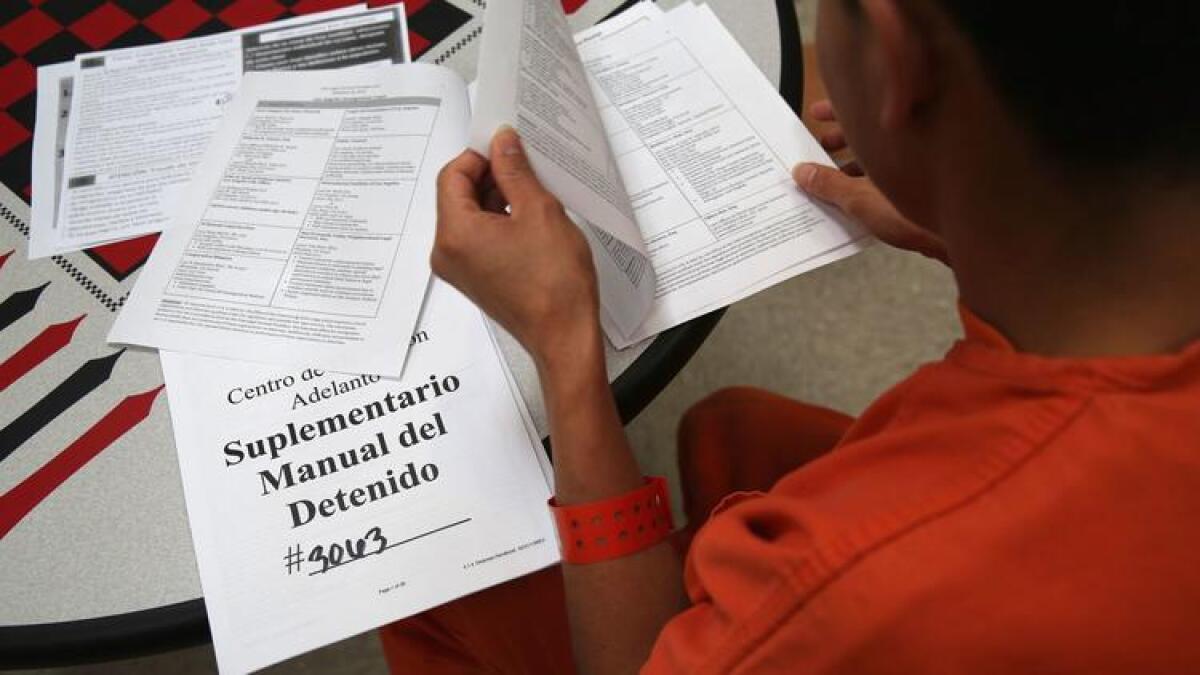
Immigration authorities should continue holding people accused of immigration violations in for-profit prisons despite complaints about safety and other problems, a Department of Homeland Security review panel has concluded after examining the issue.
Privately run detention facilities have long attracted criticism from immigration advocates and human rights groups for poor conditions and inadequate medical care.
But in a 23-page report released Thursday, the panel said eliminating them would cost too much and make it harder for U.S. Immigration and Customs Enforcement officers to cope with sudden surges in the detainee population.
“Use of these facilities will continue,” Karen Tandy, who led the panel that conducted the two-month review, told the Homeland Security Advisory Council. “We’ve seen dramatic surges in detention.”
Michigan attorney general suing to block Jill Stein’s recount request
U.S. economy creates 178,000 jobs in November; jobless rate drops to 4.6%
The U.S. economy produced another solid month of labor market growth, adding 178,000 net new jobs in November while the unemployment rate fell to a nine-year low, the Labor Department said Friday.
The latest jobs report virtually assures that Federal Reserve officials will raise a key interest rate this month.
The unemployment rate fell to 4.6%, the lowest since mid-2007, but the 0.3 percentage point drop was in large part because the labor market shrank by 226,000 people. It was the second-straight month the labor force shrank.
In another discouraging sign, wage growth reversed in November after mostly strong gains in recent months.
Trump’s pick of James Mattis to head the Pentagon sets up a spat in Congress
Donald Trump’s pick of retired Marine Gen. James N. Mattis as secretary of Defense has started a debate in Congress over civilian control of the military that will shadow his confirmation.
Mattis retired from the Marines in 2013 and federal law specifically bars anyone who served in uniform in the previous seven years from heading the Pentagon.
Congress would need to pass another law to grant Mattis a waiver -- the first since Congress agreed to let retired Army Gen. George C. Marshall become secretary of Defense in 1950.
That law specifically warned against approving another recently retired military officer as a future Pentagon chief.
Republican leaders in Congress — including Sen. John McCain of Arizona, who heads the Senate Armed Services Committee, and Rep. Mac Thornberry of Texas, who heads the House Armed Services Committee — have indicated a willingness to grant Mattis the waiver.
But Democrats may not be so willing. At least one already has announced her opposition while others expressed concerns.
“While I deeply respect Gen. Mattis’ service, I will oppose a waiver,” said Sen. Kirsten Gillibrand (D-N.Y.), ranking member on the Senate Armed Services subcommittee on personnel.
“Civilian control of our military is a fundamental principle of American democracy, and I will not vote for an exception to this rule,” she said in a statement.
Trump’s choice raises “serious questions about fundamental principles of our Constitutional order,” said Rep. Adam Smith (D-Wash.), ranking member of the House Armed Services Committee.
“Civilian control of the military is not something to be casually cast aside,” he said. “So while I like and respect Gen. Mattis a great deal, the House of Representatives would have to perform a full review, including hearings by the Armed Services Committee, if it were to consider overriding the statutory prohibition on recent military officers serving as the secretary of Defense.”
Congress should “bear in mind the precedent we would be setting and the impact it would have on the principle of civilian leadership of our nation’s military,” said Rep. Adam Schiff (D-Burbank), ranking member of the House Intelligence Committee.
The 1947 federal law that created the Defense Department set a 10-year ban on military officers from heading it. The 1947 federal law that created the Defense Department said military officers weren’t allowed to head it within 10 years after their service ended. The ban was dropped reduced to seven years in 2008.
While 18 of the 25 men confirmed as secretaries of Defense since 1947 had previously served in the military, only Marshall had retired recently enough that he needed a waiver.
But Marshall’s case was unique in many ways.
He agreed to accept the Pentagon post for just a year to help plan for the Korean War, which had just begun. He had already served as secretary of State for two years, and the rebuilding of Europe under the Marshall Plan ultimately would win him a Nobel Prize.
Moreover, except for a short staff assignment in France during World War I, Marshall was a headquarters general, not a combat commander.
As chief of staff of the Army during World War II, he oversaw the swift expansion of the U.S. military and coordinated Allied operations in Europe and the Pacific from his desk in Washington.
Mattis, who served four decades in the Marines, was more of a front-line officer. He served multiple combat tours in Iraq and Afghanistan.
Military officers traditionally stay outside the partisan political fray because they do not want their military advice to civilian leaders viewed as politically motivated.
Gen. Joseph Dunford, chairman of the Joint Chiefs of Staff, made sure he and his staff avoided articulating any opinion in public during the presidential campaign.
Mattis has been outspoken since retiring and has criticized some Obama administration policies, particularly on Iran.
Despite the concerns, Congress is expected to approve the waiver for Mattis and the Senate is then likely to confirm his nomination.
“I look forward to moving forward with the confirmation process as soon as possible in the new Congress,” McCain said in a statement. “America will be fortunate to have General Mattis in its service once again.”
Thornberry called Mattis “an excellent selection” and pledged to “work with my colleagues in the coming days to clear the way for his confirmation by the Senate.”
Trump to preside over the richest Cabinet in U.S. history
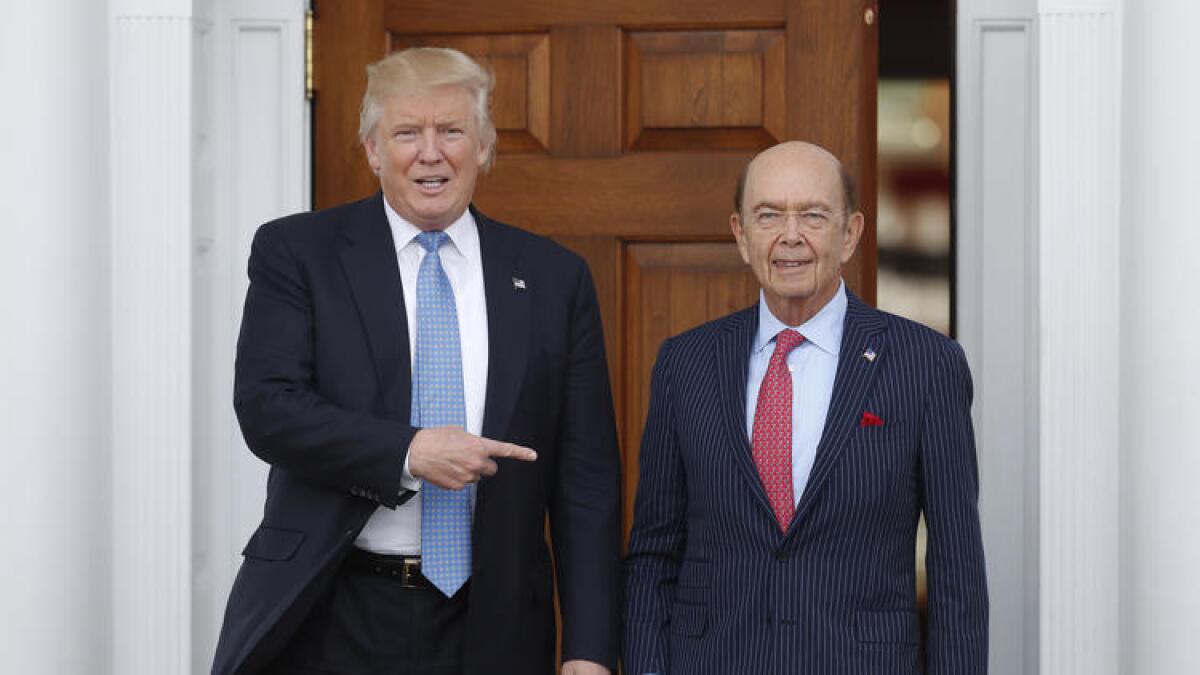
Dwight Eisenhower surrounded himself in the White House with such wealthy individuals that his Cabinet was mockingly referred to as “nine millionaires and a plumber.”
President-elect Donald Trump is about to do him one better.
Trump won the election by appealing to America’s disaffected working class, promising to drain the Washington swamp of insiders and railing against segments of the financial elite. But the New York businessman has tapped a slate of people very much in his own vein to serve alongside him — billionaires and multimillionaires, including Wall Street financiers, industrialists and scions of the super-rich.
Wells Fargo customers harmed by fake accounts would get to sue under proposed legislation
Wells Fargo & Co. customers who learned that bank employees opened accounts without their consent later discovered another problem when they tried to sue to recover lost fees and for other damages.
They couldn’t.
The San Francisco-based bank says that clauses in contracts the customers signed when they opened legitimate accounts forced all disputes — even those involving the roughly 2 million unauthorized accounts in the scandal — into private arbitration.
Now, two federal lawmakers want to change that.
Donald Trump may have won, but he doesn’t want the campaign to end
The election had been over for more than three weeks when President-elect Donald Trump took the stage Thursday night in Cincinnati, but inside the arena it was like the campaign had never ended.
Supporters chanted familiar slogans about Hillary Clinton — “Lock her up” — and illegal immigration: “Build the wall.” They booed the media when Trump criticized “the very dishonest press.”
The rally was, familiarly, interrupted by protestors, whom Trump mocked as they were escorted out by saying they were going “back home to Mom.”
Trump said he was going to discuss an “action plan” for his administration, but he seemed more animated regaling the crowd with a play-by-play of how television news covered election night. He relished the surprise on anchors’ faces as it became clear that the “blue wall” of normally Democratic states would fall to Trump, handing him a victory.
“We shattered that sucker,” he said. “That poor wall is busted up.”
Donald Trump announces ‘Mad Dog Mattis’ as his choice for Defense secretary
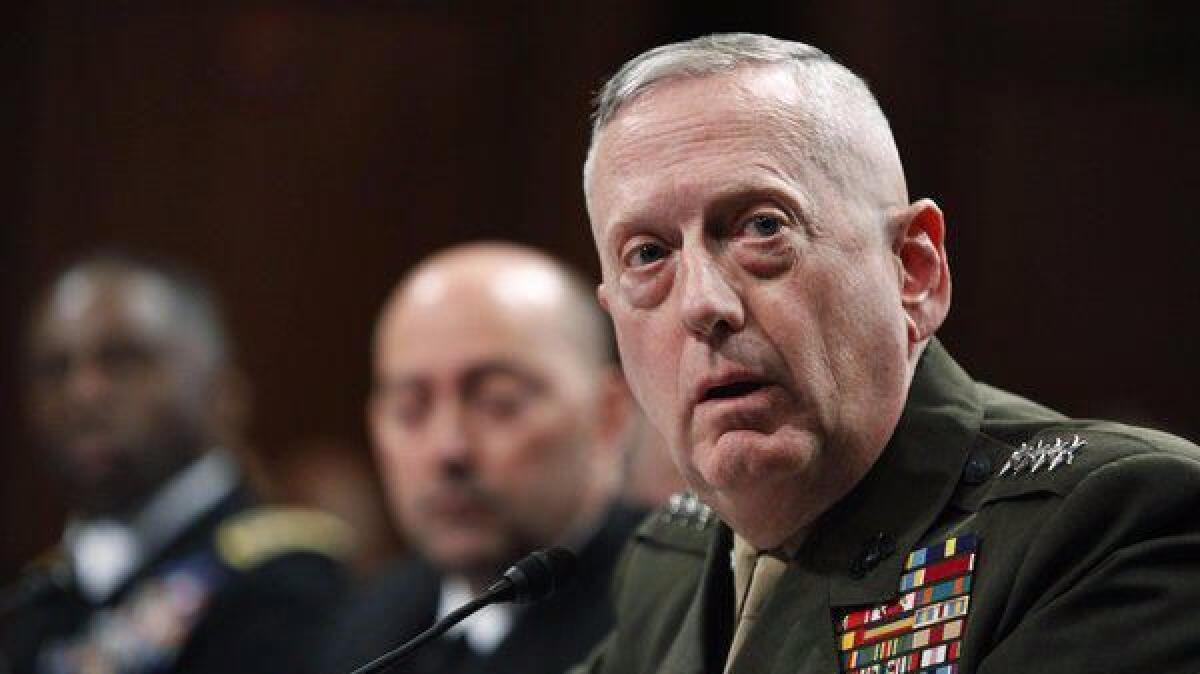
President-elect Donald Trump has chosen James Mattis, a highly respected retired Marine four-star general, to head the Defense Department, filling in a crucial national security position in the emerging Cabinet.
“We are going to appoint Mad Dog Mattis as our secretary of Defense,” Trump told a crowd of supporters in Cincinnati on Thursday night, referring to the retired general by his nickname.
Mattis served 44 years in the Marine Corps before he retired in 2013. He headed U.S. Central Command in his final three years and oversaw the wars in Iraq and Afghanistan as well as other military operations in the Middle East.
Unmarried all his life, Mattis, 66, was known as a hard-charging but scholarly figure who issued heavy reading lists to his subordinates and who carried “Meditations” by Marcus Aurelius on his deployments.
In speeches, he was as likely to quote from Shakespeare or an ancient Greek poet as from traditional military strategists Carl von Clausewitz and Sun Tzu.
Trump could help a Democrat while hurting the party at the same time
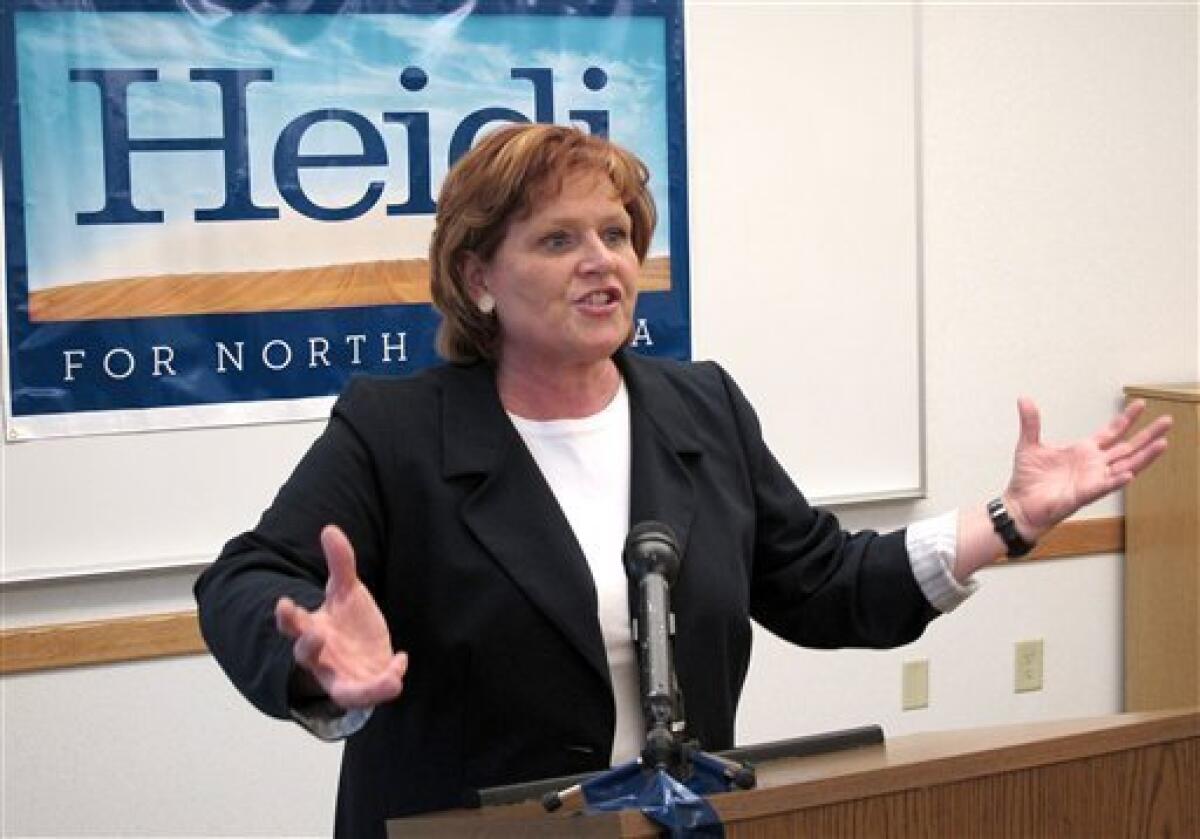
Here’s one way Donald Trump could both elevate a Democrat while diminishing the party at the same time.
North Dakota Sen. Heidi Heitkamp, a Democratic lawmaker representing a solid red state, will meet with the Republican president-elect Friday in connection with a potential Cabinet appointment. The senator was to discuss two specific posts: secretary of Energy or of the Interior, according to a person familiar with the meeting agenda.
Adding Heitkamp to Trump’s Cabinet and removing her from the Senate could help Republicans increase their narrow majority in the chamber, which shrunk by two seats in last month’s election.
Heitkamp, first elected in 2012, is up for reelection in two years and is likely to face a tough fight given the state’s strong GOP leanings.
Heitkamp “comes very highly recommended, very highly qualified” and would be “a proven asset in any capacity,” Trump spokesman Jason Miller said, though he cautioned that of the dozens of people who have met with Trump and Vice President-elect Mike Pence, some merely provide insight and experience, while others are interviewing for jobs.
Heitkamp said she appreciated the invitation to meet with Trump.
“Whatever job I do, I hope to work with the president-elect and all of my colleagues in Congress on both sides of the aisle to best support my state,” she said.
New presidents often like to choose at least one or two members of the opposite party to give their administration a flair of bipartisanship. Illinois Republican Rep. Ray LaHood was President Obama’s first Transportation secretary; Obama also chose New Hampshire Sen. Judd Gregg for Commerce secretary before the Republican withdrew from the nomination.
Democratic Sen. Joe Manchin of West Virginia was also being considered for a potential position in Trump’s Cabinet, Politico reported.
Donald Trump says he never really meant to promise that Carrier jobs would return
President-elect Donald Trump said Thursday that he never really meant to promise that he would bring jobs back that Carrier, the heating and cooling company, had promised this year to ship to Mexico.
“That was a euphemism,” Trump said, meaning he was treating the company as a proxy for U.S. manufacturers that send jobs abroad. “I was talking about Carrier like all other companies from here on in.”
But Trump said he made Carrier a priority after seeing an employee of the company cite the promise on an evening newscast.
On Thursday, Trump toured the Carrier factory in Indianapolis, talking about what a great Christmas its workers would have after the company agreed this week to keep 1,100 jobs from going abroad.
That’s most of the 1,400 jobs that Carrier had planned to shed in its move, and 100 more jobs than had been announced in a Wednesday news release.
Trump began calling the chief executive of Carrier’s parent company, Gregory Hayes, after seeing the news segment, he said.
He worked out a deal with Hayes. Carrier said in a statement Thursday that the deal with the state of Indiana gives the firm $7 million in incentives “over multiple years, contingent upon factors including employment, job retention and capital investment.” Vice President-elect Mike Pence is the state’s outgoing governor and also played a key role in negotiating.
Trump said the goodwill that Carrier built would be worth even more: “So many people are going to be buying Carrier air conditioners.”
Trump, in a speech after his factory tour, beamed with energy, showing the freewheeling style he honed on the campaign trail, with frequent tangents to talk about his primary victory in Indiana, former basketball coach Bob Knight and his “tremendous love affair with the state of Indiana.”
Then he singled out a man in the audience who said it was his son who spoke out on the national news segment about Carrier and said he was certain that Trump would keep the jobs from leaving.
“Your son, whoever the hell your son is, these people owe him a lot,” Trump said.
Trump promised other companies would not make the same decision when he becomes president, saying he would shred government regulations and reduce the business tax from 35% to 15%. He said those who were not lured by those enticements would face large tariffs. All of those actions will require congressional approval.
Trump also said that he would not shy from calling other companies.
“They say it’s not presidential to call up these massive leaders of business,” Trump said. “I think it’s very presidential. And if it’s not presidential, that’s OK.”
2:30 p.m.: This story was updated with comment from Carrier.
Donald Trump speaks with Olympic leader in support of LA 2024 effort, officials say
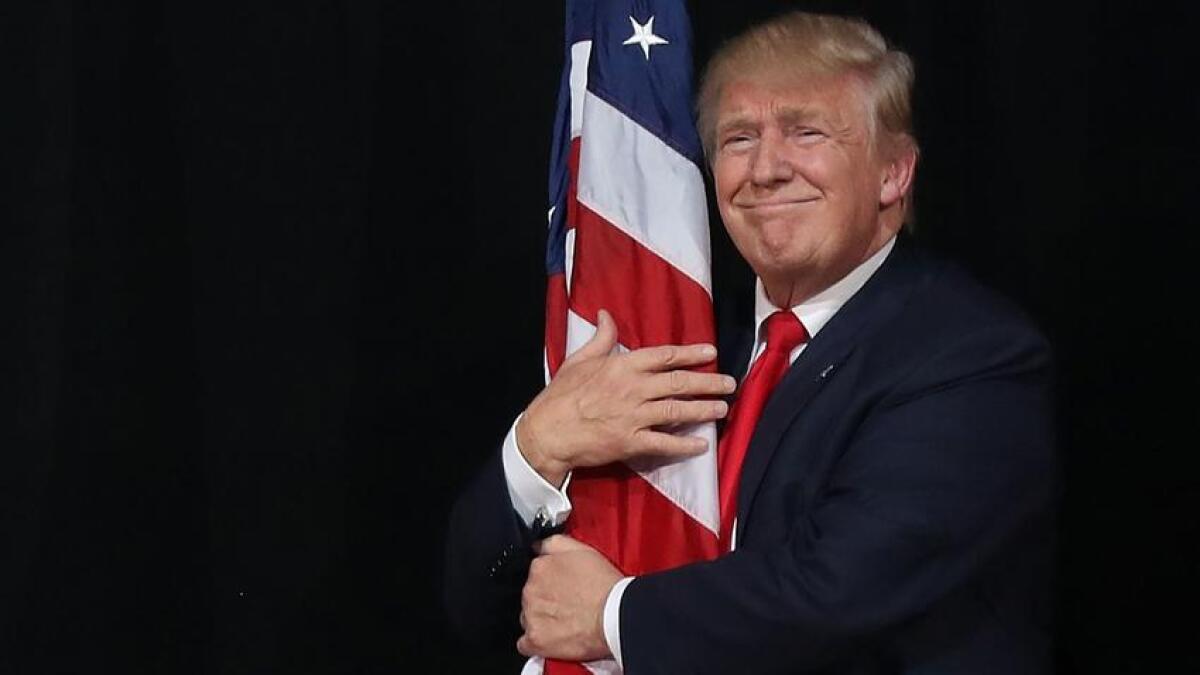
Los Angeles has taken its case for the 2024 Summer Olympics to President-elect Donald Trump.
Last week, Mayor Eric Garcetti — who has spearheaded the bid — spoke with Trump about a number of issues, including the Games.
Now, LA 2024 officials say, Trump called Thomas Bach, president of the International Olympic Committee, on Wednesday to express support for the bid.
Mike Pence’s temporary neighbors in Washington silently protest against him with LGBT pride flags
Vice President-elect Mike Pence’s temporary neighbors have sent a not-so-welcome message criticizing his stance on gay rights.
Residents in northwest Washington, D.C., near where Pence is renting a house have begun flying LGBT pride flags from their homes.
“A respectful message showing, in my case, my disagreement with some of his thinking,” neighbor Ilse Heintzen told WJLA-TV.
Pence has long been an opponent of gay rights.
As governor of Indiana, he signed a measure into law last year that would have allowed businesses to reject gay and lesbian customers on grounds of religious freedom. He later signed a revised version of the law prohibiting discrimination based on sexual orientation.
As a congressman in 2010, Pence criticized efforts to repeal Don’t Ask, Don’t Tell, the policy governing gays in the military. And during his congressional run in 2000, he posted a statement on his campaign website that was widely perceived to support the discredited practice of gay conversion therapy. A spokesman rejected that conclusion recently, telling the New York Times that the statement had been misinterpreted.
Washington itself is a heavily Democratic city; Hillary Clinton won nearly 93% of the vote there in last month’s election.
Pence’s rental is listed at $6,000 per month. According to WJLA, “roughly a half-dozen pride flags” fly on the block, with more to come.
Pence will move into the official vice presidential mansion at the Naval Observatory, also in northwest Washington, after Vice President Joe Biden moves out.
Russia’s Putin reins in anti-Western rhetoric during speech
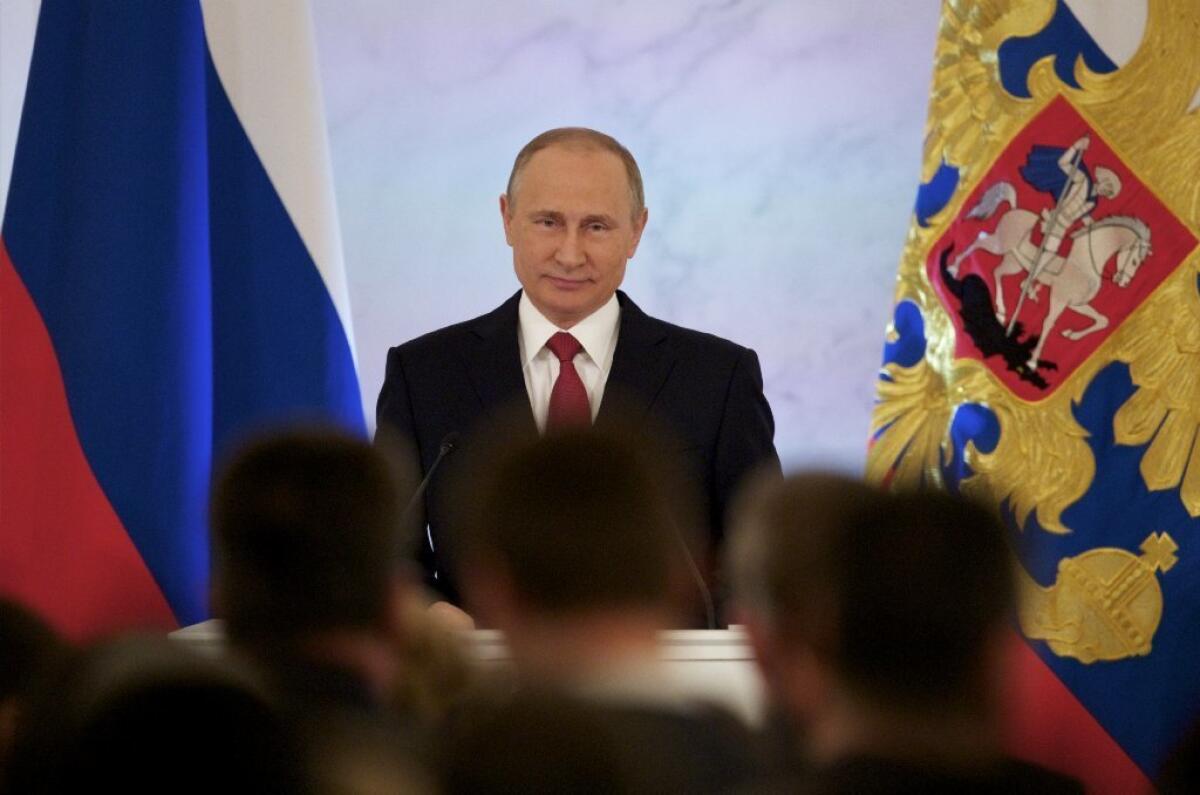
Russian President Vladimir Putin – whose international aims are under scrutiny as Donald Trump prepares to assume the U.S. presidency – reined in the anti-Western rhetoric in a major speech Thursday.
In his annual state-of-the-nation address delivered from an ornate assembly room in the Kremlin, Putin avoided the harsh references to Washington that are often a hallmark of such high-profile ceremonial speeches. Instead, he focused on Russia’s domestic and economic challenges and painted his government as averse to international friction.
“We don’t want confrontation with anyone – we don’t need it,” official media outlets quoted him as telling an assemblage of Russian political elite. “We are not seeking and have never sought enemies. We need friends.”
That he may have found a friend in Trump, who takes office in less than two months, has been a much-discussed topic in U.S. policy circles. The latest cautionary note was struck by outgoing CIA Director John Brennan, who a day earlier had told the BBC that Trump “needs to be wary of Russian promises.”
During his campaign, the now president-elect repeatedly made admiring references to Putin’s “strong” style of governance, and the two have since spoken of repairing relations that have been tense for much of President Obama’s tenure.
In his speech, Putin said Russia wanted to work with the United States, citing global terrorism as a common enemy.
“We are ready to cooperate with the new U.S. administration,” the Russian leader said. “We have a shared responsibility to ensure national security.”
Trump makes new announcements that help him look good and distract from controversies, too
Donald Trump arrives Thursday in Indiana to tout the saving of about 1,000 American jobs — and to add yet more positive shine to an image honed daily with his effervescent use of social media.
Trump claimed this week on Twitter that he’d persuaded the Carrier heating and air conditioning firm to retain many of the jobs it planned to send to Mexico — a plan that Trump regularly criticized during his campaign.
Then he announced that he will change his relationship with his namesake development company. The Internet roared with assertions that Trump was going to leave his company entirely — thus lessening obvious conflicts of interest — even though Trump had not gone that far.
Trump promised to repeal Obamacare, but it turns out Americans like most of it, a poll finds

Despite sharp partisan differences over the Affordable Care Act, Democrats and Republicans, including voters who backed President-elect Donald Trump, strongly support most of the law’s key provisions, a new national poll indicates.
And although most Trump voters still favor repealing the law, often called Obamacare, an increasing share of Americans overall oppose that approach, according to the poll, which was conducted in mid-November, following Trump’s election.
Backers of legalized marijuana fear possible battle with attorney general pick Jeff Sessions
Backers of laws allowing marijuana use in California are girding for a possible political and legal battle against President-elect Donald Trump’s pick for attorney general, Sen. Jeff Sessions, a staunch foe of pot legalization.
Marijuana industry leaders in the state and around the U.S. have launched an opposition campaign to the Senate confirmation of the Republican senator from Alabama and are appealing to the Trump camp to make sure the president-elect’s policies are consistent with his campaign comments that he favors allowing states to decide how to enforce marijuana laws.
Are you Muslim American? We want to hear your thoughts on Trump’s presidency
In an effort to further that discussion, we want to hear from you.
Are you an American Muslim? What do you want people to know about your religion, and about you? Has your life has been affected by Trump or the rhetoric associated with his campaign? Tell us how your life has or hasn’t changed over the past election year, and share with us what you hope for America’s future. Fill out the form below if you’d like to help inform our ongoing coverage. Or you can email L.A. Times reporter Sarah Parvini, who is working on a story now: Sarah.Parvini@latimes.com.